Past Center Sponsored Events
Past Center Sponsored Programming
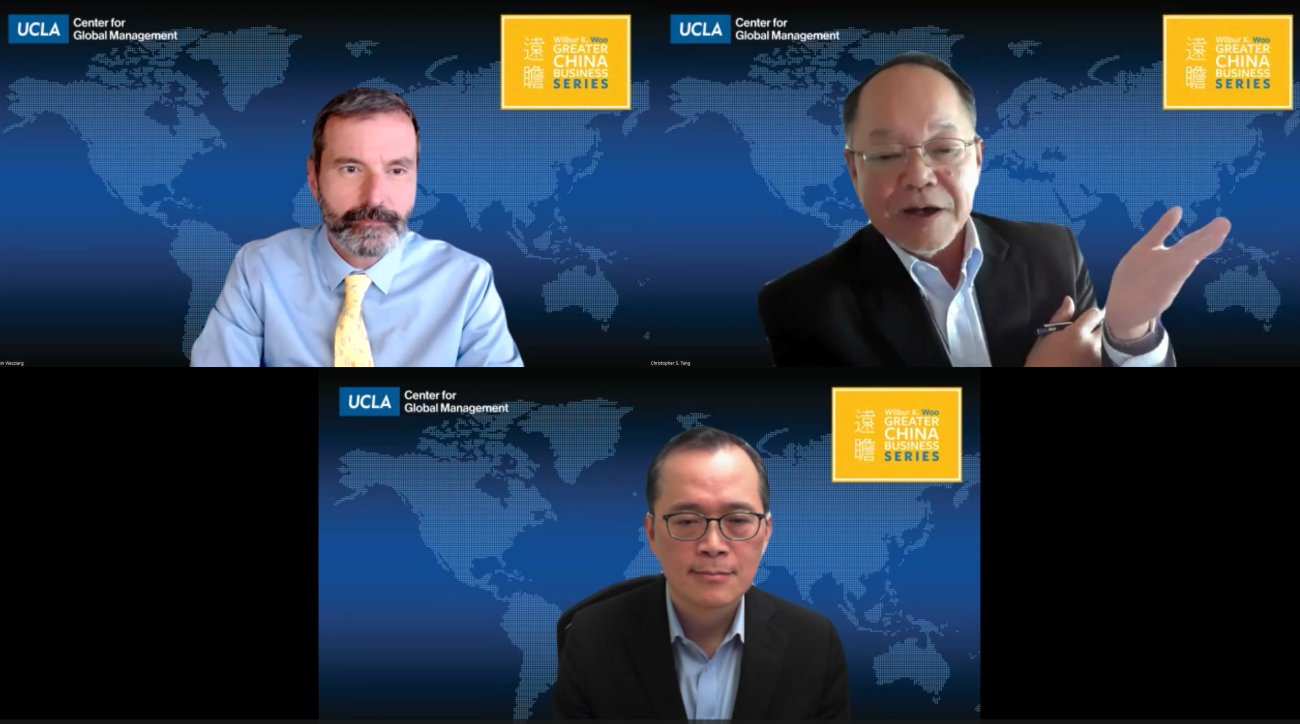
Wilbur K. Woo Greater China Business Series: The Indo-Pacific Economic Framework and Rise of India: Will It Help the U.S. Counter China’s Influence in the Asia-Pacific Region?
Wednesday, March 13, 2024 5:00 p.m. PDT
Six decades ago, China and India had roughly the same per capita gross domestic product. Both countries had large populations but were predominantly rural and poor. Economic reforms in China, including becoming open to external trade and investment, allowed the country to advance and become the world’s second largest economy in 2010. Change in India was slower and less steady. Today, as foreign direct investment is shifting away from China and the economy has entered deflation territory, the world’s second largest economy is grappling with mounting challenges. Yet across the border, the economy in India could not be better. Over the last decade, the world’s most populous nation has experienced a growth journey to become a global economic powerhouse, with growth in its digital economy, diversification of its export basket and a move toward higher value–added products.
International firms are seeking to diversify their operations away from China, where they faced obstacles during the pandemic and are threatened by rising tension between Beijing and Washington. Meanwhile, India is aggressively trying to capitalize on this massive rethink underway among companies on supply chains. In 2022, the U.S. launched the Indo-Pacific Economic Framework (IPEF), prompting negotiations on trade, supply chains, clean energy, and infrastructure. Today, the Modi government is laying the groundwork to make it easier to do business and attract more companies to invest. Much like China did more than three decades ago, India is beginning a massive infrastructure transformation by spending billions on building roads, ports, airports, and railways. Could there be a reversal of fortunes? On March 13, the Center for Global Management hosted the fourth conversation in the Wilbur K. Woo Greater China Business Series which addressed this question focused around the overarching theme and the topic of the Indo-Pacific Economic Framework (IPEF), the rise of India and whether it will help the U.S counter China’s influence in the Asia-Pacific Region. Romain Wacziarg, professor of economics and Hans Hufschmid Chair in Management, who teaches the CGM’s business environment of India global immersion course, and William Yu, economist for the UCLA Anderson Forecast and author of the UCLA Anderson Forecast’s U.S.-China Economic reports, delivered brief presentations before joining a moderated conversation with CGM faculty director, Professor Chris Tang. They addressed the current state of these two powerhouse economies, drew comparisons between the two countries, identified their respective challenges and growth opportunities, and shared their predictions on the longer-term prospects and impact on future strategic, trade and commercial relations with the United States, and answered questions around these topics from the remote audience.
The event was featured as a discussion in the Wilbur K. Woo Greater China Business Series and open to UCLA students, alumni, faculty, staff and members of the extended UCLA global community and general public. The Wilbur K. Woo Greater China Business Series is organized by the Center for Global Management. The UCLA Anderson Forecast, UCLA Asia Pacific Center, UCLA Anderson’s Greater China Business Association (GCBA) and UCLA’s Chinese Students and Scholars Association (CSSA) are supporting organizations. VIEW VIDEO
About the Series
The Wilbur K. Woo Greater China Business Series engages leading executives, innovators, influencers, investors and academics in conversations around the major forces, trends and innovations in the region across society, enterprises and consumers. Through balanced discourse, the series serves as a neutral forum to exchange ideas and learnings, understand new norms and models, and provide forward-looking perspectives on advancements to better understand the trends, opportunities and challenges of doing business in and with the Greater China region.
Born in China in 1916, the late Wilbur K. Woo (B.A. ’42) received his bachelor’s degree in business administration from UCLA. He went on to become a major figure in LA's business, political, cultural and charitable arenas and was known for his decades of leadership in the Chinese-American community. Global reach starts with global thinking, and two decades ago -- recognizing the rapid expansion and modernization of China’s economy -- Wilbur Woo, the vice chairman of Cathay Bank, and his wife Beth endowed the Wilbur K. Woo Greater China Business Conference at UCLA (now rebranded as a Series) to show their gratitude for the training Wilbur had received at his alma mater. The Woos' goal was to facilitate dialogue, promote understanding, and strengthen the important ties between the Greater China region and the United States—to identify areas of collective opportunity, foster cooperation, and bring a group of leaders—both aspiring and current -- together to collaborate and learn together. These events and discussions have continued to have a powerful impact on our community—here at UCLA and beyond.
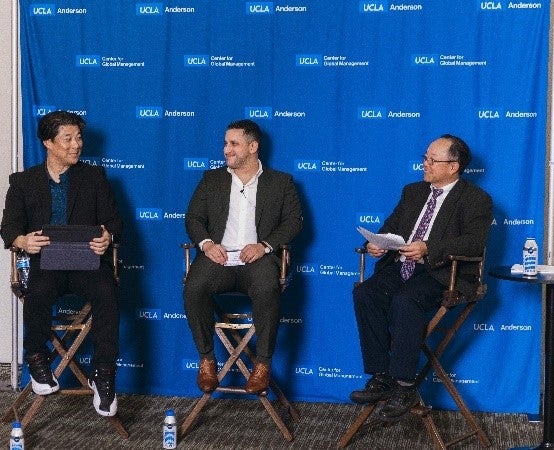
Global Management Speaker Series: Managing the Global Supply Chain and Sourcing Strategies in a Changing World
Wednesday, February 28, 2024 6:00 p.m. PST
Supply-chain management is entering a new era. Historically the focus of supply-chain managers has been sourcing. However, shocks caused by the pandemic, a new urgency in managing greenhouse gas emissions, geopolitics, plus the wars in the Ukraine and Middle East have put the fragility of global supply chains top of mind. The new focus on resilience and sustainability is going to present managers with fresh choices and challenges as they reorient their production footprints to ones that will be more flexible and more regional.
On February 28, the UCLA Anderson Center for Global Management hosted the second event of the academic year in its Global Management Speaker Series, supported by the Class of 2022. Global supply chain and sourcing experts Kevin Lee (’22) and Rodney Moreh (’23), graduates of UCLA Anderson’s executive MBA program, discussed their own supply chain and sourcing strategies and explored these issues in a thoughtful and interactive discussion with UCLA Anderson’s Professor Chris Tang, faculty director of the Center for Global Management, a foremost scholar of global supply chain management. Kevin Lee (’22) is co-founder and chief operating officer of Hoolie Golf, a golf apparel company that manufactures, sources and distributes golf polos and golf hats globally, who also serves as chief executive officer of APEX International, a global supply chain management company. Rodney Moreh (’23) is founder and chief executive officer of sourceM, a full-service product sourcing agency that leverages its supply chain expertise to develop and produce custom consumer goods and packaging on behalf of clients.
As the U.S. strives to reduce its dependence on China by de-risking its supply chains, many U.S. firms are shifting operations away from China to friend-shoring countries such as India, Thailand and Vietnam. At the same time, many U.S. companies are also increasing their sourcing volume from near-shoring countries such as Mexico and Canada to take advantage of the USMCA free-trade agreement. While friend-shoring or near-shoring can improve supply chain resilience, it is not risk-free. U.S. firms need to manage market, operational and reputational risks, and devise strategies to identify, evaluate, mitigate, and respond to the various types of supply chain risks that may arise from this de-risking process. Lee and Moreh addressed the challenges and opportunities of derisking from China, the USMCA impact, the potential of India and Vietnam, reshoring considerations and future trends, and answered questions around these topics from the in-person audience if UCLA Anderson alumni and students. The CGM welcomed many members of the Classes of 2022 and 2023 back to their alma mater for the evening of discussion, networking and reconnecting. Current students from across all Anderson’s MBA and Ph.D. programs attended the evening that began with a networking reception and concluded with a networking dinner. The discussion was also broadcast live and attended by many UCLA Anderson alumni, current students and members of the broader UCLA and general communities.
The Global Management Speaker Series, supported by the Class of 2022, engages thought leaders and the audience in timely conversations around global issues, opportunities and challenges. Through interactive and balanced dialogue, the series provides students and alumni with global perspectives and insights on important topics, and prepares them to become successful leaders who can operate in a global context and thrive in increasingly dynamic and diverse organizations. The series was inspired by the resiliency of Anderson students who rose to the challenge during the COVID-19 pandemic and propelled communities and industries forward during the global shut down. VIEW VIDEO
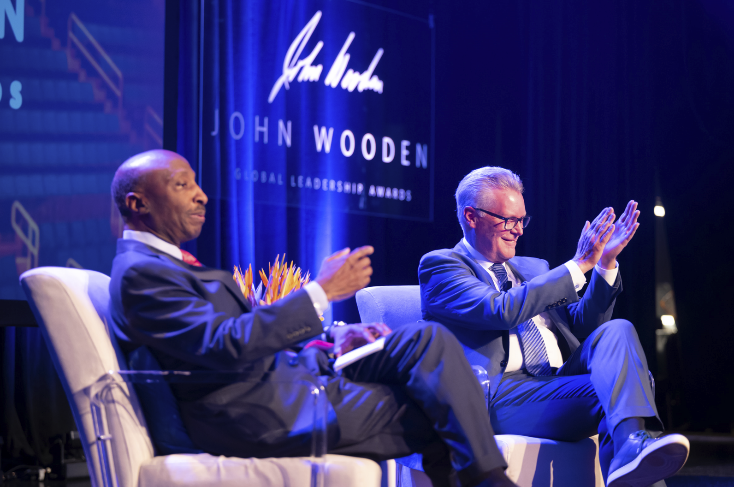
2024 John Wooden Global Leadership Award Gala Dinner Benefits the 2023 John Wooden Leadership Fellows and Honors Ed Bastian, Chief Executive Officer of Delta Air Lines
Tuesday, February 20, 2024 6:00 p.m. PST The Beverly Wilshire
On Tuesday, February 20, 2024, UCLA Anderson honored Ed Bastian, chief executive officer of Delta Air Lines with the John Wooden Global Leadership Award, at a gala dinner held at the Beverly Wilshire in Los Angeles. First presented in 2008, the award is named for legendary UCLA basketball coach, author, and leadership expert John Wooden (1910–2010). It is given each year to an exceptional business leader whose leadership style and service to the community reflect the high standards of performance, integrity, and ethical values for which Wooden was known. The recognition was last bestowed to Brian Cornell (B.A. ’81, CERT. ’91), board chairman and chief executive officer of Target.
As the most successful coach in U.S. men's college basketball history, John Wooden left a legacy of leadership that transcends athletics and spans generations. As a legendary coach, prolific author, and inspiring speaker, he dedicated his life to motivating individuals to achieve their highest potential. Wooden instilled in others a sense of pride, a commitment to ethics and a respect for teamwork. These fundamental principles translate seamlessly from the sports arena to the realms of business, management and leadership. And they provide the cornerstone on which the John Wooden Global Leadership Program is built at UCLA Anderson.
The 2023 John Wooden Global Leadership Award honored a corporate leader who personifies the ideals of achievement, principle and character associated with Coach John Wooden. Coach created the timeless, inimitable blueprint for achieving success in sports, business and life: The Pyramid of Success. It connects ethics, team spirit, skill, hard work, loyalty, competitive greatness and many more attributes in a unique way and has served as a map for many contemporary leaders. Coach Wooden stands in the record books for winning seven NCAA titles in a row and 10 in 12 seasons. For his leadership, he received the Presidential Medal of Freedom in 2004. UCLA Anderson embraces the principles of character-based leadership taught by Coach, and gives the award each year to a global influencer who will ensure that his tenets live on and inspire millions of people.
Bastian was chosen as the 2023 Wooden Award recipient in recognition of his visionary leadership of the nation’s oldest continuously operating airline. In his many leadership roles at Delta over the past 25 years, Bastian has helped steer the company through the most challenging periods of its history, building confidence and community among its 100,000 employees. During his tenure as CEO, Delta has become the world's most awarded airline.
UCLA Anderson Dean Tony Bernardo opened the evening's festivities, alongside Caroline W. Nahas (B.A. ’70), Korn Ferry senior advisor and chair of the UCLA Anderson Board of Advisors. In bringing Bastian to the stage to be recognized, Bernardo said that the Delta leader's many achievements and awards told just part of the story of his distinguished career. "During his tenure, Ed has guided Delta's employees through some of the most intensely challenging periods of the company's history, including 9/11, bankruptcy and the COVID-19 pandemic. Tonight, we honor him not only for all he has done as a leader, but how he has done it. Throughout, he has put people first — setting up profit sharing, swearing off job cuts or furloughs, championing equality and safeguarding employee and customer health and well-being," Bernardo said. "Like Coach, Ed is team-centered and purpose-driven. He is a true champion of Delta's shared values of honesty, integrity, respect, perseverance and servant leadership."
At the banquet, 2021 Wooden Award recipient Kenneth C. Frazier engaged Bastian in an on-stage conversation about leadership, values and the Wooden legacy. Frazier is chairman of health assurance initiatives at General Catalyst and former CEO and executive chairman of Merck & Co. He has described Bastian as "a true exemplar of what it means to be a visionary, resilient, purpose-driven leader." Frazier asked Bastian to list his core leadership values. "Integrity, accountability, resilience, care — caring for other people, our customers — and servant leadership, putting yourself at the bottom of the pyramid," said Bastian. He described values as "the fabric that holds companies together, through good times and challenging times." Frazier paid tribute to Bastian by calling him "an active and vocal champion" of diversity, equity and inclusion. Bastian explained his commitment to inclusivity and giving employees incentives as well as a sense of security. "If you can't bring your best self to work, you can't bring your best service to work. If you have a platform of winning together, people will come with you."
In accepting the John Wooden Global Leadership Award, Bastian said, "I am humbled, and I'm honored to accept something in Coach Wooden's name." He recounted how proud his father was when Wooden's UCLA team took on St. Bonaventure — the alma mater of both Bastians — in a basketball game. Bastian recalled that Wooden's Bruins won the game and that his father considered it an honor to merely compete with the great coach's team.
A tribute to John Wooden began the program and featured the remarks of former NBA point guard Earl Watson (B.A. '19), who earned first team all-conference during his decorated UCLA basketball career. Watson, a longtime devotee of Coach Wooden's leadership philosophy, said that in his many conversations with Coach Wooden, his mentor stressed four essential qualities: love, imagination, skill and will. Following Watson's remarks, Coach Wooden's grandson Greg Wooden spoke on behalf of his family. The younger Wooden recalled how his grandfather once received a standing ovation from a roomful of Anderson students, a moment that influenced his decision to endorse a leadership award honoring Coach's legacy. "What we realized that day in that auditorium, is that my Papa's lessons on leadership transcended the basketball court, and even the athletic arena," Greg Wooden said. "Integrity, honesty, passion and teamwork were equally relevant in the world of management. We also realized that recognizing business leaders who emphasized character-based leadership was very important."
As CEO of Delta Air Lines, Ed Bastian leads 100,000 global professionals who are building the world’s premier international airline, powered by a people-driven, customer-focused culture and spirit of innovation. A 25-year Delta veteran, Bastian has been a critical leader in Delta’s long-term strategy and champion of putting Delta’s shared values of honesty, integrity, respect, perseverance, and servant leadership at the core of every decision. Since being named Delta's CEO in May 2016, Bastian has expanded Delta's leading position as the world's most reliable airline while growing its global footprint and enhancing the customer experience in the air and on the ground. Bastian's values-based leadership propelled the airline to become the industry leader and a trusted global brand, guided by empathy, humanity, and devotion to service, which has served Delta well in good times and bad.
The audience of over 500 included UCLA Anderson Board of Advisors members and other generous supporters, along with members of Coach Wooden’s family, members of the Anderson family joined current and past Wooden Fellows, UCLA Anderson students, alumni, faculty and senior leadership from across the UCLA campus for the ceremony. Net proceeds from the annual event support fellowships for UCLA Anderson students who embody Coach Wooden’s leadership ideals and commitment to improving the lives of others.
During the ceremony, the four 2023 fellowship recipients were recognized and awarded the John Wooden Global Leadership Fellowship, which is among the most prestigious honors Anderson students can receive. The 2023 John Wooden Global Leadership Fellows include: Andy Cofino (FEMBA ’25), assistant vice president of diversity, belonging and well-being at Princeton University; Ryan Hayes (EMBA ’24), captain in the U.S. Navy; Tiffany Lin (FEMBA ’24), senior solution engineer, enterprise communications and media at Salesforce; and Juhie Rathor (FTMBA ’24), president of the Anderson Student Association Each of the four 2023 John Wooden Global Leadership Fellows will receive a $35,000 fellowship. Learn more about the fellows.
Previous John Wooden Global Leadership honorees include: Brian Cornell (B.A. ’81, CERT. ’91), board chairman and chief executive officer, Target; Kenneth C. Frazier, executive chairman of the board and former CEO, Merck; Mellody Hobson, co-CEO and president, Ariel Investments; Reed Hastings, co-founder and CEO, Netflix; W. James (Jim) McNerney Jr., retired chairman, president and CEO, The Boeing Company; Ursula Burns, former chairman and CEO, Xerox; Paul E. Jacobs, former executive chairman, Qualcomm; Robert Iger, chairman and CEO, The Walt Disney Company; Indra Nooyi, former CEO, PepsiCo; Peter Ueberroth, managing director, Contrarian Group, and president of the Los Angeles Olympic Organizing Committee; Frederick Smith, president and CEO, FedEx; Kenneth Chenault, former chairman and CEO, American Express Company; and Howard Schultz, former chairman and CEO, Starbucks.
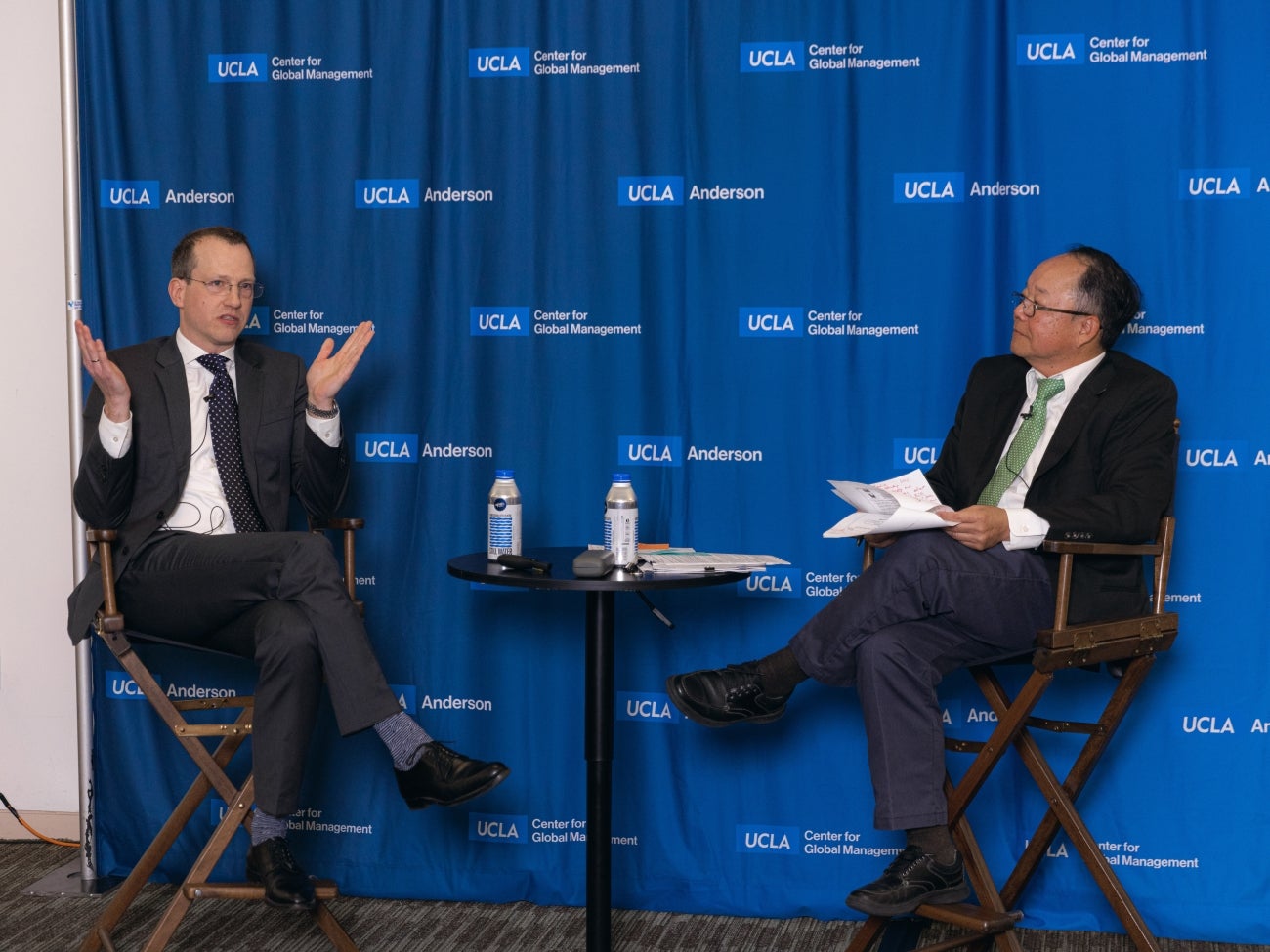
Global Business & Policy Forum: ESG and Corporate Leadership: Challenges and Opportunities
Thursday, February 15, 2024 5:00 p.m. PST
Over the past few years, the advocates of ESG (Environmental, Social and Corporate Governance) have encountered strong headwinds in the U.S. Some politicians have created an anti-ESG movement as part of their election campaigns. According to a January 10, 2024, Wall Street Journal article entitled “The Latest Dirty Word in Corporate America: ESG,” ESG has become the three letters that corporate officials dare not utter. Nonetheless, many business leaders remain focused on environmental, social, and corporate governance issues in making business decisions.
On February 15, in UCLA Anderson’s executive dining room, students of management and law joined the UCLA Anderson Center for Global Management and UCLA School of Law’s Lowell Milken Institute for Business Law and Policy for the second discussion of the academic year in their joint Global Business and Policy Forum series. Christopher S. Tang, UCLA Distinguished Professor, Edward W. Chair in Business Administration and faculty director of the Center for Global Management joined Thilo Kuntz, Chair in Private and Corporate Law, Heinrich Heine University Dusseldorf, Germany and currently, visiting professor at the UCLA School of Law, teaching a course on Comparative Corporate Governance, for a presentation and discussion on the broad landscape of ESG and the challenges and opportunities for corporate leadership.
Putting aside the politics and social media campaigns to end ESG, what are the operational issues that responsible corporate leadership face in dealing with challenges to corporate well-being from, for example, a changing environment, a diverse work force, and greater demands for corporate transparency? Globally, there is an expanding body of ESG regulations and norms. For example, both California and the EU have enacted disclosure requirements that will require many companies to discuss climate impacts on a company’s operations and financial performance. Do these external regulations and norms on the corporation change the nature of the fiduciary obligations that directors owe the company and its shareholders? What impact does this have on directors’ decision-making? Can traditional legal rules, such as the Business Judgment Rule, still offer directors protection in such a rapidly changing environment? How does the transnational character of environmental concerns and a growing body of transnational legal norms affect the local director sitting in Los Angeles, London or Berlin? Can corporations be an instrument of change in an environment where ESG proposals meet increasing opposition by traditionally oriented shareholders? Kuntz and Tang explored these questions in a thoughtful conversation and interactive discussion.
Students from across Anderson’s MBA, MFE and Ph.D. programs and UCLA School of Law’s LLM, JD and MLS programs attended the evening that began with a networking event and concluded with a networking dinner. Following the discussion, the in-person student audience engaged in interactive table conversations and analyzed the issues raised by the presentation and discussion from both a business and legal lens. Students reflected on the discussion and in light of the likely influence of EU legislation on U.S. firms, shared their views on whether the U.S. should engage in ESG legislation to compete with the EU or preempt EU legislation. Students also considered whether U.S. managers of international corporate groups with U.S. headquarters should streamline their business operations with EU requirements on a worldwide basis or separate U.S. and European business operations as far as possible. Students also tried to put themselves in the shoes of a manager of a company operating on a world-wide basis, with supply chains affected by climate change (e.g., rising number of extreme weather events disrupting supply chains) and think about how they might deal with these issues considering a rise of "anti-ESG" legislation, forbidding the consideration of ESG factors. The discussions were thought-provoking and raised many issues from both a business and legal perspective and provided students with the opportunity to hear and learn how issues are analyzed and considered. The discussion was also broadcast live to interested students who were unable to attend in-person. The Global Business and Policy Forum is a collaborative partnership between the Center for Global Management and UCLA School of Law's Lowell Milken Institute for Business Law and Policy. VIEW VIDEO
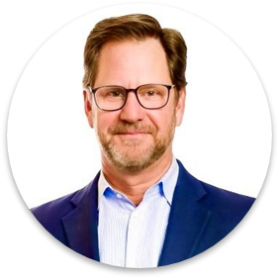
Lunchtime Discussion on Global Media and Entertainment and Its Changing Landscape: Working on the Business and Creative Sides Corporately and then Venturing into the Entrepreneurial World to Start His Own Media Companies, with Jon Niermann (’95), CEO and Co-Founder, Loop Media, Inc.
Thursday, February 8, 2024 11:30 a.m. PST
On Thursday, February 8, the Center for Global Management (CGM), welcomed Jon Niermann (’95), an alumnus of the FEMBA program and member of the CGM’s advisory board, back to his alma mater for an interactive lunchtime discussion with students from the full-time, fully employed and executive MBA program. During his career of over 30 years, Niermann has achieved success on both the corporate and entrepreneurial business worlds in the U.S. and Asia. He built his entertainment career with The Walt Disney Company and Electronic Arts, serving as president of both company's Asian operations, prior to starting his own media companies. Niermann left the corporate world after 22 years to start his own company, FarWest Entertainment (2010), a multi-platform (television, music, animation, digital) media and entertainment company that focused on bridging Asia with the West. In 2016, he co-founded Loop Media, Inc., which went public on the NYSE in 2022 (NYSE: LPTV). Loop Media, Inc. is a Digital Out of Home (DOOH) video streaming company that serves as a content platform for public venues and businesses – large and small. Loop is the largest provider of music videos and other short-form content to top businesses.
Students interested in global management or starting their own business, as well as members of the Entertainment Management Association joined the interactive lunchtime session to hear from Niermann about his fascinating and successful global career trajectory post-Anderson. He discussed his experiences working on the business and creative sides of large companies and then venturing into the entrepreneurial world full-time with his own media companies, and his 15 years of living in Hong Kong, Shanghai, Singapore and Tokyo. Niermann shared his thoughts and observations on the global media and entertainment landscape in light of the digital revolution, as well as his firsthand experiences working on the business and creative sides of large companies and then venturing into the entrepreneurial world full-time with his own media companies. He discussed the implications for the industry, in the short and longer terms as a result of the trends that were accelerated by the pandemic and spoke about the pivot that Loop Media had to make as a result. Niermann also shared lessons learned over the years, why he made certain decisions throughout his career, and provided students with some tangible advice as they think about their own career paths and industry pivots. The discussion was organized by the Center for Global Management and supported by the UCLA Anderson Entertainment Management Association.
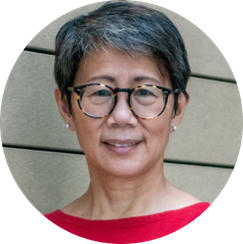
Lunchtime Discussion on Pursuing Sustainability: Impacting Economies and All Sectors of Business, with Christine Loh, Former Undersecretary for the Environment, Hong Kong Government
Wednesday, January 31, 2024 11:30 a.m. PST
On Wednesday, January 31, the Center for Global Management (CGM) hosted an in-person lunchtime discussion with Christine Loh, former undersecretary for the environment, in the Hong Kong SAR Government, a position she held from 2012 to 2017. Loh was the advisor to the head of the HKSAR Government from 2019 to 2020 on specific aspects of environmental cooperation between mainland China and Hong Kong. From 2018 to 2022, she taught an MBA course at UCLA Anderson titled Non-Market Risks and Understanding Politics: The Global Context for Doing Business. Loh serves on the boards of several listed and nonprofit organizations and is best known as a leading voice in public policy particularly in the environment and climate change, sustainable finance, and geopolitics. Students from the full-time, fully employed and executive MBA programs, interested in global management and sustainability-related issues joined the interactive session to hear from Loh on her thoughts and insights on the global pursuit of decarbonization and sustainability, including reflections on the U.S. and Asia, and why she believes attention will not fizzle out despite challenging economics and geopolitics.
Loh addressed the top global risks in 2024, as outlined in the World Economic Forum’s Global Risks Report 2025 – the top one being extreme weather. She also shared experts’ view on the most severe global risks over the next two and ten years, as reported by the WEF. The four largest risks faced by the world over the next ten year, according to the WEF, are climate environmental related which won’t go away. These include extreme weather events, critical change to Earth systems, biodiversity loss and ecosystem collapse, and natural resource shortages. Loh also addressed the view from Asia on coping with rapidly changing conditions, including the development trajectories of Asian economies, deglobalizing, decoupling and de-risking, and the ideological debates that are happening, and suggested to students that it is important to listen to the different narratives from different parts of the world. The discussion was organized by the Center for Global Management.
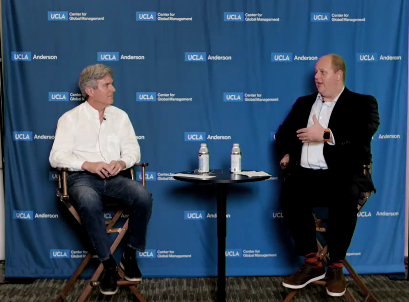
World Today Discussion Series: Managing a Large Multibillion-Dollar Global Portfolio and Navigating Today’s Complex Investment Environment: The Perspective of a Chief Investment Officer
Wednesday, January 24, 2024 6:00 p.m. PST
In a post-pandemic world with greater macro and market volatility, several new challenges to investment are emerging. Amid technological change, shifting global production, geo-political fragmentation, ESG regulations, and conflicts around the globe, institutional investors and other private fund investors are rethinking asset allocation and considering the global economic exposure of their investments.
On January 24, the Center for Global Management (CGM) hosted the inaugural discussion of 2024 in its World Today Discussion Series. Craig Ehrlich (B.A. ’78), who served as chair of the Center for Global Management for seven years, and is past chair of the UCLA Foundation, moderated a discussion with Justin Barton, president and chief investment officer of the UCLA Investment Company, responsible for the management of the UCLA Foundation’s ~$4 billion endowment fund - a global, multi-asset portfolio. Along with the UCLA Investment Company team, Barton oversees all aspects of the endowment including executing investment strategy, portfolio construction, and governance. Balancing the right number of relationships to create a global, multi-asset class portfolio that is not overly diversified is a persistent challenge in normal times. Barton described the role of the UCLA Investment Company and explained how investment models and strategies have evolved over the years, and since the pandemic. He addressed the key issues currently facing institutional investors and the challenges with navigating the increasingly complex investment environment with greater uncertainty and dispersion of returns. Barton also identified some of the elements that make for successful long-term investment partnerships as investment management companies face new threats and uncommon opportunities; and shared his observations on how investment models and strategies will need to continue to evolve and be reflective of a more active and dynamic approach to managing investment portfolios. The discussion followed on from a conservation between Ehrlich and Barton, as part of the CGM Special COVID-19 World Today Discussion Series, back in April 2020, at the beginning of the pandemic. At that time, they discussed the key issues faced by institutional investors amid COVID-19 volatility, as they and other private fund investors were considering the economic exposure to their investments from operational disruptions as a result of the pandemic.
Current students from across Anderson’s MBA, MFE and Ph.D. programs attended the evening that began with a networking reception and concluded with a networking dinner. The discussion was also broadcast live and attended by UCLA Anderson alumni around the world, current students and members of the broader UCLA and general communities. The CGM’s World Today Discussion Series engages the audience in interactive and enriching conversations around current issues that transcend borders. UCLA and Anderson faculty, alumni, board members and thought leaders share their perspectives on the critical global topics and issues that matter to our community and the world. Through balanced discourse, the serves as a neutral forum to educate the community on global issues, while at the same time encouraging debate and examination. VIEW VIDEO
Past Center Sponsored Programming
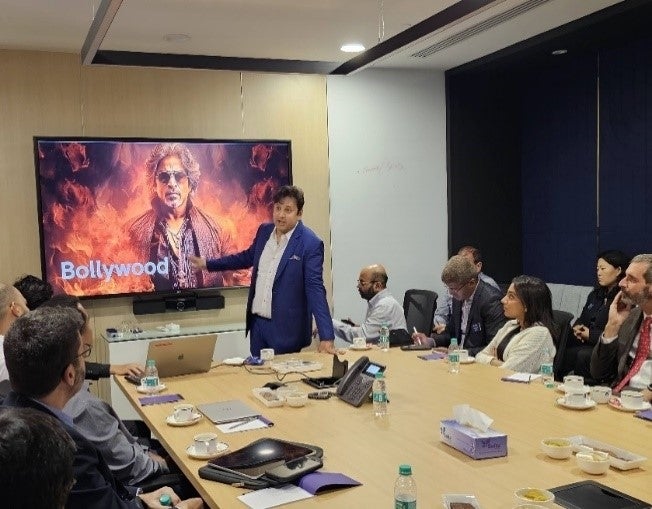
Students and Alumni Travel to Mumbai and Hyderabad to Experience Firsthand the Business Environment of India, with an Emphasis on Entertainment and Finance (Mumbai) and Tech and Biotech (Hyderabad)
Sunday, December 17 - Saturday, December 23, 2023
During winter break, a third group, comprising 30 students and alumni from three of UCLA Anderson’s MBA programs – executive, fully employed and full-time - visited Mumbai and Hyderabad to familiarize themselves with India’s business environment with a particular emphasis on entertainment and finance in Mumbai and technology and biotech in Hyderabad. The course was taught by Romain Wacziarg, Hans Hufschmid Chair in Management and professor of economics. This was the seventh global immersion course to focus on and visit India, and the third time that a course visited Mumbai and Hyderabad. The last time was in December 2022.
Since experiencing a severe balance of payments crisis in 1991, India has engaged in several waves of economic reforms that have resulted in high rates of growth over the last 30 years. Aided by strong fundamentals such as a democratic political system, a vast and youthful population, a culture of entrepreneurship and a large cohort of well-trained engineers and scientists, India is emerging as one of the major economic powerhouses of the 21st Century. Yet challenges remain. The course explored both the risks and opportunities offered by the Indian market for foreign investors and domestic entrepreneurs alike, and provided students with a general understanding of the business environment of India and specificities of the market and non-market environments of business in the country, as well as the risks and opportunities afforded by the Indian market to global investors and business actors. The course provided detailed knowledge of critical sectors of the Indian economy, namely finance, entertainment, high technology and biotech/ healthcare. The sessions in India featured meetings with business leaders and entrepreneurs, including UCLA alumni, academics, and relevant members of the civil society. Due to the destination cities being centers of finance and entertainment (Mumbai) as well as tech and biotech (Hyderabad), these sectors were also the subject of some emphasis during the in-country week. The time in India also included visits to places of historical significance and cultural importance.
While in Mumbai, the group was exposed to a wide range of sessions that covered the full spectrum of financial services and access. Students learned about microfinance, its history and current landscape in India from Vineet Chattree, managing director of Svatantra Microfin Pvt. Ltd. Svatantra is a microfinance institution that helps its women customers in rural villages become economically self-sustainable by providing micro-loans. Chattree described the financial landscape in India, the evolution of the microfinancing sector, and the importance of financial inclusion in the country. On a more macro level, students visited the Reserve Bank of India (RBI). Headquartered in Mumbai, the RBI is the country’s central bank, responsible for India’s monetary policy, and charged with regulating the country’s currency and credit systems. It also manages the country's main payment systems and works to promote its economic development and create financial stability. Students heard from some of the RBI’s senior staff members, including high-level representatives from the departments of economic and policy research, regulation, monetary policy, and fintech. They learned about India’s monetary policy and financial regulations, the modernization of the country’s financial infrastructure, policy making, technological advances and the progress made towards payments and access to finance.
Students had an opportunity to hear from Navneet Munot, managing director and chief executive officer of the Housing Development Finance Corporation (HDFC) Asset Management Co. Ltd, a publicly owned investment management firm that serves customers in India, and offers portfolio management and advisory services to individuals, institutions, trusts, private funds, charitable organizations, and investment companies. The mission of HDFC is to be the wealth creator for every Indian. Munot spoke about the asset management business and described the trends and growth in India’s mutual fund business and future opportunities for the industry in the country. He also shared some important economic and demographic data and trends, highlighting the digitization of India and how it is transforming existing industries and creating new markets and specifically how technology is changing the banking landscape. Students visited Axis Bank, the third largest private sector bank in India that offers the entire spectrum of financial services for both personal and corporate banking, to learn about its strategy, new initiatives, and talent management. The group also had an opportunity to visit the headquarters of fintech company Upstox. Founded in 2009, Upstox is one of India’s fastest growing online investment platforms that provides securities brokerage and stock trading services with a goal to disrupt the brokerage industry by drastically bringing down costs associated with online stock trading. The company’s vision is to create a world where everyone has financial security without barriers and is financially literate and empowered, reducing the wealth gap and increasing the GDP per capita. Students heard from the company’s three founders, Ravi Kumar, Kavintha Subramanian and Shrini Viswanath. They shared their personal journeys, spoke about the history behind Upstox from its humble beginnings all the way to becoming one of India’s largest trading platforms, the challenges and opportunities for the company along the way, and future aspirations.
On the entertainment side while in Mumbai, students visited the headquarters of Jio Creative Labs. The company, which works with numerous Bollywood celebrities and is the advertising and communication arm of Reliance Jio Infocomm Ltd, functions as a strategic business unit and was established with the vision of becoming the new-age creative agency to service the ever-evolving needs of brands. Aditya V. Bhat, head of Jio Creative Labs spoke about the media and entertainment landscape in India and the role of advertising and branding in the sector. He discussed the importance of establishing and building a brand and spoke about some of the company’s different campaigns and advertising methods which include mainline advertising, digital advertising, social media management, influencer outreach and tech-driven content. Bhat also addressed some of the innovations now taking place with artificial intelligence. Students learned about consumer behavior too. Following the session and to continue with the entertainment theme, students visited the Nita Mukesh Ambani Cultural Centre (NMACC), founded by Nita Ambani, philanthropist and chairperson of the Reliance Foundation). Located in the Jio World Centre complex, the NMACC, which opened in 2023, is a performing arts and multi-disciplinary cultural and exhibition space with programming ranging from large-scale global and Indian productions to community-based programming, spoken word events, comedy shows, educational initiatives and workshops for children. The Centre includes a number of spaces, such as the Grand Theatre, a 2000-seat space across three levels that hosts major traveling productions. During the visit, the NMACC was hosting Mamma Mia! The Centre also hosts prominent public art installations. Students were welcomed by Yogesh Manwani (’19), head of marketing for Reliance Industries Ltd. and learned about NMACC’s aim to preserve and promote India’s rich art, culture and heritage through varied art forms.
In Mumbai, the group also enjoyed a visit to Yash Raj Films, one of the biggest film production and distribution companies in India that predominantly produces and distributes Hindi films. It is the only privately held and fully integrated studio in India producing and having produced over 80 films. Akshaye Widhani, chief executive officer, led a Q&A session which was greatly appreciated by the group. He spoke about the company’s evolution, sourcing of content, marketing strategies, representation in film, and the introduction of artificial intelligence. Vijay Daya, head of sound also spoke about the importance of music in Bollywood films. Students were taken on a tour of the sound studio, had the opportunity to see the dressing rooms of some of Bollywood’s stars, and learned about the process and evolution of set design.
In Mumbai, to complement the visits and presentations, students enjoyed a panel discussion at the historic Royal Bombay Yacht Club where various industry leaders, including UCLA Anderson alumni, talked about the Indian economy and its growth prospects and environment for entrepreneurs from their own industry and personal perspectives. Panelists included UCLA Anderson alumnus Abhishek Agarwal (’10), co-founder and chief executive officer of CreditVidya, a big data underwriting platform and a leading player in the alternative credit scoring space in India that leverages alternative data, AI and machine learning to facilitate institutional credit for the underserved. Later in the week, the group visited CreditVidya in Hyderabad. Agarwal was joined on the panel by Jehil Thakkar (’98), partner and media and entertainment sector leader for Deloitte India and Vikas Choudhary, partner at Pivot Ventures, a leading multi-family office focused on alternative investments in India, and former president of Jio, an Indian telecommunications company. The panel was moderated by Professor Romain Wacziarg. A networking event followed. Alumni from UCLA Anderson’s full-time and fully employed MBA and PGPX programs joined the evening. Recent full-time MBA admits also attended.
Later in the week, the group flew to Hyderabad where the focus of the sessions was centered around health care, biotech and technology. At Dr. Reddy’s Labs, students heard from Deepak Sara, the chief executive officer of active pharmaceuticals ingredients (API) and services, who provided an overview on the health care sector globally and described some key health care parameters and India’s contribution to global health care. He spoke about the evolution of Dr. Reddy’s Labs, an Indian multinational pharmaceutical company, headquartered in Hyderabad, which manufactures and markets a wide range of pharmaceuticals in India and overseas. He explained how the company, which serves over half a billion patients worldwide, leverages its research and development expertise, end-to-end manufacturing knowledge and progressive digital technology to accelerate and provide access to affordable and innovative medicines and health care solutions. He also described the company’s sustainability goals and commitment to environmental stewardship. Students were taken on a tour of Dr. Reddy’s campus and its research and lab spaces.
Students also visited the LV Prasad Eye Institute (LVPEI), a World Health Organization Collaborating Centre for Prevention of Blindness, and comprehensive eye health facility. With more than 280 eye-care centers in India, LVPEI’s mission is to provide equitable and quality eye care to all sections of society. In 1987, LVPEI was established in Hyderabad by Dr. Gullapalli Nageswara Rao, an academic ophthalmologist, with a generous contribution by L.V. Prasad, an Indian film producer, actor, director and businessman. LVPEI is managed by two not-for-profit entities - Hyderabad Eye Institute (HEI) and Hyderabad Eye Research Foundation (HERF) and has ten active arms to its areas of operations, including clinical services, education, research, vision rehabilitation, rural and community eye health, eye banking, advocacy and policy planning, capacity building, innovation and product development. Students received a fascinating tour of the facility and observed the waiting area, treatment area and the rehabilitation center while learning more about LVPEI’s tiered payment model that ensures equitable quality of services to all patients, irrespective of their socio-economic status.
One afternoon, the Indian School of Business (ISB) hosted the group at its Hyderabad campus. Students received a fascinating presentation by Anjal Prakash, clinical associate professor and research director of ISB’s Bharti Institute of Public Policy who spoke about sustainability and climate change: a view from the global south, and the growing threat of climate change in India. Students visited the I-Venture@ ISB to learn about India’s tech start-up scene and ecosystem, and the role of I-Venture@ISB from Professor Bhagwan Chowdhry, faculty director of I-Venture and professor emeritus of finance at UCLA Anderson. I-Venture@ISB fosters entrepreneurship and nurtures start-ups and has programs that cater to entrepreneurs and ventures at all stages. The group heard how it is constantly working towards creating a strong ecosystem of mentors, VCs and academicians to ensure the startup’s reach to market and their growth. The group heard from the founders of two start-up companies: Centella AI therapeutics, an AI-driven drug discovery company and XMachines, a robotics and AI company that was founded to bridge the technology gap in Indian agriculture.
During their time in Hyderabad, the group had the opportunity to hear from Chandra Balani, head of global enterprise at Amazon Web Services (AWS) India, and learn about Amazon’s history in India, its culture of innovation in the context of India, and local expansion of AWS. Students were also hosted at CreditVidya by Abhishek Agarwal (’10), its co-founder who they met earlier in the week in Mumbai. They met with members of the leadership team of CreditVidya, including both Agarwal and Pochadri Ariga, president of technology. Students were fascinated to learn more about how CreditVidya accelerates financial inclusion in India and leverages alternative data, AI and machine learning to facilitate institutional credit for the underserved. Agarwal and Ariga were joined by members from the leadership team at CRED, an Indian multinational fintech company that recently acquired CreditVidya. CRED is a credit card bill payment platform that rewards its members for their timely credit card payments and allows users to manage multiple cards along with an analysis of their credit score.
During the week, students also got to experience the culture, cuisine and sights of India and learn about its history. In Mumbai, they visited the Colaba and Fort areas, and had the opportunity to see the iconic Gateway of India, erected to commemorate the landing of the United Kingdom’s King George V, for his coronation as Emperor of India in 1911, and other landmarks such as the Chhatrapati Shivaji Maharaj Terminus, a historic railway terminus and UNESCO World Heritage Site, Flora Fountain, an ornamentally sculpted architectural monument depicting the Roman goddess Flora, and the High Court of Bombay, one of the oldest high courts in India. In Hyderabad, the group enjoyed a fine-dining experience at the Jewel of Nizam in the Golkonda Hotel located at the foot of Banjara Hills. At the conclusion of the week, some students headed home for the holidays, while other students remained in India to explore other parts of the world’s most populous country.
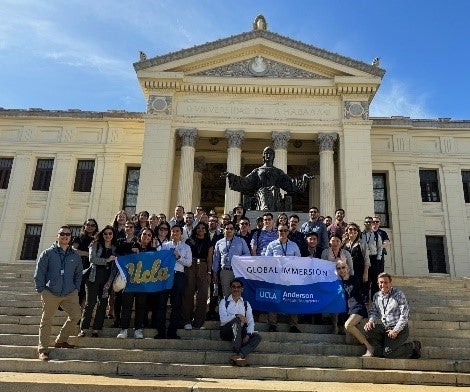
The Center for Global Management Organized Anderson’s First Global Immersion Course to Cuba for Students to Learn About an Economy in Transition
Sunday, December 17 - Saturday, December 23, 2023
During winter break, 40 students from three of UCLA Anderson’s MBA programs visited Havana, Cuba for the in-country week of the CGM’s first Global Immersion course to focus on and visit the island country. The course, titled: “Cuba: An Economy in Transition,” was taught by Gonzalo Freixes, associate dean of the fully employed and executive MBA programs and adjunct professor of accounting. Freixes is a native Cuban who immigrated to the United States with his parents in the early 1960s as refugees of the communist regime in the country.
This course looked at Cuba’s history and economy both before and after the Castro brothers assumed power in 1959. The Cuban Revolution of 1959 led to the establishment of a traditional communist economy in Cuba in the early 1960’s. Following a Soviet model, Cuba seized most major landholdings from its foreign or domestic owners, promulgated a centralized economy, abolished private ownership, and strictly controlled any kind of private enterprise. These reforms led to a mass migration of many in Cuba’s upper and middle classes, and the retaliatory imposition of an economic embargo by the United States. Cuba’s economy struggled due to these factors and relied on sizable subsidies from the Soviet Union to maintain itself economically. After the fall of the Soviet Union, Russia, P.R. China, Vietnam and other communist nations charted a different economic path, embracing private enterprise for economic gain. Cuba resisted these changes until after Fidel Castro stepped down from power in 2008. Thereafter, Cuba slowly adopted limited free market reforms, leading to a new 2018 constitution that recognized private ownership and foreign direct investment for the first time since 1959. Two trends emerged from this economic path: (1) The proliferation of small to medium size businesses across the island, and (2) government partnerships with foreign companies to develop Cuban industries, such as tourism, agriculture (tobacco, sugar), distilled spirits (rum) and mining. These initiatives have accelerated since Raul Castro stepped down as the country’s president in 2018. In pre-travel classes, students discussed the successes and failures of the Cuban Revolution, analyzed the trajectory of economic reforms in recent years, learned about Cuba’s rich culture, and gained an understanding of the impact of the Cuban diaspora on the United States. The week in Havana featured business visits and speakers in the energy, mining, agriculture, tobacco, rum, hospitality and tourism industries, while also educating students on the country’s health care system, government initiatives for small businesses, and the rich ancestry of Cuba’s population. The group also visited the countryside.
For the inaugural session, students heard from Matias Barcena, finance manager at Petro Australis Energy and former finance manager – oil, gas, and power at Sherritt International Corporation who spoke about foreign investment in Cuba's energy sector. “Sherritt goes to Cuba” was an assigned case for the course so students had good familiarity with the company. Barcena provided a helpful overview and described Cuba as a largely centrally planned economy dominated by state-run enterprises overseen by the Cuban government. Since 2011, he explained that the government has taken several measures to update the economic model. While Cuba is moving to a mixed economy, it is still recovering from the pandemic, U.S. sanctions, monetary instability, as well as the cost of repairs and recovery from the 2022 deadly fire at a large oil storage facility in Matanzas, and Hurricane Ian. Sherritt International has been the largest foreign investor in Cuba's energy sector over the last 30 years with investments in nickel and cobalt, oil and gas, and power. Barcena spoke about the renewable energy sector and explained how concerns over Cuba's dependence on oil imports are translating into the need for a fundamentally redesigned energy sector and more flexibility for investors. The pandemic also accentuated Cuba's need to diversify and move from oil-generated energy to renewable energy sources.
Students also learned from professors during the week. Luis Rene Fernandez Tabío, professor and researcher at the University of Havana’s International Economics Research Center, delivered a presentation focused on Cuba’s economic challenges for international inclusion. He addressed the adverse world economic context for the inclusion of Cuba in the global economy; how the Cuban economic situation is in the middle of a complex process of reforms; and the reinforcement of a U.S. economic and financial blockade of Cuba with the Trump and Biden policy of “maximum pressure.” He explained that in absolute terms, the blockade has adversely affected every sector of Cuba’s economy and the growth of the economy is in a very bad situation right now. The group also heard from Jorge Mario Sanchez, professor of the Center for Research in International Economics at the University of Havana. He spoke about the transformation of the Cuban economy and society, the country’s development challenges, its economic profile and current reforms. Since Fidel Castro’s ascent to power in 1959, there has been a long U.S. embargo and persistent hostilities. While the diplomatic relationship thawed under President Barack Obama, many restrictions have since been renewed. Cuba is currently dealing with inflation and economic contraction and many Cubans have been facing extreme shortages in food, medicine, fuel and power for the past few years. Sanchez spoke about U.S.-Cuba relations and provided a brief historical background. He discussed the legal framework and domestic and international implications. These two sessions were extremely helpful in providing context and a foundation for the week and represented valuable learnings for the class.
Some sessions also took place at the University of Havana, a public university located in the Vedado district of Havana. Founded on January 5, 1728, the university is the oldest in Cuba, and one of the first to be founded in the Americas. On the campus, students heard from Gerado Rodriguez Fuente, professor and researcher at the University’s Institute of Material Science and Technology, scientific consultant to International Zeolite Corp. (a Canadian-based company that operates as a mineral exploration company that covers the complete value chain from zeolite production and supply to direct consumer capabilities), and creator of NEREA Technology. He spoke about natural zeolite engineering and the development of new materials and utilization of technologies. Cuba has major reserves of zeolite, a mineral whose properties and uses in products and technologies contribute to protecting the environment. Currently, zeolites are widely used in various fields of the Cuban economy. Ana Maria Galvez, head of the department of health economics of the National School of Public Health in Cuba, addressed in detail Cuba’s national health system: its history, development, and results, and compared the major differences between the situation in 1959 when life expectancy at birth was under 60 years of age to present day when life expectancy at birth is 77.7 years (2022). She shared that Article 72 of the Cuban Constitution notes that everyone has the right to be healthy, attended to and protected, and that the state guarantees access to and quality of health care at no cost to the population. Galvez also spoke about the principles of Cuba’s public health system, the various levels of health care, how primary health care is organized and the main features of the Cuban model. She also explained the main changes in the Cuban economy over the last ten years, described its current complex economic conditions, and the challenges to ongoing transformation in the sector. Students were also taken on a guided walking tour of the campus.
The tourism and hospitality sector is a key pillar of the Cuban economy, and one where foreign MNCs operate, in partnership with State-owned companies to provide their services. At the University of Havana’s Faculty of Tourism, Alejandro Delgado Castro, vice chancellor and former dean spoke about tourism in Cuba. He shared some general facts about the island country, which has over 6,000 km of coastline, and reviewed its tourist regions. He also discussed destination brands, and explained how the tourism market is dominated by Canadians who make up over 26% of tourist traffic. Castro described how occupancy rates have dropped considerably in recent years and addressed some of the challenges facing the sector, including the ongoing fuel crisis and the U.S. embargo which restricts significant American visitors. Alberto Alfredo Matos, managing director of the Grand Aston La Habana later explained the different approaches in Cuba, for example a joint venture with the government or a management agreement. Grand Aston La Habana is part of the Archipelago International Group, Southeast Asia's largest privately-owned hotel management group. Matos spoke about Archipelago's main competition in Cuba, its growing portfolio on the island nation and expansion plans. New and important tourist markets for Cuba are Russia, Turkey, and Asia, including China.
At Loft Havana, a B&B, located in the center of Old Havana, students experienced Afro-Cuban traditions and cultural richness. They were greeted by rhythmic beats of drums while observing dance performances by artists adorned in colorful orisha costumes. This experience left the group with a deep appreciation for the cultural heritage of Cuba and the passion that fuels the Beyond Roots initiative, a venture focused on promoting Afro-Cuban culture from different perspectives, including organizing Afro-Cuban experiences that educate people who visit Cuba about Afro-Cuban heritage, traditions and culture. Students had an opportunity to hear from inspiring young Cuban women entrepreneurs who are trailblazers of entrepreneurship in the country. They discussed their respective startups, shared the unique stories behind their respective organizations and talked about the opportunities in Cuba’s unexplored marketplace. They also addressed some of the challenges they have faced along the way and how they have navigated these challenges, especially related to scaling and access to raw materials and financing. Professor Freixes moderated the panel discussion with Adriana Heredia, co-founder of the Beyond Roots Project (promoting Afro-Cuban culture); Ilse Anton Rodriguez, co-founder and Mabel Musa Acosta, marketing coordinator of Dador (a Cuban fashion and lifestyle brand); and Cintia Nuñez, founder of Agua de Marzo (a Cuban venture that designs, customizes and manufactures hair accessories).
The Cuban sugar economy is the principal agricultural economy in Cuba. The students visited the National Training Center of the Sugar Enterprises Group of Cuba (AZCUBA) where they heard from Raul Sabadi, director, engineering division of the Cuban Research Institute on Sugarcane Derivatives (ICIDCA), which is under the aegis of AZCUBA. AZCUBA is the state-run sugar agroindustry business group, that replaced the Ministry of Sugar in 2011. AZCUBA is in charge of directing and controlling the entities that make up the sugar agroindustry for the development of the production of sugars, electric energy, sugarcane derivatives and food for human consumption and agriculture. Sabadi spoke about the Cuban sugar agroindustry and its importance to Cuba, and all the various sugarcane derivatives. He described the importance of the bio-circular economy of sugar cane and explained how today, the sector is highly vulnerable to climate change. Students were also taken on a guided tour of the training center and learned more about the history of the sugar cane industry in Cuba and its importance to Cuba’s culture and identity. Students were also excited to visit the Havana Club (Pernod-Ricard) San Jose rum factory, a state-of-the-art distillery that produces dark rums. Havana Club is a brand of rum that was created in Cuba in 1934. Originally produced in Cárdenas, Cuba, by family-owned José Arechabala S.A., the brand was nationalized after the Cuban Revolution of 1959. In 1993, French-owned Pernod Ricard and the government of Cuba created a state-run 50:50 joint venture called Corporación Cuba Ron. They began exporting this version of Havana Club globally, except to the United States due to the embargo. Students learned about its successful strategic alliance with Pernod Ricard, and its progress and development over the last thirty years. Rum is a very important part of Cuban culture and traditions, and there are many specific regulations around how rum should be made. A rum master led the group on a walking tour of the distillery, where they heard about the aging process in the white oak barrels, and the bottling, before enjoying a farewell toast.
Havana is the birthplace of premium cigars and students were also excited to visit the Romeo y Julieta/H. Upmann and Partagas cigar factories. Herman Upmann was a German banker whose love for Habanos led him to settle in Havana in 1840 and found a bank and a Habano factory in 1844. The Partagas factory was created in 1845 by Don Jaime Partagás, and since then has been producing this prestigious brand of Habanos. Since the 20th century, almost all cigars are made of three distinct components: the filler, the binder leaf which holds the filler together, and a wrapper leaf, for appearance and flavor, which is often the highest quality leaf used. Students were fascinated to observe the work taking place on the factory floor in areas such as the destemming room and rolling gallery, by scores of workers make cigars by hand, in a variety of shapes and sizes. It’s an unrushed, antique and artisanal process, one that has not changed in any major way for hundreds of years. Cigars rely deeply on specific temperature and moisture levels. Proper cigar storage is therefore important as it can affect the future flavor of the cigar. During the week, the group had an opportunity to visit Humidores Havana, a private venture that specializes in the design and manufacture of unique, exclusive humidors. A humidor is an elegant wooden storage box that is designed to help keep and maintain a cigar’s humidity level. The craftsmen at Humidores Habana turn wood into some of Cuba's most elaborate humidors, some of them capable of holding hundreds of cigars. The group toured the design shop and art area where Jose Ernesto Aguilera Reina, the owner and founder of Humidores Havana dreams, designs, and sketches. He launched his business as a metalworking operation back in the early '90s, and then a few years later, discovered the need for humidors, and began working with wood. He was asked by Habanos S.A., a Cuban manufacturing company of tobacco that controls the promotion, distribution, and export of premium cigars and other tobacco products for Cuba worldwide, to build humidors for the Festival del Habano in 2005. The group learned how several of their pieces have been auctioned and raised hundreds of thousands of dollars over the years for the Cuban health care system. Students were also taken on a tour of the carpentry workshop to see the craftsmen at work in the main area.
Towards the end of the week, students engaged in dialogue with Marc Frank, a freelance journalist working for Thomas Reuters, who has also worked for the Financial Times and ABC News and written and consulted for numerous media and publications over the years. He is considered by many Cuba watchers around the world--in government, business and academia--to be one of the most informed English language foreign correspondents working in Cuba. The group appreciated an open Q&A with someone who has lived in and reported on Cuba during the fall of the Soviet Block, the great depression of the 1990s, the stepping aside of Fidel Castro, and the reforms orchestrated by Raúl Castro. Frank spoke about the history of U.S.-Cuba relations, Cuban politics and culture, and the economic situation in the country, and provided an insightful and detailed account on twenty-first century Cuba so students could grasp what has been happening in Cuba since the Revolution as well as more recently, over the last ten years. He also shared his honest and unbiased observations on extraordinary positive developments in social matters, like health care and education.
The week included a visit to Vista Hermosa Farm to see, hear and learn about the livestock and agroecological model of Vista Hermosa Farm and its core principles. The farm, a family plantation, is a pioneer of the Slow Food movement (that believes food should be grown and bought locally, prepared with care, and consumed with appreciation), and an active member of the Slow Food Network that was founded with the intention of increasing the visibility and support for agroecological farming in Cuba with the mission and goals of Slow Food. Students enjoyed a tour of the farm to learn about its various agricultural practices, saw livestock roaming around and walked through some of the fruit trees, such as coconut, mango, guava, banana, and papaya. They also saw the semi-protected cultivation area where various vegetables and aromatic plants are produced, and the facility where milk, cheese and yogurt are produced. They enjoyed a delicious and healthy lunch with many of the products on the menu coming directly from the farm. Students also visited the countryside with a trip to Las Terrazas. An hour or so drive from Havana, Las Terrazas is, a small rural community and self-sustainable eco-village, which was designated a Biosphere Reserve by UNESCO in 1984. The Las Terrazas project arose at the end of the sixties with the purpose of recovering an area that had been destroyed by the intensive cultivation of coffee in the 19th century. In 1968, a plan was put into action to reforest around 50 sq. km. in the area and to gather families isolated in the mountain ranges into several communities. The system used was that of flat terraces in order to avoid soil erosion due to the intense rainy season, creating the first ecological, social and sustainable development project. Las Terrazas is also the site of the earliest surviving coffee plantations in Cuba. Students enjoyed a tour with one of its resident villagers and learned about the lifestyle of the villagers in the Cuban countryside and their sustainable model of living, and visited the art gallery and studio of Lester Campa, an internationally renowned painter whose works are inspired by the landscape of Las Terrazas. They also visited the ruins of the historic Buenavista Coffee Plantation, the oldest coffee plantation in the country. It is a historical relic, which was built in 1801 by French exiles from Haiti, and still preserves the foundations and some constructions that are carefully protected and maintained.
Throughout the week, students got to experience some of the culture and culinary delights of Cuba. They enjoyed an architect-led walking tour of the pedestrian-only historic center of Old Havana which was awarded UNESCO World Heritage status in 1982 because of its unique Baroque and neoclassical architecture, its fortifications, and its historical importance as a stop on the route to the New World. During the toured they visited Havana’s four main squares: Plaza de la Catedral (Cathedral Square), Plaza Vieja (Old Square), Plaza de Armas (Main Square) and Plaza de San Francisco de Asis (St. Francis Square). They were driven to Castillo del Morro, among the oldest Cuban Castles, it is a historical fortress at the entrance of the Port of Havana, with spectacular views of the city. They visited the Hotel Nacional de Cuba, a historic Spanish eclectic style hotel in Havana opened in 1930. This iconic hotel is a UNESCO World Heritage Site and in 2010 was inscribed in the World Memory Register by UNESCO. The hotel is located on the sea front of the Vedado district of Havana on Taganana Hill with commanding views of the sea and city, and considered a symbol of history, culture, and Cuban identity. At the conclusion of the week, the group heard from Alberto Gutierrez, president of the Classical Car Club A Lo Cubano, one of the most important and active car clubs in Cuba and the driving force behind the remarkable club, that celebrates Cuba's automotive heritage. Students enjoyed a ride and explored the streets of Havana in beautifully restored vintage pre-1959 classic cars. They visited Plaza de la Revolución, one of the largest public squares in the world as well as a place of great historic value and the scene of several of the main events throughout the Cuban Revolution. Located on the northern side of the Plaza is the José Martí Memorial, a memorial to José Martí, a national hero of Cuba, who became a symbol of Cuba's bid for independence from the Spanish Empire in the 19thcentury. The cars then drove the group to dinner at La Mansion Castillo, a beautiful late nineteenth century mansion in Vedado. It was a unique opportunity for students to travel to Cuba. They experienced the warmth of the Cuban people, learned a great deal, and shared an unforgettable and immersive educational and cultural experience together.
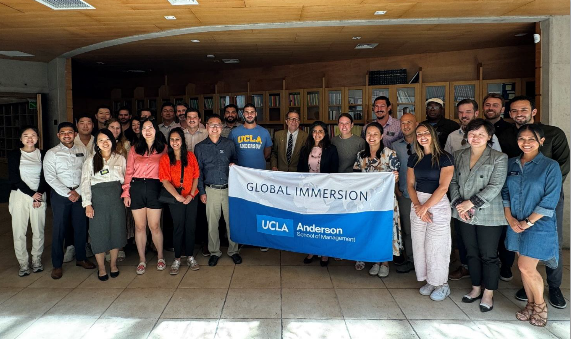
During a Pivotal Time in Chile’s History, Students and Alumni Visit Santiago to Learn About Doing Business in an Advanced Middle-Income Country: Chile
Sunday, December 17 - Saturday, December 23, 2023
During winter break, over 30 students and alumni from all four of UCLA Anderson’s MBA programs traveled to Santiago, Chile to get a sense of what it is like for business leaders to live in an environment where the future rules of the game are being determined. The course, titled: “Doing Business in an Advanced Middle-Income Country: Chile,” was taught by Sebastian Edwards, UCLA distinguished professor, Henry Ford II Chair in International Management and a native of Chile. This was the eighth global immersion course to focus on and visit Chile and the sixth time that Professor Edwards led a course to the southernmost country in the world.
Students studied the way in which economic policy in Chile – the most successful country in Latin America in the last three decades – affects business opportunities. An important feature of the course is that it put Chile’s case in context with that of the rest of the Latin American nations (with special mention to Argentina, Brazil, Mexico and Venezuela). The course also reviewed the way in which politics affects both economics and policy options. Chile has vast deposits of natural resources and sophisticated financial, business, and political institutions. It has the second largest lithium deposits in the world, the number one copper deposits, an incredibly varied climate, and one of the best locations in the world for solar (northern desert) and wind clean energy (Patagonia). It also has vast potential for green hydrogen. When it comes to global business, it is one of the most interesting countries in the world. It has immense potential, but it also has challenges, which the course explored in detail. Before traveling to Chile, on-campus class sessions covered some of the most important economic, business, social and political aspects of the country, cultural issues as well as social and business challenges.
In October 2019, and to the surprise of most analysts, major demonstrations erupted in Chile, the most advanced country in South America. They were massive and at times violent. This process, which the course studied in detail, resulted in the election of a Constitutional Convention, to write a new constitution for the country. This new “law of the land” will determine the way in which Chile organizes its society, its politics, and its business in the next 40 to 50 years. What is remarkable about this process is that it is the first time a constitution is being written by a body with gender parity: an equal number of men and women, by design. In addition, the Constitutional Convention reserved seats for indigenous people, for the First Nations. Students arrived in Santiago on Sunday, December 17, the day of Chile’s second referendum on a new constitution (after the previous constitution text draft was rejected). Chileans rejected this second proposal for a new constitution to replace its current text that dates back to the Augusto Pinochet dictatorship, prolonging uncertainty and highlighting the failure of the nation’s political system to channel social discontent into a new set of basic laws. During the week, students heard from prominent business and thought leaders, academics, politicians and senior policy makers, as well as successful entrepreneurs. Davos-style conversations helped to illuminate Chile’s economic and business environments. Discussions addressed many of specific issues that are currently affecting Chile’s business environment and connected policy issues with many of the country’s key business sectors, such as mining, lithium, fishing, renewable energy, and tourism and the environment.
The inaugural session in Santiago took place at Centro de Estudios Publicos (CEP), a private non-profit foundation of an academic nature which seeks to contribute to knowledge on issues of public interest, in favor of a free and democratic society. CEP is one of the most influential thinktanks in the country, engaged with the constitutional debate, public policy, modernization of the State, and the study of social sciences and humanities. Economist and Senator Felipe Kast spoke about the meaning of the referendum. He shared with students his own personal background and the influence of his family, who had also been in politics. Senator Kast described the 2019 street protests and major demonstrations in the country when thousands of people complained about the inequality in Chile, one of Latin American’s most politically stable and economically strong countries. He explained the background surrounding the drafting of a new constitution, described the first and second proposals (both of which were rejected by Chilean voters), highlighted the differences between the two, and shared his views and observations on the focus of the country after this second rejection which showed that the country had become polarized and divided. Felipe Kast is the son of the late economist Miguel Kast, who served as Minister of State and President of the Central Bank under the dictatorship of Augusto Pinochet. This was a very fitting start to the program and provided terrific context and foundation for the week.
Philosopher, political scientist, author and economist, Leonida Montes, director of CEP also provided an analysis of the plebiscite results. Since 1987, CEP’s public opinion polls have reflected the evolution of the Chilean society, and assess the country’s political, economic, and social temperature. He discussed the change in public opinion over the years and walked the group through the changes in public opinion since the 2019 protests, leading up to the constitutional referendum in October 2020, where the majority of voters agreed to the drafting of a new constitution, to the constitution’s first rejection in September 2022 and then its most recent rejection on December 17, 2023. He described some of the survey questions used and corresponding responses to understand political and economic perceptions, vision of the country and its main challenges. An analysis of the results in this way was extremely insightful and helped students to better understand public opinion and temperature on various issues in the country, including those surrounding immigration. Montes also shared his views on the future of Chile and where he sees the country going.
Students also had an opportunity to hear from economist Claudia Sanhueza Riveros, Undersecretary for International Economic Relations of Chile – the first woman to hold the position – under the government of Gabriel Boric. During the first year of President Gabriel Boric's administration, she served as Undersecretary of Finance. Undersecretary Sanhueza spoke about Chile’s trade and investment policies and the Government of Chile’s policy for attracting investment. She described the country’s trade policy which comprises openness to trade and investments and explained the focus on diversification and building up the complexity of Chile’s exports basket, and attracting investment related to value added, technologically sophisticated activities and/or sectors (e.g. Green Hydrogen plants, lithium investments with downstream linkages such as cathodes, etc.). All this, while also promoting inclusive and sustainable practices. Undersecretary Sanhueza also talked about foreign direct investment (FDI) and explained that Chile has one of the highest ratios of FDI flows to GDP, above Latin America and the world’s average, and that mining, finance and energy receive the bulk of FDI. She also addressed key investment opportunities. For example, Chile is not only the most attractive emerging economy for investment in clean energy, but it also produces minerals that are critical for the energy transition such as copper and lithium.
Mining is extremely important to Chile and one of the pillars of the Chilean economy. Chile is the world’s largest producer of copper and the world’s second largest producer of lithium. Loreta Silva, former deputy minister of public works in the government of the late President Sebastian Pinera addressed the importance of mining to the country’s economy and walked the students through the evolution of mining in Chile over the years. She touched on some of the challenges for the sector, including geopolitics, environmental, licensing and bureaucracy. Given her experience in the country’s infrastructure sector, she also spoke about investment and private-public partnerships in infrastructure and how this has evolved over the years to the present day. Later in the week, this was complemented by a discussion on lithium with politician and businessman, Francisco Javier Errázuriz Ovalle, director of Grupo Errazuriz, an engineering and construction company with over four decades of experience leading mining, energy and infrastructure project development. Errázuriz, who has led the family businesses for a decade focused his time talking about lithium, defined as a strategic mineral in Chile’s Constitution. Lithium is a critical mineral that is used in electric car batteries and is key to the global green energy transition. He described the world’s lithium reserves and explained that mining for lithium in Chile is complicated and that new concessions post 1979 require special exploitation contracts. Chile produces lithium from brine deposits, which are underground lakes of saline groundwater located under salt flats. Brine operations have longer lead times than hard rock mining but producing lithium from brines has a much lower greenhouse gas emissions intensity than lithium produced from hard rock mining. He described some of the company’s lithium projects, including a multimillion-dollar project in the Maricunga salt flat that is environmentally friendly and uses green technology, with low water and electricity consumption, and brine reinjection.
Daniel Charlin, head of business development at Grupo Cerro spoke about the Chilean power market opportunities, including internal and external challenges affecting the country’s power market. Grupo Cerro, owner of the Cerro Dominador solar thermal plant, seeks to contribute to the transformation of the energy matrix by developing renewable, flexible, manageable and sustainable energy projects. He described the energy transition from coal to renewables, including wind and solar, and renewable energy storage. The Cerro Dominador solar power plant project in the Antofagasta Region of Chile is a 210-megawatt combined concentrated solar power and photovoltaic plant. The project is part of Chile's national renewable energy program, intended to provide Chile with cleaner energy, while also reducing its dependency on fossil fuels like coal and natural gas. The construction, operation and maintenance of the plant will also act as a catalyst for regional socio-economic development, creating a large number of direct and indirect jobs in construction, development, commissioning and plant operation as well as a network of services that will promote economic growth in the region. Students also learned about environmentally friendly rare earths from Ramon Barua Costa, chief executive officer and director of Aclara, a company focused on the production of heavy rare earths. Rare earth elements (REEs) play a critical role in national security, energy independence, environmental future, and economic growth. Many advanced technologies have components made from REEs such as magnets, batteries, phosphors, and catalysts. He explained that the transition to green energy technologies, for example EVs and wind turbines will drive exponential demand for rare earth elements and that Aclara aims to produce rare earths, critical elements for the fight against climate change, in a sustainable, traceable and green manner.
Diego Figueroa, culture leader at Arauco, a global manufacturer of forest products, with roots in sustainable forestry and innovative product development, spoke to the group about the forestry industry in Chile, one of the main economic sectors of the country and an important export sector. Chile has an extensive and complex native forest resource that covers around 23% of the country's surface area. He explained that the industry is at the center of the transition to a sustainable economy, as forestry products can capture and store CO2 and can replace fossil-based materials in industries such as packaging, construction, apparel, retail and energy. Arauco is the world’s first carbon neutral forestry company and believes in a future where products currently made from non-renewable materials can mostly be manufactured from wood-based materials.
From the extreme north with the driest desert in the world to the austral south with eternal ice and inverted waterfalls, there are many wonderful experiences in the southernmost portion of the world making tourism a very important sector and main source of income for Chile, especially in its most extreme areas. Students had the opportunity to hear from Gonzalo Undurraga, chief executive officer of Explora. Explora is a family-owned business and luxury hotel owner and operator, focused on South America and its hotels serve as the base camp for exploration and building experiential awareness of the magnificence and fragility of Chile’s unique territories. The first property of Explora in Patagonia, launched in 1993, and is situated in the heart of the Torres del Paine National Park. Undurraga talked about evolution of the Explora brand, the business model of the company as well as the vulnerability of the model, the company’s strategy and its profound commitment to conservation. He also addressed Explora’s international expansion plans, which began in 2016 with the opening of its lodge in Peru’s Sacred Valley, halfway between Cuzco and Machu Picchu.
During the week, students also had the opportunity to hear from prominent UCLA and UCLA Anderson alumni, including Ricardo García (M.A. ’89), Pamela Gidi (’99), Raúl Sotomayor (’91) and Andrés Echeverría (‘93), who, in addition to talking about their various sectors, also described their career paths since graduating from UCLA.
Ricardo Garcia (M.A. ’89), chief executive officer of the Chilean headquartered fishing and seafood farming company, Camanchaca, spoke to the group on the oceanic economy, aquaculture and fishing, and sustainable food sourcing. Garcia discussed the importance of the fishing sector to the Chilean economy and the challenges and impact of climate change. He spoke about sustainable food sourcing, suggested that the ocean economy can be part of the solution and that the under-used ocean offers an advantage: it can replace land food, significantly reducing CO2 emissions. Camanchaca was founded in northern Chile in 1965 to catch and process shrimp and langostino lobsters and is a leader in the Chilean aquaculture industry and a pioneer in the Chilean fishing industry. Pamela Gidi (’99), discussed Chile’s recent transformation as the digital hub within the Latin American region and the country’s advances in connectivity, including in schools, and the goal to build a fiber optic spine throughout Chile. Gidi is the former undersecretary and vice minister of telecommunications who was appointed by the late President Sebastian Pinera to lead telecommunications and digital development in the country from March 2018 to June 2021, during Pinera’s second government. She was responsible for the first 5G tender in Latin America, as well as a number of other tenders that led to positioning the country as the digital hub in the region.
Students were also provided with an overview of Chile’s financial system from Raúl Sotomayor (’91), partner at Southern Cross Group. The company is one of the longest standing and largest independent Latin American focused private equity fund managers that covers various sectors in the Latin American market. He also spoke about the investment environment in the region and various investment successes and failures and compared and contrasted Chile’s financial system with those in other countries in the region. Andrés Echeverría (‘93), founder and managing partner of Frontal Trust, an investment fund management company that specializes in alternative asset management, with presence in Chile, Peru and the U.S., described the company’s current business units and their involvement in a wide range of alternative assets. The company manages both public and private funds with a focus on real estate, private equity, private debt and infrastructure.
Alejandra Cox, former president of the Asociacion de Administradoras de Fondos de Pensiones (AFP), the Chilean Pension Fund Administrators Association, provided an overview of pensions and the economy and explained the system in the country. Today, this is a very important topic and hot issue in the country. In 1981, Chile replaced a traditional pay-as-you-go system with a three pillars system which was initially regarded as a gold standard among retirement schemes and served as a blueprint to reform the pension systems of many Latin American countries. She described some of the weaknesses in the current system, including a mandated contribution of 10%, the pension age for men is set at 65 and for women at 60 and workers contribute on average for only 20 years. Today, the system is despised by a large number of Chileans and its survival in its current form is doubtful. There is now a consensus that something must be done to address the “pension problem.” The government is proposing initiatives to reform the country’s pension system. Manola Sanchez, board member of the Banco de Credito e Inversiones (BCI) and the first female dean of the Universidad Adolfo Ibanez (UAI) Business School also addressed the group on this visit. Sanchez, who was the first Chilean woman to obtain an MBA from Harvard, talked openly about Chile’s political instability, growth prospects and its uncertain environment for business and what it is like for business leaders to live in an environment where future rules of the game are being determined. She addressed topics ranging from education to immigration to digital payment systems, as well the business culture in the country, women in the workforce, diversity and inclusion and her own career path. During the week, students were exposed to a number of extremely successful and influential female leaders in the business and political worlds in Chile. They were inspired and really enjoyed the personal stories of speakers which made them real and relatable.
The group also had the opportunity to learn about entrepreneurship in Chile from Chilean entrepreneur, Thomas Kimber, founder and chief executive officer of Karün. He spoke passionately about the company that is a Chilean B corporation and offers sustainable and high-quality eyewear. Karün’s products are made with recycled and traceable materials. The company works with local rural communities in Patagonia to collect the materials, in an effort to restore the natural ecosystem and regenerate the economies of these communities. Through the Karun Traceability System, powered by blockchain, customers can also track the production process and carbon emission of each product. He spoke about his entrepreneurial journey and some of the challenges along the way, and also addressed the company’s business model and value chain and highlighted the importance of having a positive social impact.
Professor Edwards likes to incorporate an art/sports/cultural session into the week which is very appreciated by students and adds another dimension to the learning experience. During a visit to the Grange School, a private school in La Reina, Santiago, in addition to learning about Chile’s educational system from the headmaster, Nicholas Eatough and general manager, James Brackenridge, students were taken on a tour of the school by Grange prefects. They explained the history and traditions of the school, how its system works and its four key pillars of academics, arts, sports, and service. Students had the opportunity to learn about Chilean rugby, a popular sport in the country from current students as well as players on the National Rugby team, which qualified for the 2023 Rugby World Cup for the first time in history. Francisco Planella, rugby legend and captain, First XV Los Condores 1980s, who laid the platform for the Chile stars of today and Matías Vergara, former captain, First XV shared their hopes for the future of rugby in Chile.
At the end of the week, students learned about the wine industry, an important sector in Chile which stands as one of the world’s largest producers and exporters of wine globally, mostly to China, the U.S., UK, Brazil and Japan. The group visited Kingston Family Vineyard in the Casablanca Valley, which has been recognized among the best wineries in Chile and for “making some of Chile’s best pinots” (Food & Wine). Students had the opportunity to hear about the business of wine and learn the story of the Kingston Family Vineyards from founder and chief executive officer, Courtney Kingston who joined remotely from California. Students were taken on a tour of the winery and during dinner, enjoyed wonderful wines, paired with various courses, while looking out on spectacular views over the Casablanca Valley. Kingston Family Vineyards is a Chilean winery located in the Casablanca Valley of Chile. Founded in the early 1990s and considered pioneers for growing cool-climate red wine grapes in a valley known for whites, the vineyard's wines have been featured on wine lists at top restaurants, including La Mar Cebichería in San Francisco and Boragó in Santiago.
During their time in Chile, in addition to hearing from some successful and influential UCLA and UCLA Anderson alumni, students also had the opportunity to network with many UCLA Anderson alumni during an evening reception at The Ritz-Carlton Santiago and saw firsthand the power of the UCLA brand and community in Chile. Students also enjoyed a Santiago city tour. They visited La Moneda, the Presidential Palace, Plaza de Armas and enjoyed 360-degree views of Santiago from Sky Costanera, the tallest building in Latin America. Students traveled a lot on foot to experience the city the way locals travel. When the program concluded, some stayed in Santiago, some headed to Valparaiso, Patagonia and Easter Island, or headed to other countries in the region or back to the U.S. Students were amazed by the week, and thoroughly enjoyed their time in-county – they learned a great deal, were inspired, met good friends and had a truly immersive experience together.
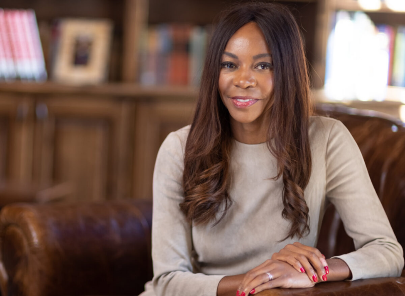
Framing the Effects of Artificial Intelligence on Global Economic Growth and Development The 2023-24 Arnold C. Harberger Lecture on Economic Development with Baroness Dambisa Moyo, Economist, Best-selling Author, and Member of the British Parliament
Thursday, November 16, 2023 5:00 p.m. PST
The advent of Artificial Intelligence (AI), and generative AI, demands a rethink of our approach to driving economic growth and development. At a minimum, the era of AI will likely disrupt the conventional growth models that have governed economic modeling and understanding for numerous centuries. On Thursday, November 16, economist Baroness Dambisa Moyo of Knightsbridge, a member of the British Parliament, delivered the 2023-24 Arnold C. Harberger Lecture on Economic Development, and examined how the era of AI will have an array of effects on business, society and government. Firstly, on business: with implications beyond merely productivity gains and cost reductions. Secondly, on society: particularly, if the benefits of AI largely accrue to holders of capital, rather than labor, risking widening inequality. Thirdly, on government: specifically, the changing role of the state, as the global economy confronts an era of labor-less growth as AI technologies displace human workers and create a jobless underclass. The discussion was moderated by Kal Raustiala, the Promise Institute Chair in Comparative and International Law at the UCLA Law School. Baroness Moyo is a member of the United Kingdom’s House of Lords. She is a principal of Versaca Investments - a family office focused on growth investing globally. She also serves on a number of global corporate boards including Chevron, Conde Nast, and the Oxford University Endowment investment committee. Her areas of interest are capital allocation, risk, and ESG matters. Baroness Mayo is the author of five bestselling books on the global macroeconomy and geopolitics. She holds a PhD in economics from Oxford University and a Master’s degree from Harvard University. Established in 1997, the Arnold C. Harberger Distinguished Lecture on Economic Development celebrates Arnold Harberger as an eminent scholar and teacher. The lectures provide a special forum for outstanding students of international economics and policy to present their views and research to the UCLA community and the public. VIEW VIDEO
The event was hosted by the UCLA Burkle Center for International Relations and sponsored by the UCLA Anderson Center for Global Management. It was open to UCLA students, alumni, faculty, staff and members of the extended UCLA community and general public.
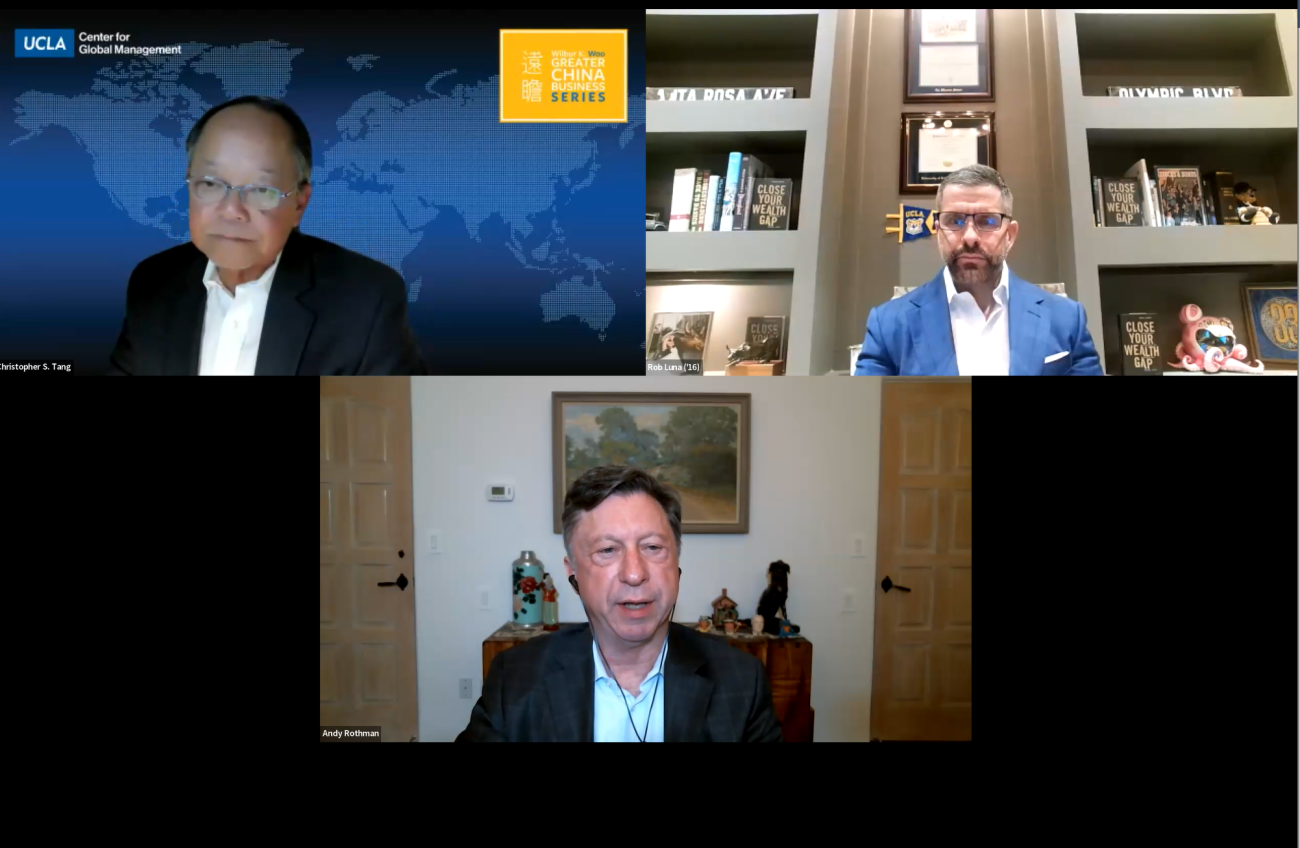
Wilbur K. Woo Greater China Business Series: Is China Still Investible?
Tuesday, November 14, 2023 5:00 p.m. PST
China’s economy has rebounded this year as mobility and activity picked up following the lifting of its “Zero-COVID” policy. However, China's manufacturing and consumer spending are weakening after a strong start to 2023 after anti-virus controls ended. Currently, the world’s second largest economy still faces significant economic challenges: a trade war, geopolitical tensions, crackdown on technology and property markets, and rapidly changing regulations. Longer-term, headwinds to growth include an aging population, high youth unemployment, rising labor costs and slowing productivity growth. The current climate in China is increasing uncertainties (and even risks) for U.S. firms to operate in China and risky for foreign investors to invest in China.
Is China a good place to invest now? As U.S. foreign direct investment into China is dwindling, are there any Chinese stocks worth investing in? Do the renewable energy and industrial automation sectors provide value creation potential? Will the high-risk high-return investments in China become a thing of the past, or does investing in China simply require a nimbler and more selective investment approach? On November 14, the Center for Global Management (CGM) hosted the third conversation in the series which addressed these questions around the overarching theme and question, is China still investible? Author and wealth strategist Rob Luna (’16), chief executive officer of Real Talk Capital, and Andy Rothman, investment strategist at Matthews Asia, responsible for research on China’s economy and on U.S.-China relations who has been following China for years, joined a moderated conversation with CGM faculty director Professor Chris Tang. They addressed the current state of China’s economy, investor trends, challenges and growth opportunities, and shared their predictions on the longer-term prospects for China’s economy and the bright spots for investors.
The event was featured as a discussion in the Wilbur K. Woo Greater China Business Series and open to UCLA students, alumni, faculty, staff and members of the extended UCLA global community and general public. The Wilbur K. Woo Greater China Business Series is organized by the Center for Global Management, and sponsored by Cathay Bank. UCLA’s Asia Pacific Center, UCLA Anderson’s Greater China Business Association (GCBA) and UCLA’s Chinese Students and Scholars Association (CSSA) are supporting organizations. VIEW VIDEO
About the SeriesThe Wilbur K. Woo Greater China Business Series engages leading executives, innovators, influencers, investors and academics in conversations around the major forces, trends and innovations in the region across society, enterprises and consumers. Through balanced discourse, the series serves as a neutral forum to exchange ideas and learnings, understand new norms and models, and provide forward-looking perspectives on advancements to better understand the trends, opportunities and challenges of doing business in and with the Greater China region.
Born in China in 1916, the late Wilbur K. Woo (B.A. ’42) received his bachelor’s degree in business administration from UCLA. He went on to become a major figure in LA's business, political, cultural and charitable arenas and was known for his decades of leadership in the Chinese-American community. Global reach starts with global thinking, and two decades ago -- recognizing the rapid expansion and modernization of China’s economy -- Wilbur Woo, the vice chairman of Cathay Bank, and his wife Beth endowed the Wilbur K. Woo Greater China Business Conference at UCLA (now rebranded as a Series) to show their gratitude for the training Wilbur had received at his alma mater. The Woos' goal was to facilitate dialogue, promote understanding, and strengthen the important ties between the Greater China region and the United States—to identify areas of collective opportunity, foster cooperation, and bring a group of leaders—both aspiring and current -- together to collaborate and learn together. These events and discussions have continued to have a powerful impact on our community—here at UCLA and beyond.
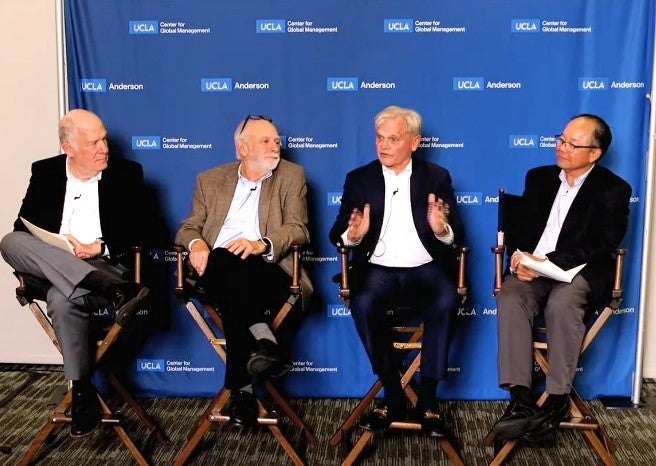
Global Business & Policy Forum: Big Tech’s Challenges to Antitrust Law in the U.S. and Globally
Tuesday, November 7, 2023 5:00 p.m. PST
Over the past decade, Big Tech has posed major challenges to regulators charged with enforcing antitrust and competition laws in the U.S., Europe, and Asia. Several tech firms, such as Alphabet (Google), Amazon, Meta (Facebook), and Apple have become enormously powerful in the marketplace. Regulators and others are worried that these firms have monopoly power that has the potential of reducing or even eliminating competition. While at the same time, the large tech firms have had voracious appetites for buying up potential competitors at early stages, e.g., Meta’s purchase of Instagram. Will Big Tech’s monopoly power suppress competition and hurt consumers? Are U.S. antitrust laws and the regulators who enforce them well-suited to deal with Big Tech’s power and pervasiveness, and the growing influence of AI or will they simply stifle innovation in the U.S.?
On November 7, in UCLA Anderson’s executive dining room, students of management and law joined the UCLA Anderson Center for Global Management (CGM) and UCLA School of Law’s Lowell Milken Institute for Business Law and Policy (LMI) for the inaugural discussion of the 2023-24 academic year of their joint Global Business and Policy Forum series, now in its 11th year. The discussion centered around big tech’s challenges to antitrust law in the U.S. and globally. Bill Baer, one of the world’s best known and respected antitrust/competition enforcers and Richard Parker (J.D. ’74), a preeminent antitrust expert and partner in the Washington, DC office of the international law firm Milbank LLP reviewed the general landscape of where Big Tech is now and how it ought to be analyzed. The session then transitioned into a broader discussion and interactive conversation with questions posed by moderators, Joel Feuer, LMI’s executive director and Chris Tang, CGM’s faculty director, which brought out other themes that explored these timely and critical issues that are highly significant to economies worldwide. The conversation considered whether U.S. antitrust laws and competition laws are robust enough to deal with the current situation involving big tech and its power over the economy, explored how the evolution of antitrust laws in the United States differ from those in the European Union, and from an objective standpoint, considered which system has demonstrated greater effectiveness in safeguarding consumer interests. National security implications of big tech were also addressed.
Current students from across Anderson’s MBA, MSBA, MFE and Ph.D. programs and the Law School’s LLM, JD and MLS programs attended the evening that began with a networking reception and concluded with a networking dinner. Following the discussion, the in-person student audience engaged in interactive table conversations and analyzed the issues from both a business and legal lens. Students reflected on the discussion and shared their views on what role antitrust should play with regard to dominant tech platforms, especially since most platforms do not charge consumers for access, and for the most part antitrust has focused on ensuring consumers receive the price benefits of competitive markets. Students also considered whether there is a political dimension to the antitrust laws, i.e. large firms have out size and potentially damaging influence politically and whether this is relevant to antitrust analysis and should it be. The discussions were thought-provoking and raised many issues from both a business and legal perspective and provided students with the opportunity to hear and learn how issues are analyzed and considered. The discussion was also a featured event as part of UCLA’s 2023 International Education Week and was broadcast live and attended by many additional students and alumni, as well as members of the broader UCLA and general communities. The Global Business and Policy Forum is a collaborative partnership between the Center for Global Management and UCLA School of Law's Lowell Milken Institute for Business Law and Policy. VIEW VIDEO
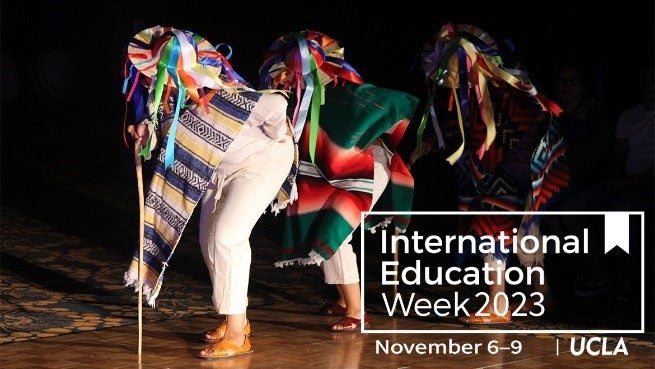
International Education Week (IEW) at UCLA
Monday, November 6 through Thursday, November 9, 2023
International Education Week (IEW) is an annual celebration of international education and exchange initiated by the U.S. Departments of State and Education and observed each fall at college campuses throughout the United States. IEW is a time to recognize and acknowledge the benefits and importance of the global mobility of students and scholars to study, research, or teach; of those who engage in community-based service learning at home and abroad; and of the continuing need to increase knowledge about the world, intercultural skills, and the capacity to solve global problems collaboratively.
International Education Week 2023 at UCLA ran from November 6 – 9, 2023. For the eighth year in a row, the UCLA International Institute led a large-scale UCLA cross-campus collaboration in observation of IEW through a mix of in-person and virtual programming. IEW took a deep look at the enduring value of international education and exchange through the eyes of faculty, students and alumni, and was attended by hundreds of Bruins (past and present) and the general public. The Center for Global Management is a cosponsor of IEW each year. The CGM’s Global Business & Policy Forum, a collaborative partnership with UCLA School of Law's Lowell Milken Institute for Business Law and Policy, that took place on November 7 and focused on “Big Tech’s Challenges to Antitrust Law in the U.S. and Globally,” was a featured event in this year’s IEW.
Rated the top public university in the United States for seven years in a row by U.S. News & World Report, UCLA is a global university with a “glocal” vision, one that connects the world with local communities. In the city of Los Angeles, all global activities have local connections. The research conducted on campus — whether in the social sciences and humanities, medicine, economics, the life and environmental sciences, engineering or the arts — impacts people here in Los Angeles and around the world.
With support from 34 campus units, IEW 2023 offered students, faculty and staff a broad range of over 50 events and activities that showcased the depth and breadth of UCLA’s international educational and cultural resources. From musical and cultural performances to martial arts classes to lectures on global politics to international career events, there was something for everyone to enjoy.
The week highlighted the immense value of international education for U.S. students — whether acquired through study abroad, language study, international internships, research or internationally oriented coursework — as well as the immeasurable contributions made to U.S. campuses by students and scholars from other countries, whose unique perspectives expand our understanding of the world. UCLA’s diverse student body, faculty and staff bring deep connections to numerous world cultures to our communities on campus and in Los Angeles. When young Bruins become fluent in other languages, study or conduct research abroad and/or work with peers from other countries, their lives become enriched and their perspectives broadened. These experiences help build the intercultural fluency needed for today’s workforce and to collaborate with people from diverse backgrounds in a global, interconnected world. Knowledge of world regions and intercultural communication skills are especially needed to address urgent global challenges, which span geopolitical conflicts, accelerating climate change, socioeconomic inequity, systemic racism and global health crises. The broad array of activities can be viewed on the UCLA website for IEW.
The UCLA Glocal Conversation has become an IEW campus tradition. This year’s event, held on Wednesday, November 10 at the UCLA Faculty Club, built upon last year’s theme – “Global Challenges, Local Responses.” In alignment with the new UCLA Strategic Plan, this year’s Conversation focused on UCLA’s Glocal impact and the university in an interconnected world, and explored the ways in which UCLA research and programs connect global and local communities. The event featured remarks by Darnell Hunt, Executive Vice Chancellor and Provost, and a moderated panel discussion featuring UCLA faculty and leaders who examined the glocal nature of their work. Eric Esralian, a health sciences clinical professor of medicine at the David Geffen School of Medicine and Emmy-nominated film producer active in charity and community service activities in Los Angeles, was joined by Silvia Forni, director of the UCLA Fowler Museum, Andrea Ghez, recipient of the Nobel Prize in Physics (2020) and the Lauren B. Leichtman & Arthur E. Levine chair in Astrophysics at the UCLA Department of Physics and Astronomy, and Ruben Hernandez-Leon, professor of sociology and director of the UCLA Latin American Institute. The conversation was moderated by Cindy Fan, vice provost for international studies and global engagement. VIEW VIDEO
The enthusiastic support for International Education Week across campus again this year reflected UCLA’s status as one of the world’s leading global universities, one whose graduates and research have a global impact.
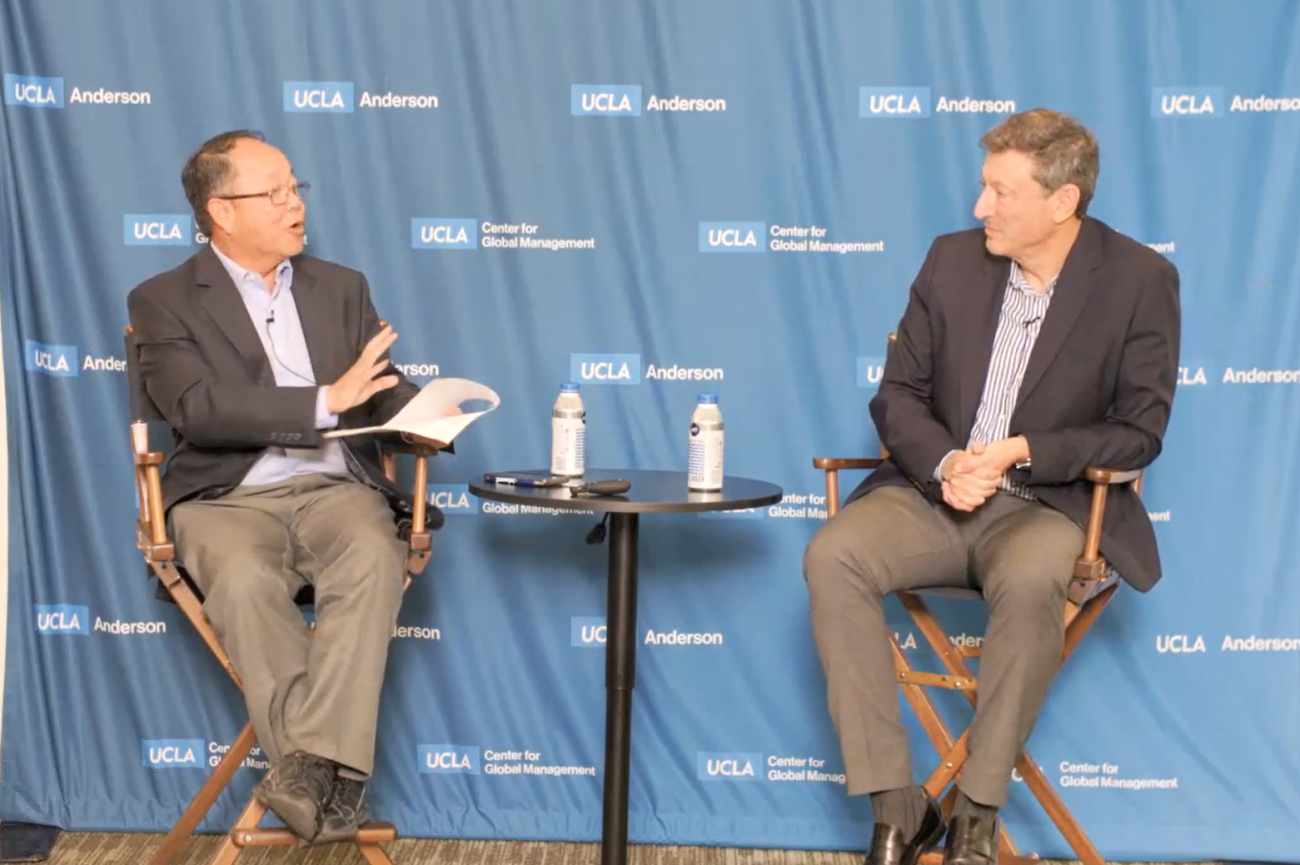
World Today Discussion Series: How Generative AI Will Change Products, Services, Industries and Society Around the World
Thursday, October 19, 2023 6:00 p.m. PDT
Since the launch of OpenAI’s ChatGPT in late 2022, generative AI (GenAI) technology has been advancing at a rapid pace. Gen AI has the potential to influence and add enormous value across the global economy, generating productivity and augmenting imagination. Its impact to consumers, business, industries and society could be profound. Managing the challenges and opportunities associated with gen AI will be important: the human element, the evolving regulatory environment and how to harness AI in a trusted manner, as well understanding the implications for the workforce and future of work and considerations for businesses and society.
On October 19, the Center for Global Management (CGM) hosted its inaugural discussion of the new academic year in its World Today Discussion Series, in partnership with the Easton Technology Management Center. As the world grapples to understand the technology’s power, reach, and capabilities, students from across all of Anderson’s degree programs joined the evening to listen and learn from the faculty directors of the two centers, Chris Tang and Terry Kramer. They addressed the latest developments and emerging trends in GenAI and provided use cases to demonstrate the impact of data and AI on traditional industries, creating enhanced outcomes, new product/service offerings and changing competitive positioning and the increasing relevance of public policy issues. Kramer also provided suggestions on what students and alumni can do in the presence of a rapidly changing AI landscape and shared examples of the skills and resources necessary for businesses to effectively leverage GenAI as well as thought on how we can prepare ourselves for the exponential growth of AI tools. The conversation also assessed the leadership imperative to the effective use of AI/data to create winning outcomes to benefit business and consumers while seeking to understand competitive risks and societal impact.
Current students from across all Anderson’s MBA, MSBA, MFE and Ph.D. programs attended the evening that began with a networking reception and concluded with a networking dinner. The discussion was also broadcast live and attended by many UCLA Anderson alumni around the world, current students and members of the broader UCLA and general communities. The CGM’s World Today Discussion Series engages the audience in interactive and enriching conversations around current issues that transcend borders. UCLA and Anderson faculty, alumni, board members and thought leaders share their perspectives on the critical global topics and issues that matter to our community and the world. Through balanced discourse, the serves as a neutral forum to educate the community on global issues, while at the same time encouraging debate and examination. VIEW VIDEO
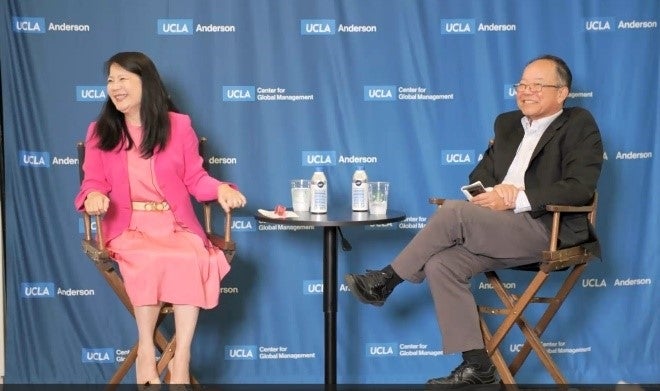
Global Management Speaker Series: Global Leadership in Management: Breaking the Glass Ceiling: A Corporate, Philanthropic and Board Perspective: A Discussion with Philanthropist Julia Gouw, Retired President and Chief Operating Officer, East West Bank
Thursday, October 12, 2023 6:00 p.m. PDT
On October 12, the UCLA Anderson Center for Global Management (CGM) hosted its inaugural event of the new academic year in its Global Management Speaker Series. Philanthropist Julia Gouw retired president and chief operating officer of California-based East West Bank, joined UCLA Anderson’s Professor Chris Tang, faculty director of the Center for Global Management for moderated discussion. Born and raised in Indonesia, Gouw came to the U.S. in 1978 and later became one of the most preeminent women in a leadership position and a sought-after board member in the U.S. During the evening, Gouw shared her own journey and career trajectory, addressed the evolution of the Asian population in the U.S. and explained what has, and has not, changed over the last 35 years for women of Asian descent. Gouw also discussed the opportunities that were presented and the hurdles she overcame to break the glass ceiling, as well as the key strategies that enabled her career accomplishments and philanthropic work.
The CGM welcomed many members of the Class of 2022 back to their alma mater for an evening of discussion, networking and reconnecting. Current students from across all Anderson’s MBA, MSBA, MFE and Ph.D. programs attended the evening that began with a networking reception and concluded with a networking dinner. The discussion was also broadcast live and attended by many UCLA Anderson alumni, current students and members of the broader UCLA and general communities. The Global Management Speaker Series, supported by the Class of 2022, engages thought leaders and the audience in timely conversations around global issues, opportunities and challenges. Through interactive and balanced dialogue, the series provides students and alumni with global perspectives and insights on important topics, and prepares them to become successful leaders who can operate in a global context and thrive in increasingly dynamic and diverse organizations. The series was inspired by the resiliency of Anderson students who rose to the challenge during the COVID-19 pandemic and propelled communities and industries forward during the global shut down. VIEW VIDEO
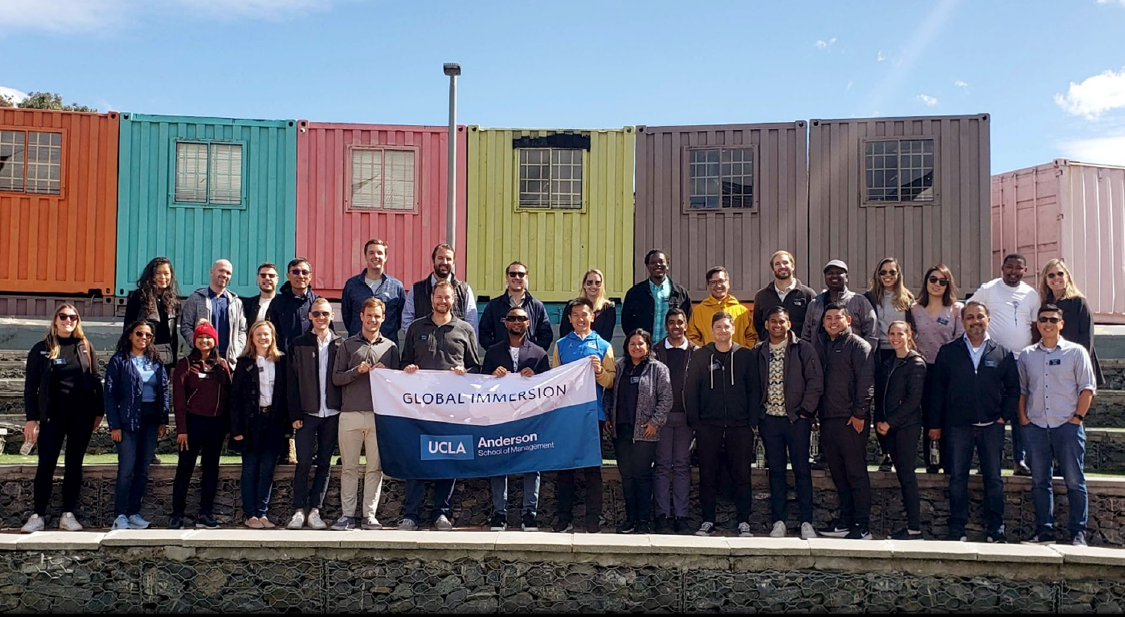
A Group of Students and Alumni Visit Cape Town and Explore Social Entrepreneurship and Social innovation in South Africa
Sunday, September 3, 2023 - Saturday, September 9, 2023
In early September, during summer break, a second group of students and alumni from three of UCLA Anderson’s MBA programs – full-time, fully employed and executive – traveled to Cape Town to experience firsthand social entrepreneurship and social innovation, as well as sustainable economic and community development in application to South Africa. The course was taught by Gayle Northrop, assistant adjunct professor. At Anderson, Northrop teaches social entrepreneurship, social impact consulting, nonprofit governance, and measuring social impact. This was the seventh time that a global immersion course focused on and visited South Africa and was the fourth global immersion course taught by Northrop with a social entrepreneurship and social innovation focus. The last time this particular course visited Cape Town was in March, 2023.
South Africa has a rich and turbulent history that impacts all aspects of entrepreneurship in the country. History, politics, culture, and economic conditions in South Africa today have led to the growth of social entrepreneurship and a vibrant social sector, while at the same time creating challenges unique to this country’s social and environmental context. During the week, the group heard from successful social entrepreneurs and community leaders, and emerging entrepreneurs working to start-up and scale their social innovations and small businesses. Visits focused on elements of economic activity and policy, innovation and entrepreneurship, as well as sustainable development. The in-country week included tours of private social enterprises, innovation hubs and accelerators in the city and the townships, and a visit to a social enterprise winery. Through these visits and related analyses, this second group of students also explored policies, initiatives and pre-conditions necessary to support innovation and build a sustainable social enterprise in South Africa. During the one-week in-country, students had many opportunities to hear from and engage directly with social entrepreneurs in the country through site and accelerator visits as well as through interactive smaller group discussions.
Upon arrival at the University of Cape Town’s (UCT) Solution Space in Philippi Village for the inaugural session, the group was welcomed with music played by the Philippi Music Project, a social enterprise music incubator. Students learned about its mission which is to offer an infrastructure to the musicians from the townships of Cape Town. The Solution Space is an ecosystem for early stage startups, corporate innovation and entrepreneurship development. It supports the learning and growth of entrepreneurs by giving them access to resources, corporate partners, mentors, advisory services, co-working space, academic and industry experts. Students were taken on a tour of Philippi Village and learned about its history and purpose. Philippi Village, considered a business catalyst for township communities in the Cape Flats area, is an integrated community development hub in the Philippi township The primary focus of Philippi Village is to provide collaborative workspaces for small and micro business owners, create employment opportunities and upskill local community members, while at the same time providing a vibrant and safe place for social engagement.
During their time at the Solution Space, students also had the opportunity to learn about fascinating social impact business models of various organizations, including Bitprop, Unjani Clinics and RLabs. Dylan Wells, Bitprop’s marketing manager discussed the work and business model of Bitprop, a micro investment organization, that partners with low-income homeowner-entrepreneurs to turn their properties into sustainable micro-businesses where the homeowner provides the land, and Bitprop provides the investment and operating model to develop rent-generating apartments behind the homeowner’s house. By sharing the rental income over a fixed period, the homeowner earns an immediate, sustainable revenue stream and Bitprop’s investors earn a return on their investment. Bitprop’s focus on environmentally friendly practices also brings sustainable construction to township economies. Students also heard from Lynda Toussaint, chief executive officer of Unjani Clinic, a non-profit company built on a social franchise model that is dedicated to providing access to alternative quality, affordable health care services to communities across South Africa. By building a successful network of clinics owned and run by professional nurses, Unjani Clinic empowers women professional nurses to own and operate primary health care container clinics in the rural and township communities of the country. The Unjani Clinic model is self-sustaining, with funder investment being predominantly used for scaling. Marlon Parker, founder of Reconstructed Living Lab (RLabs), shared the fascinating story and model behind RLabs and its success with entrepreneurs. RLabs is a South African award-winning non-profit company, established in 2009 in Bridgetown, Cape Town and has since expanded its model to 23 countries across 5 continents impacting more than 20 million people through its work. The main aim of RLabs is to create environments and systems where people are impacted, empowered and transformed through hope, innovation, technology, and training and economic opportunities. To date, more than 200,000 people have accessed RLabs skills, training and economic empowerment programs. Towards the end of the week, the group had the opportunity to visit RLabs where they heard from Craig Du Mont, RLabs director. They also met, heard from and posed questions to some of RLabs social entrepreneurs in small group sessions who discussed their ventures.
Among many of the highlights of the week were visits in the Langa township. The group had an opportunity to visit the Guga S’Thebe Cultural Centre and hear from Ian Calvert, founder and chief executive officer of FURTHER who shared his career journey in the social impact space in South Africa and talked about the challenges and impact of social entrepreneurs in the country. While South Africa has no shortage of challenges in its communities, FURTHER recognizes that the country also has many resourceful, entrepreneurially minded people within these communities with the passion to solve the challenges. FURTHER focuses on growing human capacity and helps to equip impact entrepreneurs with the skills, personal capacity, connections and opportunities they need to make the biggest possible impact. The group met with four social entrepreneurs to learn about their organizations and impact. They enjoyed small group sessions with these social entrepreneurs who are working in the education, farming, logistics and construction spaces, including Siviwe Mbinda, founder of the Happy Feet Youth Project and co-founder of the iThuba Innovation Hub. In 2007, Mbinda founded Happy Feet Youth Project for the children of Langa Township. Happy Feet Youth Project is an after-school program that focuses on dance, music and traditional instruments that empowers children to work hard towards positive goals and keeps them away from negative influences. The iThuba Innovation Hub supports STEM education for South African township youth. Mbinda was joined by Renshia Manuel, Colin Mosi and Ben Nkuna. Renshia Maniel is managing director of Growbox Nursery, a social enterprise that aims to take basic food nutrition to the people who need it the most, while fostering the development of sustainable and eco-friendly practices through providing easy and convenient veggie garden boxes to consumers who do not have sufficient space to grow their own vegetables. Colin Mkosi is founder of Cloudy Deliveries, a delivery service that works with the young people in the community who deliver for local restaurants, supermarkets and other stores in the community of Langa using bicycles. Ben Nkuna is general manager operations at iKhayalami that provides poor urban communities with better access to quality building materials, physical infrastructure, and planning and construction support, aiming to contribute to the building of a more equitable, inclusive, and sustainable urban future.
Later in the week, the group visited Quirky30, a not-for-profit coding and educational company and a Public Benefit Organization with BEE Level 1 status. Sihle Tshabalala, founder and chief executive officer delivered an excellent presentation, shared his own personal story and explained what business leaders can learn from gangsters and armed robbers. Students learned how Quirky 30 has developed a powerful and impactful model with a vision of turning impoverished communities and prisons from gangster-ridden crime hubs, offering very few opportunities and hope, into dynamic and vibrant tech hubs that can have a national and global impact. Among other things, Quirky 30’s coding program is helping to tackle high unemployment rates in these communities. Following the visit, students walked to Jordan Ways of Cooking, a friendly neighborhood grill where they heard from social entrepreneur owner and chef Ntlalo Jordan and enjoyed a delicious lunch. They also visited the VUSA Rugby and Learning Academy that provides educational and sporting opportunities to young children in the Langa community –helping them to build their confidence and physical ability, and teaching them important lessons that can be applied to their lives. The VUSA program’s primary goal is to provide a hub of excellence in Langa to ensure that the challenges that the children in the community are faced with, are addressed early on in the child’s life; creating opportunities and a safe space for children to learn, play and grow. Following an introduction by its founder, Brendan Fogarty who explained more about VUSA’s mission and work, students saw VUSA in action and had an opportunity to play rugby and interact with children on the rugby field.
The group also visited TSIBA, a social enterprise that comprises of a business school, an ignition academy and an education trust that work together to return purpose-driven people and emerging and successful small enterprises who want to move South Africa forward. Upon arrival, the group were led on a facility tour by TSIBA students. TSIBA leaders provided an overview of the organization and described its vision, mission and values, and how their various roles support these and discussed TSIBA’s operations and student population. They explained the growth of TSIBA and its role in providing students with access to higher education despite financial and societal barriers, and addressed how TSIBA is working to bridge the higher education gap by 'building the nation,' one successful graduate at a time. TSIBA’s vision is to challenge the status quo of business education through a values-based approach to teaching and learning in a changing world, and its mission is to invest in purpose-driven humans and emerging businesses that lead social change. Students also heard from Earl Erasmus, TSIBA’s principal lecturer of the Leadership and Self Development program before enjoying interactive one-on-one discussions with TSIBA students.
During the week, a number of sessions took place at the Radisson Red V&A Waterfront hotel in Cape Town. It was fascinating for students to learn about the hotel’s social responsibility policy and what the hotel is doing to be more environmentally conscious and sustainable including the wash program and repurposing of used soap. Liam Desfountain, the hotel’s learning and development lead, also shared how the hotel supports its employees living in the neighboring townships. Representatives from Sanlam Investments discussed Sanlam’s business, responsible investing strategies, ESG integration, impact investing and the state of responsible investing in South Africa, as well as the work of the Sanlam Foundation. Sanlam Investments, a financial services organization that offers a wide range of investment and financial planning solutions, is one of one of South Africa’s largest sustainability-driven asset management companies. Since 2011, the Sanlam Foundation has invested more than R652 million in education, financial literacy, health (HIV/AIDS), water security, enterprise and supplier development initiatives and employee volunteerism. Francis Fick, special projects coordinator at the African Climate Foundation (ACF) also spoke about the work and programs of the ACF. Established in 2020, the AFC is the first African-led strategic grant-maker working at the nexus of climate change and development, and believes that climate change interventions have immense potential to unlock new opportunities for development in Africa. The organization unlocks and supports development opportunities in climate action in Africa through a combination of grant making, fellowships, transformational research, technical assistance, coalition building and targeted advocacy, and multi-stakeholder convenings.
At Jardim, an inspiring space for enabling meaningful connection and nourishment, located in the coastal suburb of Noordhoek, the group enjoyed a lunch with fresh produce from the garden, before hearing from creator Justin Gomes, founder of Jardim Barn and Yandiswa Mazana (Mama Yandi), community leader and founder of the Masiphumelele (Masi) Creative Hub (MCH). Gomes and Yandi shared their personal journeys and the stories behind the organizations that they founded. Jardim partners with MCH and Mama Yandi on local community projects where together they aim to empower Masiphumelele residents to grow their own food. Founded in 2017, MCH has made food security the cornerstone of their work. The organization works to provide a safe, supportive and educational environment where community members can use the power of creativity and art to overcome their daily challenges. Through a focus on growing and supplying healthy food, sport, art and after-school care classes, MCH encourages participation of youth in the Masiphumelele community in preserving and nourishing their own resources. Since finishing up at the creative agency that Gomes co-founded in 2005, he built the Jardim Barn, a multi-purpose space, on his family’s organic farm in Noordhoek. The Jardim Barn is an inspiring venue in the heart of nature designed for meaningful connection for whoever wants to hire it for events such as team building days, mindfulness workshops or strategy days.
Students learned about the youth unemployment situation in South Africa during a visit to the Harambee Youth Employment Accelerator, a not-for-profit social enterprise that seeks to address the South African youth unemployment crisis and works with partners to find solutions (scalable) for the challenges of youth unemployment. Bryony Maxwell, head of marketing and Soraiya Verjee, product manager addressed the students and provided an overview of the youth unemployment situation, the labor market in the country and explained the role of Harambee: moving from scale to systems change. Harambee is an anchor partner in a breakthrough platform called SA Youth which brings together many partners to create a single national network to allow young people to access a wide selection of jobs and skilling opportunities, and for opportunity holders to access young engaged work-seekers – for free. Students also learned about SAYouth.mobi, a platform supported by the South Africa Presidency that offers young South Africans #datafree access to learning and work opportunities in their area. In addition to hearing from Maxwell and Verjee, Lericia Solomons, candidate support manager for DigiLink, powered by Harambee, spoke about its model that connects top unemployed digital graduates and contracts with paying customers, and delivers work to them as a managed service. Students also had the opportunity to engage with candidates. In Khayelitsha township, a visit to Velokhaya Life Cycling Academy was another highlight of the week. Established in 2003 in Khayelitsha, Velokhaya is a non-profit organization whose aim is to equip youth living in impoverished and underserved communities with the skills and opportunities required to thrive in life. Students learned how Velokhaya uses cycling (road and BMXing), nutrition, after-school tutoring, mentoring, and a post-school IT program to support youth living in the township and equip them with skills to thrive in a digital economy. The group had the opportunity to tour the facility, including its computer lab and gym, and learn about the Academy’s history as well as the different programs that it offers. Members of the group also presented donated laptops which were greatly appreciated. At Shonaquip Social Enterprise (SSE), students learned about the work of SSE, a social enterprise that goes beyond service delivery to build sustainable ecosystems that support the inclusion of children with disabilities and their families across Southern Africa. They toured the facility, saw the production unit for the wheelchairs, and met Shona McDonald, SSE founder. During the visit, students learned about the formation of the organization and how SSE has spent the last three decades working with families, communities, government and organizations to bridge barriers to inclusion. In addition to the design and production of posture support and mobility devices, SSE delivers a range of services to build local capacity in a variety of areas, including health, social inclusion, training and education, and public speaking. Students heard about its scaling solutions – utilizing mobile teams, to build capacity and strengthen local networks of support for rural delivery of services to children with mobility and other disabilities. Students also formed small groups with SSE representatives to discuss some of the challenges.
The final session of the week took place at Aslina Wines in Stellenbosch, established in 2016 by Ntsiki Biyela. Biyela spoke about her journey and inspiration, her winemaking philosophy, and the range of wines that Aslina is known for. Biyela grew up in Mahlabathini, a rural village in KwaZulu-Natal, and matriculated from high school in 1996. Having spent a year as a domestic worker, she was awarded a scholarship to study winemaking at Stellenbosch University, and has since become a highly respected and widely admired name in the world of wine. Students also sampled some of Aslina’s wines. During their time in Cape Town, students took the ferry to Robben Island for an educational and contextual tour of the Island that has become a symbol of the way in which democracy and freedom triumphed over oppression and racism. Nelson Mandela, who served as the first president of South Africa from 1994 to 1999 and was the first elected in a fully representative democratic election, was imprisoned on the island for 18 of the 27 years of his imprisonment before the fall of apartheid. Most of the remaining buildings reflect the late 20th century maximum security prison for political prisoners. Students also experienced local culture, enjoyed some local cuisine, tasted local wines, visited key attractions including ascending by cable car Cape Town’s famous peak, and walked along the beach at Camps Bay. Once the official program concluded many students enjoyed a scenic drive along the Cape Peninsula to Cape Point and the penguin colony at Boulders Beach. They also experienced a South African Braai, graciously hosted at a local family’s residence. A networking event was also organized which provided further opportunities to connect with inspirational people driving positive social change in South Africa. The course was a unique, meaningful and impactful experience for students and was eye-opening and inspirational to see what is happening in the country in the areas of social innovation and social entrepreneurship and to understand how each individual can make an impact.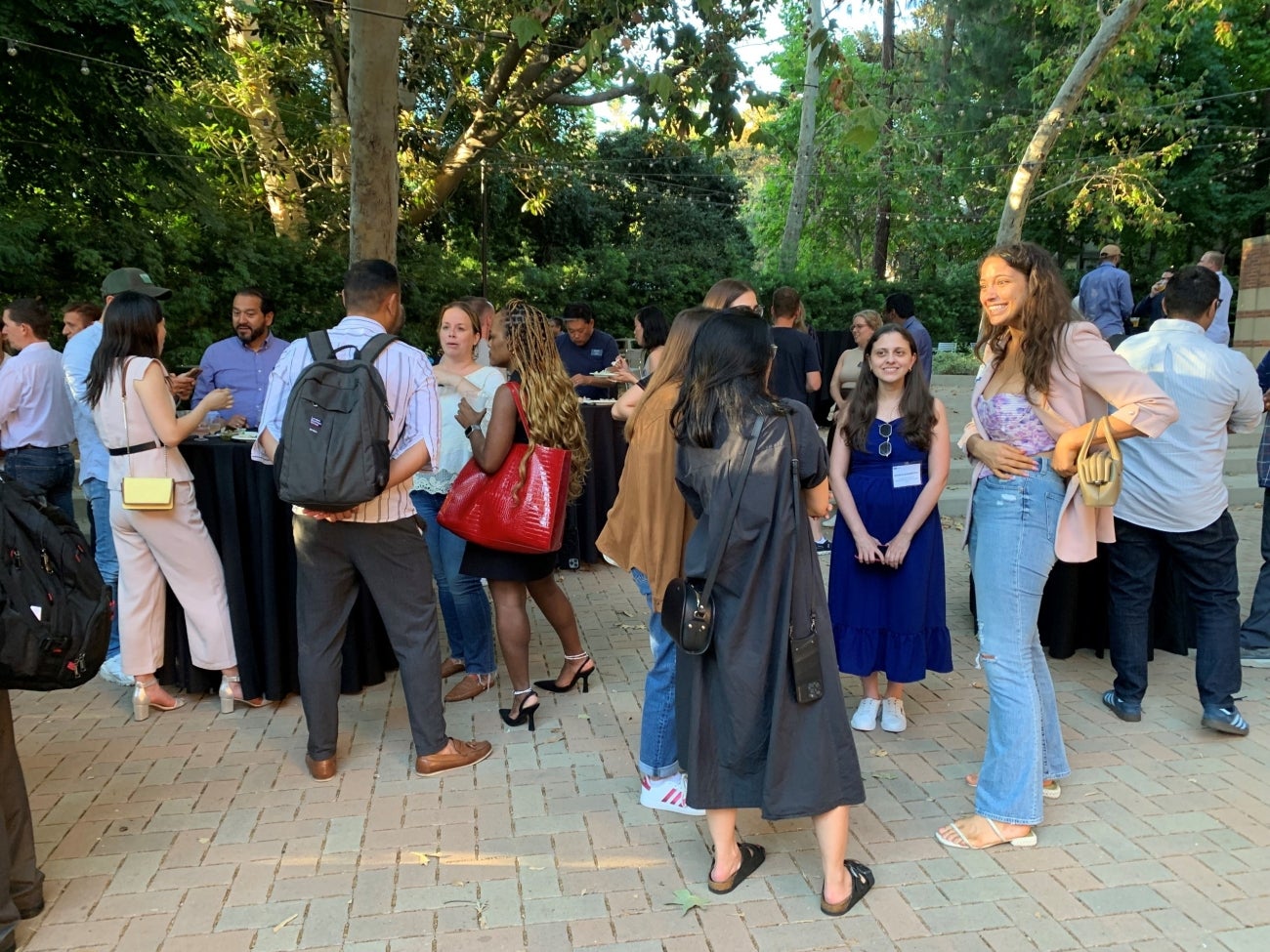
The CGM Welcomes International Exchange Students from 7 Partner Universities to Campus Who Enjoy An Evening of Networking with UCLA Anderson’s EMBA, FEMBA and UCLA-NUS MBA Students
Sunday, August 6, 2023 5:30 p.m. PDT
Managed through the Center for Global Management, one-week exchanges conducive to working students’ schedules are offered over the summer with international partner universities. In 2023, 65 FEMBA and EMBA students are scheduled to participate in one-week exchanges through nine partner schools during the summer. On Sunday, August 6, the CGM welcomed to campus around 40 students from seven of its partner schools around the world who joined classes with UCLA Anderson’s EMBA, FEMBA and UCLA-NUS EMBA students during a one-week block of elective courses. The CGM hosted an orientation for the students to learn more about Los Angeles, UCLA and UCLA Anderson, and partnered with the EMBA program in hosting a networking event on UCLA Anderson’s North Terrace for students to mix and mingle with peers from top international business and management schools. A tour of the beautiful UCLA campus was also provided. Students from UCLA Anderson’s EMBA and FEMBA programs participating on exchange over the summer joined the networking event. Some reconnected with students they had met earlier in the summer at their host institutions and also were introduced to new friends from schools they will soon be visiting on exchange. The week concluded with a closing luncheon in the Grand Salon of the Marion Anderson Hall. The one-week exchange block at UCLA Anderson coincided with the two-week UCLA residency for the UCLA-NUS EMBA program so there were tremendous opportunities for all students at UCLA Anderson to interact and network with peers from around the world during the week.

CGM Engages with FEMBA, FTMBA and EMBA Admits at ‘Palooza 10
Saturday, July 30, 2023
On Saturday, July 30, 2023, on a picture-perfect Southern California day, UCLA Anderson celebrated the 10th anniversary of ‘Palooza (Palooza 10). This fully employed MBA (FEMBA)-hosted, One Anderson, fun-filled signature family event, formerly known as FEMBA Palooza, attracted over 1,300 students, alumni, faculty and family members. It was held on UCLA’s Dickson Plaza and served as the official welcome event of the entering FEMBA Class of 2026, and full-time MBA (FTMBA) and executive MBA (EMBA) Classes of 2025, showcased the people, programs and available resources of UCLA Anderson, and was a wonderful opportunity to connect with new friends and to reconnect with old ones.
Founded by FEMBA, ‘Palooza welcomes everyone in the UCLA Anderson community and in their families. In the spirit of One Anderson, the event brought together students and alumni from many of UCLA Anderson’s programs — FTMBA, FEMBA, EMBA, UCLA-NUS EMBA, MSBA, MFE and Ph.D. Palooza ’10 was attended by members of 28 class years, including the Classes of 1961, 1990 and 1991, as well as 286 incoming FEMBA, EMBA, FTMBA and MFE students from the recently admitted Classes of 2025 and 2026. Faculty, family and friends joined.
In a Pre-Palooza icebreaker in Korn Convocation Hall, Dean Tony Bernardo provided some welcome remarks and spoke about the value of community. Dylan Stafford, assistant dean of FEMBA admissions, who served as the event host, shared the history of Palooza and some beautiful family photos; Jill Baldauf, associate dean of alumni relations, spoke about the power of the global alumni community and network; alumni entrepreneurs from the class of 2023 showcased their startups; student leaders addressed and welcomed the incoming classes; and Lucy Allard, executive director of the Center for Global Management, highlighted the global opportunities available for students including the popular global immersion courses. Together with many different UCLA Anderson student clubs and alumni groups, the CGM also managed a booth to highlight the global courses and programming available to students on campus, virtually and abroad, such as the global immersion and international exchange offerings. The grand prize of the afternoon was a ’Palooza global immersion award, which covers the program fee for the in-country component of a global immersion course. It was won by a current second year student from the FEMBA Class of 2025. Over the years, through the CGM’s global immersion and international exchange courses, UCLA Anderson’s MBA students have traveled to 35 countries.
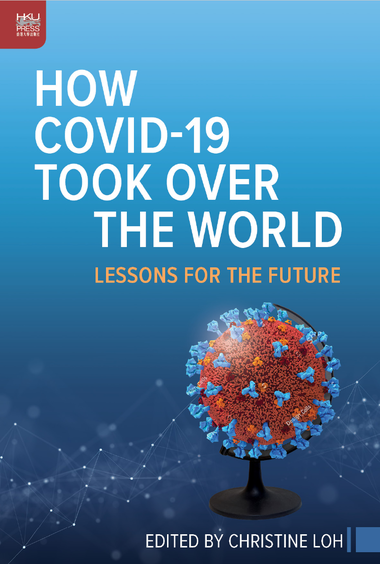
World Today Discussion Series: How COVID-19 Took Over the World: Lessons for the Future - A Discussion with Policy and Supply Chain Experts, Christine Loh and Professor Chris Tang, and Economist Michael Edesess
Tuesday, May 9, 2023 5:00 p.m. PDT
COVID-19’s place in history is assured as the first pandemic to emerge in the twenty-first century. The pandemic left disorder and crises in its wake everywhere it struck. Drawing on disciplines including public health, politics, and socioeconomics, in her recent edited book How COVID-19 Took Over The Word: Lessons for the Future, Center for Global Management visiting scholar and policy expert Christine Loh, tracks the spread of COVID-19 to weave a coherent picture that explains how scientists learnt about the virus, how authorities reacted around the world, and how different societies coped. Written by a leading team of public health, policy, and economics experts, with contributions by global supply chain expert and CGM faculty director, Professor Chris Tang, and Hong Kong-based economist Michael Edesess, the book provides an in-depth analysis of various countries’ responses to the onset of the pandemic, as well as suggestions to increase capacity and capability to fight future pandemics. On May 9, the Center for Global Management (CGM) hosted a moderated discussion with Professor Chris Tang and Michael Edesess. During the hour-long conversation, moderated by Christine Loh, Tang and Edesess provided insights and perspectives on this complex subject and the many global issues that emerged. They provided an overview of global governance and international cooperation; discussed economic and social consequences of the outbreak; highlighted the supply chain challenges that surfaced; and examined and compared specific countries responses. They also shared their observations on lessons learned.
The conversation was part of the CGM’s World Today Discussion Series which engages the audience in interactive and enriching conversations around current issues that transcend borders. UCLA and Anderson faculty, alumni, board members and thought leaders share their perspectives on the critical global topics and issues that matter to our community and the world. Through balanced discourse, the series serves as a neutral forum to educate the community on global issues, while at the same time encouraging debate and examination. VIEW VIDEO
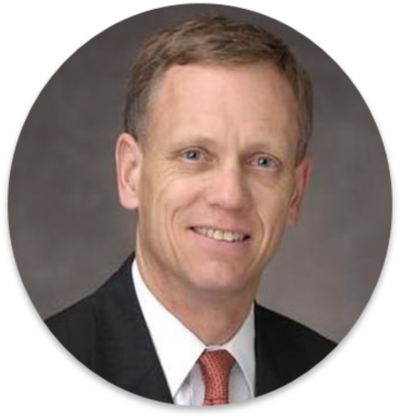
Lunchtime Discussion on Global Investment Banking and the Nearshoring/Slowbalization Trend Impacting Different Parts of Latin America and Multinational’s Investment Plans with Jim Allen (’93), Senior Advisor and Former Managing Director and Head of M&A – Latin America, Morgan Stanley
Friday, May 5, 2023 12:00 p.m. PDT
On Friday, May 5, the Center for Global Management (CGM), welcomed Jim Allen (’93), an alumnus of the full-time MBA program and member of the CGM’s advisory board, back to his alma mater for a lunchtime discussion with students. Allen was also in town for Alumni Reunion Weekend to celebrate his 30th year class reunion. Allen, who is a senior advisor within the Investment Banking Division at Morgan Stanley, started his career at Morgan Stanley in 1993, and most recently served as head of Morgan Stanley’s Latin America mergers and acquisitions practice from 2008 to 2022. Prior to that, he was a member of Morgan Stanley’s Media and Communications Group, covering the telecommunications industry in the United States and Latin America for over 10 years. His experience includes mergers and acquisitions, equity and debt capital markets financing, restructuring, and privatization transactions for corporate clients and governments throughout the Americas.
Students from the full-time, fully employed and executive MBA programs, interested in global management and business, including members of the Investment Finance Association and Latin American Business Association, joined the interactive session which provided an opportunity for interested MBA students to meet with Allen in an informal and interactive setting and hear his thoughts, insights and experience as a global investment banker and strategic advisor; his career transition from U.S. Navy to investment banking enabled by UCLA Anderson; and his experience doing business internationally within a highly global, U.S.-based multinational. Allen also shared his thoughts on the nearshoring/slowbalization trend and how it is impacting and expecting to impact different parts of Latin America and multinationals’ investment plans – which has become a very hot topic among clients at Morgan Stanley. Students received tangible advice as they think about their own careers, the current global environment, and the importance of being able to adapt as the environment evolves. Prior to Morgan Stanley, Allen served for seven years as an officer in the U.S. Navy, including six months as an exchange officer in the Chilean Navy. The discussion was organized by the Center for Global Management and supported by Investment Finance Association and Latin American Business Association.
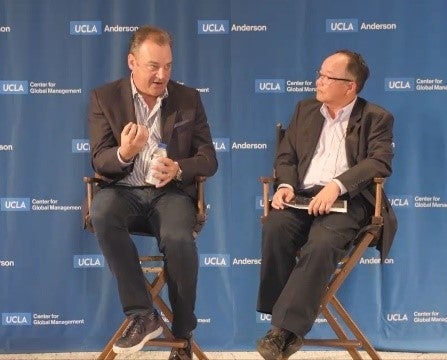
Global Management Speaker Series: Managing a Multinational Company in Today’s Dynamic Global Environment: From Barbie to AI - A Discussion with Steve Totzke, President and Chief Commercial Officer, Mattel, Inc.
Wednesday, April 19, 2023 6:00 p.m. PDT
On Wednesday, April 19, the Center for Global Management (CGM) hosted the second discussion of the academic year in its Global Management Speaker Series, supported by the Class of 2022. Steve Totzke, president and chief commercial officer, Mattel, Inc. joined CGM faculty director, Chris Tang, distinguished professor and Edward W. Carter Chair in Business Administration for a fascinating moderated conversation. Totzke shared his thoughts on a variety of important global issues and trends, from physical toys to digital toys, from environmental to nearshoring, from selling to sourcing, and from product development to licensing. He discussed how he runs the Mattel global commercial organization in the midst of complex and changing economic, political and cultural environments in the United States and globally, and talked about some of the latest strategies in digital design and development, e-commerce, global product development, global supply chains, and leveraging IP in the digital world. He also addressed how he manages complex issues to drive global competitive advantage and shareholder value for the global toy company, with one of the strongest catalogues of children and family entertainment franchises in the world.
The CGM welcomed many members of the Class of 2022 back to their alma mater for an evening of discussion, networking and reconnecting. Current students from across all four MBA programs attended the evening that began with a networking reception and concluded with a networking dinner. The discussion was also broadcast live and attended by many UCLA Anderson alumni, current students and members of the broader UCLA and general communities. The Global Management Speaker Series, supported by the Class of 2022, engages thought leaders and the audience in timely conversations around global issues, opportunities and challenges. Through interactive and balanced dialogue, the series provides students and alumni with global perspectives and insights on important topics, and prepares them to become successful leaders who can operate in a global context. The series was inspired by the resiliency of Anderson students who rose to the challenge during the COVID-19 pandemic and propelled communities and industries forward during the global shut down. VIEW VIDEO
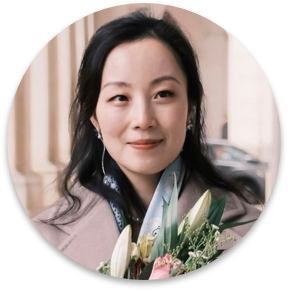
Meet the Graduates Series: A Lunchtime Conversation with Yin Hui (’14), Global Marketing Director, Amgen
Wednesday, April 12, 2023 11:30 a.m. PDT
On Wednesday, April 12, the Center for Global Management (CGM) hosted a lunchtime discussion in its Meet the Graduate Series with Yin Hui (’14), an alumna of the full-time MBA (FTMBA) program who served in many leadership roles during her time at UCLA Anderson, including director of the Greater China Business Association (GCBA), and student director of the 2014 Wilbur K. Woo Greater China Business Conference. Hui was also active with the Healthcare Business Association (HBA). Her experience at Anderson strengthened her belief in, and passion for global management, the importance of having impact, and bringing health care innovations to people across the globe. During an informal and interactive lunch, Hui discussed her time at Anderson and shared thoughts on how to maximize the academic, career and networking opportunities available. She addressed her career trajectory, some of the decisions and choices she made, and provided guidance on how students can maximize their MBA experience and use it as a launching pad for their career and passions.
Students from across the full-time, fully employed and executive MBA programs were inspired by Hui’s energy, passion and poise and left the discussion with some terrific tangible advice and tips as they navigate their own leadership, career and personal journeys over the coming months, during their time at Anderson and post-graduation. Prior to joining the FTMBA program, Hui worked for Deloitte Consulting as a consultant in the Shanghai office. Through on-campus recruiting, she completed a summer internship with Amgen in its corporate finance area and then accepted a full-time offer to return to join Amgen’s MBA leadership rotational program of Strategy and Finance (FLSLDP). She received diverse experience across various functional areas in the U.S., Japan and Asia Pacific region. Hui then dedicated over five years to Amgen’s Asia Pacific operations where she led a series of affiliate set-up and new product line launches in Japan, Singapore, Thailand and other countries across the region, while at the same time completing a Master of Public Health at the Chinese University of Hong Kong. Recently, she returned to Southern California to join Amgen’s global team as Global Marketing Director where she leads the precision (personalized) medicine aspect of its business – an innovative approach to tailoring disease prevention and treatment that takes into account the differences in people's genes, environments and lifestyles. Hui believes that her global experience will continue to contribute to Amgen’s global product strategy to benefit patients around the world. The discussion, organized by the Center for Global Management , was supported by the Greater China Business Association and Healthcare Business Association.
About the Series
The objective of this series is to connect students with members of our global alumni community who are working across various industries and functions. In an informal and interactive setting, students can hear from graduates who emerged from Anderson with a solid understanding of global managerial, operational and policy issues. They will share their thoughts and insights on a variety of subjects, including their career trajectory post Anderson, the importance of having a global perspective in their various sectors as well as an understanding of global issues and their impact on business and society. They also will provide advice and guidance to current students interested in becoming well-rounded and well-informed global citizens.
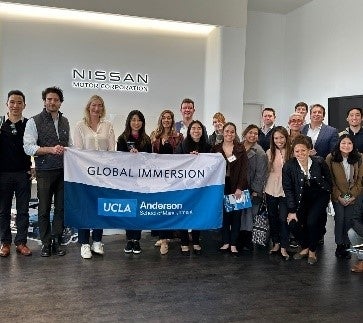
Students and Alumni Travel to Tokyo to Learn About The Business Environment and Opportunities in Japan
Sunday, March 29 – Saturday, April 1, 2023
During the same week of spring break, 36 students from three of UCLA Anderson’s MBA programs - executive, fully employed and full-time - traveled to Tokyo to familiarize themselves with Japan’s business environment, gain a better understanding of the effects of Japanese systems on the way business is conducted in Japan, and explore business opportunities for both foreign and domestic companies. The course was taught by Mariko Sakakibara, professor of strategy and the Sanford and Betty Sigoloff Chair in Corporate Renewal. This was the fifth time that a global immersion course had visited Japan and the fourth time that Professor Sakakibara had led the course. The last time was in March 2019. During the week, the group met with founders, academics, entrepreneurs, and business executives across sectors, ranging from high tech to retail to EV battery production to live streaming to cloud computing.
In Tokyo, the inaugural morning sessions were hosted at UCLA Anderson’s international exchange partner school, Waseda Business School. The first session was structured in three complementary parts that collectively provided an excellent introduction, context and framing for the week. First, Shigeru Asaba (Ph. D. '99), professor and former dean, discussed two challenges for Japan to grow again. While he noted the importance of promoting start-ups, he also suggested that too much emphasis on start-ups may stagnant existing large firms and highlighted the importance of also restoring the innovative capability of these large firms. While in the U.S. and China, many start-ups are born out of innovation; in Japan, existing large firms play an important role in innovation. Katsuhiro Sato, partner at McKinsey & Co. then addressed the challenges for large Japanese corporations. He touched on topics such as organizational silos, lack of performance culture, middle up management and a lack of management leadership, and explained how vision, culture, and a system for rewarding innovation can play into corporate strategy. This was then followed by a discussion on the challenges for start-ups with Takechika Tsurutani, visiting professor and chief executive officer of Polygon Magic. Tsurutani explained that although Japan has globally competitive traditional innovation, the number of unicorns created in the country has been limited. Students then learned more about the promotion of foreign direct investment in Japan through public-private collaboration from Fujiko Amano, director for investment collaboration, trade and economic collaboration bureau at the Ministry of Economy, Trade and Industry. Amano addressed the growth areas and opportunities for foreign investment in the country, including start-up eco-systems, green transformation, and ESG and social innovation. She also discussed the challenges for entry into Japan and suggested counter measures for overcoming these challenges. Japan remains attractive as a FDI destination and Amano explained how the Government of Japan is engaging in a new agenda and regulations to attract foreign capital and highly skilled professionals.
The first company visit of the week was to Panasonic Intelligent Transportation System (ITS). Panasonic Group is involved in a broad range of ITS businesses ranging from automotive terminals to transport infrastructure and smart towns. Panasonic's initiatives include technology development such as wireless and imaging technologies to prevent traffic accidents and realize a self-driving society, and services and solutions aimed at achieving more comfortable and sustainable mobility. Students toured the facilities and experienced a virtual simulation. They learned more about Panasonic ITS, its various technology initiatives and its progress into MaaS (Mobility as a Service) from Panasonic ITS leadership, including Takayuki Tanabe, chief executive officer and Vinod Asokan, chief technology officer.
A visit to Costco Japan, was fascinating for the group as they compared and contrasted it with Costco in the U.S. The company is a multi-billion-dollar global retailer with warehouse club operations in a number of countries around the world, including Japan where it opened its first location in 1999. The group toured the corporate offices and one of the country’s 31 warehouse stores. They had the opportunity to meet and hear from Ken Theriault, managing director who provided a brief introduction to Costco, its history, Costco’s story of entering the Japanese retail market, and how it adapted its retail strategies to Japanese consumers. Students learned that while Costco Japan stocks several U.S. brands and Costco private-label products, there are some big differences between the shopping experience in both countries. Costco Japan sells some unique items for the Japanese consumer. Customers can also purchase deli trays of sushi or bulk Asian flavors and ingredients. Fresh and frozen seafood is also abundantly available.
Students were thrilled to have the opportunity to visit DeNA Co., Ltd. which develops and operates a broad range of mobile and online services including games, e-commerce and entertainment distribution. Founded in 1999 by three entrepreneurs in Tokyo to launch an online auction service, DeNA has continuously expanded its business portfolio. Mobage, DeNA’s mobile social network, was launched in 2006 and has grown into one of Japan’s largest mobile websites. Releasing games for the international market, launching new services such as its manga magazine app, as well as health care and automotive, DeNA continues to search for new challenges across a variety of fields. After receiving a brief introduction on the company and hearing about the story and evolution of DeNA, students learned about its live streaming business in Japanese and overseas markets from Seiichiro Sumiyoshi, head of the company’s live streaming business unit. Sumiyoshi spoke about Pococha, a live broadcasting app, operated by DeNA that allows anyone with a smartphone to broadcast video over the internet. Students also had the opportunity to hear from Tomoko Namba, the company’s founder. Namba shared her own personal career journey, discussed entrepreneurship in Japan, and explained how she came to found DeNA. She also addressed data, cultural shifts and potential new areas of growth and expansion. In 2021, Namba was appointed vice-chair of the Japan Business Foundation to become the first woman in the post in its 75-year history.
Students split into two groups for their visit to Nissan, a Japanese multinational automobile company, headquartered in Yokohama, Japan, that sells its vehicles under the Nissan and Infiniti brands. One group enjoyed a tour of its Oppama auto assembly plant, one of the country’s largest plants where gasoline and electric-powered vehicles are built, to understand and see firsthand Japan’s cutting-edge manufacturing in action and the latest in car technology. The Oppama plant became the first in Japan to use robots on the production line when it introduced welding robots in 1970 and has been a pioneer in the production of advanced vehicles, such as the Nissan LEAF, the world’s first mass-market electric vehicle. The second group visited Zama Envision AESC (Automotive Energy Supply Corporation), the lithium-ion battery production plant, where they learned about the importance of the battery business in expanding the EVs market. They were joined by Takahiro Fujimoto, a professor at Waseda Business School University whose research focuses on technology and operations management. Fujimoto has published numerous books including The Evolution of a Manufacturing System at Toyota. In January 2021, Nissan set a goal to achieve carbon neutrality across its operations and the life cycle of its products by 2050. As part of this effort, by the early 2030s, every all-new Nissan vehicle offering in key markets will be electrified.
Students also had the opportunity to visit Japan Cloud which powers the Japan operations of leading global enterprise cloud companies such as Apptio, BlackLine, Braze, Coupa, nCino, New Relic, and WalkMe. Aruna Basnayake, co-founder and chief executive officer took the students on a tour of the offices and together with Yasutaka Fukuda, partner and chief executive officer of Japan Cloud Consulting provided an overview of Japan Cloud and why it exists. They also discussed Japan’s business environment and opportunities, and the state of cloud computing in the country. Japan Cloud’s mission is to empower its partners to achieve operational excellence and customer success-driven growth. Partners have access to its Go To Market Playbooks developed over two decades of working with global enterprise software companies in Japan.
During the week students also learned about the health care landscape in Japan. The health care industry is very important for Japan because its population is rapidly aging and demand is expected to increase. This industry also presents unique challenges due to its highly regulated nature. Francis Vaillant, president and general manager of the Japanese operations of Sandoz, a multi-national pharmaceutical company headquartered in Switzerland, addressed the opportunities and challenges of public health and the pharma industry, discussed the regulatory requirements, and covered the opportunities and challenges for Sandoz as a multi-national company operating in Japan.
The group also heard from Koji Kobayashi, head of human insights - Japan and South Korea for Coca-Cola, an American multi-national. Kobayashi shared his observations on the consumer goods industry in Japan and the marketing and consumer analysis side of the Japanese market. Japan is a large and very important market but with unique features, such as different consumer tastes and preferences, and different perceptions around product placement and messaging. It was fascinating for students to learn about some of the issues unique to multinational companies such as how they coordinate worldwide activities, how they operate in Japan as a non-Japanese company, and how they manage HR and talent management issues. To conclude the week, students visited the offices of the global consulting firm, Boston Consulting Group (BCG) where they heard from a number of BCG’s managing directors and partners on the topic of Japan's competitiveness. Osamu (Sam) Karita managing director and senior partner, reflected on the last 30 years and looked ahead to the next 30 years. This was then followed by a panel discussion with four partners, Yumi Hiratani, Dai Agawa, Miho Orimo, and Adam Chang, who addressed what is happening in each sector in Japan, including the public sector, consumer goods and health care.
In the late afternoon, Professor Sakakibara moderated a conversation with UCLA Anderson alumni who discussed their career trajectory post-Anderson; and shared their thoughts, views and insights on the business environment in the country, and their experiences with how to navigate the environment from both their own personal and industry perspectives. Panelists included Erika Iwai (’14), co-founder and chief executive officer of Sollective, a start-up HR tech company; Masaaki Sakamoto (‘98), partner, Board Advisors Japan, Inc.; Ken Shibusawa (‘87), chief executive officer, Shibusawa and Company, Inc., founder and chairman, Commons Asset Management, founder and chief executive officer, &Capital, Inc., and board member, The International Foundation for Valuing Impacts; and Riki Kojima (‘92), member of the board, executive vice president and chief innovation officer, Tokyo Electric Power Co. and president of the UCLA Anderson Alumni Chapter in Japan. Panelists addressed the many questions from students around the business climate in the country from what they had seen and experienced during their careers, as well as other topics which centered around entering the Japanese market, being an entrepreneur in Japan, venture capital, relationship building, women in the workforce, and how Japanese companies are attracting talent. The panel discussion was very well received and a couple of the alumni joined the closing dinner that followed at the Cedar Chop House and Bar in Roppongi to continue the conversation and network with students. It was a terrific way to conclude the academic portion of the week by hearing firsthand from distinguished members of UCLA Anderson’s alumni community on Japan’s business environment to gain a better understanding of the effects of Japanese systems on the way business is conducted in Japan, and to explore business opportunities for both foreign and domestic companies.
Students thoroughly enjoyed their time and experience in Japan. The cherry blossoms were in full bloom and the city was beautiful. In addition to the business visits and discussions, students also enjoyed some of the sites of Tokyo to better understand its culture and history. They walked around the beautiful Hamarikyu Gardens where they could enjoy refreshments at a traditional teahouse; visited the busy Asakusa and enjoyed time for shopping on Nakamise Street; and experienced views of the city from the Tokyo Tower. During the week, students also enjoyed local traditional culinary delights. At Shabuzen Roppongi, a traditional Japanese restaurant, they enjoyed Japan’s iconic sake while exploring regional and seasonal dishes. The group also visited Kamakura, a coastal city just south of Tokyo. The political center of medieval Japan, modern-day Kamakura is a prominent resort town with ancient Buddhist and Shinto shrines and temples. Students successfully navigated the Tokyo Metro, the city’s rapid transit system too.
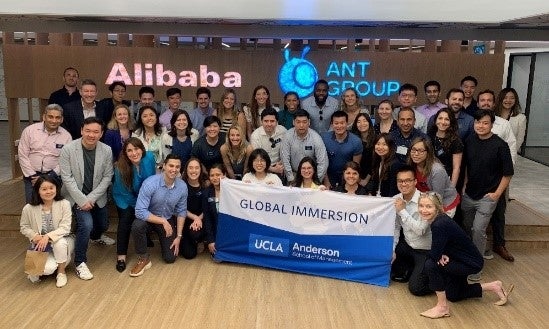
Students and Alumni Travel to Singapore for a Perspective on the Impressive Areas of Innovation and Dynamic Role of Technology in the Greater China Region and the Broader Asia Region
Sunday, March 29 – Saturday, April 1, 2023
During the same week of spring break, 40 students and alumni from all four of UCLA Anderson’s MBA programs visited Singapore for the in-country week of the CGM’s Greater China region-focused Global Immersion course. The course, titled: “A Technology Driven Transformation of Society, Enterprises and Consumers,” was led by Terry Kramer, adjunct professor and faculty director of the Easton Technology Management Center. This was the fifth Global Immersion course, taught by Professor Kramer, with this same overarching them. However, it was the first time that the course included travel to Singapore. The first course, in 2019, traveled to Shenzhen and Hong Kong. After successfully redesigning the course and offering exciting and creative alternative formats during the pandemic years, the CGM was happy to be able to reintroduce a travel component once again.
Technology driven transformation in the Greater China region has been enabled by Government policy, changes in consumer preferences and enterprise driven innovation. With growing political and economic tensions between the Greater China region and the U.S., Singapore has emerged in a unique and pivotal role: first, as a “bridge” between the U.S. and the Greater China region; second, as a growing location for regional headquarters both of U.S. and Chinese technology companies; and finally, as a regional hub for technology in the growing Southeast Asia region. The course utilized travel to Singapore to anchor discussions and visits there around Chinese companies that have offices there; Singapore’s perspectives on Chinese consumers and tech offerings and the differences with the U.S., and to better understand the impressive areas of innovation and dynamic role of technology in the Greater China region as well as its impact on surrounding regions and the world. Technology-based innovation themes centered around three key sectors--fintech, technology-based manufacturing and internet services specifically drawing upon contextual leadership—identifying the “cause and effect” of the successes in the region and the likely future outcomes and areas of innovation. During the week, students heard from many prominent business and technology leaders, founders and CEOs, academics as well as successful entrepreneurs. They met with successful and influential UCLA Anderson alumni and saw firsthand the power, influence and connections of the UCLA Anderson network in Singapore. The group visited a number of local tech companies – both Chinese and Singaporean and heard from leaders and executives working at Tencent, Ant Group, the Blockchain Association of Singapore and Grab. They also visited Alibaba Group, Meta, SHEIN and OneConnect, among other tech companies, which were important in telling the story.
For the inaugural session, the group visited the headquarters of Temasek, a Singaporean state-owned conglomerate owned by the Government of Singapore, where they heard from Ren Yeong Sng, managing director, AI Strategy and Solutions at Temasek and chief executive officer at minden.ai – a Temasek-founded technology venture that seeks to redefine the engagement between brands and consumers in Southeast Asia. He talked about the AI Pod, part of Temasek’s development engine, that looks at building future capabilities with the vision to create value for Temasek through transformative AI-related business opportunities. minden.ai, which Sng leads, falls under this. After explaining the current global issues that need to be navigated, Sng addressed Temasek as an investor, the landscape of technology, exciting developments in AI, and technology leadership. It was a terrific inaugural session to set the stage for the week.
A number of the sessions during the week took place at NUS Business School, UCLA Anderson’s dual degree executive MBA program partner. Here, students heard from Bin Ru Tan, chairman of the Blockchain Association Singapore (BAS), and deputy chief executive officer and chief operating officer at ChainUp. Tan provided an overview of the BAS, how the global blockchain technology market is booming, and the growing ecosystem in Singapore. She also described ChainUp and how it is trying to help financial institutes transform from Web 2.0 to Web 3.0 and serve as a one-stop shop for blockchain technology services. After completing a case in class on Tencent, students were keen to learn more about the company, how it has grown in the region, its presence in Southeast Asia and in Singapore, and more generally the company’s ecosystem. Ken Siow (’14), shared more about the enterprise side (Tencent Cloud International) and Adam Najberg discussed the consumer gaming side (Tencent Games Global - Interactive Entertainment Group Global or IEGG). Siow is regional director for Southeast Asia and general manager (Singapore and Malaysia) for Tencent Cloud International, the enterprise and B2B division of Tencent that leverages Tencent’s global infrastructure to provide cloud computing services. Tencent Cloud is part of a rich digital ecosystem that includes some of China’s top social, messaging, mobile payment, gaming, music streaming, and video platforms. Najberg is responsible for global communications and content at Tencent Games Global, the video game publishing division of Tencent Interactive Entertainment. Launched in 2003, Tencent Games has since grown into a leading global platform for game development, publishing and operations that is dedicated to providing high-quality interactive entertainment experiences to players. It offers games such as Call of Duty Mobile and League of Legends and leverages the rich IP resources within Tencent.
At NUS, students were honored to have the opportunity to hear from full-time MBA alumna, Hwee Hua Lim (’89), a CGM founding board member, former Cabinet Minister, Prime Minister's Office, Singapore and co-chairman, Tembusu Partners Pte. Ltd. Lim addressed the varying roles of business and government and the intersection between them. Lim, who has a unique background in government, business and academia, brought to life how certain economies may be better positioned or lesser positioned in areas of technology-based innovation, such as mobile devices, payment platforms and crypto currencies. She highlighted how crucial the collaboration is between regulators and businesses and how important it is to have a long-term vision, and to proactively manage change. Students were also excited to have the opportunity to hear from UCLA-NUS EMBA alumnus, Jerry Lim (’14), vice president and regional head of customer experience at Grab, Southeast Asia’s leading super app that provides everyday services such as ride-hailing, deliveries (food, packages, groceries), mobile payments and financial services to millions of Southeast Asians. It was fascinating to learn about the evolution of Grab and how Grab’s core technology and AI allow the company to build both a trusted and customized platform. The Grab story as well as his Lim’s leadership story represented invaluable learnings for the class.
At Workcentral, a co-working space on Clemenceau Avenue, Jackal Ma, partner, co-founder and executive director of Tongdun Technology discussed the evolution of fintech in emerging markets. Tongdun Technology is a Chinese fintech start-up that specializes in decision intelligence and risk control services, and integrates AI into risk management solutions for clients from P2P lending, microfinance, insurance, e-commerce, gaming, among other sectors. Ma spoke about the development of fintech in China, shared some key observations and addressed what he believes to be some of the key battlegrounds. Students later heard from Michael Ding, global executive director, Envision Group and Envision Digital. Envision Group is a world-leading green technology company and net-zero technology partner. Ding shared Envision's journey to Net Zero and provided insights on climate change, how technology can play a role in solving climate change, and the role of government. He also shared some use cases which were very helpful. It was an intriguing look at the use of technology to serve our planet and its energy needs.
At the Blockchain Association Singapore venue on Robinson Road, Professor Kramer moderated a Q&A with two inspirational speakers: Jag Foo, head of business development at SafeHeron, a Singapore open-source digital asset self-custody service platform, and Christina Lao, director of business development for MetaBank, a company that is dedicated to bringing about digital inclusion and accelerating the transition to digital civilisation by leveraging blockchain technology for developing countries, especially those in Asia. Questions focused on the company’s growth plans, what success looks like, challenges with adoption and customer education, the importance of engaging with the government and consulting with industry, competition and their secret sauce. Panelists were able to talk from both a customer perspective and from a societal standpoint. Derrick Loi, general manager, international business of digital technologies (business unit) at Ant Group also addressed the group at BAS. Loi has a very interesting background working for U.S., European, Singaporean and Chinese-based technology companies with experience in fintech, cloud computing, enterprise data center, digital transformation, data security and data protection.
Students were excited to visit Shein, the global fashion and lifestyle e-retailer. Annabella Ng, senior director of Global Government Relations described the company’s history and timeline, and explained the company’s online only business model and how it is built upon a unique approach of small batch on-demand manufacturing, and uses data analytics to identify the latest fashion trends and understand customer preferences. This approach also allows Shein to understand unique consumer preferences specific to different geographies and enables the company to localize product offerings. A visit to Meta’s impressive offices was also a treat for the class. At the Visitors Experience Center, the group had fun trying the Meta Quest immersive VR headsets. Cindy Tan (’17), global clients e-commerce and tech, Asia Pacific addressed the class. Students learned how a successful U.S. technology company-Meta-succeeds so well outside the U.S. and the areas of innovation that it is focused on across a broad set of applications. The group also visited OneConnect, the fintech arm of Shenzhen-based Chinese holding conglomerate, the Ping An Group. In its Customer Experience Center, students were given a demo of some of its technologies and applications, including its smart lending platform. Matthew Chen, chief executive officer, explained how OneConnect serves as a one stop end to end technology partner for financial institutions through its solutions for digital onboarding and channels, provided a holistic picture on how technology has matured in financial services, and discussed the various innovations and technology platforms.
While the week’s sessions were noticeably more focused on the fintech and internet services sectors and less on the third vertical, high-tech manufacturing sector, the program included a terrific educational visit to the facilities of Jurong Town Corporation (JTC), a statutory board under the Ministry of Trade and Industry that champions sustainable industrial development. At JTC, students learned about the Jurong Innovation District (JID), Singapore's advanced manufacturing hub with research & development facilities and smart infrastructure. The group also learned about Singapore’s manufacturing 2030 vision to be a global business, innovation and talent hub for advanced manufacturing. Singapore’s manufacturing sector is a significant contributor to the country’s GDP and is highly valued and supported by the Singapore Government. The group visited the Advanced Remanufacturing and Technology Center (ARTC), led by the Agency for Science, Technology and Research (A*STAR), in partnership with Nanyang Technological University. ARTC provides a collaborative platform that brings together industry players, public sector research institutes and academia to bridge technological gaps in adopting advanced manufacturing and remanufacturing processes. Following an overview presentation, the class was separated into two groups for a tour of the additive manufacturing workshop and the next-generation hyper-personalization line. The visit was very educational and served as a strong overview of the sector. Students were impressed by the advanced manufacturing ecosystem at the JID and the clear strategy in place to position Singapore as a global hub for innovation in high-tech manufacturing. The visit was also an inspiring example of how government and business can work together to achieve successful outcomes.
The week concluded with a visit to the offices of Alibaba Group. Students learned about the story of Alibaba, its success in the Greater China region and its expansion into Southeast Asia, with presentations and use cases from the enterprise side (Alibaba Cloud) and the consumer e-commerce side (Taobao). Kan Yang, regional chief technology officer of Alibaba Cloud, provided a terrific overview of Alibaba Group’s ecosystem. He talked about Cainiao – Alibaba’s smart logistics infrastructure network and then explained its cloud. He talked about the Hangzhou Smart City that runs on Alibaba Cloud and touched on the DAMO Academy (Academy for Discovery, Adventure, Momentum and Outlook) which is dedicated to exploring the unknown through scientific and technological research and innovation. Jing (Jean) Zhao, country head of Singapore for Taobao spoke about the history and evolution of Alibaba’s Taobao, the Chinese online shopping platform and mobile shopping app, known as China’s eBay. Taobao Marketplace facilitates consumer-to-consumer retail by providing a platform for small businesses and individual entrepreneurs to open online stores. Taobao mainly caters to consumers in Chinese-speaking regions and abroad and focuses on optimizing the user experience. The visit to Alibaba was a terrific way to conclude the academic component of the week.
On the Thursday evening, UCLA Anderson alumni and other guests gathered at the NTUC Center, for a presentation and discussion with Professor Kramer on technology-based innovation and the impact on consumers, enterprises and society globally. Around 30 guests attended for an evening of discussion and networking. It was wonderful to see so many alumni and students networking together and the significant strength and influence of the UCLA Anderson network in Singapore. During the week, students also experienced local culture, visited key sites of important historic significance and enjoyed local cuisine. UCLA-NUS EMBA alumnus Kevin Yap (’19) hosted the group at his Straits Chinese Restaurant and served authentic Peranakan cuisine epitomizing the region. Before the start of the academic sessions, students enjoyed a Sunday afternoon tour of the island city-state where they explored the Marina Bay area and visited the Marina Bay Sands Hotel and its observation deck, SkyPark for terrific views of Marina Bay and Singapore’s cityscape, and a bird’s-eye-view of Gardens by the Bay, which they visited later in the week. Students took photos at the famous Singapore landmark Merlion Park and strolled down Arab Street, where they enjoyed some wonderful fusion food. Students thoroughly enjoyed their time and experience in Singapore. They learned a great deal about and experienced firsthand the innovation and tech transformation in the region and for China and Singapore more broadly in areas such as fintech, internet services and high-tech smart manufacturing - they were inspired, made good friends, and had a truly immersive experience together.
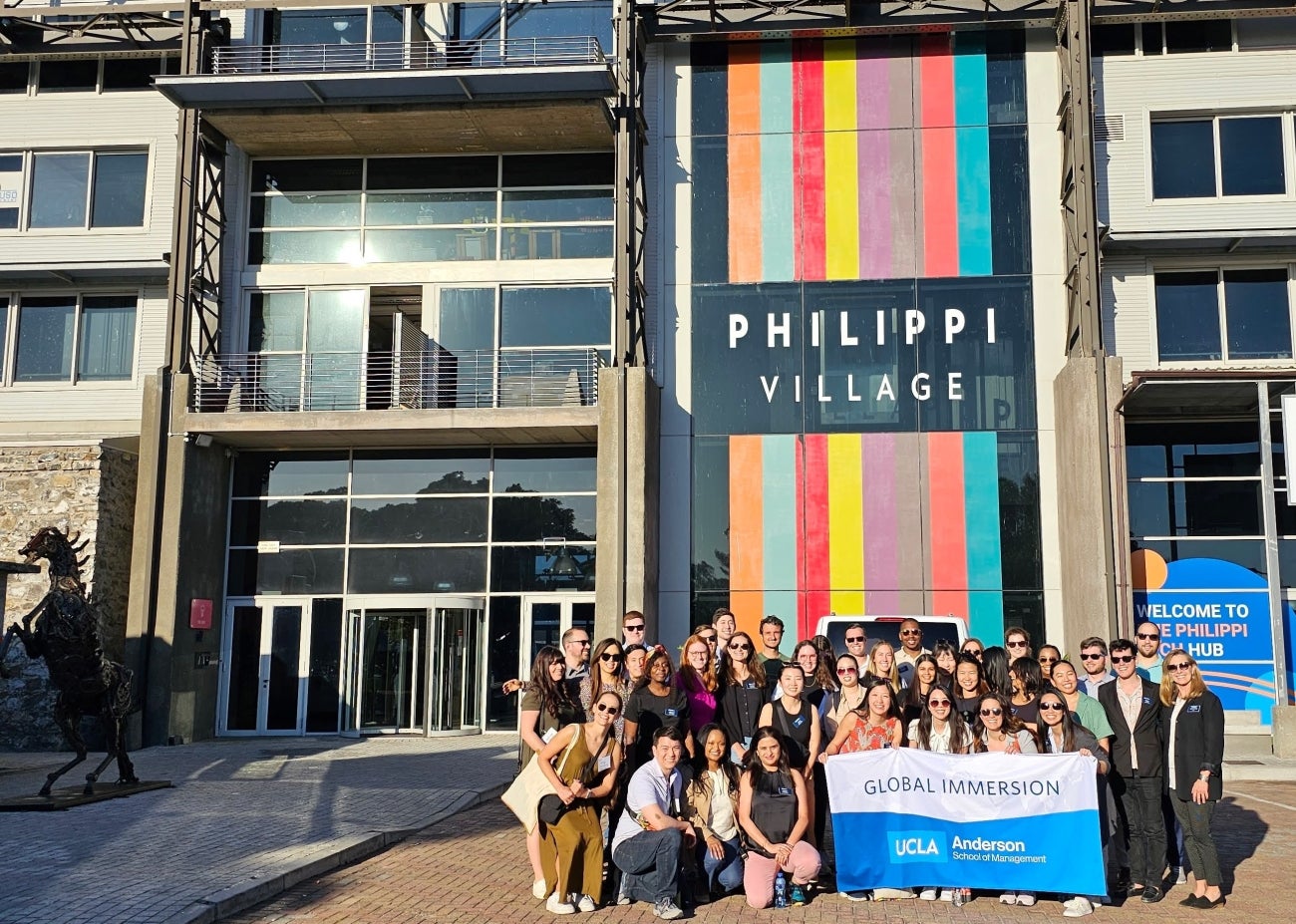
Students and Alumni Visit Cape Town and Explore Social Entrepreneurship and Social innovation in South Africa
Sunday, March 29 – Saturday, April 1, 2023
During spring break, 39 students and alumni from three of UCLA Anderson’s MBA programs – full-time, fully employed and executive – traveled to Cape Town to experience firsthand social entrepreneurship and social innovation, as well as sustainable economic and community development in application to South Africa. The course was taught by Gayle Northrop, assistant adjunct professor. At Anderson, Northrop teaches social entrepreneurship, social impact consulting, nonprofit governance, and measuring social impact. This was the sixth time that a global immersion course focused on and visited South Africa and was the third global immersion course taught by Northrop with a social entrepreneurship and social innovation focus. The last time was in September 2018.
South Africa has a rich and turbulent history that impacts all aspects of entrepreneurship in the country. History, politics, culture, and economic conditions in South Africa today have led to the growth of social entrepreneurship and a vibrant social sector, while at the same time creating challenges unique to this country’s social and environmental context. During the week, the group heard from successful social entrepreneurs and community leaders, and emerging entrepreneurs working to start-up and scale their social innovations and small businesses. Visits focused on elements of economic activity and policy, innovation and entrepreneurship, as well as sustainable development. The in-country week included tours of private social enterprises, innovation hubs and accelerators in the city and the townships, and a visit to a social enterprise winery. Through these visits and related analyses, students explored policies, initiatives and pre-conditions necessary to support innovation and build a sustainable social enterprise in South Africa.
For the inaugural session, students heard from various leaders from the Western Cape Government who discussed the political and socio-economic landscape, the big issues currently facing the Western Cape, such as unemployment, housing, health and the energy crisis, and what needs to be done to address these issues. They also explained the role of the Western Cape Government and how it works closely with the national government and municipalities in the Western Cape to ensure that citizens of the province have access to the services, facilities and information they need. This session provided excellent framing and context for the in-country week. The first visit for the group was to TSIBA, a social enterprise that comprises of a business school, an ignition academy and an education trust that work together to return purpose-driven people and emerging and successful small enterprises who want to move South Africa forward. Rudi Kimmie, TSIBA’s chief executive officer, together with senior leaders, provided an overview of the organization and described its vision, mission and values. They talked about the growth of TSIBA and its role in providing students with access to higher education despite financial and societal barriers, and explained how TSIBA is working to bridge the higher education gap by 'building the nation,' one successful graduate at a time. TSIBA’s vision is to challenge the status quo of business education through a values-based approach to teaching and learning, and its mission is to invest in purpose-driven humans and emerging businesses that lead social change.
Students visited the University of Cape Town’s (UCT) Solution Space in Philippi Village. The Solution Space is an ecosystem for early stage startups and a research and development platform for corporates. It supports entrepreneurs learning and growth by giving them access to resources, corporate partners, mentors, advisory services, co-working space, academic and industry experts. Solange Rosa, director of the UCT Bertha Centre for Social Innovation and Entrepreneurship and the Solution Space, provided an overview of the Bertha Centre which is the first specialized center in Africa dedicated to advancing social innovation and entrepreneurship. Rosa described its vision for the next three years and its strategic priorities in the areas of health, education, youth and finance. Local social entrepreneurs shared their individual stories, business models, impact as well as challenges, and then joined students for small interactive group discussions. Students were then given a tour of Philippi Village and learned about its history and purpose. Philippi Village, considered as a business catalyst for township communities in the Cape Flats area, is an integrated community development hub in the Philippi township of Cape Town. The primary focus of Philippi Village is to provide collaborative workspaces for small and micro business owners, to create employment opportunities and to upskill local community members, while at the same time providing a vibrant and safe place for social engagement. Students strolled by the Container Walk that provides converted containers for communal workspaces, offices and storage space that are suitable for both retail and service organizations .
Always a fascinating and popular visit, students had an opportunity to visit Pick n Pay. Headquartered in Cape Town, Pick n Pay Group is a retail business in the fast-moving consumer goods industry and one of Africa's largest and most consistently successful retailers of food, clothing and general merchandise. The Pick n Pay Group operates through multiple store formats under three brands – Pick n Pay, Boxer and TM Supermarkets. As a major retailer in Africa, the Pick n Pay Group strives to address socio-economic challenges through a supply of high-quality, affordable food for all customers, while providing significant employment and economic opportunities across its value chain. Pick n Pay is the quintessential family store focused on the customer that also operates one of the largest online grocery platforms in sub-Saharan Africa. Students met and heard from Suzanne Ackerman-Berman, Pick n Pay’s inspirational director of transformation and learned how, over the past five decades, Pick n Pay has built a truly sustainable business. She shared the story of Pick n Pay, changes made over the years, and the company’s growth and success which is attributable to three basic principles that form the cornerstone of the business: consumer sovereignty; doing good is good business; and maximizing business efficiency. Her presentation generated many thought-provoking questions from the group. Later in the week, the group also had an opportunity to visit a Pick n Pay supplier, Comessa Foods Services (Pty) Ltd., a BEE Level 1 family business with a 50% female shareholding. Established in 2005, Comessa Foods has grown from a small family business to a global leader in flatbread production. Students heard from the company’s husband and wife co-founders – Zoegdie and Bilqees Essa who discussed the history behind the company, its growth, its success story and its challenges. The students also had the opportunity to tour its factory and observe the workers assemble and package the products. The visit demonstrated how a large organization can stimulate and inspire sustainable small business development and entrepreneurship by opening up its supply chain.
Among many of the highlights of the week were two visits in the Langa township. First, a visit to Quirky30, a not-for-profit coding and educational company and a Public Benefit Organization with BEE Level 1 status. Sihle Tshabalala, founder and chief executive officer, delivered an excellent presentation, shared his own personal story and explained what business leaders can learn from gangsters and armed robbers. Students learned how Quirky 30 has developed a powerful and impactful model with a vision of turning impoverished communities and prisons from gangster-ridden crime hubs into dynamic and vibrant tech hubs that can have a national and global impact. Among other things, Quirky 30’s coding program is helping to tackle high unemployment rates in these communities. Students walked around Langa and visited Jordan Ways of Cooking, a friendly neighborhood grill where they heard from social entrepreneur owner and chef Ntlalo Jordan and enjoyed a delicious lunch. The second visit was to the VUSA Rugby and Learning Academy that provides educational and sporting opportunities to young children in the Langa community – not only helping them to build their confidence and physical ability, but also teaching them important lessons that can be applied to their lives. The VUSA program’s primary goal is to provide a hub of excellence in Langa to ensure that the challenges that the children in Langa are faced with, are addressed early on in the child’s life; creating opportunities and a safe space for children to learn, play and grow. Following an introduction by VUSA’s founder Brendan Fogarty and Tony Elvin, founder director of Ikhaya Le Langa Hub, students enjoyed a tour of the after-school programs and had an opportunity to interact with the children on the rugby field.
In Khayelitsha township, a visit to Velokhaya Life Cycling Academy was another highlight of the week. Established in 2003, Velokhaya is a non-profit organization whose aim is to equip youth living in impoverished and underserved communities with the skills and opportunities required to thrive in life. Students learned how Velokhaya uses cycling (road and BMXing), nutrition, after-school mentoring, and a post-school IT program to support youth living in the township and equip them with skills to thrive in a digital economy. The group had the opportunity to tour the facility, including its computer lab and gym and learn about the Academy’s history and the different programs that it offers.
During the week, students also visited Jardim. Located in the coastal suburb of Noordhoek, Jardim is an inspiring space for enabling meaningful connection and nourishment. The group enjoyed another delicious lunch with fresh organic vegetables, before hearing from creator Justin Gomes, founder of Jardim Barn and Mama Yandi, community leader and founder of the Masiphumelele (Masi) Creative Hub. Gomes and Yandi shared their personal journeys and the stories behind the organizations that they founded – captivating the group with their stories. Masi Creative Hub was founded in 2017 by Yandiswa Mazana (Mama Yandi). The organization works to provide a safe, supportive and educational environment where community members can use the power of creativity and art to overcome their daily challenges. Through its focus on sport, art and after-school care classes, the Hub encourages participation of youth in the Masiphumelele community in preserving and nourishing their own resources. Since finishing up at the creative agency that Gomes co-founded in 2005, he built the Jardim Barn, a multi-purpose space, on his family’s organic farm in Noordhoek. The Jardim Barn is an inspiring venue in the heart of nature designed for meaningful connection for whoever wants to hire it for events such as team building days, mindfulness workshops or executive planning sessions.
Later in the week, the group learned about the work of Shonaquip Social Enterprise (SSE), a social enterprise that goes beyond service delivery to build sustainable ecosystems that support the inclusion of children with disabilities and their families across Southern Africa. Shona McDonald, SSE founder provided background to the formation of this organization and shared how SSE has spent the last three decades working with families, communities, government and organizations to bridge barriers to inclusion. In addition to the design and production of posture support and mobility devices, SSE delivers a range of services to build local capacity in a variety of areas, including health, social inclusion, training and education, and public speaking. Students also learned about the work and business model of Bitprop, a micro property development initiative, and how it partners with low-income homeowner-entrepreneurs to turn their properties into micro-businesses. The homeowner provides the land and Bitprop provides the investment and operating model and rental management services. Rental income is then shared over a fixed period, providing the homeowner with an immediate revenue stream and Bitprop’s investors with a return on their investment.
At Reconstructed Living Lab (RLabs), students were taken on a tour of the co-working space and heard from Marlon Parker, RLabs founder, who shared the fascinating story and model behind RLabs and its success with entrepreneurs. RLabs is a South African award-winning non-profit company, established in 2009 in Bridgetown, Cape Town and has since expanded the RLabs model to 23 countries across 5 continents impacting more than 20 million people through its work. The main aim of RLabs is to create environments and systems where people are impacted, empowered and transformed through hope, innovation, technology, training and economic opportunities. To date, more than 200,000 people have accessed RLabs skills, training and economic empowerment programs. Students also had the opportunity to pose questions to some of its entrepreneurs about their ventures.
The week concluded with a visit to Unjani Clinic in Kayamandi, a suburb of Stellenbosch. The group toured the clinic and learned about health care in South Africa and the Unjani Clinic organization that is dedicated to providing access to alternative quality, affordable health care services to communities across South Africa. The students heard from its chief executive officer, Lynda Toussaint and learned that by building a successful network of clinics owned and run by professional nurses, Unjani Clinic empowers women professional nurses to own and operate primary health care container clinics in the rural and township communities of South Africa. After time exploring Stellenbosch, a university town in the Western Cape province, surrounded by the vineyards of the Cape Winelands, the final session of the week took place at Solms-Delta, known as one of the South Africa’s most progressive wine estates. Students learned about the history of Solms Delta and how it empowers its previously disadvantaged worker and resident communities. They also toured the property and sampled some local wines.
During their time in Cape Town, students experienced local culture, enjoyed some local cuisine, tasted local wines, visited key attractions including ascending by cable car Cape Town’s famous peak, and relaxed at Camps Bay. Once the official program concluded many students enjoyed a scenic drive along the Cape Peninsula to Cape Point and the penguin colony at Boulders Beach. They also experienced a traditional Cape Malay dinner, unique to the Western Cape, graciously hosted at a local family’s residence. A networking event was also organized which provided further opportunities to connect with inspirational people driving positive social change in South Africa. The course was a unique, meaningful and impactful experience for students and was eye-opening and inspirational to see what is happening in the country in the areas of social innovation and social entrepreneurship and to understand how each individual can make an impact.
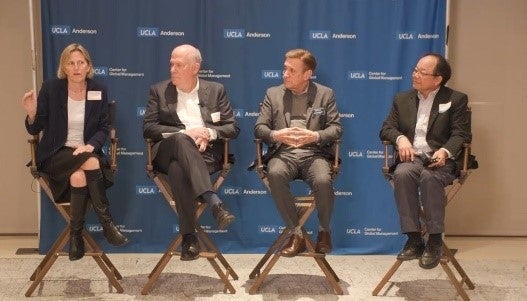
Global Business & Policy Forum: The Global Minimum Tax: Will It End Tax Competition?
Wednesday, March 8, 2023 5:30 p.m. PST
Some multinational corporations engage in tax motivated profit shifting. For example, corporations move intangible assets such as patents and intellectual property (IP) to countries with low tax rates and then report the revenues related to those assets in the low tax rate countries in order to avoid paying the higher tax rates in other countries, such as the United States, in which they are headquartered and do significant business. Some corporations are able to penetrate markets in countries in which they have no traditional presence, such as a brick and mortar store. As a result, the revenues earned in those countries in which they have only a digital presence are typically not subject to that country’s taxing authorities.
For several decades, there has been a tax competition between countries lowering their tax rates to attract foreign investment. One effect of this competition is to degrade the tax base of countries. The Organization for Economic Co-operation and Development (OECD)/Group of 20 (G20) Inclusive Framework has developed a plan to impose a global minimum corporate tax at 15 percent. In addition, a part of the plan would reallocate certain taxing rights toward the countries in which the users or customers are located, even if the company does not have a physical presence in that country. All corporations subject to the global minimum corporate tax will pay at least 15 percent of profits in taxes. Over 135 jurisdictions representing about 95% of the world economy have agreed to this plan.
On March 8, in UCLA Anderson’s Grand Salon, and remotely via Zoom, the UCLA Anderson Center for Global Management and UCLA School of Law’s Lowell Milken Institute for Business Law and Policy hosted the second discussion of the year in their joint Global Business and Policy Forum series, in its 10th year, that focused on the global minimum tax. Kimberly Clausing, the Eric M. Zolt Chair in Tax Law and Policy at the UCLA School of Law and Gonzalo Freixes, associate dean and adjunct professor of accounting, law and international business at UCLA Anderson, explored some of the impacts of a global minimum tax, and the consequences it may have for corporations and future government policy both in the U.S. and globally. First, Freixes provided some background on current and past U.S. law to provide a baseline understanding of the current law around U.S. taxation of international business transactions and how things have shifted in the last few years. Clausing then talked more specifically about the International Tax Agreement and the policy issues behind the global minimum tax. She explained why it was necessary, the changes that have to be made to implement and enforce it and what it seeks to achieve. She also shared her thoughts on whether it will have the desired effect of stopping or significantly reducing tax competition, other consequences we can expect, and lessons for multilateralism.
During the evening, there were many interactive table conversations where specific questions were discussed among the students who analyzed the issues from both a business and legal lens. Students shared their views on what it means to have a fair tax system in a global economy and how does one judge fairness in this context. They also considered whether making tax competition transparent is desirable. In light of political forces that are promoting nationalism in various countries of the world, including the west, they reflected on whether they anticipate that some countries may ultimately walk away from an agreement on corporate taxation in order to appease domestic constituencies that demand local economic growth. The discussions were thought-provoking and raised many issues from both a business and legal lens. The discussion engaged students and faculty from the UCLA Anderson School of Management and the UCLA School of Law.
Kimberly Clausing, holds the Eric M. Zolt Chair in Tax law and Policy at the UCLA School of Law. During the first part of the Biden Administration, Clausing was the Deputy Assistant Secretary for Tax Analysis in the U.S. Department of the Treasury, serving as the lead economist in the Office of Tax Policy. Her research studies the taxation of multinational firms, examining how government decisions and corporate behavior interplay in the global economy. She has published numerous articles in this area, and she is the author of Open: The Progressive Case for Free Trade, Immigration, and Global Capital (Harvard University Press, 2019). She is a nonresident senior fellow at the Peterson Institute for International Economics and a member of the Council on Foreign Relations. She has worked on economic policy research with the International Monetary Fund, the Hamilton Project, the Brookings Institution, and the Tax Policy Center. Clausing has testified before the House Ways and Means Committee, the Senate Committee on Finance, and the Joint Economic Committee. Gonzalo Friexes, is an associate dean at UCLA Anderson where he oversees three of the schools 4 MBA programs (for executive and part-time MBA students and is an adjunct professor of accounting, law and International business. He has been a practicing lawyer for over 40 years and has been on the UCLA Anderson faculty for over 30 years. In addition to his administrative duties, Freixes teaches business law, international business law, business ethics, corporate and individual taxation, and real estate law and taxation in the MBA program and in the undergraduate accounting minor. He has lectured in numerous countries in Europe, Latin America and Asia on international business and tax subjects as well as on corporate governance, business ethics, international business law and trial advocacy.
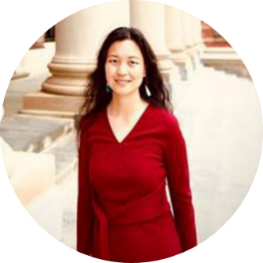
Lunchtime Discussion on The Role of the International Monetary Fund in Upholding Globalization, with Ping Wang, Communications Officer, International Monetary Fund
Thursday, February 23, 2023 11:30 a.m. PST
On Thursday, February 23, the Center for Global Management (CGM) hosted an in-person lunchtime discussion with Ping Wang, a seasoned communications professional at the International Monetary Fund (IMF) and research fellow at the Harvard Kennedy School, who has led many communications projects that have helped the IMF break through to a new generation given increasing skepticism about multilateralism. Students from the full-time, fully employed and executive MBA programs, interested in global management, joined the lunchtime session to learn more about the important role of the IMF in upholding globalization and building a framework for international economic cooperation. Wang addressed the history, role and purpose of the IMF in upholding globalization and multilateral cooperation, the role it plays during financial crises, and the kind of assistance it offered during the recent pandemic. She explained how the IMF is organized and funded, and explained its role in surveillance, funding and capacity development. Wang also touched on the technical assistance and training that the IMF provides to governments and shared that the lending capacity of the IMF is one trillion USD. Wang spent time to explain how the IMF is enhancing support to its 190-member countries as they pursue their Sustainable Development Goals, and introduced some IMF research on global economic analysis, and frontier thinking on future trends. While the IMF’s traditional areas of focus have included fiscal policy, monetary policy and financial stability, Wang shared details on some of its more recent areas of focus, such as climate change, women in the economy and inclusive growth. The discussion was organized by the Center for Global Management, and supported by Net Impact.
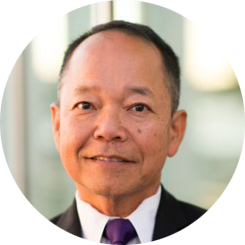
Wilbur K. Woo Greater China Business Series: China is Down, Is it Out – What Does the Future Hold for the World’s Second Largest Economy?
Tuesday, February 7, 2023 5:00 p.m. PST
After three years of isolation, China is experiencing slow economic growth that has not been seen in 40 years, and a decline in population that has not been seen in decades. The sudden change of zero-COVID policy and subsequent reopening has also brought anxiety and relief. China is experiencing a debt mountain, the first decline in property invest in 20 years, a reluctance of private enterprises to invest, an increasingly low return on investment from infrastructure spending, and the consequences of decoupling. China’s previous great reopening, after the isolation of the Mao years, led to an explosion of prosperity as goods, people, investment and ideas surged across its borders in both directions. Both China and the world have benefited from such flows. Hopefully, China’s reopening will ultimately succeed but exactly how open the new China will be remains to be seen.
What does China's economic future hold? Will the Chinese economy make a significant turnaround in 2023, rebound and resume its economic engine? Whether it does is of great significance to the world. Professor Chris Tang, UCLA distinguished professor, Edward W. Carter Chair in Business Administration, and faculty director of UCLA Anderson’s Center for Global Management (CGM) discussed these questions and trends, and the potential long-term consequences for the domestic and global economies. During a thoughtful and balanced virtual discussion, Tang addressed the impact of China’s zero-COVID policy, slow economic growth, the shrinking and aging population, and the U.S. decoupling trend and explained how to examine these issues logically. He also shared his thoughts on China’s reopening and its role in global trade.
The event was a featured discussion in the Wilbur K. Woo Greater China Business Series and was open to UCLA students, alumni, faculty, staff and members of the extended UCLA global community and general public. The Wilbur K. Woo Greater China Business Series is organized by the Center for Global Management. UCLA Anderson’s Greater China Business Association (GCBA) and UCLA’s Chinese Students and Scholars Association (CSSA) were collaborating partners. UCLA’s Asia Pacific Center and Cathay Bank were supporting organizations. VIEW VIDEO
The Wilbur K. Woo Greater China Business Series engages leading executives, innovators, influencers, investors and academics in conversations around the major forces, trends and innovations in the region across society, enterprises and consumers. Through balanced discourse, the series serves as a neutral forum to exchange ideas and learnings, understand new norms and models, and provide forward-looking perspectives on advancements to better understand the trends, opportunities and challenges of doing business in and with the Greater China region.
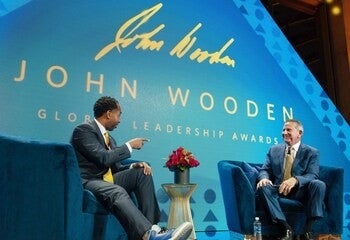
2023 John Wooden Global Leadership Award Gala Dinner Benefits the 2022 John Wooden Fellows and Honors Target Board Chairman and Chief Executive Officer, Brian Cornell (B.A. ’81, CERT ’91)
On Wednesday, February 2, 2023, UCLA Anderson honored Brian Cornell, board chairman and chief executive officer of Target with the John Wooden Global Leadership Award, at a gala dinner held at The Skirball Cultural Center in Los Angeles. First presented in 2008, the award is named for legendary UCLA basketball coach, author and leadership expert John Wooden (1910–2010). It is given each year to an exceptional business leader whose leadership style and service to the community reflect the high standards of performance, integrity and ethical values for which Wooden was known. The recognition was last bestowed in 2022 to Kenneth C. Frazier, executive chairman of the board and former CEO of Merck.
As the most successful coach in U.S. men's college basketball history, John Wooden left a legacy of leadership that transcends athletics and spans generations. As a coach, prolific author and inspiring speaker, he dedicated his life to motivating people to achieve their highest potential. Wooden instilled in others a sense of pride, a commitment to ethics and a respect for teamwork. These fundamental principles translate seamlessly from the sports arena to the realms of business, management and leadership.
The 2022 John Wooden Global Leadership Award honored a corporate leader who personifies the ideals of achievement, principle and character associated with Coach John Wooden. Coach created the timeless, inimitable blueprint for achieving success in sports, business and life: The Pyramid of Success. It connects ethics, team spirit, skill, hard work, loyalty, competitive greatness and many more attributes in a unique way, and has served as a map for many contemporary leaders. Coach Wooden stands in the record books for winning seven NCAA titles in a row and 10 in 12 seasons. For his leadership, he received the Presidential Medal of Freedom in 2004. UCLA Anderson embraces the principles of character-based leadership taught by Coach, and gives the award each year to a global influencer who will ensure that his tenets live on and inspire millions of people.
Brian Cornell was chosen as this year's Wooden Award recipient in recognition of his visionary leadership, his philanthropy, his career-long advocacy of diversity and inclusion in corporate leadership, and his commitment to establishing a positive and productive corporate culture to the benefit of Target’s team members and customers. UCLA Anderson Dean Tony Bernardo opened the evening's festivities, alongside Caroline W. Nahas, Korn Ferry senior advisor and chair of the UCLA Anderson Board of Advisors. In bringing Cornell to the stage to be recognized, Dean Bernardo said that the Target leader's many achievements and leadership positions told just part of the story of his distinguished career. "What's most notable to me is not what Brian has accomplished but how he accomplished it," Bernardo said. "Like Coach Wooden, Brian is team-centered and purpose-driven. His values are fundamental: integrity, excellence, respect and collaboration. He's lived those values, working incredibly hard at every step of his very high ladder."
At the banquet, Martin Jarmond, UCLA's Alice and Nahum Lainer Family Director of Athletics, engaged Cornell in an on-stage conversation about leadership, values and the Wooden legacy. "When I think about Coach Wooden, the first thing that comes to mind is consistency. Fundamental details were so critically important for him and there are a lot of parallels to leadership in business," Cornell said, adding that coaches and leaders face many challenges. "Never lose focus on the importance of your values, your purpose and your principles," he said. A tribute to John Wooden by Lacey Wooden, Coach Wooden’s great granddaughter, began the program and was followed by a tribute from Los Angeles Dodgers Manager Dave Roberts. Roberts spoke about his relationship with Coach Wooden and the ways in which Wooden's approach to coaching basketball influenced his own approach to managing a baseball team.
Brian Cornell heads the global, purpose-driven team of more than 400,000 behind Target, a leading American retailer with nearly 2,000 stores covering all 50 states. He joined Target in 2014 and quickly established a strategic direction that built on the company's strengths as a multicategory mass merchandiser, while spearheading investments in wages, benefits, training, diverse and equitable representation and a culture that helps all team members care, grow and win together. In 2022, Cornell was named the "Visionary" by the National Retail Federation, and Target received the top ranking on People Magazine's 100 Companies that Care list. In recent years, CNN named him the Top CEO of the Year and Target ranked second on Fortune's Best Big Companies to Work For. Prior to Target, Cornell spent more than 30 years in escalating leadership positions at leading retail and consumer-product companies. His work took him from North America to Asia, Europe and Latin America and provided insights that he leverages at Target today. Cornell currently serves on the National Retail Federation's executive committee and The Business Council and is non-executive chairman of the board for Yum! Brands. A career-long advocate of diversity and inclusion in corporate leadership, he is a board member for Catalyst, and Target recently received the Executive Leadership Council's Corporate Award for its commitment to diversity, equity and inclusion. Cornell earned a bachelor's degree from UCLA in 1981 and attended UCLA Anderson School of Management, where he serves on the board of advisors.
The audience of over 500 included UCLA Anderson Board of Advisors members and other generous supporters, along with members of Coach Wooden’s family, members of the Anderson family joined current and past Wooden Fellows, UCLA Anderson students, alumni, faculty and senior leadership from across the UCLA campus for the ceremony. Net proceeds from the annual event support fellowships for UCLA Anderson students who embody Coach Wooden’s leadership ideals and commitment to improving the lives of others. During the ceremony, the four 2022 fellowship recipients: Allen Chen (UCLA-NUS EMBA ’22), Samuel Fein (FTMBA ’23), Sonia Ly (EMBA ’23) and Nick Sharma (FEMBA ’23) were recognized and awarded the John Wooden Global Leadership Fellowship, which is among the most prestigious honors Anderson students can receive. They took the stage to express their thoughts on what Coach Wooden’s values-based leadership means to them. Wooden Fellows are honored because they possess his focus on ethics, team spirit, skill, hard work and loyalty, along with a commitment to constant learning, continual improvement and innovation. Each of the four 2022 John Wooden Global Leadership Fellows will receive a $35,000 fellowship. Read more about the 2022 Fellows.
Previous John Wooden Global Leadership honorees include: Kenneth C. Frazier, executive chairman of the board and former CEO of Merck; Mellody Hobson, co-CEO and president, Ariel Investments; Reed Hastings, co-founder and CEO, Netflix; W. James (Jim) McNerney Jr., retired chairman, president and CEO, The Boeing Company; Ursula Burns, former chairman and CEO, Xerox; Paul E. Jacobs, former executive chairman, Qualcomm; Robert Iger, chairman and CEO, The Walt Disney Company; Indra Nooyi, former CEO, PepsiCo; Peter Ueberroth, managing director, Contrarian Group, and president of the Los Angeles Olympic Organizing Committee; Frederick Smith, president and CEO, FedEx; Kenneth Chenault, former chairman and CEO, American Express Company; and Howard Schultz, former chairman and CEO, Starbucks.

The Los Angeles Global Health Conference, “Moving Towards Global Solidarity: Examining the Shared Impacts of COVID-19”
January 2023
After a three year hiatus due to the pandemic, the sixth annual Los Angeles Global Health Conference (LAGHC), “Moving Towards Global Solidarity: Examining the Shared Impacts of COVID-19,” took place both virtually and in-person at UCLA on Saturday, January 28, 2023. The 2023 conference, hosted in Southern California, brought together approximately 210 individuals who joined either in-person or virtually from various disciplines across academia, NGOs, business, and the public sector to discuss timely topics in global health and provided an interactive educational forum to discuss innovative ways to tackle health disparities—locally and globally. Home to individuals from more than 140 countries speaking 224 different languages, Los Angeles's rich cultural diversity makes it an ideal place to examine the current status of global health.
The LAGHC is organized by students from medicine, public health, and other disciplines from universities across Southern California, including UCLA, and, Kaiser Permanente, and others. The conference educates and connects with members of the Los Angeles communities on health equity topics in our own backyards and around the world.
Amidst the persistent devastation that the pandemic sparked across the world, we find ourselves in a new opportune landscape for global health. With this new landscape, we can collectively work to dismantle the deep social inequities underscored by the pandemic, utilize novel solutions to improve healthcare delivery, and lean on one another to support the mental well-being of our world as a whole. The 2023 conference was centered around three primary themes: health-system equity, social justice, and public health infrastructure; the window of opportunity for health technologies; and making mental health and well-being a global priority.
The opening keynote address, “ Achieving Global Solidarity by Leading with a Health Equity Lens, “ was delivered virtually by Dr. Matifadza Hlatshwayo Davis, MD, MPH, director of health for the City of St. Louis, and a national and international medical contributor on COVID-19 with a particular focus on marginalized populations. The afternoon keynote delivered by Dr. Patricia Gordon looked at “Closing the Gaps: Increasing Global Health Equity for Women Through Innovation Programs for Cervical Cancer Prevention.” Dr. Gordon graduated from UCLA School of Medicine in 1982 and worked as a radiation oncologist in Los Angeles for 28 years. Her commitment to saving women’s lives in low and middle-income settings led her to an additional career as a non-profit leader and international women’s health advocate. In 2014, she founded CureCervicalCancer, which trains local healthcare professionals to screen and treat women for cervical precancer. The organization has established 106 sustainable and ongoing CureCervicalCancer clinics in Kenya, Tanzania, Ethiopia, Nigeria, Haiti, Guatemala, Vietnam, and training programs in rural China – where help is needed most. In 2021, she was nominated as a Top 10 CNN Hero of the Year for her efforts to fight the global epidemic of cervical cancer.
The day also included numerous breakout sessions around the three key themes and included topics such as the impact of COVID-19 on our mental health, developing health technology peri-pandemic, COVID vaccination education in underserved communities, the impact of COVID-19 on the landscape of telemedicine, and impacts of COVID-19 on native communities.
The UCLA Anderson Center for Global Management was a silver sponsor of the event. Other sponsors included the UCLA International Institute, UCLA Health, UCLA David Geffen School of Medicine and its Global Health program, UCLA AIDS Institute, and The Promise Institute for Human Rights at the UCLA School of Law, among others.
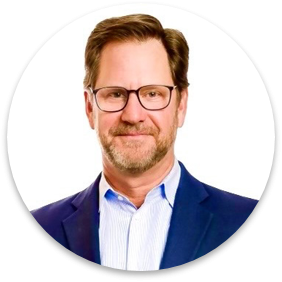
Lunchtime Discussion on the Global Media and Entertainment Landscape: Working on the Business and Creative Sides Corporately and Then Venturing into the Entrepreneurial World to Start His Own Media Companies, with Jon Niermann (’95), CEO and Co-founder, Loop Media, Inc.
On Tuesday, January 24, the Center for Global Management welcomed Jon Niermann (’95), an alumnus of the FEMBA program and member of the CGM’s advisory board, back to his alma mater for a lunchtime discussion with students. During his career of over 30 years, Niermann has achieved success on both the corporate and entrepreneurial business worlds in the U.S. and Asia. He built his entertainment career with The Walt Disney Company and Electronic Arts, serving as president of both company's Asian operations, prior to starting his own media companies. Niermann left the corporate world after 22 years to start his own company, FarWest Entertainment (2010), a multi-platform (television, music, animation, digital) media and entertainment company that focused on bridging Asia with the West. In 2016, he co-founded Loop Media, Inc., which went public on the NYSE in 2022. Loop Media is a Digital Out of Home video streaming company, that serves as a content platform for public venues and businesses – large and small. Loop is the largest provider of music videos and other short-form content to top businesses.
Students from all four MBA programs, interested in global management and business, including members of the Entertainment Management Association joined the interactive session to hear about Niermann’s successful career trajectory post-Anderson. He discussed his experiences working on the business and creative sides of large companies and then venturing into the entrepreneurial world full-time with his own media companies, and his 15 years of living in Hong Kong, Shanghai, Singapore and Tokyo. He also shared his thoughts and insights on the global media and entertainment landscape, as well as the implications for the industry, in the short and longer terms, as a result of the trends that have been accelerated by the COVID-19 pandemic ,and addressed the pivot that Loop Media had to quickly made. He addressed lessons learned over the years, why he made certain decisions throughout his career, and provided students with some tangible advice as they think about their own career paths and industry pivots. The discussion was organized by the Center for Global Management and supported by the UCLA Anderson Entertainment Management Association.

Celebrating Lunar New Year at UCLA Anderson
To celebrate the Year of the Rabbit, promote familiarity with and understanding of the Asian culture among the Anderson community, and strengthen cross-club collaboration, on Thursday, January 19, 2023, the Center for Global Management supported the Greater China Business Association (GCBA), Asian Management Student Association (AMSA), Korean Business Student Association (KBSA), the Taiwanese Student Business Association (TSBA, and Southeast Asian Business Association (SEABA) to celebrate the Lunar New Year during Andernoon. Lunar New Year, which fell on Sunday, January 22, 2023, is one of the most important holidays in many Asian countries, and celebrated by even more people of Asian heritage globally. It marks the end of winter, beginning of spring, and the arrival of the new year. The rabbit is the symbol of longevity, peace, and prosperity in Chinese Culture, thus 2023 is predicted to be a year of hope.
During Anderson Afternoon on January 19, 2023, these clubs took the opportunity to invite the UCLA Anderson community to join and celebrate the Lunar New Year together. This year, over 200 UCLA Anderson students, faculty, and staff participated in the festivities. The North Terrace was transformed into a sea of red with lantern decorations and many different types of décor to bring out the best of the holiday spirit. Asian food was also served to fully indulge the community in the celebrations. UCLA’s Chinese Lion Dance Troupe, affiliated with the Association of Chinese Americans (ACA), known as ACA Lion Dance, performed 2 traditional lion dances for the students to enjoy. Lion Dance is a form of traditional dance in Chinese culture and other Asian countries, often performed at festivals, to bring good luck and fortune. Students also enjoyed some traditional Chinese candy.
The event was hosted by GCBA, AMSA, KBSA, TSBA, and SEABA, and supported by the CGM, Anderson Student Association and the Office of Equity, Diversity, and Inclusion.
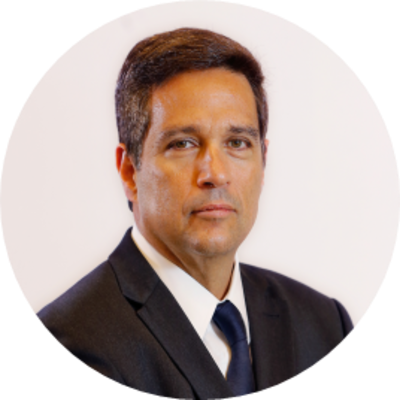
Latin American Business Series: Brazil’s Role and Advances in Fintech and Digital Payment Systems – A Discussion with Roberto Campos Neto (B.S. ’93, M.A. ’95), President, Central Bank of Brazil
Brazil receives over half of all investments made in fintech in Latin America and is home to the highest number of unicorns in the region. The rise of fintech in Brazil represents many of the main challenges and opportunities in the country. Despite facing many policy challenges, Brazil is highly digitized. While mobile banking has been commonplace for years, the recent pandemic accelerated trends in the banking sector where the adoption of digital payments and digital wallets had been rising fast, especially among citizens who previously had no access to banking services – propelling Brazilian fintech forward.
On January 19, the Center for Global Management (CGM) was honored to welcome Roberto Campos Neto (B.S. ’93, M.A. ’95), governor of the Central Bank of Brazil, back to his alma mater for a fascinating discussion on the Central Bank of Brazil’s innovation agenda and Brazil’s role and advances in fintech. During his 20+ year tenure at Santander, he initiated a global project on technology innovation as part of the "Digital Bank" initiative. He also launched initiatives on blockchain, digital assets, and other innovations shaping the financial markets of the future. During the discussion, the in-person audience, made up of students and alumni from UCLA Anderson’s MBA, PhD and MFE programs and students studying economics at UCLA, had the opportunity to hear from Governor Neto, a strong believer in technology and financial innovation, as he reviewed these technological developments and the Central Bank’s technology agenda, including Pix, an instant payment platform created and managed by the Central Bank of Brazil, which enables the quick execution of payments and transfers. He explored the impact and implications for Brazil, the U.S. and the world; discussed the risks and challenges faced by financial institutions and examined opportunities for startups, venture investors and the global investment community. The conversation, that was also broadcast live to a remote audience of alumni and interested members of the general community, was moderated by Sebastian Edwards, distinguished professor and Henry Ford II Chair in International Management. Dean Tony Bernardo delivered opening remarks. The discussion was a featured event in the CGM’s Latin American Business Series. The UCLA Latin American Institute and Anderson’s Latin American Business Association were supporting organizations. VIEW VIDEO
The Latin American Business Series engages the audience in interactive conversations with prominent and influential private and public sector leaders, that address the region’s important and influential role in the global economy, and the world. Through balanced discourse, leaders share experiences, insights and forecasts on the economic, political and social prospects for the region, and discuss business and investment opportunities. The series serves as a platform to build networks, exchange ideas and understand the trends, opportunities and challenges of doing business in, and with Latin America.
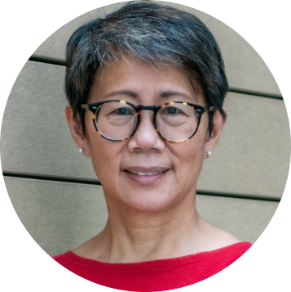
Lunchtime Discussion on The Business of Sustainability in the U.S. and Asia, Working with Public Policy and Advising the Private Sector, with Christine Loh, Former Undersecretary for the Environment, Hong Kong Government
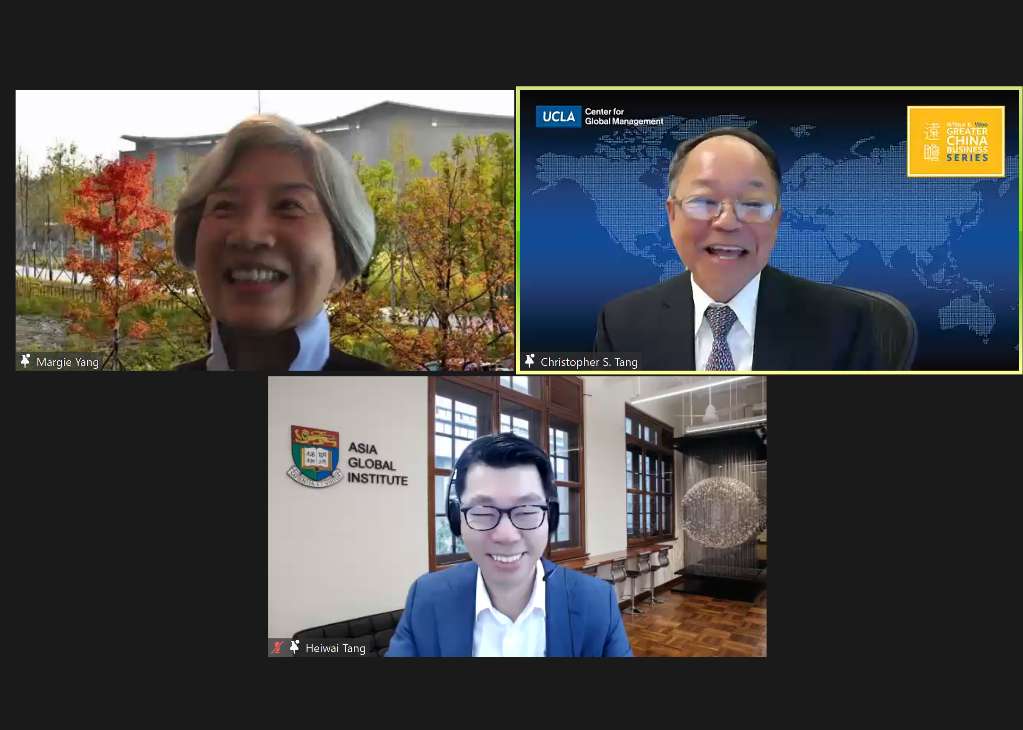
Wilbur K. Woo Greater China Business Series: Leadership in Sustainable, Socially Responsible and Tech-Driven Innovation
How should a firm go beyond financial measures to create a more environmentally sustainable and socially responsible future? On January 11, the Center for Global Management (CGM) hosted Margie Yang, chairman of the Esquel Group. Headquartered in Hong Kong and based in China, the Esquel Group is a family-owned, knowledge-based innovation company with textile and apparel manufacturing operations in mainland China. Professor Chris Tang, faculty director of UCLA Anderson’s Center for Global Management, and Professor Heiwai Tang (B.S. ’00), director of Hong Kong University’s Asia Global Institute moderated the inspiring conversation with Yang, who has long been an advocate for environmental conservation and sustainable production. Yang addressed how the company has embraced automation and environmentally friendly production processes in its operations in China, where it faces rising labor costs and stricter environmental regulation. She discussed the importance of transparency in supply chains and demonstrated how the company has developed a business model that makes money, protects the environment and empowers its people. It was an impressive, inspiring and insightful discussion and broad-reaching conversation. During the audience Q&A, Yang was asked how companies can make better ESG-related decisions while the standard for measuring ESG is neither fully established nor broadly accepted. She also addressed some lessons have been learned on how to tackle the supply chain challenges caused by the geopolitical issues and COVID-19 challenges in recent few years.
The event was featured as the inaugural discussion in the Wilbur K. Woo Greater China Business Series. This discussion was in collaboration with HKU’s Asia-Pacific Economic Cooperation (APEC) Study Center and open to UCLA students, alumni, faculty, staff and members of the extended UCLA global community and general public. The Wilbur K. Woo Greater China Business Series is organized by the Center for Global Management. UCLA Anderson’s Greater China Business Association (GCBA) and UCLA’s Chinese Students and Scholars Association (CSSA) were collaborating partners. UCLA’s Asia Pacific Center and Cathay Bank were supporting organizations. VIEW VIDEO
The Wilbur K. Woo Greater China Business Series engages leading executives, innovators, influencers, investors and academics in conversations around the major forces, trends and innovations in the region across society, enterprises and consumers. Through balanced discourse, the series serves as a neutral forum to exchange ideas and learnings, understand new norms and models, and provide forward-looking perspectives on advancements to better understand the trends, opportunities and challenges of doing business in and with the Greater China region.
Born in China in 1916, the late Wilbur K. Woo (B.A. ’42) received his bachelor’s degree in business administration from UCLA. He went on to become a major figure in LA's business, political, cultural and charitable arenas and was known for his decades of leadership in the Chinese-American community. Global reach starts with global thinking, and two decades ago -- recognizing the rapid expansion and modernization of China’s economy -- Wilbur Woo, the vice chairman of Cathay Bank, and his wife Beth endowed the Wilbur K. Woo Greater China Business Conference at UCLA (now rebranded as a Series) to show their gratitude for the training Wilbur had received at his alma mater. The Woos' goal was to facilitate dialogue, promote understanding, and strengthen the important ties between the Greater China region and the United States—to identify areas of collective opportunity, foster cooperation, and bring a group of leaders—both aspiring and current -- together to collaborate and learn together. These events and discussions have continued to have a powerful impact on our community—here at UCLA and beyond.
Past Center Sponsored Events
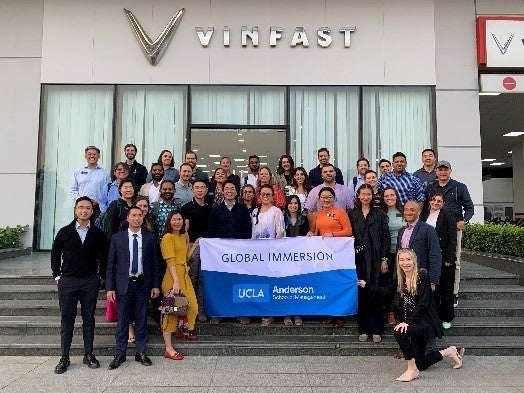
Students and Alumni Travel to Hanoi and Ho Chi Minh City on Global Immersion Course to Learn About Entrepreneurship in Developing Countries: Focus on Vietnam
Wednesday, December 14 – Thursday, December 22, 2022
During winter break, a second group of over 30 students and alumni from all four of UCLA Anderson’s MBA programs, visited Hanoi and Ho Chi Minh City to explore how political and economic policies in Vietnam play out in one of Southeast Asia’s most vibrant economies, with a particular focus on entrepreneurship. The course was taught by George Abe, adjunct professor of entrepreneurship. This was the fourth global immersion course to focus on and visit the country. The last time was in December 2018. The course exposed students to a country that is not well understood, but that holds considerable importance to Asia and inevitably on the global scene. During the in-country week, students had opportunities to hear from, and engage and network with entrepreneurs in the country, including successful UCLA alumni doing business in Vietnam, and with business and government leaders through fireside chats, company and accelerator visits, and smaller interactive group discussions. They were able to compare and contrast the start-up scenes in both cities too.
The inaugural sessions in Hanoi, included discussions with representatives from the U.S. Embassy Hanoi and the American Chamber of Commerce, that plays a key role in the commercial life of Vietnam. Students were provided with an overview of the history of Vietnam and the evolution of the country’s economy, trade, commerce and investment. They also heard about supply chain issues, corruption and education initiatives. In Hanoi, students learned about the power of social enterprises in the country with a visit to the Protec Helmet factory. Protec is a social enterprise, based in Vietnam, that channels profits into traffic safety through the operations of the Asia Injury Prevention (AIP) Foundation in Vietnam, Thailand and Cambodia. Students toured the Protec Helmet factory that manufactures high quality helmets and employs the physically disabled. The AIP Foundation is a non-profit enterprise that combats and rises awareness about the growing traffic crisis in Southeast Asia and other developing low-income countries, and provides access to quality helmets and road safety education to promote safe behavior among high-risk road users. At the factory, students heard from Greig Craft and Hoang Thi Na Huong, president and founder, and chief executive officer respectively, of the AIP Foundation. Later in the week, students enjoyed a visit to VinUniversity, a private and nonprofit university located in Hanoi that was established by the private corporate Vingroup, following the approval by the Prime Minister of Vietnam in March 2018. Here, they learned more about the Vingroup ecosystem. Vingroup is the largest conglomerate of Vietnam, that focuses on technology, industry, real estate development, retail, and services ranging from healthcare to hospitality. Students were educated on how VinFast, a member of the Vingroup, has been the first Vietnamese car brand to expand into global markets, and the first to expand into producing EVs such as electric cars and electric scooters. They also learned about its presence and hopes for expansion in the U.S. marketplace and got to see some VinFast cars and the Vinhomes Ocean Park project.
To better understand the start-up scene in Hanoi, the group visited the Hanoi University of Science and Technology (HUST), a public university that is the first and largest technical university in Vietnam. In 2008, HUSK established BK Holdings within the university with the objective to mobilize resources of government, organizations and individuals, domestic and foreign enterprises to participate in the research process, incubator and commercialization of science and engineering technology products of the university. At its incubator space, students heard from founders of various startups involved in the edtech, deep tech and robotics, medical, and environmental space. Students also had an opportunity to break out into groups through interactive sessions with some of its start-up companies.
Over the weekend, the group flew to Ho Chi Minh City (HCMC). Here, they visited Dreamplex, that provides co-working space, and were able to compare and contrast the start-up scene between Hanoi and the country’s largest city. At Dreamplex, students had the opportunity to tour the facility, and hear from and interact with some of its tenants. These included successful entrepreneurs and founders of five fascinating and quite advanced companies providing online education for coding (CoderSchool), an employee engagement platform (Flambé), a general learning app (MoveUp Vietnam), a vocabulary app (WordsMine!), and a digital content application for audiobooks and e-books, among others (Fonos). In HCMC, students also had the opportunity to visit Zone Startups Vietnam. At the accelerator, they learned about empowering and supporting female tech entrepreneurs and enjoyed a presentation by a female co-founder from one of its startups, Medifood, whose products promote health and wellbeing. The time in HCMC also included a fascinating visit to Glass Egg, an art outsourcing studio and game developer/publisher to hear about the company’s history, evolution, and future aspirations. The visit included a tour of the facilities where students could observe the graphic designers develop , design and code the 3D visual environments for games. At Ho Chi Minh Securities Corporation (HSC), a leading a securities brokerage firm and investment bank in Vietnam, Quan Le ('00), chief partnership officer and Giang Trinh, chief executive officer discussed Vietnam’s stock market and capital markets. In class, students had studied and read cases on both Glass Egg and HSC so these visits were particularly meaningful and informative. The group was also educated on the legal landscape in the country by Ms. Phuong Nguyen, a partner at Baker & McKenzie and two associates, including UCLA alumnus Tuan Minh Le (B.A. '10) and Rachelle Komarnisky. They were taught more about the main aspects of the Vietnamese business culture in professional services by Rizwan Khan, a partner at Acclime, a professional corporate services firm in Vietnam that helps companies that are looking to expand into Vietnam and Asia to navigate the complexities and challenges of the regional regulatory environment.
Opportunities to hear from, and network with alumni during the week were also provided. EMBA alumnus Calvin Lam (’01), chief executive officer of iBasic hosted the group. iBasic is an end-to-end designer, manufacturer and retailer of mid-priced underwear that operates a chain of specialty stores in Vietnam. Professor Abe led a fireside chat with Lam where he addressed iBasic and talked about some of his other business ventures, including forestry and a restaurant. Lam was very open in his explanation around starting a business in Vietnam, and the business climate in the country. At the conclusion of the week, the professor moderated another fireside chat with Crystal Lam, a Berkeley alumna and managing director of Vinawood. Lam shared her experience running and managing a business and manufacturing operation in the country. Vinawood is a Vietnam-based manufacturing company that specializes in wooden furnishings and is a leading global supplier of wood blind and shutter components. The company, that serves primarily the United States, Europe and Japan markets, is committed to developing products with timeless design through socially responsible practices.
During the week, students visited key sites of historical importance and cultural significance, experienced local culture, and enjoyed local Vietnamese cuisine. In Hanoi, they visited Hỏa Lò Prison (known as the “Hanoi Hilton”), a prison originally used by the French colonists in Indochina for political prisoners, and later by North Vietnam for U.S. prisoners of war during the Vietnam War. The prison site has been modernized while one wing has been retained as a museum.
A city tour of Hanoi also passed by notable sights, including the Ho Chi Minh Mausoleum; Truc Bach Lake where former Senator John McCain was shot down and parachuted into the lake and was later taken prisoner during the Vietnam War; and the Temple of Literature, a temple dedicated to Confucius and Vietnam’s first national university. The group also strolled through the Old Quarter and past the Hoan Kiem Lake. Mid-week, students enjoyed a relaxing cruise around the amazing Ha Long Bay, a UNESCO World Heritage Site, known for its emerald waters and thousands of towering limestone islands topped by rainforests. They visited its Thiên Cung Cave, in the south-west of Ha Long Bay, with intricate stalactite and stalagmite formations. In HCMC, students visited the War Remnants Museum. The deeply moving museum documents, through extremely informative and moving exhibits, many of the atrocities of the Vietnam War, known in Vietnam as the American War, and exposes war crimes and graphic photography. The French colonial period and conflicts with China are also documented. The city tour passed by well-known, prominent landmarks, including the Notre Dame Cathedral and Post Office. At the conclusion of the week, some students stayed to explore Vietnam while others headed home or explored other parts of southeast Asia after a truly memorable and enriching week in Vietnam.
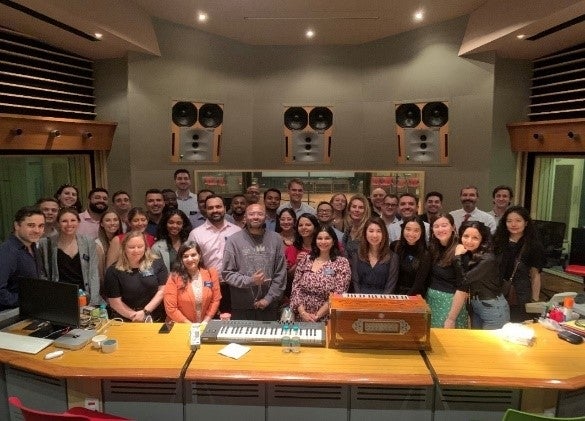
Students and Alumni Travel to Mumbai and Hyderabad to Better Understand the Business Environment of India, with an Emphasis on Entertainment and Finance (Mumbai) and Tech and Biotech (Hyderabad)
Tuesday, December 13 – Wednesday, December 21, 2022
During winter break, 35 students and alumni from three of UCLA Anderson’s MBA programs – executive, fully employed and full-time - visited Mumbai and Hyderabad to familiarize themselves with India’s business environment, and explore both the risks and opportunities offered by the Indian market for foreign investors and domestic entrepreneurs alike.
The course was taught by Romain Wacziarg, professor of economics and the Hans Hufschmid Chair in Management. This was the sixth global immersion course to focus on and visit India, and the second time to incorporate both Mumbai and Hyderabad together. The last time was in December 2019. The course provided students with a general understanding of the business environment of India and conveyed familiarity with the specificities of the market ,and non-market environments of business in India. It also provided detailed knowledge of four critical sectors of the Indian economy: finance, entertainment, high technology and biotech/ healthcare. The sessions in India, featured meetings with business leaders and entrepreneurs, including UCLA alumni, academics, and relevant members of the civil society. Due to our destination cities being centers of finance and entertainment (Mumbai) as well as tech and biotech (Hyderabad), these sectors were also the subject of some emphasis during the in-country week. The time in India included visits to places of historical and cultural importance too.
While in Mumbai, the group was exposed to a wide range of sessions that covered the full spectrum of financial services and access. The inaugural session, included a discussion on microfinance, its history and current landscape in India with Anujeet Varadkar, the chief executive officer of Svatantra Microfin Pvt. Ltd. Svatantra is a microfinance institution (MFI) that helps women customers in rural villages become economically self-sustainable by providing micro-loans. Varadkar described the company’s operations, addressed the evolution of the MFI sector in India and the main players; shared some key industry statistics; and explained the role of Svatantra. On a more macro level, students visited the Reserve Bank of India (RBI), the country’s central bank, that uses monetary policy to create financial stability in the country. The RBI is charged with regulating the country's currency and credit systems. Students heard from some of RBI’s senior staff members from the departments of economic and policy research, monetary policy, and fintech. They learned more about India’s monetary policy and financial regulations, the modernization of the country’s financial infrastructure, and the progress made towards payments and access to finance.
Students heard from Navneet Munot, managing director and chief executive officer of the Housing Development Finance Corporation (HDFC) Asset Management Co. Ltd, an Indian private development finance institution based in Mumbai, and a major housing finance provider in the city. Munot provided an overview of the Indian economy, the mutual fund industry and asset management business in the country, including competition in the sector and growth in recent years. He also addressed the focus on ESG and how the company is spreading financial literacy digitally. The group also had the opportunity to hear from Harish Madaan, a director at the Mumbai branch of Industrial and Commercial Bank of China (ICBC). Madaan also provided an overview of the Indian economy and addressed government regulation and strategy. He talked about the global macro trends of deglobalization, climate change and digitization, and India’s initiatives and challenges in these areas. He also addressed the Central Bank’s endeavor around digital currency, known as the digital rupee. He described how structural changes across the globe have opened up new opportunities for India, a country with a favorable demographic structure to capture such opportunities. Students also visited Axis Bank, the third largest private sector bank in India to hear about its strategy and new initiatives.
On the entertainment side, students visited Jio Creative Labs and Yash Raj Films. Jio Creative Labs works with numerous Bollywood celebrities and is an independent strategic business unit of Reliance Jio Infocomm Ltd., established with the vision of becoming the new-age creative agency to service the ever-evolving needs of brands. Students learned about the media and entertainment landscape in India and the role of advertising and branding. They were provided with a summary of some of the different campaigns and advertising methods that are directed to various regions in India. They also heard about content production and industry outreach; and how revenue is generated in Hindi cinema, popularly known as Bollywood (formerly as Bombay cinema), the film industry based in Mumbai. They learned about consumer behavior too. The group enjoyed a visit to Yash Raj films, an Indian film production and distribution company that mainly produces and distributes Hindi and Punjabi films. The company has grown to be one of the largest film studios in India and is the only privately held and fully integrated studio in the country, producing and having produced over 80 films. Akshaye Widhani, chief executive officer spoke about the company’s evolution, films that have defined the studio, and led a Q&A session. The group was also taken on a tour of the studios and learned about the process of set design.
To continue with the entertainment theme, students received presentations from representatives of Warner Bros. Discovery on the streaming business in India and expansion of the over-the-top (OTT) streaming by international players into the Indian Market. Tushar Singh, director of product international and expansion, APAC provided some fascinating facts on the users, where they are streaming, how they pay and what they are watching, and also on the expansion of the OTT platforms in India. Following this, Ali Hussein, chief executive officer of Eros Now, provided an overview of the company, its content type and subscribers, and its position in the global OTT market. Eros Now is an Indian subscription-based OTT, video on-demand entertainment and media platform that launched in 2012. It is owned and controlled by Eros Digital, the Indian digital media management arm of the Indian-American multinational media company Eros Media World.
In Mumbai, to complement the visits and presentations, students enjoyed a panel discussion at the historic Royal Bombay Yacht Club where various industry leaders addressed doing business in India from their own industry and personal perspectives. Panelists included UCLA Anderson alumnus Abhishek Agarwal (’10), co-founder and chief executive officer of CreditVidya, a leading player in the alternative credit scoring space in India that leverages alternative data, AI and machine learning to facilitate institutional credit for the underserved. Later in the week, the group visited CreditVidya in Hyderabad. Agarwal was joined on the panel by Vinati Mutreja, a successful Indian woman entrepreneur who is chief executive officer and managing director of Vinati Organics (the family business) and Karan Bhagat, chief executive officer and founder of IIFL Wealth and Asset Management, an Indian wealth management firm and diversified financial services company. The panel was moderated by Professor Romain Wacziarg. A networking event followed. Alumni from UCLA Anderson’s full-time, UCLA-NUS EMBA and PGPX programs joined the evening.
Later in the week, the group flew to Hyderabad where the focus of the sessions was centered around health care, biotech and technology. An overview of the biotech industry in India was provided during a fascinating visit to Bharat Biotech, the largest vaccine and bio-therapeutics manufacturer in India. Students learned more about the company, that has delivered over 4 billion vaccines doses all over the world and was among the first to develop vaccines for viral diseases such as Chikungunya and Zika. It also developed and manufactured the Covaxin during the pandemic. On October 12 2021, Bharat Biotech's Covaxin got approved for usage on children between the ages of 2 and 18. At Dr. Reddy’s Labs, students heard from Deepak Sara, the chief executive officer of active pharmaceuticals ingredients (API) and services, who provided an overview on the health care sector in India, the country’s biopharma industry, and India’s contribution to global health care. He described the evolution of Dr. Reddy’s Labs, an Indian multinational pharmaceutical company that manufactures and markets a wide range of pharmaceuticals in India and overseas, and explained how the company uses science and technology to accelerate access to affordable and innovative medicine. The company has over 190 medications and 60 APIs for drug manufacture, diagnostic kits, critical care, and biotechnology.
Following the visits to Bharat Biotech and Dr. Reddy’s Labs, students were taken on a tour of the LV Prasad Eye Institute (LVPEI). LVPEI’s mission is to provide equitable and quality eye care to all sections of society. In 1987 in Hyderabad, LVPEI was established by Dr. Gullapalli Nageswara Rao, an academic ophthalmologist, with a generous contribution by L.V. Prasad, a pioneering Indian film producer, actor, director, cinematographer and businessman who was struck by the lack of good eye care in India. LVPEI is now a World Health Organization Collaborating Centre for Prevention of Blindness and a comprehensive eye health facility. LVPEI is a non-profit, multi-campus, non-governmental institution. With more than 200 eye-care centers in India, it is the largest eye-care network in the world. Students received a fascinating tour of the facility where they learned about and observed firsthand the different areas and levels of service and comfort given to patients, based on what they can afford to pay.
During their time in Hyderabad, the group had the opportunity to visit the Microsoft campus and gain insights on how a large U.S. multi-national tech company operates in India. They were hosted at CreditVidya by Abhishek Agarwal (’10), its co-founder who they met earlier in the week in Mumbai. At CreditVidya, they met with members of Agarwal’s leadership team to hear more about how CreditVidya accelerates financial inclusion in India and enables access to affordable institutional credit by financially excluded citizens. They explained the company’s model and how this is done by running artificial intelligence (AI) and machine-learning (ML) models on traditional and alternative data for superior credit-risk assessment, and how its underwriting technology is opening the country’s loans market to over 250 million financially excluded citizens. Traditionally, financial institutions have been unwilling to lend to these citizens because they lack collateral and a credit history. CreditVidya’s technology is reducing the cost of processing loans from about $2 to less than one cent while overcoming a lack of credit history or collateral by leveraging loan applicants’ digital footprints to measure their creditworthiness. To determine creditworthiness, CreditVidya’s AI and ML platform leverages payment data, financial behavioral data, and device data stored on smartphones to help determine loan applicants’ ability and intent to repay loans.
At the conclusion of the week, the group was hosted by the Indian School of Business (ISB) at its Hyderabad campus. Students received a fascinating presentation by Professor Amir Ullah Khan, a development economist and visiting professor from the Indian School of Public Policy who spoke about digital solutions to growth and development challenges in India. They later visited the I-Venture@ ISB to learn about India’s tech start-up scene and ecosystem, and the role of I-Venture@ISB from Professor Bhagwan Chowdhry, faculty director of I-Venture and professor emeritus of finance at UCLA Anderson. I-Venture@ISB fosters entrepreneurship and nurtures start-ups. It has very specific programs that caters to entrepreneurs and ventures at all stages. The group heard how it is working towards creating a strong ecosystem of mentors, VCs and academicians to ensure the startup’s reach to market and growth. The group met with some of its start-up companies in the health care, digital health and agricultural space.
During the week, students also got to experience some of the culture, cuisine and sights of India. In Mumbai, they visited the Colaba and Fort areas, including the Kala Ghoda Statue, Rajabai Clock Tower and the iconic Gateway of India. They enjoyed a guided tour of Elephanta Caves, a collection of cave temples predominantly dedicated to the Hindu god Shiva, and a UNESCO World Heritage site. The rock-cut Elephanta Caves, situated on an island close to Mumbai, were constructed around the mid-5th to 6th centuries AD and contain rock cut stone sculptures and carvings that narrate Hindu mythologies. In Hyderabad, the group visited the Old City that was designed with Charminar as its centerpiece, a mosque and monument constructed in 1591 which is the most famous landmark of Hyderabad. At the conclusion of the week, some students headed home for the holidays, while other students remained in India to explore other parts of the country.
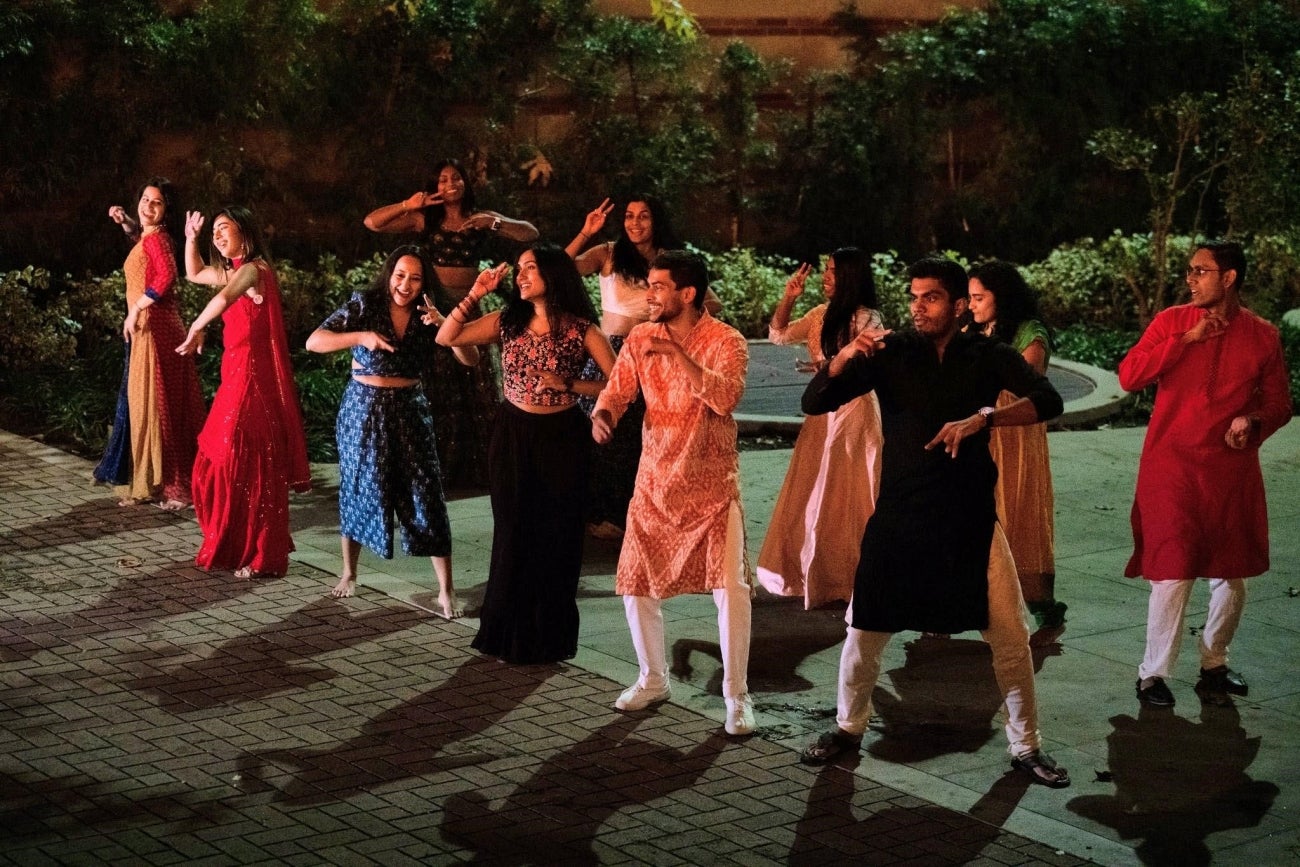
Celebrating Diwali at UCLA Anderson
Wednesday, November 9, 2022
To celebrate the various cultures and identities of UCLA Anderson, the Center for Global Management actively supports events hosted by student clubs such as the South Asian Business Association (SABA), one of the largest identity clubs at Anderson. SABA celebrates the culture of South Asia and hosts all-Anderson events. One such event is the annual Diwali celebration. It is celebrated every year in the fall, usually in the months of October and November in the northern hemisphere (spring in the southern hemisphere). Diwali or Deepavali is the festival of lights that marks the victory of good over evil and is one of the biggest festivals celebrated primarily by the Hindu diaspora in South Asia.
While the festival is 5 days long, most people celebrate the third day which is marked by a puja, a feast, and fireworks. It is generally associated with Lakshmi, the goddess of prosperity and wealth. Diwali is also celebrated outside of non-Hindu communities. On November 9, 2022, close to 300 domestic and international students from Anderson’s FTMBA, FEMBA, MFE and MSBA programs attended the annual Diwali celebration. UCLA Anderson’s North Terrace was transformed and students, dressed in the most ethnic attire, danced and feasted on Indian food. Various aspects of Indian culture were on display with a Bollywood dance showcase by members of SABA from the full-time MBA and MSBA programs. Other activities to engage the attendees included booths for mehndi/henna tattoo and ethnic clothing. Each year, SABA creates a “home away from home” Diwali celebration for South Asian members of the Anderson community while at the same time, facilitates assimilation for other members of the community. The Center for Global Management was a sponsor of the event.
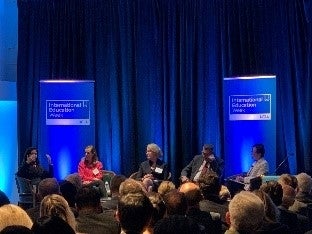
International Education Week (IEW) at UCLA
Monday, November 7 - Thursday, November 10, 2022
International Education Week (IEW) is an annual celebration of international education and exchange initiated by the U.S. Departments of State and Education and observed by universities around the nation. IEW is a time to recognize and acknowledge the benefits and importance of the global mobility of students and scholars to study, research, or teach; of those who engage in community-based service learning at home and abroad; and of the continuing need to increase knowledge about the world, intercultural skills, and the capacity to solve global problems collaboratively.
IEW 2022 at UCLA ran from November 7 – 10, 2022. For the seventh year in a row, the UCLA International Institute led a large-scale UCLA cross-campus collaboration in observation of International Education Week through a mix of in-person and virtual programming. IEW took a deep look at the enduring value of international education and exchange through the eyes of faculty, students and alumni, and was attended by hundreds of Bruins (past and present) and the general public. The Center for Global Management is a cosponsor of IEW each year.
With support from 27 campus units, IEW 2022 offered students, faculty and staff a broad range of events and activities that showcased the depth and breadth of UCLA’s international educational and cultural resources. From martial arts workshops to art exhibits to lectures on international politics to international career events, there was something for everyone to enjoy. The week highlighted the immense value of international education for U.S. students — whether acquired through study abroad, language study, international internships, research or internationally oriented coursework — as well as the immeasurable contributions made to U.S. campuses by students and scholars from other countries, whose unique perspectives expand our understanding of the world. The broad array of activities can be viewed on the UCLA website for IEW.
The UCLA Global Conversation has become an IEW campus tradition. This year’s event, held on Thursday, November 10 at the UCLA Faculty Club and in cooperation with the Los Angeles Consular Corps Executive Committee, featured remarks from UCLA Chancellor Gene Block on "Global Challenges, Local Responses," and a moderated panel discussion among four consuls general who addressed the topic from the perspectives of their respective countries. Consul General Marcela Celorio from Mexico, Consul General Julie Duhaut-Bedos from France and Consul General Jane Duke from Australia joined Consul General Ahmed Shaheen from Egypt for a conversation, moderated by Cindy Fan, vice provost for international studies and global engagement. Chancellor Block set the context for the discussion, which addressed seven critical challenges facing global leaders, namely, the economy, global health, misinformation, mental health, climate changes, technological competition and education.
The enthusiastic support for International Education Week across campus again this year reflected UCLA’s status as one of the world’s leading global universities, one whose graduates and research have a global impact.
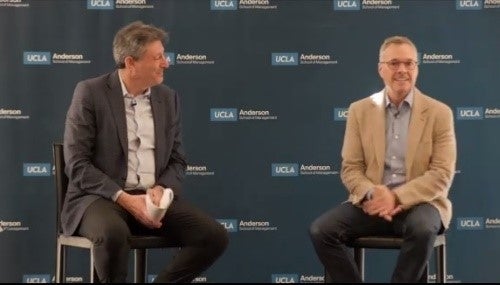
The Post-COVID Customer Series: The Future of Health Care: Innovation, Democratization and the Patient Experience
Friday, November 4, 2022 10:00 a.m. PDT
On November 4, the Centers@Anderson in collaboration with the 2022 Tech & Society Conference: New Visions hosted a fascinating and thought provoking discussion Neil Lindsay, senior vice president of Amazon Health Services where he is responsible for building Amazon’s emerging efforts to make it easier for customers to access the services and products they need to stay healthy. Since joining Amazon in 2010, Lindsay has held roles leading Worldwide Prime and marketing, as well as marketing for Amazon Devices, where he was integral in building Amazon’s consumer brand and global Prime programs, driving customer demand and accelerating engagement, and launching a variety of Amazon devices. The conversation, moderated by Professor Terry Kramer explored the future of health care and the importance of innovation, democratization and the patient experience. With a focus on the customer and the customer’s experience, Lindsay looked at it through three lenses: convenience, cost (value) and selection in both products and services. This is a helpful way to think about the art of the possible in health care and achieving positive health outcomes. He discussed the importance of technology as an enabler to connect customers to providers and providers to customers. Technology and the platform make it easier to connect, allow customers to find the services and products they need, and ultimately make it convenient and easier for them to navigate, choose and engage. He also addressed the importance of human interaction and how privacy and security need to be managed carefully and thoughtfully. This discussion was part of the Easton Center for Technology Management’s 2022 Tech & Society Conference “New Visions” and in partnership with Centers@Anderson, a collaboration among the Centers of UCLA Anderson. Video will be available shorty.
About the Post-COVID Customer Series.
COVID-19 has fundamentally changed definitions of customers, their preferences, their location and modes of purchasing products and services. The idea of "place" has changed — where people work, shop and are entertained. These changes have forced businesses and leaders to rethink their own definitions resulting in new customer segments and markets, new products/services, and new modes of delivery and interaction. This series will explore notable changes across a variety of sectors, new market opportunities, changing customer preferences, and best practices as well as notable failures. A deeper understanding of these will be fundamental to success in a post-COVID-19 world.
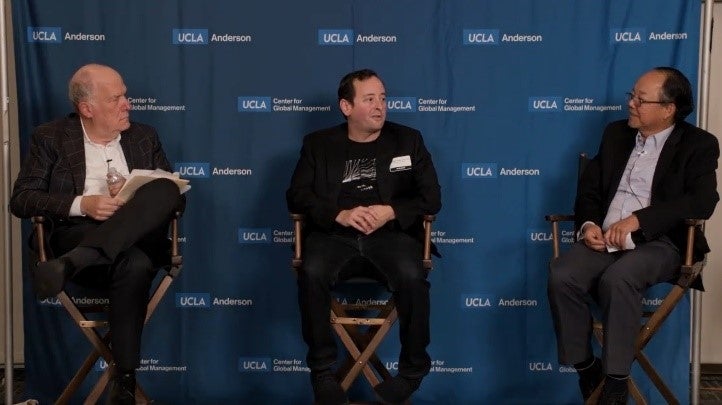
Global Business & Policy Forum: Cryptocurrency: Regulations, Implications and Complications!
Wednesday, November 2, 2022 5:30 p.m. PDT
Over a decade since the development of Bitcoin, financial and legal systems struggle to catch up with the explosion of cryptocurrencies. Coinbase reported that as of July 2022, there were more than 10,000 tradeable cryptocurrencies. One study estimated that 321 million people worldwide owned cryptocurrencies as of mid-2022. Some analysts predict that the global blockchain market will grow by US$39 billion by 2025. The past two years have witnessed a rollercoaster in the cryptocurrency markets. Comedian Larry David starred in a Superbowl ad that touted the virtues of investing in cryptocurrency, even if the investor cannot understand how it works. In January 2022, Bitcoin was trading at $37,928. At the beginning of September 2022, it was trading slightly over $19,000. Yet, despite its potential for volatility and concerns about its impact on the environment and its use in criminal activity, cryptocurrency is seen by many as a possible future of money and exchange.
On November 2, in UCLA Anderson’s executive dining room, and remotely via Zoom, the UCLA Anderson Center for Global Management and UCLA School of Law’s Lowell Milken Institute for Business Law and Policy hosted the inaugural discussion of the new academic year in their joint Global Business and Policy Forum series, now in its 10th year, that focused on cryptocurrency. The discussion centered around how cryptocurrency should be regulated, its implications for the U.S. and global economies, and the challenges we are likely to confront as cryptocurrency becomes more prevalent in daily transactions. Matthew Gertler (B.A. ’11), General Counsel of Reserve, which has created a stable universal digital currency, led the thoughtful discussion and interactive conversation that considered the state of cryptocurrency and how it may affect our future discussion. Gertler has been involved in fintech throughout his career, including time at Venmo, Earnest, and co-founding Digital Asset Research, an advisor to institutional investors in crypto. He was an associate at the international law firm, Milbank LLP, and also has his own law firm. Gertler earned his B.A. in economics and history from UCLA and a MSc in Digital Currency from the University of Nicosia. He also holds JD/MBA degrees from USC’s Gould School of Law and Marshall School of Business.
During the evening, there were many interactive table conversations where specific questions were discussed among the students who analyzed the issues from both a business and legal lens. Students shared their views on whether we will eventually stop using paper money and use digital currency for most of our transactions and whether or not this was concerning or if they were looking forward to the development. They also considered the consequences of eliminating or reducing the use of paper money and whether this type of decentralization, that is a corner stone of cryptocurrency, is sustainable. In the end, won’t trusted intermediaries need to be present to (i) supply trust during times in which trust in the cryptocurrency may be doubted and (ii) troubleshoot problems in transactions? They also considered whether we are exchanging one type of intermediary for another type of intermediary. Some of the current cryptocurrencies, such as Bitcoin, have some serious externalities, namely, the enormous amount of electrical power needed to mine Bitcoin. Students reflected on how these costs should be measured against the benefits of a cryptocurrency and also whether there is there a way to capture the costs of those externalities and put them onto users. The discussions were thought-provoking and raised many issues from both a business and legal lens. The discussion engaged over 100 students and faculty from the UCLA Anderson School of Management and the UCLA School of Law. The Global Business and Policy Forum is a collaborative partnership between the Center for Global Management and UCLA School of Law's Lowell Milken Institute for Business Law and Policy. VIEW VIDEO

Lunch Series on Tech Innovation in Health: Working in Africa and Engaging with Local Communities to Improve Health Outcomes and Promote Equity in Health Care Services
Tuesday, October 11, 2022 11:30 a.m. PDT
The Center for Global Management hosted a lunchtime conversation with Malawi-based Evelyn Udedi a project manager and research nurse with the UCLA Geffen School of Medicine and UC Global Health Institute, and South Africa-based Alastair van Heerden, research director, Centre for Community-Based Research, Human Sciences Research Council who has worked with a number of UCLA Anderson applied management program (AMP) field study teams to help strengthen health and development services in South Africa using business theory and approaches. They addressed technology innovation in health, using business approaches to strengthen government and non-governmental programs, effectively integrating services, and engaging with communities and service providers. They also shared their backgrounds and experiences working in Africa to improve health outcomes and promote equity in health care service, as well as collaboration with, and key learnings from UCLA Anderson’s AMP teams. The luncheon provided a wonderful opportunity for interested MBA and undergraduate students to meet with Udedi and van Heerden in an informal and interactive setting and hear about their important and inspiring programs and work in Africa to achieve these objectives. They were joined by Dr. Tom Coates, director of UC’s Global Health Institute and distinguished research professor of Medicine UCLA David Geffen School of Medicine, and Laurie Bruns, Senior Africa regional director, UCLA David Geffen School of Medicine. Students learned more about UCLA’s and UC’s Southern Africa programs, the importance of community engagement in underserved communities around the globe, and the ecosystems necessary to achieve lasting impact and meaningful change. They also discussed the changing world of public health and how innovation can come from inspiration taken from what people do in other countries and then applied here in the United States to achieve impact in our own local communities. The lunchtime discussion, organized by the Center for Global Management, was in collaboration with the Center for Impact@Anderson, and UCLA Anderson’s Healthcare Business Association and Net Impact.
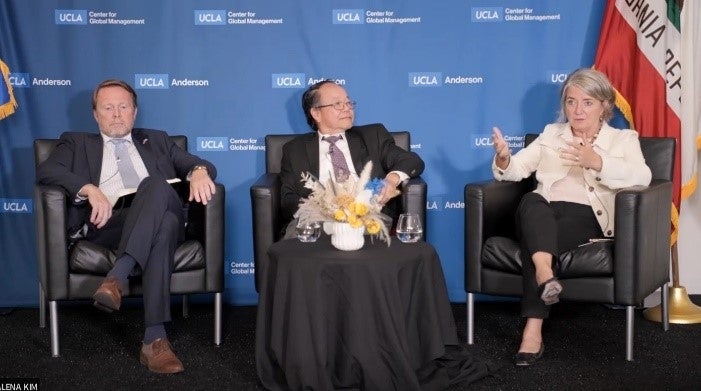
World Today Discussion Series: International Relations and Joining NATO: Sweden’s Foreign Policy and Domestic Accomplishments with Environmental Issues and Gender Equality with Karin Olofsdotter, Sweden’s Ambassador to the U.S.
Thursday, October 6, 2022 4:00 p.m. PDT
Sweden is known for its high quality of life measures and standard of living with relatively equal distribution of wealth. More than half of Sweden’s national energy supply comes from renewables and in 2021, Sweden ranked second in the UN Sustainable Development Report. Sweden has also long been a strong promoter of gender equality, ranking first in the EU on the Gender Equality Index. However, the war in Ukraine is driving economic slowdown in the Nordics as energy shortages accelerate and inflation continues upward – heightening macroeconomic risks for the country.
On October 6, the Center for Global Management (CGM) hosted Her Excellency Karin Olofsdotter, Ambassador of Sweden to the United States, for a presentation and moderated conversation with Professor Chris Tang, faculty director of the CGM. Ambassador Olofsdotter addressed current global issues, Sweden’s role in the EU and its decision to join NATO. She shared her observations on social and leadership issues, and environmental challenges of the future. She discussed how Sweden is making big strides towards safeguarding the future as well as conserving the past and addressed its ambitious goals for sustainability and gender equality. Ambassador Olofsdotter was joined by Okko-Pekka Salmimies, Consul General of Finland in Los Angeles who shared more about his own country’s decision to join NATO. UCLA students, faculty and staff gathered in the executive dining room for the conversation while others joined remotely via Zoom. Ambassador Olofsdotter is an accomplished diplomat. Her career in the Foreign Service started in 1994 with her first posting to the Embassy of Sweden in Moscow. In the years following, she worked in security policy and defense issues as well as in numerous leadership posts within the Ministry for Foreign Affairs, including serving as Chief of Staff for several of its Ministers and Director of the Ministers’ Office. She has also served as part of the Swedish delegation to NATO and at the Swedish EU Representation in Brussels, working with European security policy and defense issues. Prior to assuming the role as Ambassador to the United States, she served as Director-General for Trade at the Swedish Ministry for Foreign Affairs. She has also held the position of Deputy Director-General and Head of the Department for Promotion of Sweden, Trade, and CSR at the Foreign Ministry. UCLA Anderson Dean Tony Bernardo provided opening remarks. The discussion was also co-sponsored by UCLA Anderson’s European Business Association and Women’s Business Connection The conversation was part of the CGM’s World Today Discussion Series that engages the audience in interactive and enriching conversations around current issues that transcend borders. UCLA and Anderson faculty, alumni, board members and thought leaders share their perspectives on the critical global topics and issues that matter to our community and the world. Through balanced discourse, the serves as a neutral forum to educate the community on global issues, while at the same time encouraging debate and examination. VIEW VIDEO
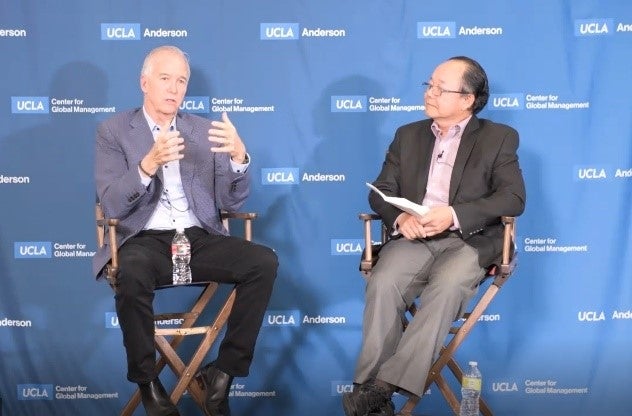
World Today Discussion Series: Is Globalization Passe? A Discussion with Jim Moffatt (’87), Former Global CEO and Vice Chairman, Deloitte Consulting
Wednesday, October 5, 2022 5:00 p.m. PDT
As the global economy was beginning to recover from the COVID-19 pandemic, Russia invaded the Ukraine and has been sanctioned from the West; relations between China and the U.S. have been deteriorating; and supply-chain shocks have roiled markets for food, energy and other commodities. Discussions on reshoring are on the minds of many business and political leaders. Is globalization over or is it merely changing shape?
On October 5, the Center for Global Management (CGM) hosted its inaugural event of the new academic year focused on the question Is Globalization Passé? Global strategy expert Jim Moffatt (’87), former global CEO and vice chairman of Deloitte Consulting joined CGM faculty director, Chris Tang, distinguished professor and Edward W. Carter Chair in Business Administration, and Moffat’s former professor, in a moderated discussion around the question. Moffatt addressed the major challenges firms face during this unsettling period and explored the implications of both sides of the debate. Is globalization as the world has experienced over the last three decades dead, as Blackrock’s Larry Fink suggested in a letter to shareholders earlier this year? Or, is globalization still alive and simply evolving into a new kind of globalization that is more about security than efficiency that could change the world economy for the better, keeping the benefits of openness while improving resilience? The conversation focused on many issues, including the future of trade, supply chains, the energy crisis and global investment, and touched on many regions, including Europe, Asia and Latin America. Moffat shared his thoughts on areas with growth potential and how growth can be achieved. He also addressed the importance of a global management education at UCLA Anderson and reiterated how essential it is for organizations and leaders alike to have a global mindset. The conversation was part of the CGM’s World Today Discussion Series and the Global Management Speaker Series, supported by the Class of 2022. The CGM welcomed many members of the Class of 2022 back to their alma mater for an evening of discussion, networking and reconnecting. Current students from across all four MBA programs attended the evening that began with a networking reception and concluded with a networking dinner. The discussion was also broadcast live and attended by many UCLA Anderson alumni, current students and members of the broader UCLA and general communities. The World Today Discussion Series engages the audience in interactive and enriching conversations around current issues that transcend borders. UCLA and Anderson faculty, alumni, board members and thought leaders share their perspectives on the critical global topics and issues that matter to our community and the world. Through balanced discourse, the serves as a neutral forum to educate the community on global issues, while at the same time encouraging debate and examination. VIEW VIDEO
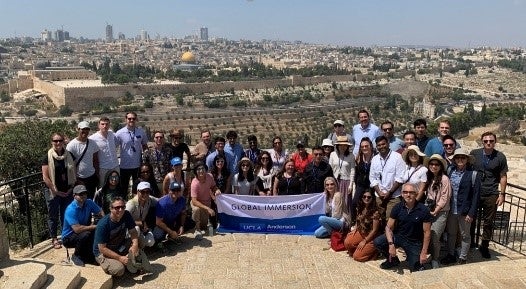
Students and Alumni Visit Tel Aviv and Jerusalem on Global Immersion to Explore Entrepreneurial Business Innovation, Sustainability and Start-Up Activity in Israel
Saturday, September 3 – Friday, September 9, 2022
In early September, during summer break, 36 students and alumni representing three of UCLA Anderson’s MBA programs - full-time, fully employed and executive – visited Tel Aviv and Jerusalem, to explore antecedents to and sustainability of the agglomeration of entrepreneurial business innovation, and related start up activity in Israel. The course was taught and led by Stuart Gabriel, Arden Realty Chair and distinguished professor of finance. This was the sixth global immersion course to focus on Israel and the fifth course to visit the country. A group was scheduled to visit in March 2020, however the in-country component was cancelled due to the COVID-19 pandemic.
Israel has become a global leader in cybersecurity, high-yield agriculture, water-conserving technology, largescale water de-salinization, and related efforts to sustain agricultural and urban development in arid zones. During the week in-country, presentations and site visits focused on venture capital, entrepreneurial activity and technological innovation, related social entrepreneurship, and the Israeli start up and contextual eco-system. Students also observed the sustainability of the Israeli start-up phenomena and ongoing efforts to spread those opportunities to weaker segments of society. Through visits and related analyses, the class explored policies, initiatives, and pre-conditions necessary to encourage innovation, enhance economic growth, and address sustainability concerns.
Tel Aviv University’s (TAU) Coller School of Management welcomed the group for the inaugural academic sessions. Cecile Blilious, head of impact and sustainability at Pitango VC delivered an excellent presentation on impact and sustainability innovation and investing in Israel, including a discussion on the new era of ESG and climate tech investing. This was followed by a fascinating overview of the Israeli high-tech ecosystem and startup landscape, including venture funding and the influence of the Israeli Defense Forces, with Orit Stav, managing partner of Israel Innovation Partners. Later in the week, Michael Eisenberg, co-founder of Aleph, addressed the group. Aleph is an early-stage venture capital fund with $850 million under management that is focused on partnering with Israeli entrepreneurs to build large meaningful companies and impactful global brands, including insuretech company Lemonade. Eisenberg discussed his company’s approach and also provided an assessment of the start-up and tech sectors in Israel. The group later visited Lemonade to hear firsthand about the company’s innovations in the insuretech space and how the company believes that the next insurance leaders will use bots, not brokers, and AI, not actuaries.
Professor Isaac Ben-Israel, head of TAU’s Blavatnik Interdisciplinary Cyber Research Center (ICRC), provided a high-level overview of the cyber revolution in Israel. This was followed by a discussion on how the cybersecurity ecosystem is developing in Israel and commentary on the country’s cyber unicorns. Miryam Steinitz, head of global corporate operations for Check Point, a leading provider of cyber security solutions to governments and corporate enterprises globally, was joined by Smadar Ludomirski. Ludomirski is vice president at Team8, the Israel-based firm founded by a team of intelligence vets and backed by companies such as Intel, Microsoft, Walmart and Cisco to develop and spin out cybersecurity startups. The group also had a unique opportunity to hear from Waze’s Fej Shmuelevitz, one of the first employees of the company. He shared the story of Waze, formerly FreeMap Israel and now a subsidiary company of Google. Students were fascinated to learn more about the company that provides satellite navigation software that they use on their smartphones in their day-to-day lives.
In Tel Aviv, the group visited Watergen, an Israel-based global company that creates a new water source of drinking water from humidity in the air. As populations around the world increasingly struggle to access clean, natural water, Bentzi Krespi explained how the company’s game-changing solution uses humidity in the air to create clean and fresh drinking water. Watergen’s innovative technology taps into the atmosphere – an unlimited, freely available resource – to provide drinking water to people everywhere, from the most remote rural village communities to commercial office buildings and to private homes. They have become a global leader in the development and implementation of water-from-air solutions based on their proprietary cutting-edge, patented GENius technology. Students also visited the Weizmann Institute of Science campus where they were educated on Israel’s foodtech sector and innovations in the foodtech space. Maya Ashkenazi Otmazgin, CEO and co-founder of biotech company Maolac, described how her company is developing bio-functional ingredients from specific bovine milk proteins to strengthen and support human and animal foods and supplements. She was joined by David Schwartz, Pepsico’s managing director and vice president of global tech investing and innovation, and Yaron Sfadyah, director of business development for Future Meat Technologies. Future Meat is a foodtech company that is racing towards bringing delicious and cost-effective cultured meat to the market by 2023. While at the Weizmann Institute, the group also had the opportunity to tour the Levinson visitors center to learn about the Institute’s central role in Israeli science and technology. Later, students separated into two groups to continue to study innovations in the foodtech space through visits to Remilk and Equinom. Remilk, is a multi-national Israeli company in the alternative protein space that specializes in the production of cultured milk and dairy products. The group listened and had a firsthand taste to experience how the organization is producing dairy that is healthy, delicious, affordable and 100% cruelty-free. They also received a tour of Remilk’s lab to better understand the process. At the same time, another group visited Equinom to experience how the company is creating a sustainable plant-based future. Equinom is a fully integrated food-tech company, combining agricultural know-how, culinary expertise and deep technology. At Equinom, the group was welcomed by marketing director, UCLA Anderson alumnus Josh Eidelman (’17). They learned about its food production and how Equinom is helping to ensure the supply of alternative proteins for the future.
At Syqe Medical, students witnessed the medtech company’s impressive scientific advancements and how Syqe is playing a fascinating and innovative role in the Israeli success story. They heard about the SyquAir inhaler and its sophisticated inhalation platform for pain reduction treatment using medical cannabis with programmable and personalized drug delivery, depending on the patient’s medical condition. Jacob Vogel, director of global sales and business development was joined by Perry Davidson, founder and CEO. On the last day in Tel Aviv, the group visited Save a Child’s Heart, an Israeli humanitarian organization that provides care to children worldwide with rheumatic and congenital heart disease, regardless of the child's nationality, religion, color, gender or financial situation. SACH also trains medical professionals in life-changing skills to take back to their home country. After hearing about the amazing work of SACH, students visited Wolfson Medical Center and its Children’s Hospital. Later in the week en Jerusalem, students also had the opportunity to hear from representatives at BrainQ, a company that is developing breakthrough precision neurology therapies using brain computer interface technology. BrainQ uses explanatory machine learning on proprietary data to extract biological insights from brainwaves and direct its therapy, and has developed a cloud based bioelectric therapeutic platform for repairing the brain. In Jerusalem, students also visited the Hebrew University and its Center of Entrepreneurship and innovation. Here they heard from British-Israeli journalist and author David Horowitz, founding editor of The Times of Israel, a current affairs online newspaper based in Jerusalem. With his deep expertise and prowess in this area, Horowitz provided a fascinating commentary on the country’s economic and political environment to build context regarding history, society, politics, geo-political environment and risks. The concluding session of the week as delivered by Yadin Kaufmann, an Israeli-American technology investor, social entrepreneur and writer. Kaufmann co-founded two venture capital firms: Veritas Venture Partners, an Israel-based fund investing in early-stage tech startups, and Sadara Ventures, the first venture capital fund to target Palestinian tech companies. He talked about the Palestinian start-up scene, developing a Palestinian start-up ecosystem, and spreading VC innovation, economic opportunity, and capacity to Palestinian neighbors. Kaufmann’s entity makes a profound contribution to efforts to spread that innovation, economic opportunity, and capacity to Palestinian neighbors and set a new context for related interactions.
The week also included a number of important contextual visits. Students visited Yad Vashem, the Holocaust Memorial Museum, Israel’s official memorial to the six million Jewish victims of the Holocaust, which was an extremely important visit to better understand the context and history of Israel. Yuval, the local tour guide provided excellent commentary throughout the week and was an encyclopedia of knowledge who shared many facts and figures to help everyone better understand Israel, its history as well as the country’s economic and political complexities and realities. Students also got to experience some of the culture and historical sites of Israel. They received a guided walking tour of the ancient port city of Jaffa, the southern and oldest part of Tel Aviv and enjoyed a beautiful panoramic view of Tel Aviv. They also explored the street art of Tel Aviv’s multicultural and bohemian neighborhood, Floretin. In Tel Aviv, students also had the opportunity to meet and network with UCLA Anderson alumni and eat amazing Israeli food. En route to Jerusalem, the group enjoyed winetasting at the Tzuba Estate Winery in the Judean Hills, where all the wines are kosher. In Jerusalem, they visited the Mount of Olives, one of the city’s most famous landmarks that is holy to Judaism, Christianity and Islam. Adjacent to Jerusalem’s Old City, the Mount of Olives provides a stunning viewport over Jerusalem. Yuval led a walking tour of major historical and holy sites in the Old City, including the Room of the Last Supper, Zion Gate, Western Wall and Church of the Holy Sepulchre. Students walked along the Via Dolorosa, a street within the Old City of Jerusalem, believed to be the path that Jesus walked on the way to his crucifixion, and a celebrated place of Christian pilgrimage. After the program ended, some participated in the optional day trip to Masada, the ancient fortification in the southern area of Israel, located on the eastern edge of the Judaean Desert, overlooking the Dead Sea and took a dip in the Dead Sea. A number of students stayed on to enjoy additional time in Jerusalem and Tel Aviv, and some headed to Jordan before departing back to the United States. It was a fascinating and extremely memorable, meaningful and impactful week.
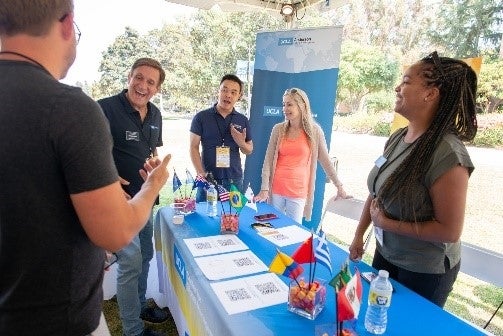
The CGM Engages with FEMBA and EMBA Admits at ‘Palooza 9
In the spirit of One Anderson, the event brought together students and alumni from many of UCLA Anderson’s programs — full-time MBA, FEMBA, EMBA, UCLA-NUS EMBA, Ph.D. and MFE and also included students from across campus from the UCLA Schools of Nursing, Medicine and Public Health . Palooza 9 was attended by members of the Classes of 1961, 1971 and 1986, as well as 171 incoming FEMBA, EMBA and full-time MBA students from the recently admitted Classes of 2024 and 2025. Faculty, family and friends joined. Dean Tony Bernardo and Gonzalo Freixes, associate dean of the FEMBA and EMBA programs provided some welcome remarks. Together with many different UCLA Anderson student clubs and alumni groups, the Center for Global Management managed a booth to highlight the global courses and programming available to students both on campus, virtually and abroad, such as the global immersion and international exchange courses. The grand prize of the afternoon was a ’Palooza global immersion fellowship, which covers the program fee for the in-country component of a global immersion course. It was won by current second year student from the FEMBA Class of 2024. Over the years, through the global immersion and international exchange courses, as well as through GAP and SMR field studies, FEMBA and EMBA students have traveled to more than 45 countries.
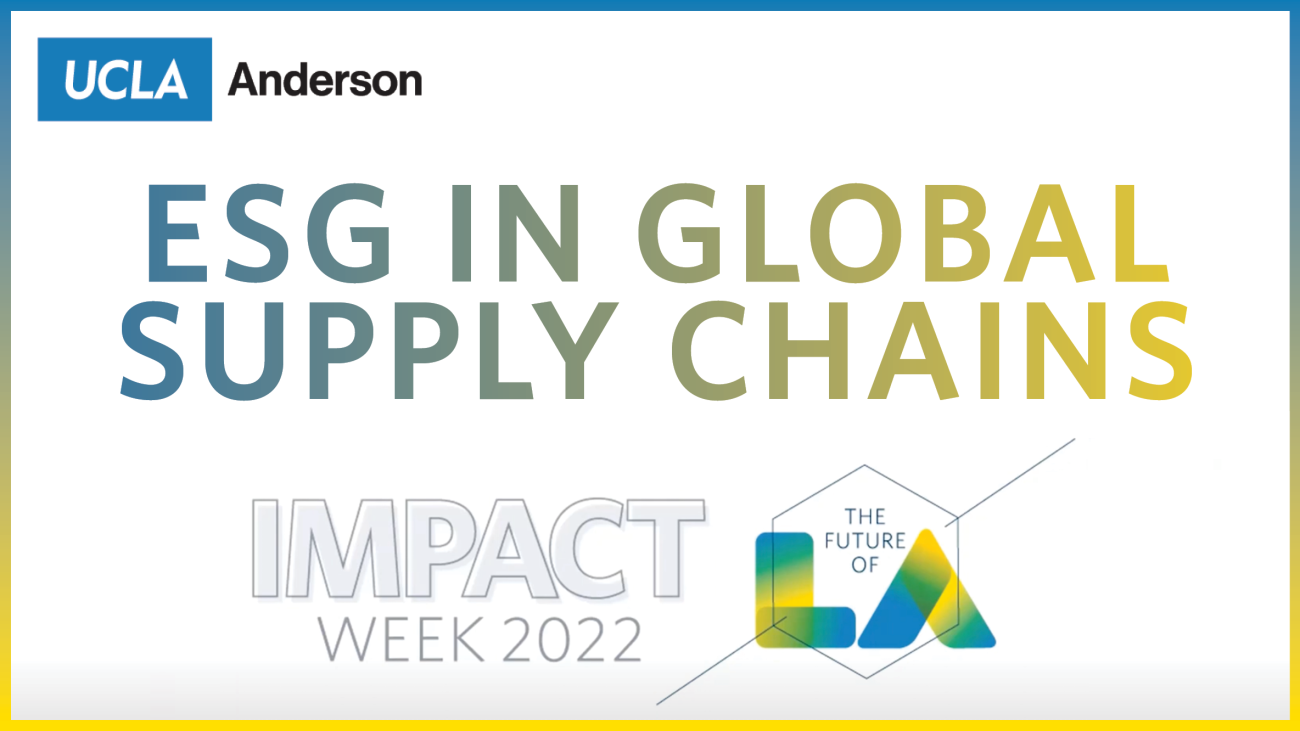
Impact Week 2022: ESG and Supply Chains – Uncovering the Blind Spots with Global Supply Chain Expert, Distinguished Professor Chris Tang
April 2022
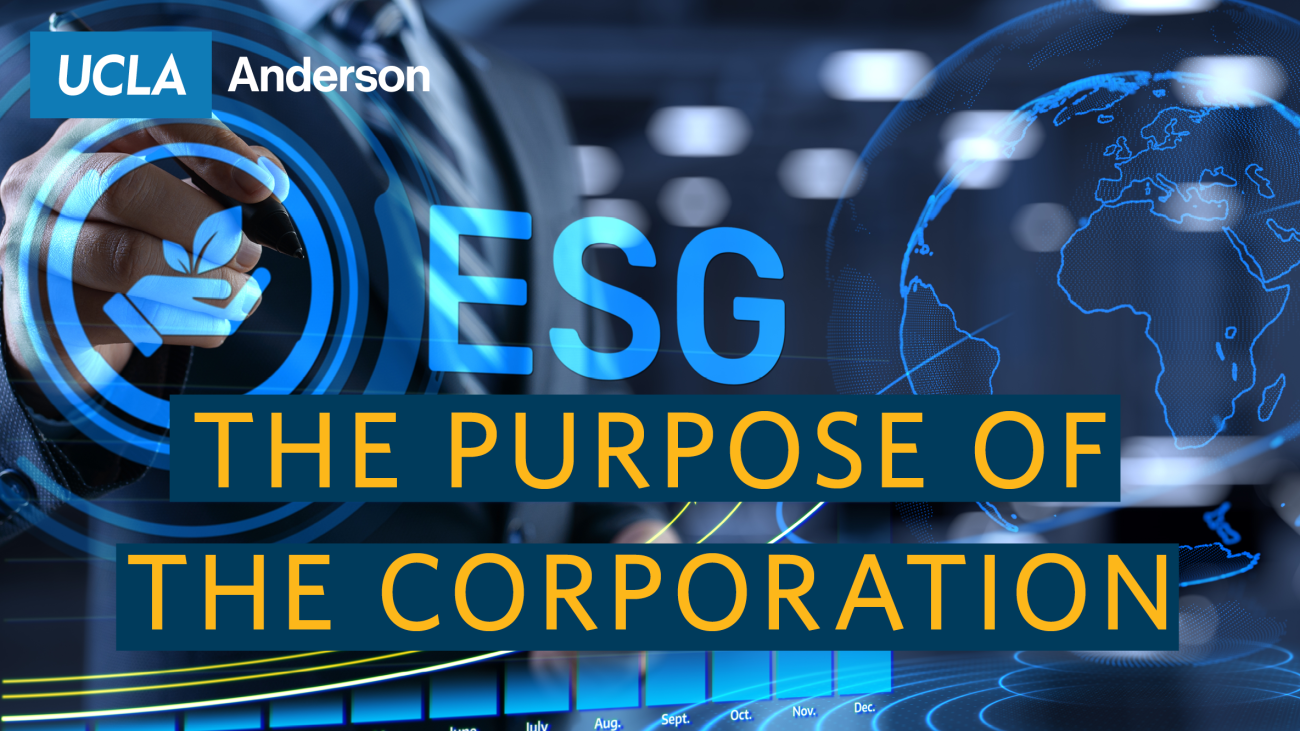
Global Business & Policy Forum: The Purpose of the Corporation: Should Shareholder Value be Sacrificed to Promote ESG Goals?
For nearly two decades, academics, public intellectuals, investment managers and sometimes even ordinary investors in highly developed economies have been engaged in public conversations around the purpose of the corporation. Specifically, whether corporate directors should focus their energies and corporate resources on environmental, social and governance (ESG) goals even when doing so may adversely impact corporate financial performance and shareholder value. The stakes at issue are quite high. Corporations, big and small, play a critical role in generating value in the economies of most developed nations. Historically, an investor has invested in a venture based upon the investor’s prediction of the venture’s ability to earn profits for the investor who, in turn, could use those profits at the investor’s discretion to fund whatever projects the investor believed was important (e.g., building a personal villa or supporting an environmental cause). The corporation was agnostic as to how its shareholder used the profits distributed by the corporation, even if the shareholder used distributions to fund movements or support legal changes detrimental to the corporation. With the ESG movement in the U.S. and elsewhere, corporations are principal actors in attempting to achieve certain broader societal goals, including environmental sustainability and social responsibility. In turn, requiring them to divert earnings away from shareholders to satisfy those goals, even if some shareholders do not share the belief that such goals are in the shareholders interest.
On April 12, in UCLA Anderson’s executive dining room, and remotely via Zoom, the UCLA Anderson Center for Global Management and UCLA School of Law’s Lowell Milken Institute for Business Law and Policy hosted the second discussion of the year in their joint Global Business and Policy Forum series (the ninth year of the partnership). Christopher S. Tang, distinguished professor, Edward W. Chair in Business Administration and faculty director for the Center for Global Management joined Stephen Bainbridge, William D. Warren Distinguished Professor of Law for an informative presentation and thought-provoking discussion on the broad landscape of ESG and whether ESG is the road to a brighter future or a wrong turn in the history of the corporation and corporate governance. The discussion that addressed different perspectives and raised a myriad of complex issues that companies and stakeholders are struggling with, engaged around 90 students and faculty from the UCLA Anderson School of Management and the UCLA School of Law in public conversation and dialogue. The Global Business and Policy Forum is a collaborative partnership between the Center for Global Management and UCLA School of Law's Lowell Milken Institute for Business Law and Policy. VIEW VIDEO
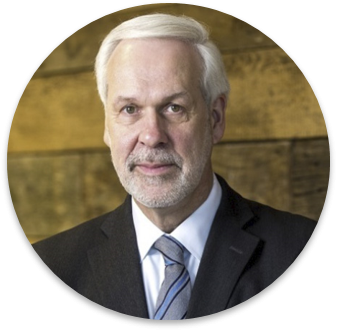
The Future of Higher Education: An Exploration of the “Customer,” The Role of Technology and Impact on Society
On Wednesday, April 6, the Centers@Anderson and Professor Terry Kramer, hosted a conversation with Paul LeBlanc, President of Southern New Hampshire University (SNHU) to discuss the changing role and delivery mode of education. LeBlanc shared his thoughts on how technology can help move the education sector closer to equity with increased access to a broader group of "customers." He also addressed the capabilities of technology in relation to education, and what he believes are the responsibilities of leaders in education, business and government. The audience had the opportunity to learn from LeBlanc’s extensive experience working with innovative models in higher education, his learnings for other sectors and his fascinating views about social systems and institutions. UCLA Anderson Dean Antonio Bernardo and UCLA School of Education & Information Studies Dean Christina Christie provided opening remarks. The conversation, moderated by Terry Kramer, faculty director of the Easton Technology Management Center, was delivered in a hybrid format. Students, including those enrolled in Professor’s Kramer spring quarter Technology and Society course, joined the discussion live in the Crown Auditorium while others tuned in remotely via Zoom. A networking reception was held for UCLA Anderson students following the event.
Paul J. LeBlanc is President of Southern New Hampshire University (SNHU) and author of Students First: Equity, Access, and Opportunity in Higher Education. Under the 18 years of LeBlanc’s direction, SNHU has grown from 10,000 students to over 165,000 learners and is the largest non-profit provider of online higher education in the country. LeBlanc serves on the National Academies of Sciences, Engineering and Medicine’s Board on Higher Education and Workforce. In 2018, he was awarded the prestigious TIAA Institute Hesburgh Award for Leadership Excellence in Higher Education. LeBlanc immigrated to the United States as a child, was the first person in his extended family to attend college and is a graduate of Framingham State University (BA), Boston College (MA), and the University of Massachusetts (PhD). From 1993 to 1996, he directed a technology start up for Houghton Mifflin Publishing Company, was President of Marlboro College (VT) from 1996 to 2003 and became President of SNHU in 2003.
This was the fifth discussion of the academic year in the Centers@Anderson Innovation: Strategies for Success Series. The discussion was a collaboration among the Centers at Anderson, in partnership with the UCLA School of Education & Information Studies and was open to UCLA students, alumni, faculty, staff and members of the extended UCLA community and general public. VIEW VIDEO
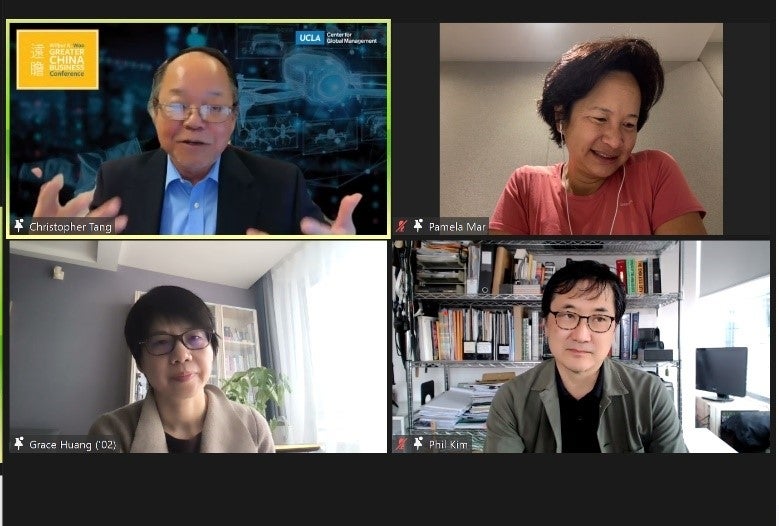
The 2022 Wilbur K. Woo Greater China Business Conference: New Normals and New Models: Technology Learnings from The Greater China Region
Innovators and influencers explored the metaverse and its role in the future of work, shopping and social engagements; the role of blockchain as an enabling platform for innovations in financial services; the role of electric vehicles and autonomous vehicles in the future of transportation; and the role of public policy in shaping the type of innovations that will evolve in the future.
A notable technology-driven transformation is occurring in the Greater China region fueling a digitization of numerous industries and companies and enabling new business models. The scale and momentum of this technology-driven transformation has been enabled by Government policy, changes in consumer preferences and enterprise driven innovation. In a short period of time, China has transitioned to become one of the world’s largest digital economies. Digital innovations that emerge in the region will not only shape its own ecosystem, but also serve as a reference for digital ecosystems that are evolving elsewhere. The paths taken by companies in the region as well as the government have implications and create broad-based learnings for new and traditional players in the region and in the United States.
The 2022 Wilbur K. Woo Greater China Business Conference, organized by the Center for Global Management was delivered over three days in a fully virtual format and brought together leading executives, innovators, influencers and investors for a series of conversations around the major forces, trends and technology-based innovations in the region. The conference attracted many UCLA students, alumni, faculty, and interested members of the global community to hear experts share their thoughts and perspectives on the key enablers required to advance technology commercially in sectors such as retail, finance and transportation; provide a forward-looking perspective on new advancements; and address how technology is driving the transformation of society, enterprises, and consumers around the world and the contextual leadership that is imperative to adapt to shifting dynamics and an increasingly digitized global economy.
Day 1, included an opening keynote address and fascinating discussion with Jennifer Zhu Scott, executive chairman of The Commons Project, a non-profit public trust to build digital goods as a public service. She addressed the landscape of innovation occurring in the Greater China region and the data economy and metaverse as drivers of future growth in Internet services. Zhu Scott shared her views on the latest areas of innovation, assessing the role of responsible leadership and the role of government. She had a distinct ability to look at the world and drive a compelling vision for innovation and leadership imperatives, and possessed an ability to assess the role of business in society and the ability to look across geographies to identify best practices. Zhu Scott is also the founder of Radian Partners, a private direct investment firm focusing on Artificial Intelligence. She has contributed significantly to the global technology community and led multiple initiatives to build awareness and solutions for ethics in technology and data ownership. She has had a distinguished career with many accolades and accomplishments, including being recognized as a Forbes World's Top 50 Women in Tech in 2018. VIEW VIDEO.
Zhu Scott’s keynote address was followed by a panel discussion on the future of e-commerce and retail and the role of social commerce, that looked at the great retail integration and virtualization of services and social commerce. In this session, Chris Tang, distinguished professor at UCLA, Edward W. Carter Chair in Business Administration and faculty director of the CGM moderated a discussion with UCLA Anderson alumna Grace Huang (’02), founder and CEO of DeepZero and co-founder and CEO of iPinYou; Phil Kim, managing director Asia Pacific, The Jerde Partnership; and Pamela Mar, executive vice president knowledge and applications, Fung Academy, The Fung Group. They discussed the major trends propelling Chinese eCommerce in the future and explained how the explosion of social commerce is driving shopping interest and purchases. They also shared observations on how the desire for convenience and efficiency will rapidly narrow the gap between on-demand and traditional ecommerce and explained how the seamless integration between the retail and social landscape will be improved supply chain agility. VIEW VIDEO.
On day 2, conversations explored the role of electric vehicles and autonomous vehicles in the future of transportation and the role of blockchain as an enabling platform for innovations in financial services. China has become a global leader in smart cities and over the last decade, with targeted technological innovation, has developed smart city infrastructure and massively invested in the digital transformation of its cities. In the first session, Feng An, founder and executive director, Innovation Center for Energy and Transportation joined Stella Li, executive vice president, BYD Company Ltd. and president of BYD Americas and Bill Russo, founder and CEO, Automobility Ltd. and chairman of the automotive committee for AmCham Shanghai. They explained how the mobility sector will become ground zero for a convergence of industries that include automotive, transportation, software, hardware, and data services creating both opportunity and uncertainty for AV players from components vendors to mobility service providers. The discussion was moderated by Terry McCarthy, CEO, American Society of Cinematographers. VIEW VIDEO. In the second session, panelists addressed the future of financial services in the region and the ongoing transformation of FinTech. Michael Sung, chairman, CarbonBlue Innovations and Professor, Founder and Co-Director, Fudan Fanhai Fintech Research Center was joined by Jason Tu, CEO, MioTech and Robin Wong, CEO, Mocasa. In a conversation moderated by Kar Yan Tam, Dean, School of Business and Management, Hong Kong University of Science and Technology (HKUST), panelists provided insights on the areas of innovation they find most promising, the unique attributes of consumers in the region and how this influences commercial opportunities, the appropriate role of government as an enabler and the contextual differences between the Greater China Region and the U.S. They also examined the convergence that could reshape the role of financial services players, new partnerships that could emerge and new opportunities for growth to serve consumers in the region. VIEW VIDEO.
The final day of the 2022 conference explored and the role of public policy in shaping the type of innovations that will evolve in the future. Ambassador David Gross, partner at Wiley Rein and former U.S. Ambassador for International Communications and Information Policy delivered the closing keynote address and provided a 360-degree view on the state of technology today, the rapidly changing public policy environment globally and its impact on the technology sector and tech-driven innovations. In an engaging conversation, moderated by Terry Kramer, faculty director of the Easton Technology Management Center, Ambassador Gross addressed various technology policy issues to help the audience understand the complexity and nuances of local context. Key topics included learnings and emerging areas of public policy focus including anti-trust, data privacy and the role of government. Ambassador David Gross, a senior member of Wiley’s TMT group, is widely recognized as one of the world’s foremost experts on international telecommunications and Internet policies, having addressed the United Nations General Assembly, and led more U.S. delegations to major international telecommunication conferences than anyone else in modern history. VIEW VIDEO.
From the world’s manufacturing center to the emerging technology leader, the Greater China region has undergone a tremendous technology -driven transformation, including massive digital transformation. This transformation has not only reshaped the global landscape of technology development but will be a significant future driver of technology-based innovation and value creation going forward across many domains, including retail and e-commerce, mobility, fintech and cleantech. The closing session of the 2022 conference provided a macro review of the Greater China region, its unique context, non-market risks and rapidly changing public policy environment and implications for technology companies. The session was moderated by Christine Loh, visiting professor, UCLA Anderson and former deputy minister for the environment, Hong Kong SAR Government. Loh was joined by Andy Rothman, investment strategist, Matthews Asia and Albert Wong, CEO, Hong Kong Science and Technology Park who shared their insights and observations on the region’s unique context. They discussed the region’s innovation journey, the major forces and key enablers that have helped contribute to its rapid growth in technology-driven innovations and shared their thoughts on where investment is happening and the areas they find most promising in terms of specific innovation as well as important areas of future growth. VIEW VIDEO.
Technology is a key focus at UCLA Anderson—almost every industry is impacted by technology and our leaders must understand the role of technology, tap its opportunities, mitigate negative externalities and be prepared to lead in a world that is increasingly technology-based. In “normal’ times,” the Center for Global Management would have recently returned with a large group of MBA students from Shenzhen and Hong Kong for one of its Global Immersion courses, taught by Terry Kramer. While in-country for this course, students are able to learn and witness firsthand the remarkable innovations and tech transformations happening in the region and hear from many of the remarkable speakers. For 2022, the course was redesigned and delivered in a hybrid format and the 2022 conference sessions were mandatory elements of the course. While the Center for Global Management looks forward to resuming an on-the-ground experience in the Greater China region for Anderson MBA students soon, the Center was pleased this year to be able to highlight these same issues for a broader global audience.
Born in China in 1916, the late Wilbur K. Woo (B.A. ’42) received his bachelor’s degree in business administration from UCLA. He went on to become a major figure in LA's business, political, cultural and charitable arenas and was known for his decades of leadership in the Chinese-American community. Global reach starts with global thinking, and two decades ago -- recognizing the rapid expansion and modernization of China’s economy -- Wilbur Woo, the vice chairman of Cathay Bank, and his wife Beth endowed the Wilbur K. Woo Greater China Business Conference at UCLA to show their gratitude for the training Wilbur had received at his alma mater. The Woos' goal was to facilitate dialogue, promote understanding, and strengthen the important ties between the Greater China region and the United States—to identify areas of collective opportunity, foster cooperation, and bring a group of leaders—both aspiring and current -- together to collaborate and learn together. This conference has continued to have a powerful impact on our community—here at UCLA and beyond.
The Wilbur K. Woo Greater China Business Conference, organized by the Center for Global Management has for many years been UCLA’s largest conference focused on the Greater China region. UCLA Anderson’s Greater China Business Association (GCBA) and UCLA’s Chinese Students and Scholars Association (CSSA) were collaborating partners. The 2022 conference was also a collaboration with UCLA Anderson’s Easton Technology Management Center. It was sponsored by Newport Asia LLC and Cathay Bank at the gold and silver levels, respectively. The China General Chamber of Commerce – Los Angeles, Los Angeles World Affairs Council and Town Hall and the UCLA Asia Pacific Center were supporting organizations.
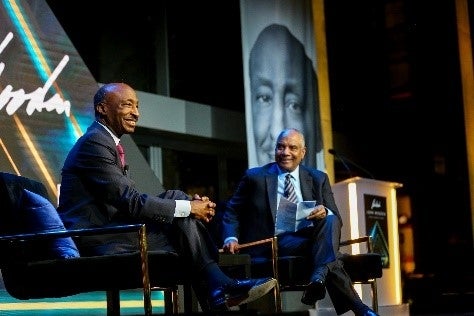
2022 John Wooden Global Leadership Award Gala Dinner Benefitting the 2021 John Wooden Fellows and Honoring Ken Frazier, Executive Chairman of the Board and Former CEO, Merck
On Thursday, March 31, 2022, UCLA Anderson recognized Ken Frazier, executive chairman of the board and former CEO of Merck with the John Wooden Global Leadership Award, at a gala dinner held at The Skirball Cultural Center in Los Angeles. First presented in 2008, the award is named for legendary UCLA basketball coach, author and leadership expert John Wooden (1910–2010). It is given each year to an exceptional business leader whose leadership style and service to the community reflect the high standards of performance, integrity and ethical values for which Wooden was known. The recognition was last bestowed in 2019 to Mellody Hobson, co-CEO and president of Ariel Investments. Because of the pandemic, the award was not presented in 2020.
John Wooden's legacy of leadership transcends athletics and spans generations. As a legendary coach, prolific author and inspiring speaker, he dedicated his life to motivating individuals to achieve their highest potential. Wooden instilled in others a sense of pride, a commitment to ethics and a respect for teamwork. These fundamental principles translate seamlessly from the sports arena to the realms of business, management and leadership.
The 2021 John Wooden Global Leadership Award honors a corporate leader who personifies the ideals of achievement, principle and character associated with Coach John Wooden. Coach Wooden created the timeless, inimitable blueprint for achieving success in sports, business and life: The Pyramid of Success. It connects ethics, team spirit, skill, hard work, loyalty, competitive greatness and many more attributes in a unique way, and has served as a map for many contemporary leaders. Coach Wooden stands in the record books for winning seven NCAA titles in a row and 10 in 12 seasons. For his leadership, he received the Presidential Medal of Freedom in 2004. UCLA Anderson embraces the principles of character-based leadership taught by Coach Wooden, and gives the award each year to a global influencer who will ensure that his tenets live on and inspire millions of people.
Frazier was chosen as this year's Wooden Award recipient in recognition of his business leadership, his philanthropy, his focus on innovation and his commitment to promoting racial and economic equity. "Ken Frazier has epitomized ethical and visionary leadership throughout his career," UCLA Anderson Dean Antonio Bernardo said. "He has encouraged innovation and is a passionate champion for social justice, racial equality and financial inclusion. His emphasis on values-based leadership personifies the qualities of the John Wooden Global Leadership Award."
At the banquet, Ken Chenault, a past honoree who is chairman and managing director of the venture capital firm General Catalyst, and former CEO and chairman of American Express, engaged Frazier in an on-stage conversation about leadership, values and the Wooden legacy. As the conversation began, Frazier noted how special it was to be in the same company as past John Wooden Global Leadership Award winners, including Chenault, who received the award in 2009. Chenault asked Frazier about his widely-quoted idea that a corporation should have a soul. "How can a company have a soul?" Frazier asked in response. "There are two elements. The first element is purpose. Every company has a purpose: to serve society in its own unique way. These companies should be more than just vehicles for wealth creation." His own company, he said, "exists to alleviate human suffering around the world. And the people who come to work every day really believe in that. The second element is conscience — do the company's strategies and behaviors align with its stated values?" In accepting the award, Frazier added, "I think the most important thing for a leader is that they really believe in the core values of the company. Ultimately, you have to decide what's right for the company, not just for the short term but for the long term." "It all comes back to Coach Wooden," Frazier said. "He taught people to care about others. It wasn't about winning, it was about teaching people how to maximize the value of their lives."
Kenneth C. Frazier serves as executive chairman of Merck’s board of directors, a role he began in July 2021 following his retirement from a decade-long tenure as Merck’s president and chief executive officer. Under his leadership, Merck delivered innovative, life-saving medicines and vaccines, as well as long-term sustainable value to the company's multiple stakeholders. Frazier substantially increased Merck's investment in research, including early research, while refocusing the organization on the launch and growth of key products that provide far-reaching benefits to society. He also led the formation of philanthropic and humanitarian initiatives that built on Merck's 130-year legacy. Frazier's contributions, particularly in the legal, business and humanitarian fields, have been widely recognized. He sits on numerous boards and is co-founder and co-chair of OneTen, a coalition of leading organizations committed to upskilling, hiring and promoting one million Black Americans into family-sustaining jobs. OneTen is committed to facilitating a meaningful, measurable, and lasting impact on racial and economic justice. As a strong advocate for social justice and economic inclusion, Frazier is the recipient of numerous awards and honors, including being named one of the "World's Greatest Leaders" by Fortune magazine, as well as one of Time's 100 Most Influential People.
The audience of around 450 included UCLA Anderson Board of Advisors members and other generous supporters, along with members of Coach Wooden’s family, members of the Anderson family together with Basketball Hall of Famers: Keith Erickson and Jamaal Wilkes (B.A. '74), who played for Coach Wooden, and Ann Meyers Drysdale (B.A. '79), who played for the Bruins women's team and whose brother David played for Coach Wooden. They joined past Wooden Fellows, current UCLA Anderson students, alumni, faculty and senior leadership from across the UCLA campus for a ceremony that included a welcome by 2009-2021 Wooden fellows.
Net proceeds from the annual event support fellowships for UCLA Anderson students who embody Coach Wooden’s leadership ideals and commitment to improving the lives of others. During the ceremony, the four 2021 fellowship recipients Uzair Alaidroos (FEMBA ’23), Bianca Judy Choe (FEMBA ’22), Jason D. Crockett (EMBA ’22) and Miranda Fang (FTMBA ’22) were recognized and awarded the John Wooden Global Leadership Fellowship, which is among the most prestigious honors Anderson students can receive. Each of the four 2021 John Wooden Global Leadership Fellows will receive a $35,000 fellowship. Read more about the 2021 Fellows. They took the stage to express their thoughts on what Coach Wooden’s values-based leadership means to them. Wooden Fellows are honored because they possess his focus on ethics, team spirit, skill, hard work and loyalty, along with a commitment to constant learning, continual improvement and innovation. While UCLA Anderson was unable to hold an award event in 2020 because of the pandemic, UCLA Anderson recognized the outstanding 2020 John Wooden Global Leadership Fellows, whose strong, values-driven leadership continues to honor Coach’s legacy. Jesse Brandon Baker (EMBA ’21), Ariana Cernius (J.D. ’17, FTMBA ’21), Kelsey Kawana (FEMBA ’22), Mitchella Gilbert (FTMBA ’21) and Stephen Johnson (B.S. ’05, FEMBA ’21) also took to the stage.
UCLA Anderson, in partnership with Coach John Wooden’s family, honors one exceptional leader each year with this prestigious award for his or her exemplary leadership and service to the community. Past recipients of the John Wooden Global Leadership Award include: Mellody Hobson, co-CEO and president, Ariel Investments (2019); Reed Hastings, co-founder and CEO, Netflix (2018); Kevin Plank, CEO and chairman, Under Armour (2017); W. James McNerney Jr., retired chairman, CEO and president, the Boeing Company (2016); Ursula Burns, chairman and CEO of Xerox (2015); Paul E. Jacobs, executive chairman of Qualcomm Inc. (2014); Bob Iger, chairman and CEO of The Walt Disney Company (2013); Indra Nooyi, chairman and CEO of PepsiCo (2012); Peter Ueberroth, chairman of Contrarian Group (2011); Frederick W. Smith, president and CEO of FedEx (2010); Kenneth Chenault, president and CEO of American Express Co. (2009); and Howard Schultz, chairman, president and CEO of Starbucks (2008). VIEW HIGHLIGHTS
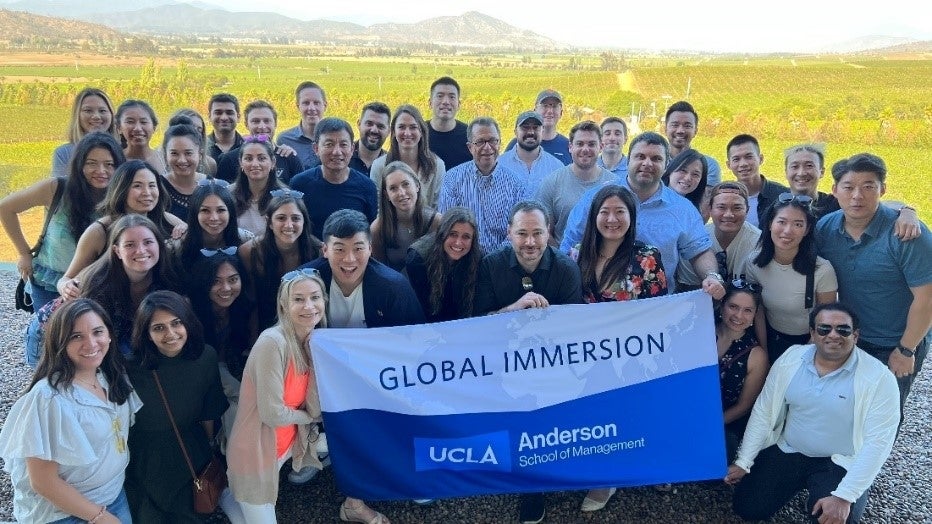
During a Unique Time in Chile’s History, Students Visit Santiago to Learn About Doing Business in a Rapidly Changing Emerging Country: Chile and Its New Constitution
During spring break, another group of students from Anderson’s full-time, fully employed and executive MBA programs had the opportunity to travel together to Santiago, to study Chile and Its New Constitution and what it means for business in the southernmost country in the world. The course, titled “Doing Business in a Rapidly Changing Emerging Country: Chile and Its New Constitution,” was taught by Sebastian Edwards, distinguished professor, Henry Ford II Chair in International Management and a native of Chile. This was the seventh global immersion course to focus on and visit Chile and the fifth time that Professor Edwards had led such a course to Chile.
In October 2019, and to the surprise of most analysts, major demonstrations erupted in Chile. They were massive and at times violent. This process, which this course studied in detail, resulted in the election of a Constitutional Convention, which will write a new constitution for the country. This new “law of the land” will determine the way in which Chile organizes its society, its politics, and its business in the next 40 to 50 years. What is remarkable about this process is that it is the first time a Constitution is being written by a body with gender parity: an equal number of men and women, by design. In addition, the Constitutional Convention has reserved seats for indigenous people, for the First Nations. During the course which spanned two quarters, students learned how economic policy in Chile – the most successful country in Latin America in the last three decades – affects business opportunities. An important feature of the course is that it put Chile’s case in context with that of the rest of the Latin American nations (special mention was given to Argentina, Brazil, Mexico and Venezuela). The course also analyzed the way in which politics affects both economics and policy options. Before the in-country week, on-campus class sessions addressed some of the most important economic, business, social and political aspects of the country, cultural issues as well as social and business challenges. While the pandemic inhibited many physical visits to companies, throughout the immersive week in Chile, students heard from many prominent business leaders, academics, politicians and senior policy makers as well as successful entrepreneurs. A number of Davos-style conversations helped illuminate Chile’s economic and business environments and covered many of the country’s key sectors providing students with a feel for what it is for business leaders to live in an environment where future rules of the game are being determined.
The inaugural session in Santiago took place at Centro de Estudios Publicos (CEP), a private non-profit academic foundation dedicated to the study and production of knowledge on issues of public interest, and one of the most influential thinktanks in the country. Carmen Le Foulon and Lucas Sierra, researchers with CEP provided terrific context and foundation for the week as they addressed the current political, social and economic conditions in Chile and the Constitutional Convention. They also touched on educational challenges due to the pandemic, violence and security, and the migration crisis. Later in the week, students had a unique opportunity to hear two very different perspectives on the future of the Chilean economy from two well-known and influential economists, Juan Andres Fontaine, former minister for the economy, development and reconstruction under the government of President Sebastian Pinera and Ramon Lopez, professor of economics at the University of Chile. They addressed geopolitics, described the Chilean economic model and highlighted some of the key issues including taxes, inequality, the labor market and pension system. Towards the end of the week, philosopher, political scientist, author and economist, Leonida Montes, director of CEP provided a terrific wrap up on the evolution of Chilean society and shared his views on the future of Chile and where he sees the country going.
Mining is extremely important to the Chilean economy. Chile is the world’s main copper producer and the world’s second producer of lithium compounds. Danilea Desormeaux, research director of the mining consulting firm, Vantaz provided a fascinating overview of the mining sector in the country and its current status and trends. As she compared and contrasted the sector with that in Peru, Australia, China, South Africa and the United States, she also addressed global warming and how mines can be decarbonized. This was complemented, later in the week by a discussion with Loreta Silva, former deputy minister of public works in the government of President Sebastian Pinera who presented an overview and forecast of Chile’s investment climate. During her discussion, she addressed the importance of mining to the country’s economy and touched on some of the challenges for the sector, including geopolitics, environmental and social issues and the importance of working with local communities. Students also learned about the Cerro Dominador solar power plant project in the Antofagasta Region of Chile, located in the Atacama Desert which, when finished will be the largest concentrated solar power plant with storage in Latin America. Juan Jose Chavez de la Fuente, business development and energy management director described the project and some of its regulatory and financial challenges. The project is part of Chile's national renewable energy program, intended to provide Chile with cleaner energy, while also reducing its dependency on fossil fuels like coal and natural gas. The construction, operation and maintenance of the plant will act as a catalyst for regional socio-economic development, creating a large number of direct and indirect jobs in construction, development, commissioning and plant operation as well as a network of services that will promote economic growth in the region.
UCLA Anderson alumna, Pamela Gidi (’99), discussed Chile’s recent transformation as the digital hub within the Latin American region. Gidi is the former undersecretary and vice minister of telecommunications who was appointed by President Sebastian Pinera to lead telecommunications and digital development in the country from March 2018 to June 2021, during Pinera’s second government. She was responsible for the first 5G tender in Latin America, as well as a number of other tenders that led to position the country as the digital hub in the region. Gidi also shared her own personal journey and career trajectory since graduating from UCLA Anderson in 1999. UCLA alumnus Ricardo Garcia (M.A. ’89), CEO of the Chilean headquartered fishing and seafood farming company, Camanchaca, also addressed the group and shared his own story since graduating with an MA in economics from UCLA in 1989. Camanchaca currently exports fish and shellfish to more than 50 countries around the world. Achieving well-managed, sustainable fisheries is vitally important for Chile. The country relies heavily on fisheries, and a healthy marine environment, for economic growth and local livelihood. Garcia discussed the importance of the fishing sector to the Chilean economy, changes in consumer preferences over the last few years and during the pandemic, branding, and environmental and social concerns. In 2019, the company began a thorough review of its strategies related to the challenges facing the planet and identified and prioritized aspects on which the company must make progress and which formed the basis of the company’s current Sustainability Model, aiming to provide a framework for addressing environmental and social challenges, and accelerate cultural change in its employees.
Students were also provided with an overview of Chile’s financial markets and investing in Latin America from Alfonso Duval, CEO of Moneda Asset Management, a successful boutique asset management firm in Chile, and a leading asset manager in Latin America with 25 years investing in Latin American companies. Duval also addressed the importance of human capital, diversity and ESG considerations. Sustainable investment is key to what Moneda does and ESG has been part of the company’s DNA from the beginning. Students learned more about Chilean capital markets and the country’s pension system again later in the week from Arturo Cifuentes, a finance professional based in New York and Chile. Manola Sanchez, board member of the Banco de Credito e Inversiones and the first female dean of the Universidad Adolfo Ibanez (UAI) Business School also addressed the group on this visit. While she touched less on banking and the financial markets, Sanchez, who was the first Chilean woman to obtain an MBA from Harvard, talked openly about education, the business culture in the country, women in the workforce, diversity and inclusion and her own career path. During the week, students were exposed to a number of extremely successful and influential female leaders in the business, political and art worlds in Chile. They were inspired and really enjoyed the personal stories of speakers which made them real and relatable.
The group also had the opportunity to learn about entrepreneurship in Chile from Andres Liberman, chief information officer at one Chile’s unicorns, Betterfly. An insurance-tech startup company, Betterfly provides a digital benefits platform through which employers can incentivize healthy habits -- such as walking or meditation. The idea is that employees will get perks such as growing life insurance or the option to direct funds to charitable causes, while the company sees fewer sick days and lower medical costs for healthier workers. Liberman described the company’s three pillars: Prevention (physical and mental wellbeing features), Protection (personalized innovative financial products) and Purpose (ability to make positive social impact/donations). He addressed the company’s business model in detail and highlighted the importance of having a positive social impact.
From the extreme north with the driest desert in the world to the austral south with eternal ice and inverted waterfalls, there are many wonderful experiences in the southernmost portion of the world making tourism a very important sector for Chile and one of the main sources of income for the country. Towards the end of the week, students heard from Gonzalo Undurraga, CEO of Explora, a family-owned business and luxury hotel owner and operator, focused on South America - its hotels serve as the base camp for exploration. The first property of Explora in Patagonia, launched in 1993 is situated in the heart of the Torres del Paine National Park. He talked about evolution of the Explora brand, the business model of the company as well as the vulnerability of the model, the company’s strategy and its profound commitment to conservation. Professor Edwards likes to incorporate an art/cultural session into the week which is very appreciated by students and adds another dimension to the learning experience. During this particular visit, students had the opportunity to hear about Chilean art, Latin American artists and art investment and take a look at paintings from a financial perspective. They also learned about the art market today, including Non-Fungible Tokens (NFT) and public auctions from Ventura Charlin.
Before hearing about Chile’s important wine industry, students learned about the market for beer in Chile, specifically ABInBev’s evolution, its ecosystem and the differences in the beer market across emerging markets, developing markets and developed markets. The importance of ESG goals, ESG strategic priorities, natural ingredients and local impact were also highlighted. Chile produces almost 5% of the world’s wine. 70% is exported, mostly to China, the UK, U.S. Japan and Brazil. Following Cifuentes’ discussion on Chile, its capital markets and why Chilean wine is good for you, the group visited Kingston Family Vineyard in the Casablanca Valley, which has been recognized among the best wineries in Chile and for “making some of Chile’s best pinots” (Food & Wine). Students had the opportunity to hear about the business of wine and learn the story of the Kingston Family Vineyards from founder and CEO, Courtney Kingston who joined remotely from California. Students were given a tour of the winery and during dinner, enjoyed wonderful wines, paired with various courses, while looking out on spectacular views over the Casablanca Valley.
Time in Santiago would not be complete without a visit to the Museum of Memory and Human Rights, a Chilean museum dedicated to commemorate the victims of human rights violations during the military regime of Augusto Pinochet between 1973 and 1990. Students learned more about the coup d’etat in Chile, its consequences and the transition to democracy through a tour of the museum which they found to be extremely moving and emotional. During their time in Chile, in addition to hearing from very successful and influential UCLA and UCLA Anderson alumni, students also had the opportunity to network with UCLA Anderson alumni during an evening reception at the W Hotel. They saw firsthand the power of the UCLA brand and network in Chile. Students also enjoyed a Santiago city tour. They visited La Moneda, Presidential Palace, Plaza de Armas, Mercado Central and enjoyed 360 degree views of Santiago from Sky Costanera, the tallest building in Latin America. Some students hiked San Cristobal Hill and visited the Bella Vista area, known as one of the most significant meeting points for Santiago’s bohemian life with art galleries, jewelry shops, colorful houses, several restaurants and an active night life. Students traveled a lot on foot to experience the city the way locals travel. When the program concluded, some stayed in Santiago, some headed to Patagonia, while others visited the Atacama Desert or headed back to the U.S. or other countries in the region. Students were amazed by the week, and thoroughly enjoyed their time in-county – they learned a great deal, were inspired, met good friends and had a truly immersive experience together.
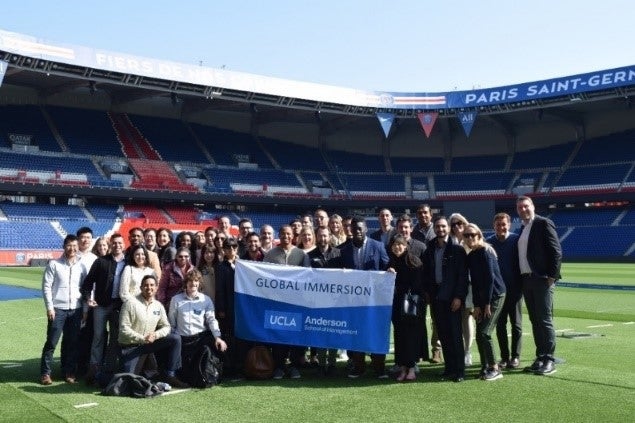
Students Visit Paris and Bordeaux on Global Immersion to Learn About France: Its Diversified Economy, Its Global Brands and Its Role in the European Union
During spring break, 38 students representing all four of UCLA Anderson’s MBA programs - full-time, fully employed, executive and UCLA-NUS executive MBA – together with one alumnus, visited Paris and Bordeaux, to learn about the largest country in the European Union (E.U.) and one of the E.U.’s founding members. The course, focused on “France: Its Diversified Economy, Its Global Brands and Its Role in the European Union,” and was taught by Gonzalo Freixes, adjunct professor of accounting and associate dean of the FEMBA and EMBA programs. This was the third global immersion course to focus on and visit France and the second time that Professor Freixes led such a course to the France.
Historically, economically and culturally, France is one of the most important nations in the Western world. It has the seventh largest economy globally and is home to some of the world’s best-known brands. France is the United States’ oldest ally and has a permanent seat on the United Nations Security Council. France was also a colonial power with colonies in every region on Earth. Its contributions to the development of democracy, diplomacy, literature and law are significant. With the withdrawal of the United Kingdom from the E.U., France now has increased influence in the policies of the European Union and some companies have started moving headquarters from London to Paris. Despite its economic and political success, France has faced many challenges in recent decades including immigration, terrorism, income inequality, conflicts with organized labor, public protests and a growing nationalist movement. In electing President Emmanuel Macron in 2017, French voters rejected the mainstream political parties of the left and right in favor of a pro-E.U. and centrist candidate whose new political party subsequently won a majority of the seats on the National Assembly. Macron has implemented regulatory and labor reform to grow France’s economy – but public resistance has been strong from labor activists. Macron was re-elected as France’s president in April 2022, making him the first French leader to be re-elected in 20 years.
This course explored France’s history, economy and its role in international affairs. Through both pre-travel lectures and sessions that took place during the in-country week, that included time in both Paris and Bordeaux, students learned about France’s major industries, its luxury brands, and its recent efforts to support entrepreneurship. During the week, students heard from, and engaged with, many distinguished and influential business leaders, including a number of UCLA Anderson alumni. They also visited places of historical significance and cultural importance. The series of lectures, presentations, moderated discussions, company visits and visits to important cultural and historical locations helped illuminate Frances’s political, economic, and business environments.
The week began in Paris where students heard firsthand about the business environment in France from prominent and successful UCLA Anderson alumni, including Sebastien Declerq (’97), partner and head of retail and business banking at Oliver Wyman and Aiman Eizzat (‘91), CEO of Capgemini, headquartered in Paris and a global leader in consulting and technology services. Students learned about the luxury industry in France and managing luxury brands from senior leaders with Louis Vuitton and Moet Hennessy LVMH. Natacha Rafalski (’95), president of Disneyland Paris shared the story of Disneyland Paris and discussed her experience with running a U.S. theme park in Europe. The group also received presentations on France’s health care system from Fredric Pette (’02), co-founder and CEO of BioMAdvanced Diagnostics, a biotech/medtech startup. This was complemented by a visit to and tour of Future4care, Europe’s fast-growing health-focused startup accelerator. Students heard from Future4care’s CEO, Agnes De Leersnyder about the startup accelerator, which is also an Institute providing content on digital health and delivering reference certifications. One of the highlights of their time in Paris was a visit to the Parc du Princes football stadium, home since 1974 to the famous football club, Paris Saint Germain where the students learned more about the importance of the club’s brand and its training and development center. Later in the week, students enjoyed a visit and plant tour at ArianeGroup, a European leader of space launchers and a joint venture between the European aerospace company Airbus and the French group Safran. While in Paris, students tasted the famous French cuisine, toured some of the city’s main sights and cruised on the River Seine, a popular way to see Paris. Some students also attended the Paris Opera.
Students transferred by TGV, France’s intercity high-speed train, to Bordeaux, hub of the famed wine-growing region of France. In Bordeaux, they visited Bernard Magrez Start-Up Win, the first start-up incubator located in the heart of the vineyards that is dedicated to wine, vines, wine tourism and digitization. They also visited CEA Technologies in Pessac. The French Alternative Energies and Atomic Energy Commission (CEA) is a key player in research, development and innovation. Following a discussion with Sarah Weldon (’96), strategic partnerships, on the technology and business start-up landscape in France, the group received a tour of CEA Tech’s technology platforms and showroom. On the final day, the group enjoyed a walking tour of Saint Emilion Village, a fascinating village in the Southwest of France and a UNESCO heritage site, where they visited its Monolithic church, the largest in Europe, and the catacombs. Saint Emilion is a small wine appellation that has long gained a reputation as one of the greatest wine regions in the world. The progam concluded at Chateau de Ferrand in Saint Emilion, one of the oldest chateaus in the appellation, founded in the 17th century. Students toured the estate and learned about its history as one of the few Bordeaux properties to have remained in almost the same family’s hands since inception. They enjoyed some winetasting and a lovely closing dinner. It was a wonderful way to conclude the week. Some students stayed in France to travel around and explore while others returned back to the United States with fond memories of their time in one of the most important nations in the Western world.
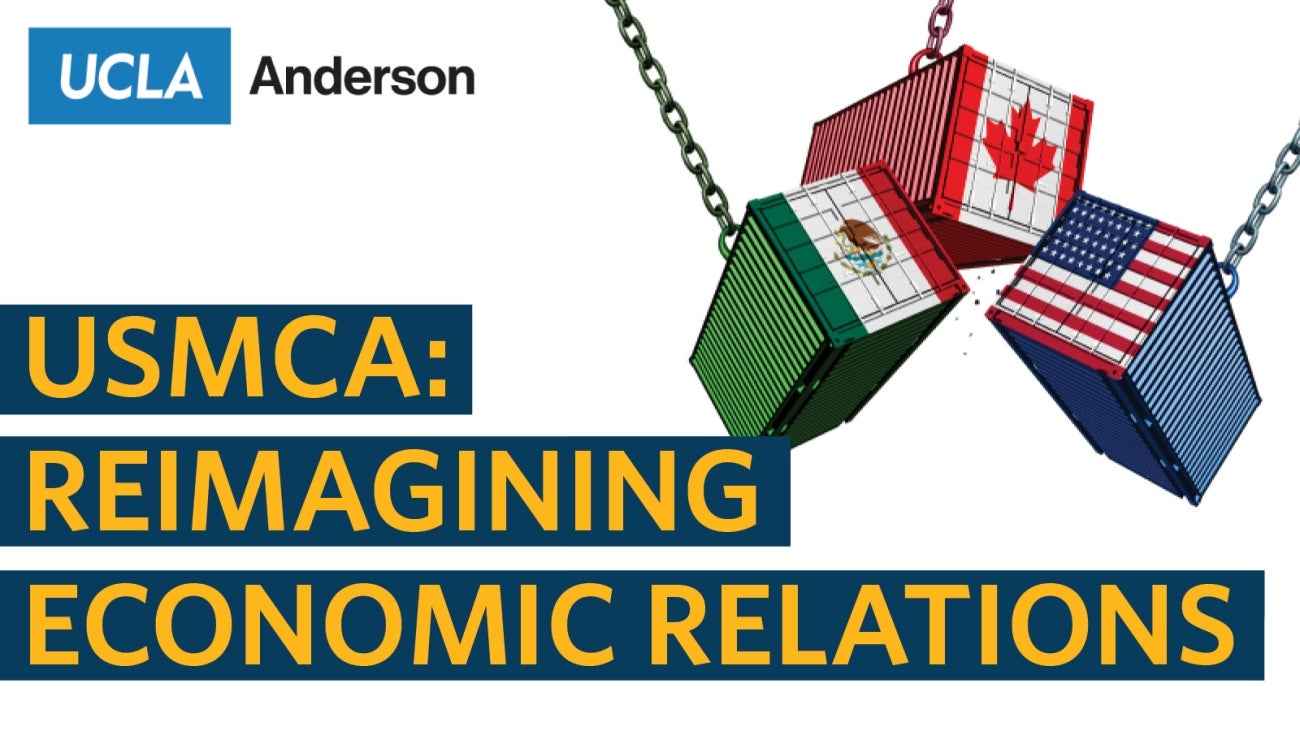
World Today Discussion Series: USMCA and Its Potential to Help the U.S. Improve Supply Chain Resiliency
The United States-Mexico-Canada Agreement (USMCA) which builds on the North American Free Trade Agreement (NAFTA) largely retains NAFTA’s commitment to lowering trade barriers and accomplishes extensive modernization and innovation (although it rolls back trade openness in the auto sector). USMCA presents an opportunity for the three countries to “build back better,” reduce North America’s economic reliance on China and leverage the region’s collective talents, capital, and expertise to develop a more competitive, sustainable, and inclusive North American economy. The importance of USMCA is amplified by growing geopolitical competition with China and the COVID-19 pandemic which has underscored the need to expand and strengthen resilient supply chains by reshoring activities within North America. However, protectionist policies of the three countries could hinder economic development and supply-chain resiliency in the region. Will USMCA truly help the United States “build back better,” and provide a sustainable framework for the region to work as key partners on important and forward-looking issues.
On March 9, the Center for Global Management (CGM), in collaboration with the UCLA Ziman Center for Real Estate hosted a discussion with experts in international trade, logistics, infrastructure and supply chain. World renowned economist and scholar on global trade, Professor Sebastian Edwards joined Lyman Daniels, president of the Mexico operations for CBRE, the global leader in commercial real estate services and investment and Patrick Ottensmeyer, president of Kansas City Southern, a transportation holding company with railroad investments in the U.S. and Mexico. The discussion was moderated by CGM faculty director, Chris Tang, distinguished professor and Edward W. Carter Chair in Business Administration. Panelists shed light on the challenges and opportunities of USMCA and addressed whether USMCA has the potential to reimagine North American economic relations, increase trade flows, build a more competitive, sustainable, and inclusive regional economy and ensure supply-chain responsiveness and resiliency in the long-term. The discussion was part of the CGM’s World Today Discussion Series. This series engages the audience in interactive and enriching conversations around current issues that transcend borders. UCLA and Anderson faculty, alumni, board members and thought leaders share their perspectives on the critical global topics and issues that matter to our community and the world. Through balanced discourse, the series serves as a neutral forum to educate the community on global issues, while at the same time encouraging debate and examination. VIEW VIDEO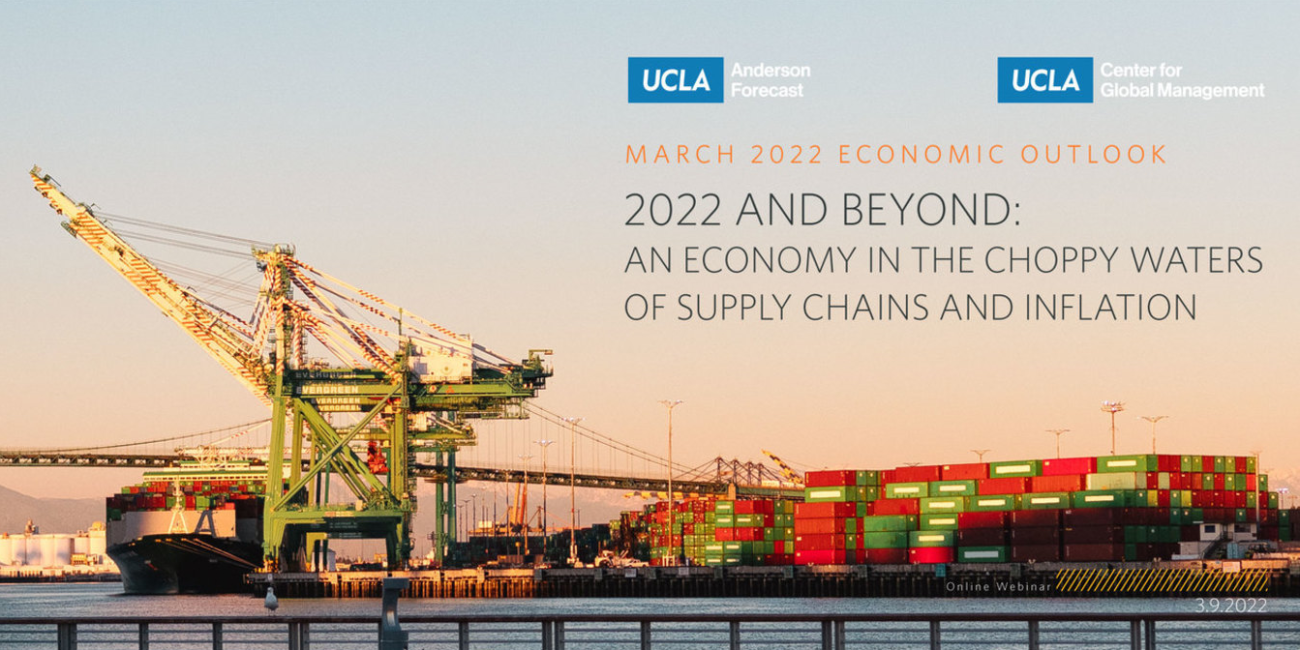
2022 and Beyond: An Economy in the Choppy Waters of Supply Chains and Inflation – March 2022 Economic Outlook
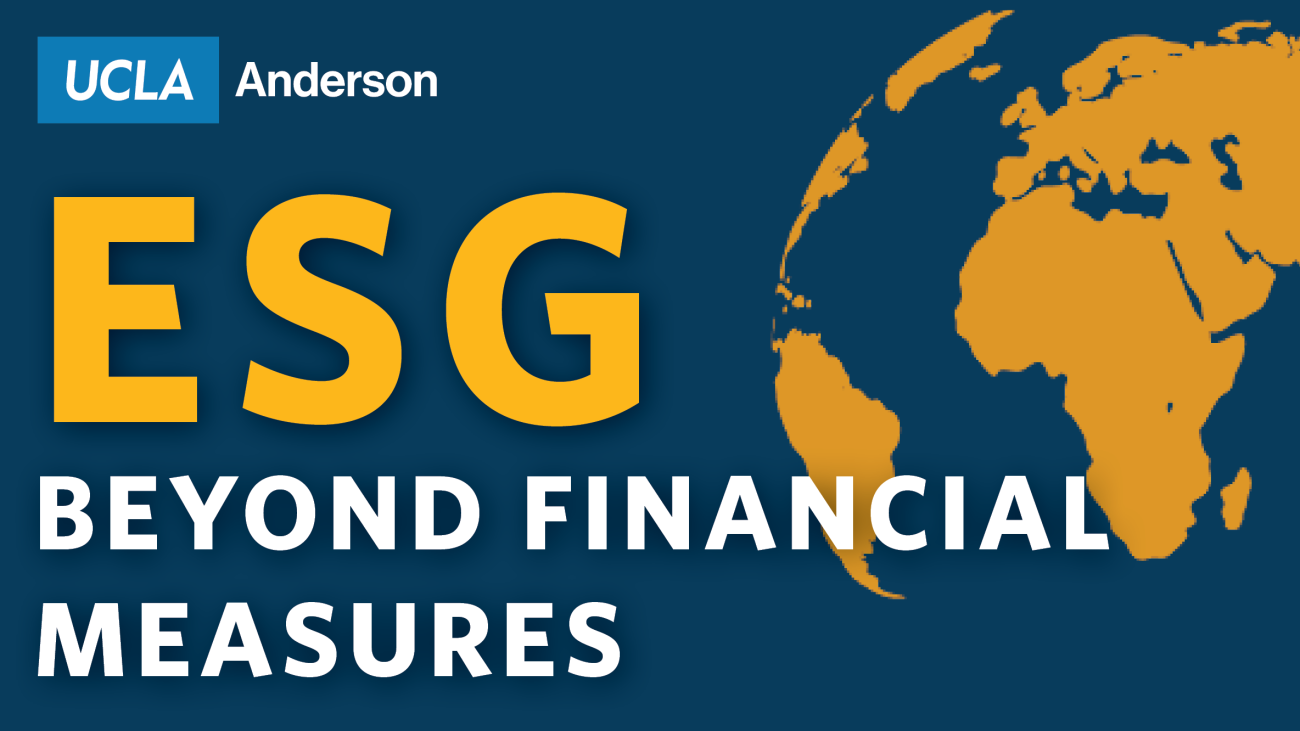
World Today Discussion Series: ESG: Going Beyond Financial Measures to A More Environmentally Sustainable and Socially Responsible Future
Since its debut in a United Nations report in 2006, ESG—the acronym for environmental, social, and governance issues—has captivated the attention of businesses, governments, and academics. Today, ESG is the most widely accepted measure of firms’ sustainability and social impact. The ESG movement is creating a new incentive for companies to collect and disclose information about financial, environmental sustainability, and social responsibility performance and is forcing CEOs to construct measurable means to describe and present their businesses. In less than two decades, ESG investing has evolved into a US$35 trillion industry. While it is gathering momentum around the globe, companies and stakeholders have struggled with the myriad of complex and inconsistent sustainability standards, frameworks and metrics. Given the recent announcement at COP26 of the creation of an International Sustainability Standards Board (ISSB) that will provide the foundation for consistent and global – environmental, social and governance reporting standards, are companies more likely to pivot their operations to a more environmentally sustainable and socially responsible future?
On February 24, the Center for Global Management (CGM), in collaboration with the Center for Impact hosted a discussion around these issues with internationally renowned experts in environmental issues and ESG. Professors Christine Loh, undersecretary for the environment, Hong Kong SAR Government (2012-17) and chief development strategist, Institute for the Environment, HKUST joined Magali Delmas, director of the UCLA Center for Corporate Environmental Performance and Center for Impact@Anderson and explained why the ESG movement, unlike the lack luster CSR initiative, is motivating action by corporations. They explored key challenges and opportunities for practitioners and researchers in ESG and explained why in the wake of climate change, social injustice and income inequality, corporations need to change the way they operate and go beyond the traditional financial measures by taking various ESG measurements into consideration. The discussion was moderated by CGM faculty director, Chris Tang, distinguished professor and Edward W. Carter Chair in Business Administration. The discussion was part of the CGM’s World Today Discussion Series. This series engages the audience in interactive and enriching conversations around current issues that transcend borders. UCLA and Anderson faculty, alumni, board members and thought leaders share their perspectives on the critical global topics and issues that matter to our community and the world. Through balanced discourse, the series serves as a neutral forum to educate the community on global issues, while at the same time encouraging debate and examination. VIEW VIDEO
Past Center Sponsored Events
Students Visit Dubai and Abu Dhabi on Global Immersion to Learn About Dubai and Its Evolving Role in the UAE, Middle East and the World
Tuesday, December 14 – Monday, December 20, 2021
During winter break, 39 students representing all four of UCLA Anderson’s MBA programs - full-time, fully employed, executive and UCLA-NUS executive MBA – together with one alumnus visited Dubai and Abu Dhabi, the two largest emirates making up the United Arab Emirates (UAE), for the CGM’s first Global Immersion course with travel in two years. The course, focused on “Dubai and Its Evolving Role in the United Arab Emirates, Middle East and the World,” was taught by Eric Sussman, adjunct professor of accounting and real estate. This was the fifth global immersion course to focus on and visit the UAE and the fourth time that Professor Sussman led a course to the Middle East. The last time he accompanied a group to the region was in December 2016.
The UAE, a country consisting of seven emirates, has experienced significant volatility in the last decade, as it emerged as a significant economic and transportation hub, whose growth trajectory and even its existence were impacted significantly by the Great Recession and declines in oil prices, along with the consequences of debt-financed growth. How did this extraordinary growth and transformation occur? How has the country been able to balance its (constitutional) monarchal structure, Islam, and Sharia (Islamic financial law), with capitalism and economic transparency? How has Dubai managed its growth with its increasing cost of living? How have Dubai, its far more oil-rich neighbor Abu Dhabi, and the other five emirates (Ajman, Fujairah, Ras-al-Khaimah, Sharjah, and Umm al-Quwain) maintained their economic and political affiliation, holding the UAE together? In many ways, Dubai, Abu Dhabi, and the UAE in general are places of great contradiction, blending and maintaining some equilibrium of both east and west. This Global Immersion course explored the aforementioned topics through on-campus lectures that were complemented by an immersion week to Dubai and Abu Dhabi. During the in-country week, students heard from and engaged with many distinguished and influential business leaders and members of the civil society in the UAE, including a number of UCLA Anderson alumni, and visited places of historical significance and cultural importance. The series of lectures, presentations and moderated discussions helped illuminate the UAE’s political, economic, and business environments and the substantial changes that have occurred over the last several decades. Students explored policies and initiatives to balance accelerated economic growth with environmental and distributional concerns in the context of an emerging global economic powerhouse. The course also provided students with a working knowledge of economic activity and policy, capital markets, real estate investment and sustainable development, and technology innovations in the UAE.
The week began with a visit to Expo 2020, a 438-hectare area located between Dubai and Abu Dhabi, that showcased Dubai as a leading tourism and investment hub in the region – a true global city of the future - and aligned with the UAE’s Golden Jubilee in 2021, in celebration of 50 years of the UAE. The largest event ever to be staged in the Arab world, included 192 Country Pavilions that featured interactive exhibits and entertainment. Through its theme ‘Connecting Minds, Creating the Future’ and subthemes Opportunity, Mobility and Sustainability, Expo 2020 Dubai offered a global platform to foster creativity, innovation and collaboration. The inaugural session of the Global Immersion week offered an overview of the business climate and economic environment in the UAE delivered by Mohamed Khalid Bin Sulaiman, senior manager from the Dubai Chamber of Commerce and Industry. He explained Dubai’s Industrial Strategy 2030, including target industrial sub-sectors and addressed Dubai’s strategies that embrace the future in areas, such as food security and agriculture, AI and blockchain strategies.
The visit to Expo 2020 was hosted by Anderson alumnus and CGM advisory board member, Kevin Berryman (’87), president and CFO of Jacobs Engineering Group. Students learned about Jacob’s role in the delivery of Expo 2020 as program management consultants and its joint venture with Mace (Jacobs Mace JV). They also heard how Jacobs supported multinationals in their build and sustainability of the site and how after the Expo, more than 80% of the infrastructure and built environment will be repurposed for a future human-centric smart city, District 2020. During their time at Expo 2020, students had the opportunity to visit a number of the pavilions, including those of China and Saudi Arabia. The day concluded with a visit to the U.S. pavilion and a networking event that included remarks by Berryman and Robert Clark, United States Commissioner General of Expo 2020 Dubai. Students also had the opportunity to tour the U.S. pavilion that showcased Thomas Jefferson’s copy of the Quran, a Moon rock sample collected by American Astronaut Jack Schmitt during the Apollo 17 mission, a 43-meter tall replica of the Falcon 9 booster, and a replica of the Mars Opportunity Rover.
Many of the same themes that the students heard at Expo 2020 carried through the week. Her Excellency Dr. Aisha Bint Buti Bin Bishr, among the world’s most powerful female leaders in business and technology and vice chairman of the Emaar Development board since Dec 2020, addressed the class. Students learned how Bin Bishr, a global digital magnate, former founding Director General of Smart Dubai and the first woman to lead the transformation of a smart city globally, has laid a robust foundation for upcoming talent that inspires youth towards building a better tomorrow through digitalization. Later, UCLA Anderson alumnus Nalin Nayyar ('96), chief financial officer of Yellow Door talked about the future of sustainable energy in the UAE, the race to net zero, shift to a decarbonized economy and changing government policy. Yellow Door is a leading sustainable energy partner for businesses, serving commercial and industrial customers in the Middle East and South Asia. The company’s solar and energy efficiency solutions help businesses reduce energy costs, improve power reliability and lower carbon emissions.
During the week, students visited the Dubai International Financial Center (DIFC), the only financial free zone in Dubai with an English Common Law framework and its own financial regulator. DIFC is driving the future of finance and is the business gateway of choice for top institutions looking for global standards and free zone benefits. Students learned more about the DIFC innovation hub, home to MENA’s leading growth companies and the DIFC Fintech hive, the #1 fintech accelerator in MEASA, that has graduated 120+ startups. Through presentations and interactive discussions, students gained an understanding of the overall fintech startup environment in Dubai, the venture capital (VC) ecosystem in the region, challenges venture capitalists face and how venture capital is building growth-stage companies across the Middle East. Basil Moftah, general partner at Global Ventures, an international VC firm explained how fintech, e-commerce, digital health and cleantech dominated startup funding in the Middle East and Africa in 2020 and that looking forward, the growing sectors for investment are likely to include fintech, edtech, e-commerce and digital health.
Mid-week, the group traveled to Abu Dhabi where they visited Mubadala Investment Company, a sovereign investor that manages a diverse portfolio of assets and investments in the UAE and abroad, to generate sustainable financial returns for its shareholder, the Government of Abu Dhabi. At Mubadala, students learned about the UAE’s economic champions including companies such as Dolphin Energy, a producer and processor of natural gas; Masdar, a global clean energy pioneer; and EGA, one of the world’s largest premium aluminum producers. This was followed by a visit to Cleveland Clinic Abu Dhabi, part of Mubadala Health’s network of healthcare facilities. Students were greeted by Marc Petre, chief operating officer of Cleveland Clinic Abu Dhabi. He explained that Cleveland Clinic Abu Dhabi opened in 2015 as an extension of the U.S.-based Cleveland Clinic to provide direct access to world-class healthcare to the Abu Dhabi population, reducing the need for patients to travel abroad. The group also had the opportunity to tour the Clinic’s impressive facilities. During the day trip to Abu Dhabi, students enjoyed a walk around the iconic Emirates Palace hotel before a sunset visit to the impressive and inspiring Sheikh Zayed Mosque, the largest mosque in the country. Sheikh Zayed Mosque incorporates architectural styles from different Muslim civilizations and celebrates cultural diversity by creating a haven that is truly welcoming and inspirational in its foundation. Students explored its amethyst-and-jasper-embedded columns, white marble domes, reflective pools, gold-plated Swarovski chandeliers, iconic prayer hall, and courtyard featuring one of the largest marble mosaic artworks in the world.
A group of around 60 UCLA Anderson executive MBA students were also in the UAE for their core International Business Residential. Towards the end of the week, the two groups met up for joint sessions. Simona Agolini, CEO and co-founder of QiDZ, the first family activity mobile app in the UAE that connects parents with entertainment, education and after school vendors delivered a fascinating presentation on starting a business in the UAE. Anderson alumni Rajesh Yadla (’19) manager, information security, risk and governance at Group42, an artificial intelligence and cloud computing company based in Abu Dhabi and Ibrahim El-Khalil (’13) associate partner, McKinsey & Co. also addressed the group. They shared their observations on the key strategic challenges and opportunities for businesses, general perceptions of the region and discussed their career path from UCLA Anderson to the UAE. Anderson alumni from the FTMBA, EMBA and UCLA-NUS EMBA programs enjoyed a networking lunch with students and faculty on the outdoor patio of the Palace Downtown Hotel with stunning view of the Burj Khalifa. Students also heard from Wessam Daoud (’09) who shared some personal reflections on doing business in Gulf Cooperation Council (GCC) countries. The GCC is a political and economic alliance of six Middle Eastern countries of Saudi Arabia, Kuwait, the UAE, Qatar, Oman and Bahrain. The week’s academic sessions concluded with a terrific presentation by Brendan Noonan, former senior vice president of learning and development at the Emirates Airline Group. Noonan discussed the fascinating story of Emirates Airlines, where he worked for almost 25 years, from its beginnings in 1985 to today, one of the world’s most valuable airline brands, recently valued at $7.7 billion. He spoke about Emirates strategy, the future of the airline industry and outlook for worldwide air travel. This was of particular interest to students who had been assigned an HBS case on Emirates.
In keeping with some key themes of the course, students visited The View at The Palm and learned how the palm-shaped Islands’ magnificence was built over a period of six years through a combination of architectural, land reclamation and engineering ingenuity and was the most ambitious project of its time. The palm shape was chosen as a tribute to the palm tree which has played a vital and indispensable role as a key source of food and sustenance throughout the history if the UAE. They also visited Burj Al Arab, Dubai’s most iconic hotel set on an island in a striking sail-shaped building. After a short walk through the Dubai Mall, one of the largest shopping malls in the world, students entered the tallest building in the world. They enjoyed a trip on the world’s fastest elevator to the 125th floor of the iconic Burj Khalifa skyscraper. At its observation deck, they experienced a bird’s eye view of the surrounding emirate with 360-degree panoramas and learned about the architecture and technology behind this Middle Eastern icon that dominates the skyline and towers over Downtown Dubai at over a staggering 2,720 ft.
On the final day in Dubai, students visited the Sheikh Mohammed Centre for Cultural Understanding (SMCUU), located in a beautifully restored wind tower house in the historic Al Fahidi Historical Neighborhood in Bur Dubai. Here the group engaged in an interactive conversation and learned more about the traditions and customs of the UAE, while enjoying some traditional Emirati food. SMCUU is a non-profit organization that promotes awareness of Emirati culture, customs, traditions and religion among expatriates and foreign visitors in the UAE and aims to remove cultural barriers. With its motto Open Doors, Open Minds, all questions – no matter how sensitive – were welcomed and answered to spread tolerance and knowledge and to break stereotypes and misconceptions. The experience also included a visit to the Diwan Mosque, whose distinctive ornate flat dome and slender minaret watch over the Al Fahidi Historic District. Later, students enjoyed an afternoon journey across the Dubai Desert. In 4x4 land cruisers, they were driven through the red sand dunes of the Al Awir Desert to a Bedouin desert camp, where they were able to ride a camel across the sand, do Henna painting and enjoy the sunsets from the dunes. Dubai is and has been a titan of trade for centuries and to get a sense of what commerce was like back in the day, during the week, students also had an opportunity to take a stroll through the city's traditional souks, such as the Gold Souk, one of the most renowned gold jewelry trading centers in the world located on Dubai Creek's south bank in the Deira and the Spice Souk, located on the other side of the creek, where vendors hawk flavors from across the globe, including cinnamon, ginger and chili. The group also got to experience some of the local Middle Eastern cuisine through traditional Lebanese and Emirati lunches and dinners. The week truly illuminated the UAE’s political, economic, and business environment, and the substantial changes that have occurred over the last several decades, as well as the region’s rich traditions and history. There was much to be studied and much to be learned!
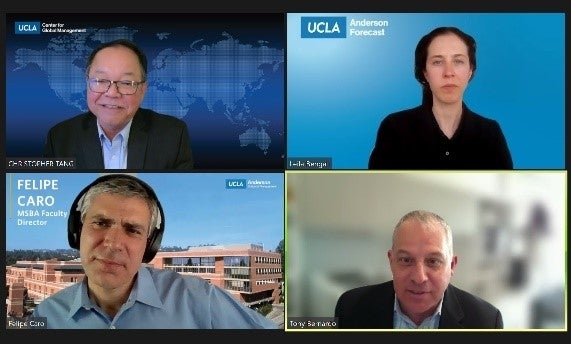
The Global Supply Chain Disruption Explained
Friday, December 3, 2021 12:00 p.m. PST
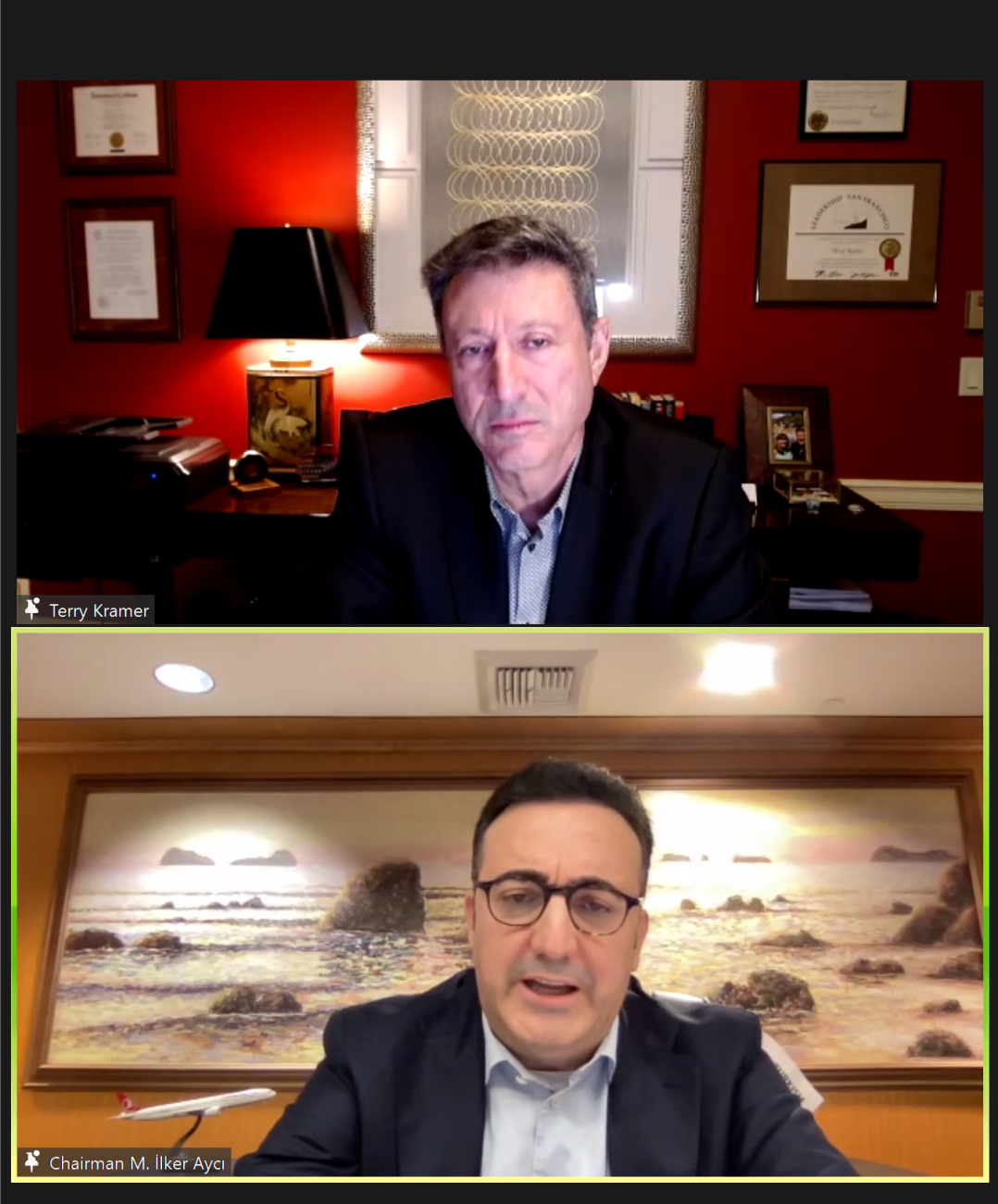
Innovation: Strategies for Success: Global Trends and The Future of Travel – The Role of Technology and Sustainability
Thursday, December 2, 2021 5:00 p.m. PST
Aviation is central to international trade and economic development. After almost two years of uncertainty, the sector will need to grapple with new realities and devise strategies to adapt to the long-term effects of COVID-19. There is some relief to be found in various parts of the world now that vaccinations rollouts are in effect, but the road to recovery for air traffic may take several years. The pandemic has changed consumer and business behavior—and the airline sector—irrevocably. As remote working and virtual meetings become the norm, the industry is likely to see a slow return of business travel. Many have questioned whether business travel will ever return to its original state pre-COVID-19. And digitalization and contactless technology will continue to transform the travel experience. Personalization, hygiene and safety measures will be more important than ever. Tourism trends surrounding low-carbon travel will continue to evolve and travel will become greener and more efficient. Finally, notwithstanding the challenges of COVID-19 and technology-based transformations – – many geopolitical trends have driven growing nationalism, reducing global trade and travel. Will these trends be short term or become part of a “new normal?”
On December 2, the fourth discussion of the academic year, in the Centers@Anderson Innovation: Strategies for Success Series, featured a virtual conversation with M. İlker Aycı, chairman of the board of directors and executive committee for Turkish Airlines, Europe's busiest carrier, and the largest airline in the world by the number of passenger destinations served. He discussed global trends including trade issues, growing nationalism and trade wars and their implications for the future of global travel. He also addressed the longer-term effects on aviation that have been accelerated by COVID-19, including digitization, remote work and the importance of sustainability. Chairman Aycı shared his observations on the values and principles that will help guide the industry towards a healthier and more sustainable future and explained how responding to these shifts decisively now, carriers should be able to look beyond the pandemic and adapt to the long-term realities of COVID-19 that are transforming global travel. The discussion was moderated by Professor Terry Kramer, faculty director of the Easton Technology Management Center. UCLA Anderson Dean Tony Bernardo provided opening remarks. Earlier in the week, Chairman Aycı was honored in Los Angeles with the Airline Passenger Experience Association (APEX) CEO Lifetime Achievement Award, the first time such an achievement has been awarded to a European aviation leader in the history of the awards. He was recognized for his indefatigable spirit, his dedication to constant innovation and ability to quickly enact transformative change while highlighting the many achievements, contributions, and dedication to the industry throughout his career, spanning more than 25 years. Earlier in the week, Chairman Aycı and his colleagues visited UCLA for a tour of the campus. The discussion was a collaboration among the Centers at Anderson, in partnership with UCLA Anderson’s Travel and Hospitality and open to UCLA students, alumni, faculty, staff and members of the extended UCLA community and general public. VIEW VIDEO
About the Innovation: Strategies for Success Series.
In the global environment and post COVID-19, there will be increased opportunities and challenges, with greater demands on leaders, businesses and society. New innovation strategies must be assessed and utilized to ensure future success. This series will address the innovation imperatives of today and their implications for tomorrow. The series is a collaboration among the Centers of UCLA Anderson.
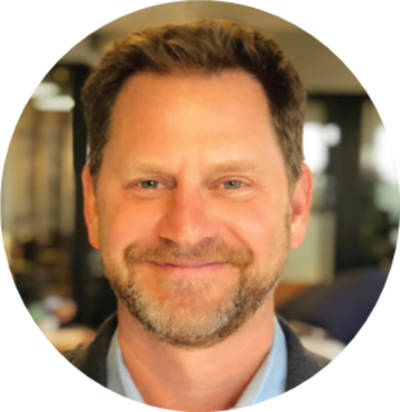
Virtual Discussion with Jon Niermann ('95), President and CEO, Loop Media, Inc. on Global Media and Entertainment and Its Changing Landscape
Tuesday, November 30, 2021 11:30 a.m. PST
On Tuesday, November 30, the Center for Global Management (CGM) hosted a virtual lunchtime discussion with Jon Niermann (’95), an alumnus of the FEMBA program and member of the CGM’s advisory board. During his career of over 30 years, Niermann has achieved success on both the corporate and entrepreneurial business worlds. He built his entertainment career with The Walt Disney Company and Electronic Arts, serving as president of both company's Asian operations, prior to starting his own media companies. Niermann started FarWest Entertainment (2010), a multi-platform (television, music, animation, digital) media and entertainment company that focused on bridging Asia with the West; and Loop Media, Inc. (founded in 2016 and went public in 2020), Loop Media, Inc., a multi-channel streaming platform and the first media company focused on fully integrated 360-degree engagement of music videos and other premium short-form content for consumers and businesses.
Students from the full-time, fully employed and executive MBA programs, interested in global management and business, including members of the Entertainment Management Association joined the interactive session to hear from Niermann about his successful career trajectory post-Anderson. He shared his thoughts and insights on the global media and entertainment landscape in light of the digital revolution, as well as his experiences working on the business and creative sides of large companies and then venturing into the entrepreneurial world full-time with his own media companies and his journey to Loop Media today. Niermann also addressed the implications for the industry, in the short and longer terms as a result of the COVID-19 pandemic and the pivot that Loop Media had to quickly made. He shared some of his own thoughts on the future with the students who received tangible advice as they think about their own careers. Niermann spent 15 years with The Walt Disney Company, growing from a Disneyland theme park management intern in 1988 to the president and managing director of The Walt Disney Company Asia Pacific in 2000. While head of Disney Asia Pacific, he was responsible for regional business development and operations for the company, Disney’s branded television business, its new mobile business, live entertainment, radio and the corporate functions within the region. In November 2003, he joined EA, the world’s leading interactive/video game developer and publisher, as its president of Asia combining the Japanese and Asia-Pacific businesses before leaving EA in 2010 to start his own venture, FarWest Entertainment HK Ltd. While in Asia, Niermann and his family lived in Hong Kong, Tokyo, Singapore and Shanghai. The discussion, organized by the Center for Global Management was supported by the Entertainment Management Association.
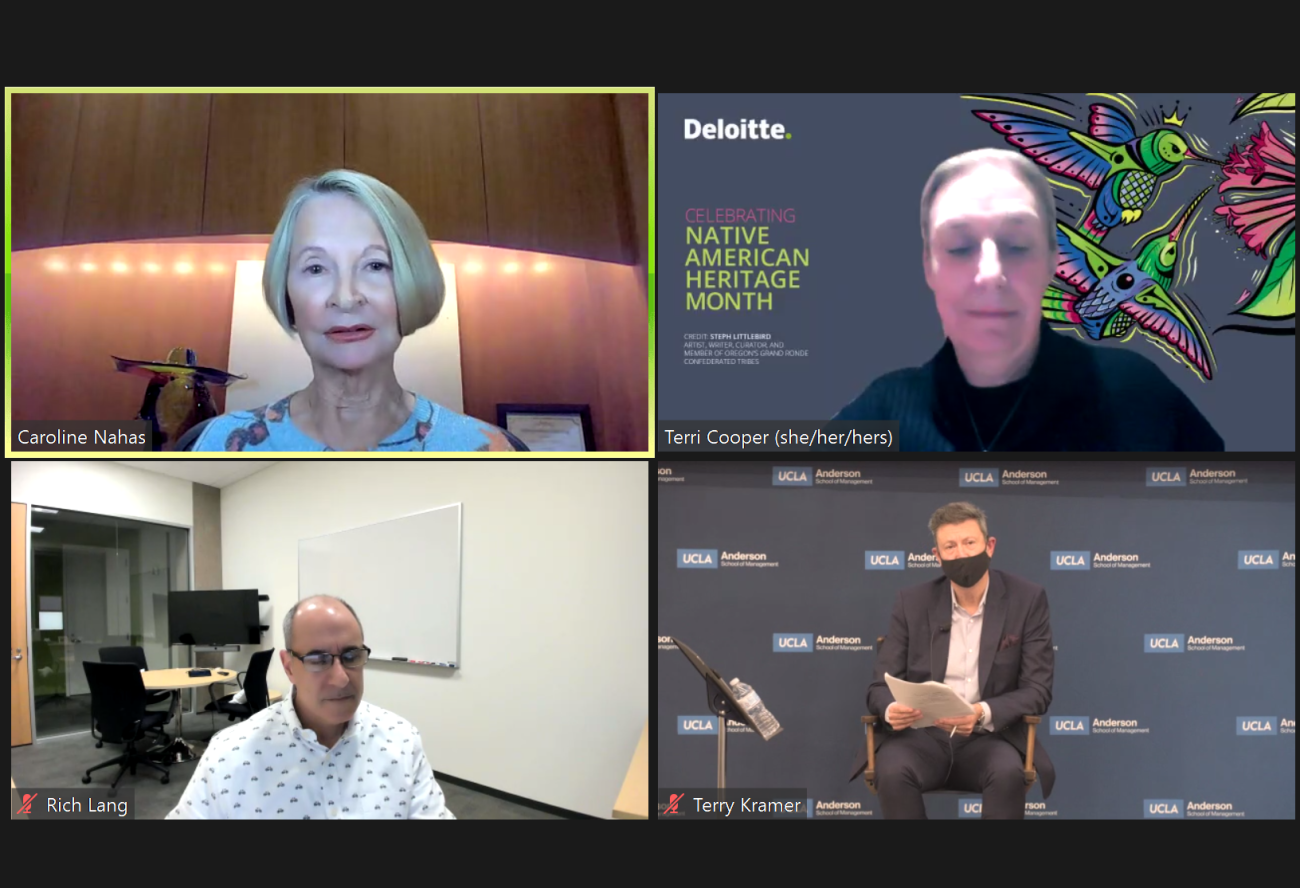
Innovation: Strategies for Success Series: The Role of DEI in Creating New Levels of Enterprise Innovation
Tuesday, November 16, 2021 5:00 p.m. PST
As companies strive to elevate diversity, equity, and inclusion (DEI) as an organizational core value, there’s growing recognition of how critical diversity and inclusion is to business performance. Heterogeneous leadership and boards composed of individuals with a variety of skills, perspectives, backgrounds, and resources — promotes creativity and innovation and yields differing voices that can play an important role in the understanding of constituents and community needs and ultimately, developing successful products/services and achieving the organization’s mission.
On day two of UCLA Anderson’s Embracing Diversity Week (EDW), the Centers@Anderson hosted a hybrid conversation with Terri Cooper, principal and vice chair of external diversity, equity and inclusion (DEI), Deloitte USA; Caroline Nahas, senior advisor, Korn Ferry and chair, board of advisors, UCLA Anderson; and Rich Lang (’91), senior vice president human resources, VMware, a leading cloud computing and virtualization company that has successfully implemented DEI as a fundamental part of its talent strategy. The conversation was moderated Professor Terry Kramer, faculty director of the Easton Technology Management Center. Panelists discussed the DEI imperative, shared their views on what success looks like with effective initiatives and organizational transformations and addressed best practices at all levels in an organization—from board level to customer facing teams. They spoke about leadership imperatives, best practices in recruitment and inclusive cultures and explained why diversity without inclusion is not enough. They also shared observations on the practicalities and challenges faced by organizations and their thoughts on how practices developed in the U.S. might be used abroad and how best practices from abroad can be applied in the U.S. as organizations seek to elevate DEI as a core value on a global scale. Ultimately, they discussed the role that everyone in the organization plays to ensure effective DEI. Each panelist brought invaluable insights about the criticality of DEI in innovation, provided a logical and detailed set of best practices and structure that the audience could engage around and displayed the necessary personal belief and commitment around effective DEI practices. The main discussion, was followed by a separate, post-event open conversation, organized by the Anderson's Embracing Diversity Week Student Committee, who facilitated and moderated both in-person and virtual breakout sessions where attendees discussed what DEI means to them in terms of enterprise innovation and the roles and responsibilities of leaders in society. UCLA Anderson Dean Tony Bernardo provided opening remarks. The discussion was a collaboration among the Centers at Anderson and open to UCLA students, alumni, faculty, staff and members of the extended UCLA community and general public. It was also a featured event of UCLA Anderson’s Embracing Diversity Week and UCLA’s international Education Week. VIEW VIDEO
About the Innovation: Strategies for Success Series.
In the global environment and post COVID-19, there will be increased opportunities and challenges, with greater demands on leaders, businesses and society. New innovation strategies must be assessed and utilized to ensure future success. This series will address the innovation imperatives of today and their implications for tomorrow. The series is a collaboration among the Centers of UCLA Anderson.
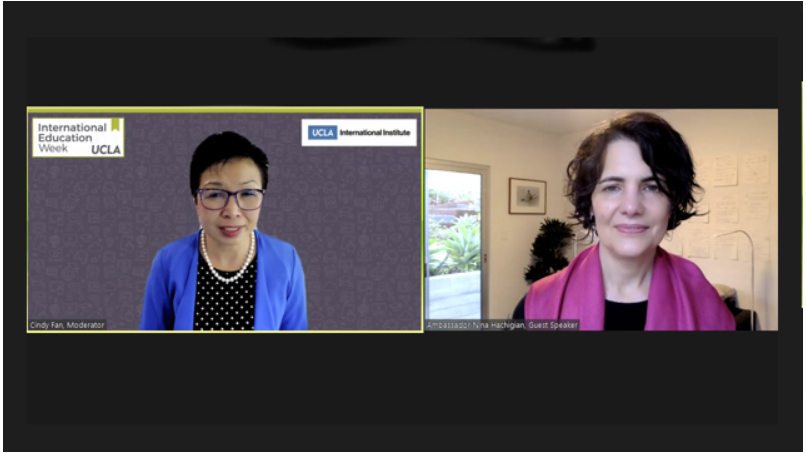
International Education Week (IEW) at UCLA
International Education Week (IEW) is an annual celebration of international education and exchange initiated by the U.S. Departments of State and Education and observed by universities around the nation. IEW is a time to recognize and acknowledge the benefits and importance of international education and exchange. International education is about the global mobility of students and scholars to study, research, or teach; about those who engage in community-based service learning at home and abroad; and about increasing knowledge about the world, intercultural skills, and capacity to solve global problems collaboratively.
The 2021 IEW ran from November 15-19, 2021. For the sixth year in a row, the UCLA International Institute led a large-scale UCLA observation of International Education Week and for the second year in a row, rose above the challenge of the coronavirus pandemic. In a mostly virtual program punctuated by a few in-person events, IEW took a deep look at the enduring value of international education and exchange through the eyes of faculty, students and alumni.
During the week, some 52 UCLA units hosted 43 individual events attended by hundreds of Bruins (past and present) and the general public. Bruins Around the World, the traditional evening of student cultural performances and activities hosted by UCLA Residential Life, returned to an in-person format this year at Covel Commons — cheered on by an enthusiastic crowd of 162 mask-wearing students. Other notable events included two UCLA Global Conversations, an international trivia night hosted by the Dashew Center for International Students and Scholars, an in-person martial arts workshop on Hawai’ian Lua and an Association of Pacific Rim Universities (APRU) panel on “Global Perspectives on Anti-Asian Racism.” The broad array of activities, which can be viewed on the UCLA website for IEW, featured several roundtables with students and alumni on the study abroad experience, navigating different cultures, international careers, leveraging foreign language studies and living abroad in the age of Covid-19.
The IEW Global Conversation has become a campus tradition. This year, there were two featured speakers. On Monday, November 15, Attorney General Rob Bonta spoke about his journey to the position of Attorney General of the State of California, and on Tuesday, November 16, Ambassador Nina Hachigian, Deputy Mayor of Los Angeles, discussed the growing need for global leaders based on her diverse government service and from her vantage point in the global city of Los Angeles. Each of the speakers engaged in thought-provoking conversation with Cindy Fan, vice provost of international studies and global engagement and shared their backgrounds and advice with current students. Bonta, the first person of Filipino heritage to serve as California attorney general, spoke passionately about the need for a global perspective and international collaboration to advance social justice, particularly on climate change and public health. He shared three major life lessons that inform his work as leader of the nation’s largest state justice department. As a child, he witnessed his parents work in the California farmworkers’ movement alongside famous Chicano and Filipino leaders. “The lesson I learned… is that there is great power in coming together in solidarity across cultural differences — that power can change the world,” he said. Ambassador Hachigian spoke about her unexpected journey from an undergraduate biology major to U.S. Ambassador to the Association of Southeast Asian Nations (ASEAN) during President Barack Obama’s second term. Hachigian stressed that her office of international affairs had three major goals: to build on the extensive global assets of Los Angeles to attract foreign investment, global nonprofit organizations and international institutions to create jobs and economic opportunities for city residents; to provide young Angelenos international experience and skills; and to engage with global partners in solving global challenges, such as climate change, that affect Los Angeles.
The Center for Global Management is a collaborating partner of IEW each year. As a lead up to IEW, on November 9, the CGM led a discussion, featured as part of the Centers@Anderson Innovation: Strategies for Success Series on social innovations around the world. Cheryl Gregory (’10), senior manager, Bill & Melinda Gates Foundation joined Edwin Keh, CEO, Hong Kong Research Institute of Textiles and Apparel (HKRITA) and former chief operating officer, global procurement, Walmart; and Shailendra Tyagi, former head, supply chain and logistics, ITC Limited where he led the e-Choupal rural marketing initiative in India in its agri-business division. Panelists discussed innovation projects they have been engaged with and shared examples of how innovative technology can enable positive change and bring new solutions to improve environmental sustainability and advance social responsibility around the world. The discussion was moderated by Professor Chris Tang, faculty director of the Center for Global Management. View the discussion >>.
During IEW, the Centers@Anderson hosted a hybrid conversation with Terri Cooper, principal and vice chair of external diversity, equity and inclusion (DEI), Deloitte USA; Caroline Nahas, senior advisor, Korn Ferry and chair, board of advisors, UCLA Anderson; and Rich Lang (’91), senior vice president human resources, VMware, a leading cloud computing and virtualization company that has successfully implemented DEI as a fundamental part of its talent strategy. The conversation was moderated Professor Terry Kramer, faculty director of the Easton Technology Management Center. Panelists discussed the DEI imperative, shared their views on what success looks like with effective initiatives and organizational transformations and addressed best practices at all levels in an organization—from board level to customer facing teams. They also shared observations on the practicalities and challenges faced by organizations and their thoughts on how practices developed in the U.S. might be used abroad and how best practices from abroad can be applied in the U.S. as organizations seek to elevate DEI as a core value on a global scale. The discussion was also proudly featured as part of UCLA Anderson’s Embracing Diversity Week.
The enthusiastic support for International Education Week across campus this year was in many ways reflective of UCLA’s status as one of the world’s leading global universities, one whose graduates and research have a global impact.

Virtual Discussion with Jim Allen ('93), Head of M&A LatAm at Morgan Stanley on Global Investment Banking and the Changing Nature of International Trade and Investment
Wednesday, November 10, 2021 11:30 a.m. PST
On Wednesday, November 10, the Center for Global Management (CGM) hosted a virtual lunchtime discussion with Jim Allen (’93), an alumnus of the full-time MBA program and member of the CGM’s advisory board. Jim Allen is a senior investment banker and strategic advisor, with over 28 years of experience in investment banking in the U.S. and across Latin America. Since graduating from Anderson, Allen has been in the Investment Banking Division at Morgan Stanley, having held positions in U.S. M&A, the Global Media & Communications banking group, and since 2008, as head of M&A for the Latin America region. During his career at Morgan Stanley, Allen has been involved in equity and debt capital markets transactions, and has advised corporations, family-controlled businesses, and governments in M&A transactions, privatizations and debt restructurings. Students from the full-time, fully employed and executive MBA programs, interested in global management and business, including members of the Investment Finance Association and Latin American Business Association joined the intimate and interactive session to hear from Allen who shared his thoughts, insights and experience as a global investment banker and strategic advisor and addressed his career transition from the U.S. Navy to investment banking enabled by UCLA Anderson. Allen also discussed his experience doing business internationally within a highly global, U.S.-based multinational and shared his thoughts on the changing nature of international trade and investment amidst the current cooling of U.S.-China relations. He shared some leadership lessons with students and addressed the importance of cultural awareness and being able to adapt as the environment evolves. Students received tangible advice as they think about their own careers. Prior to Anderson, Allen served for seven years as an officer in the U.S. Navy, including six months as an exchange officer in the Chilean Navy. The discussion was cosponsored by UCLA Anderson’s Investment Finance Association and Latin American Business Association.
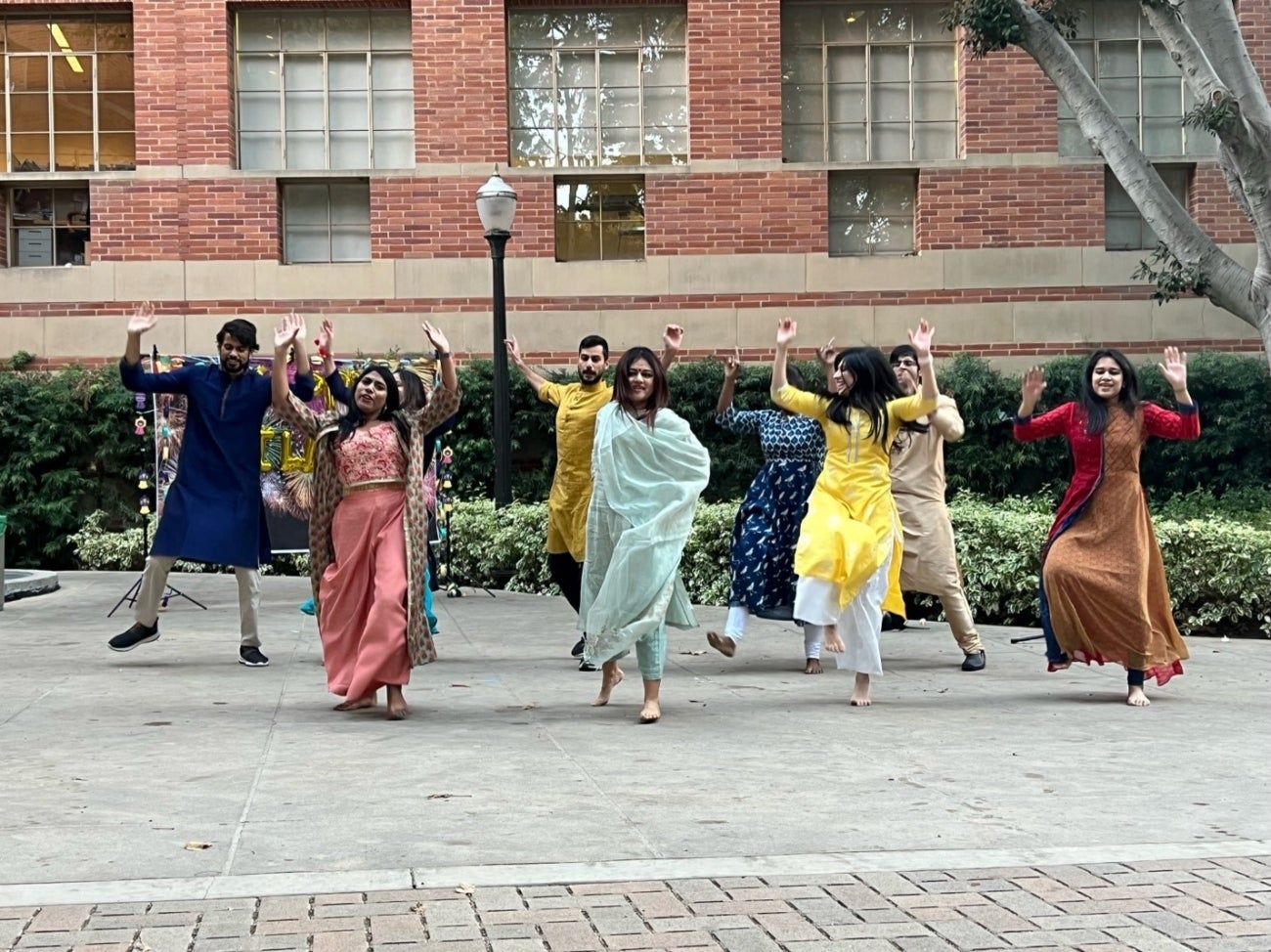
Celebrating Diwali at UCLA Anderson
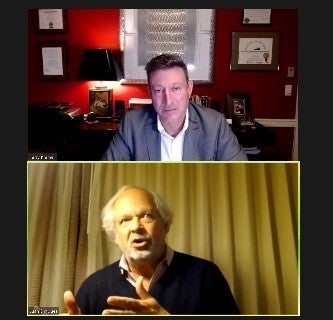
Innovation: Strategies for Success Series: How Technology Innovation Transforms Society and Our Ethics with Juan Enriquez
Thursday, October 28, 2021 5:00 p.m. PDT
On October 28, the Centers@Anderson in collaboration with the 2021 Tech & Society Conference hosted a fascinating and thought provoking discussion with futurist, polymath, venture capitalist and author, Juan Enriquez. Enriquez is managing director of Excel Venture Management, a life sciences VC firm. He cofounded the company that made the world's first synthetic life form and seed funded a company that may allow portable brain reading. Enriquez is also the author of Right/Wrong: How Technology Transforms Our Ethics which explores how technological innovation is driving exponential change in our thoughts on right and wrong as we create a world where humans increasingly are able to shape their environment, themselves and other species. His book covers how today’s most pressing issues are all framed by the relationship between technology and ethics, which allows for real potential to improve the future. In his book, Enriquez argues that technology not only shapes people’s ethics but also has drastically improved ethics within societies. This argument challenges many widely held beliefs that technology corrupts societal ethics. Enriquez further posits that today’s most pressing issues — the pandemic, climate change, and political polarization to name a few — are all shaped by the relationship between technology and ethics, and that this holds enormous potential for improving the future. The conversation, moderated Professor Terry Kramer explored what we can learn from past technological innovations and how we can use this knowledge to build a better future. While technology might be over-estimated in the short term, it can be argued that it is under estimated in the long term. Enriquez addressed the importance of avoiding stereotyping and judging and highlighted the importance of understanding the context of the environment that that we are operating in and then forming views. Enriquez possessed a distinct and very impressive ability to think laterally and expansively and take disparate facts about the world around us and make sense of them in a way that is timely and relevant. This discussion was the featured keynote address for the Easton Center for Technology Management’s 2021 Tech & Society Conference and in partnership with Centers@Anderson, a collaboration among the Centers of UCLA Anderson. VIEW VIDEO
About the Innovation: Strategies for Success Series.
In the global environment and post COVID-19, there will be increased opportunities and challenges, with greater demands on leaders, businesses and society. New innovation strategies must be assessed and utilized to ensure future success. This series will address the innovation imperatives of today and their implications for tomorrow. The series is a collaboration among the Centers of UCLA Anderson.
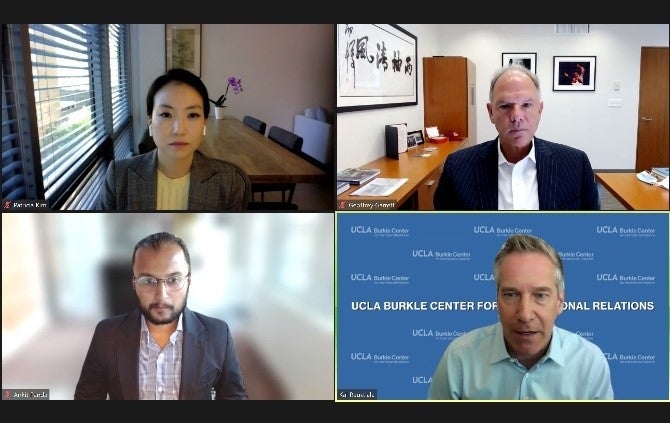
The AUKUS Pact
Wednesday, October 27, 2021 11:00 a.m. PDT
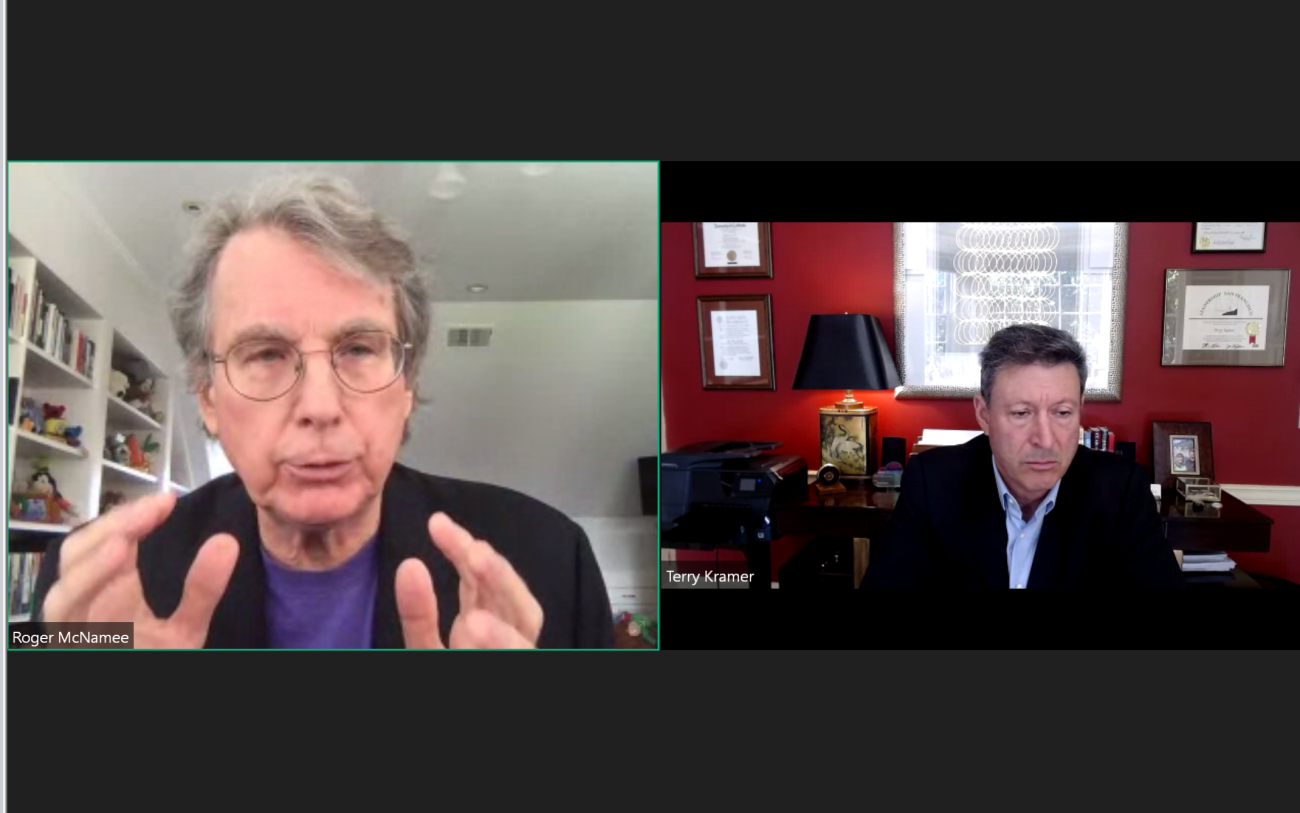
Social Media's Dark Side – A Conversation with Roger McNamee
October 2021
Roger McNamee, an American businessman, Silicon Valley investor, and venture capitalist was an early investor in Facebook and personal mentor to Mark Zuckerberg, but since 2017 he has been working to trigger a national conversation about the dangers of unregulated technology giants like Facebook. McNamee’s 2019 New York Times bestselling book, Zucked: Waking Up to the Facebook Catastrophe, details his realization of Facebook’s dangerous business and his reckoning with how we as a society must work towards change. Fast forward to 2021 – Facebook, as the world’s largest social media platform, is under scrutiny for its alleged role in fake news, promoting hate, extremism, cyberbullying, human trafficking and anti-trust violations and McNamee’s work came back into the public spotlight this month, after Facebook whistleblower Frances Haugen’s explosive testimony before Congress.
On October 21, the Los Angeles World Affairs Council & Town Hall and UCLA Anderson School of Management co-hosted a timely conversation with Roger McNamee on Social Media’s Dark Side. McNamee addressed the impact of disruptive innovation on products, services, markets and competition in the U.S. and globally and shared his views about the trade-offs and implications of actions, and how to mitigate any unintended consequences while achieving necessary reforms. The conversation suggested that self-regulation is not enough, business models and cultures are key drivers of outcomes, and there is a path to better behavior. It is important to think about various stakeholders and stakeholder management, including employees, customers as well as the community and society; and while there is an epic battle between efficiency and democracy, we shouldn’t lose sight of the importance of democracy that as created such great outcomes. The discussion was moderated by UCLA Anderson’s Professor Terry Kramer who teaches a number of tech-focused global management elective courses. The event was hosted by the Los Angeles World Affairs Council & Town Hall, in partnership with UCLA Anderson School of Management. The Center for Global Management is a member of the LAWAC & Town Hall. VIEW VIDEO
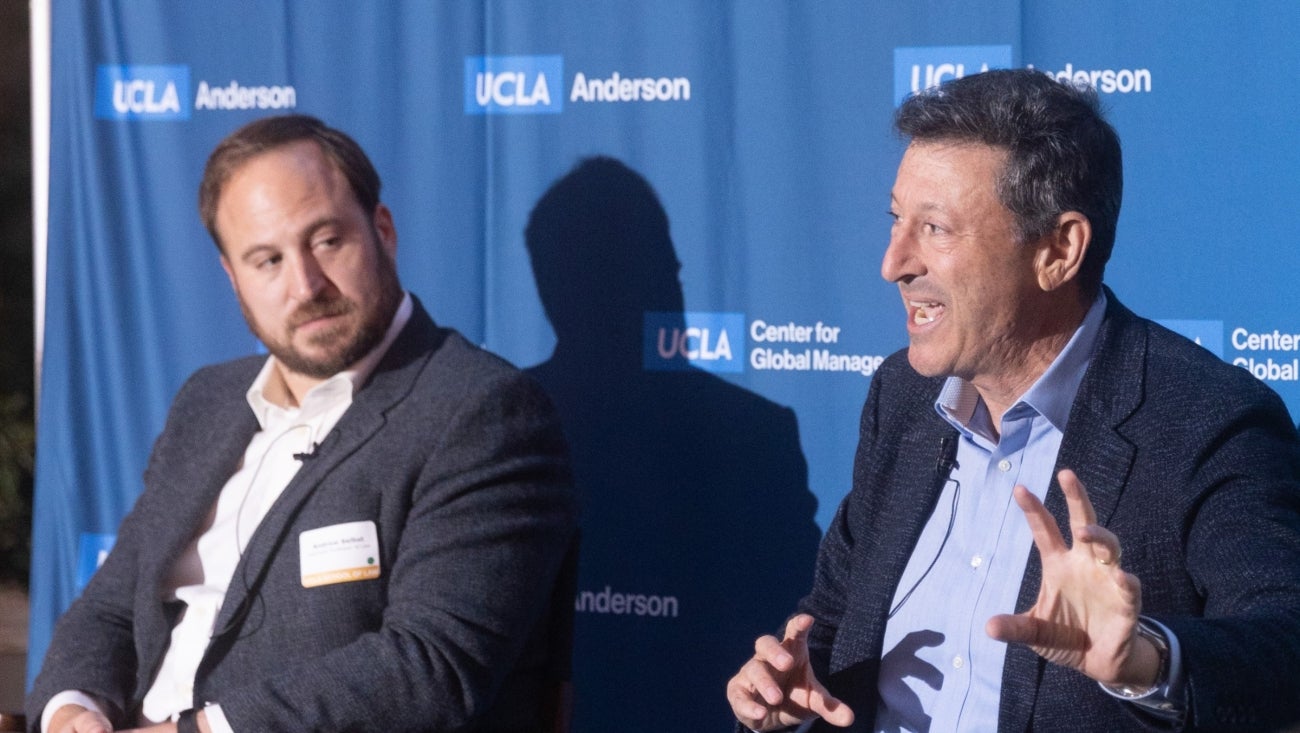
Global Business and Policy Forum: Cybersecurity: Broad Trends, Risks and Promising Areas of Innovation
Technology-based innovation has created huge benefits along with a significant number of access points to the Internet from devices and transactions of all types – – connected devices in a variety of forms – – wearables, connected vehicles, connected appliances, coupled with an increased number of transactions whether they be videoconferencing, e-commerce, social networks, government-based identification applications, etc. With this innovation has also come increased risks and prevalence of cyber-attacks potentially crippling the benefits of technology-based innovation, damaging security of individuals, enterprises and governments, and ultimately challenging our way of life. Hardly a month goes by without the announcement of another massive breach of data held by a government agency, a multi-national business or an essential service provider. Cyberwarfare, cyberespionage, and cyberterrorism are big challenges facing governments throughout the world and businesses large and small. And President Biden has made cybersecurity, a top priority for the Biden-Harris Administration at all levels of government. Is the breach of any organization’s cybersecurity just a matter of time? Can a modern commercial society organize itself to deal efficiently and effectively with breaches of cybersecurity? Are there regulatory schemes that can offer real protection to citizens and customers with respect to their private personal data? And how can technology be used to identify and eliminate cybersecurity risks?
On October 18, on UCLA Anderson’s North Terrace, and remotely via Zoom, the UCLA Anderson Center for Global Management and UCLA School of Law’s Lowell Milken Institute for Business Law and Policy hosted the inaugural discussion of the new academic year in their joint Global Business and Policy Forum series to review the broad landscape of cybersecurity challenges that impact the consumer, enterprises and society in today's virtual world. UCLA Anderson’s Terry Kramer, adjunct professor of technology management and faculty director, Easton Technology Management Center joined UCLA School of Law’s Andrew Selbst, assistant professor law to address the risks, roles of government vs. enterprises vs. individuals and share their observations on the most promising areas of innovation to enhance cybersecurity while protecting individuals, enterprises and societies. They framed the problems and identified the many tensions that need to be reconciled in order to move towards a thoughtful solution and provided terrific insights into both the strengths and weaknesses of legal solutions including regulation. There were many interactive table conversations where specific questions were discussed among the students who analyzed the issues from both a business and legal lens, including: where do the solutions reside to mitigate cybersecurity risk - with technology, with regulators, with self-policing? Students also considered the roles of the main actors, namely regulators, lawyers and advisors, and business leaders? The discussion engaged around 70 students and faculty from the UCLA Anderson School of Management and the UCLA School of Law. The Global Business and Policy Forum is a collaborative partnership between the Center for Global Management and UCLA School of Law's Lowell Milken Institute for Business Law and Policy. VIEW VIDEO
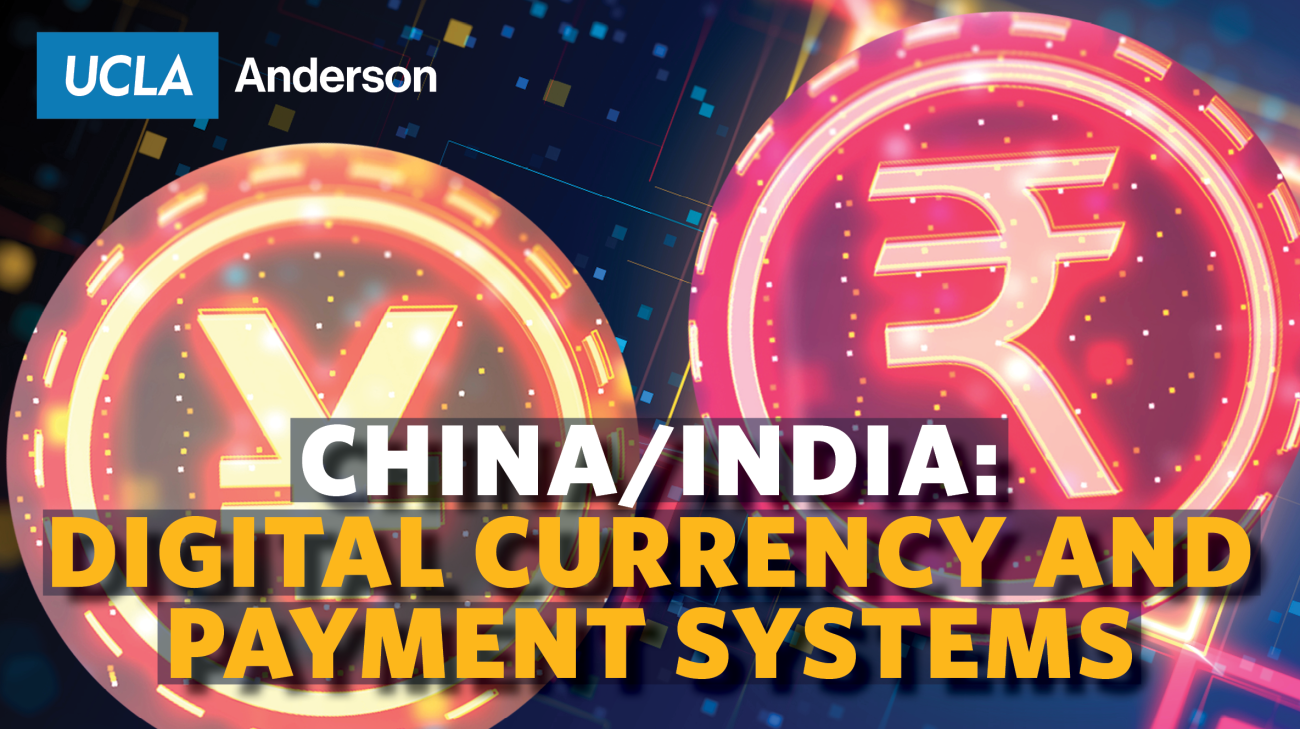
World Today Discussion Series: China’s Digital Currency and India’s Digital Payment Systems: Implications for Asia and the World
Tuesday, October 5, 2021 6:00 p.m. PDT
China began piloting the world's first digital sovereign currency in April. China's digital renminbi, backed by its central bank, has the potential to not only displace unregulated cryptocurrencies, but also to internationalize the renminbi. Meanwhile India, amid the gloom of the pandemic and efforts to promote its own digital journey, overtook China to register the highest number of countrywide digital payments. The world’s largest digital and financial inclusion program of its kind has helped transform the lives of millions of Indians. This digital payment (Paytm) boom is indicative of a larger paradigm shift in the ease of access to financial services. Much of this success is a result of the diligent policy and technology frameworks created by the central government over the last few years.
On October 5, the Center for Global Management (CGM) hosted a discussion around these two major technological developments that received limited coverage in the U.S. media, but their potential impacts are far-reaching. Michael Sung, chairman, CarbonBlue Innovations, a leading venture building and investment company focused on blockchain, fintech and digital finance innovation, and leading researcher in the area of digital currencies joined Bhagwan Chowdhry, professor of finance, Indian School of Business and director of its Digital Identity Research Initiative. The fascinating conversation which drew a global audience of students, alumni, faculty, staff, and members of the extended UCLA community and general public, was moderated by CGM faculty director, Chris Tang, distinguished professor and Edward W. Carter Chair in Business Administration. During the hour-long conversation, Chowdhry and Sung reviewed these technological developments; explored the impact and implications for China, India, the U.S. and the world; examined opportunities for startups, venture investors and the global investment community; and shared their longer-term views on the future of digital payments and digital currencies. The discussion was part of the CGM’s World Today Discussion Series and was co-sponsored by UCLA Anderson’s Greater China Business Association and South Asian Business Association. The World Today Discussion Series engages the audience in interactive and enriching conversations around current issues that transcend borders. UCLA and Anderson faculty, alumni, board members and thought leaders share their perspectives on the critical global topics and issues that matter to our community and the world. Through balanced discourse, the serves as a neutral forum to educate the community on global issues, while at the same time encouraging debate and examination. VIEW VIDEO
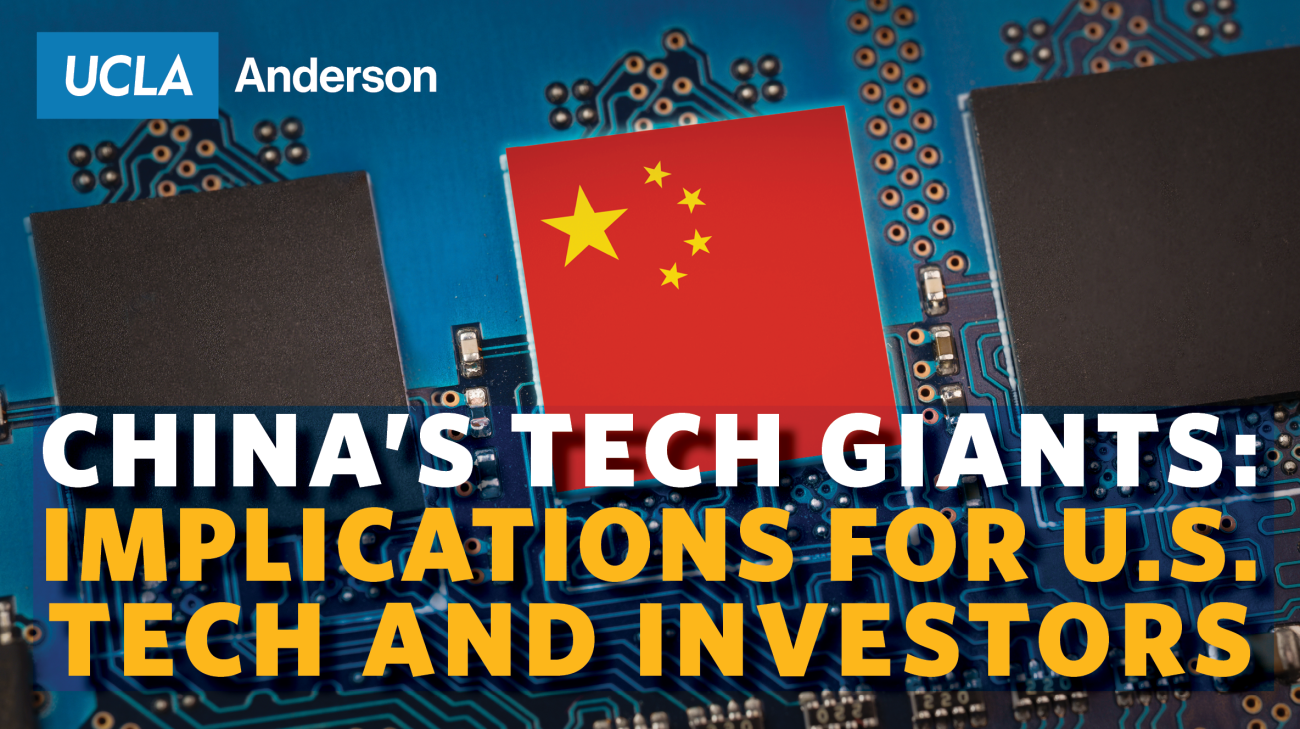
World Today Discussion Series: China's Tech Giants: Recent Events and Implications for U.S. Investors and Tech Firms
Earlier this year, as China unveiled its 5-year plan with tech ambitions at its core, the world took notice of the phenomenal success of some of China’s biggest names in tech which have become central to everyday life in China, including e-commerce platform Alibaba, internet-based platform Tencent and ride-hailing app DiDi. For the past several years, foreign investors have been pouring money into their stocks. But this summer, their shares, listed in New York and Hong Kong saw sharp selloffs that had little to do with the companies’ business performance. China has taken a series of actions to reign in big tech, sending shock waves through international markets, stocks plummeting, and causing massive selloffs and shutdowns of multi-billion dollar IPOs. Until recently, Chinese companies going public in the U.S. were a bright spot in the otherwise tumultuous U.S.-China relationship. But now everyone is watching to see what steps Chinese regulators will take next and investors wonder what the future holds for China’s tech companies and more broadly for listings of Chinese companies in the U.S. and other countries.
On September 30, the Center for Global Management (CGM) hosted a moderated panel discussion with China expert Gordon Orr, who spent over 30 years with McKinsey in China and sits on the boards of a number of Chinese tech companies; Ken Sansom (’06), global director, emerging tech at Amazon Web Services with over 30 years leading technology businesses across the U.S., Asia, and Europe; and Harvard Business School Professor Feng Zhu, a research expert on Chinese tech firms such as DiDi and Alibaba. Panelists reviewed recent events and explored the possible impact on private and foreign investments and broader implications from a business, legal and U.S.-China relations perspective. They also discussed implications for U.S. investors and shared lessons learned for U.S. tech giants. The global audience of students, alumni, faculty, staff, and members of the extended UCLA community and general public asked many important questions during the audience Q&A that went into a deeper discussion on the transition of the tech sector and some of the key topics and longer-term implications. The conversation, moderated by Chris Tang, distinguished professor and Edward W. Carter Chair in Business Administration, was part of the CGM’s World Today Discussion Series and was co-sponsored by the UCLA Anderson Easton Technology Management Center and Greater China Business Association. The World Today Discussion Series engages the audience in interactive and enriching conversations around current issues that transcend borders. UCLA and Anderson faculty, alumni, board members and thought leaders share their perspectives on the critical global topics and issues that matter to our community and the world. Through balanced discourse, the serves as a neutral forum to educate the community on global issues, while at the same time encouraging debate and examination. VIEW VIDEO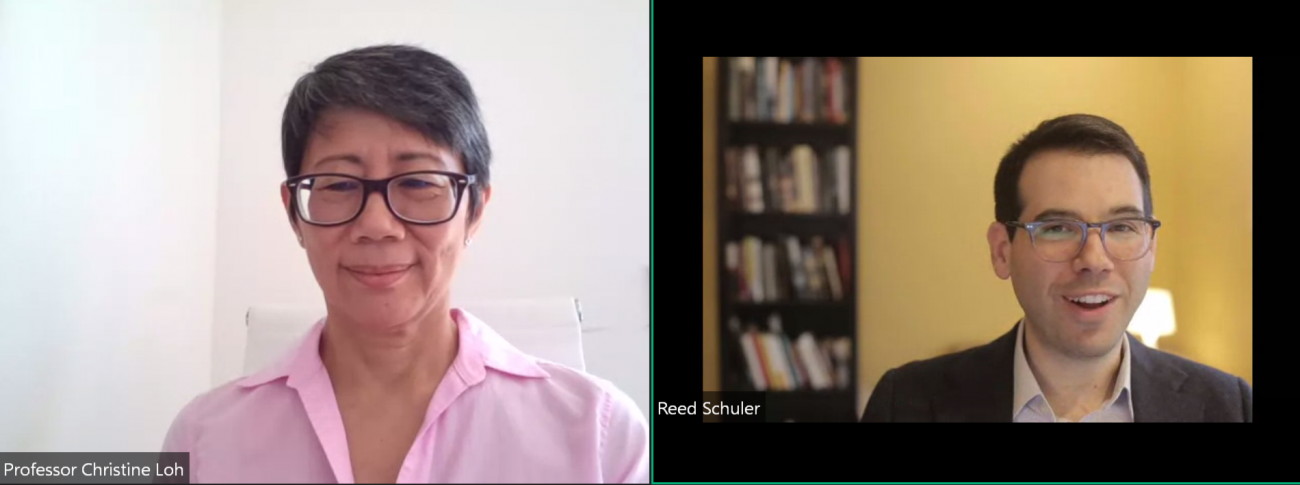
Assessing President Biden’s Climate Policy: A Conversation with Reed Schuler, Senior Advisor to Special Presidential Envoy for Climate John Kerry
August 2021
Tackling climate change was one of Joe Biden’s key campaign promises. President Biden took office with an ambitious climate plan that lies at the center of his domestic and foreign policies. Committed to putting the climate crisis at the center of his policy agenda, President Biden appointed John Kerry, the inaugural first-ever Special Presidential Envoy for Climate, whose job is to lead the president’s international climate agenda and engagement. The U.S. has pledged that by 2030, it would cut greenhouse gases by 50% compared to 2005 levels; that there would be a carbon free power sector by 2035; and the U.S. would achieve Net Zero by 2050. As the climate crisis continues to escalate — this summer is one of the hottest on record, with severe droughts and wildfires, and flooding across the globe.
On August 25, Reed Schuler, senior advisor to Special Presidential Envoy for Climate John Kerry shared how the Biden administration is tackling climate change both domestically and internationally. Before joining the Biden-Harris Administration, Schuler was Washington State Governor Jay Inslee’s senior policy advisor for climate and sustainability and the Governor's special advisor for Pandemic Health Response. The lunchtime conversation, attended by Anderson students and alumni, was moderated by with Christine Loh, UCLA Anderson visiting professor, former Under Secretary for the Environment in Hong Kong (2012-17) and chief development strategist at the Hong Kong University of Science and Technology’s Institute of the Environment. The conversation took an inside look at the inaugural Special Envoy’s office, unpacked the goals of Biden’s climate policy and addressed how the administration aims to work with the global community to address the complex, pressing issue of climate change. This November, Kerry will lead a U.S. delegation to Glasgow, where the world will meet for a critical summit, the 2021 United Nations Climate Change Conference, also known as COP26 (the 26th UN Climate Change conference). Schuler shared insights on what Kerry hopes to achieve at COP26 and in this critical year, and what the world must do to accelerate its fight against climate change. The event was hosted by the Los Angeles World Affairs Council & Town Hall, in partnership with the Center for Global Management. The Center for Global Management is a member of the LAWAC & Town Hall. VIEW VIDEO
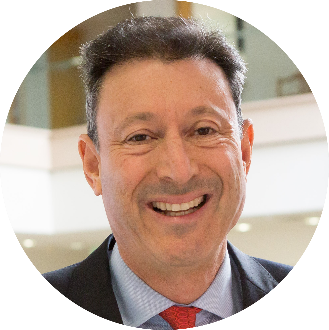
A Virtual Presentation and Conversation on “The Role of Technology in Society Amid COVID-19 and Changing Expectations for Global Leaders” and Networking Session
Friday, August 6, 2021 11:00 a.m. PDT
On Friday, August 6, the Center for Global Management hosted an event for UCLA Anderson fully employed and executive MBA students participating in its 2021 virtual international exchange to learn and network with peers from the CGM’s 2021 exchange partner schools from across Europe, Latin America and Asia. They were also joined by students from the UCLA-NUS EMBA class of 2022 who, the following day, started their first UCLA residential of the program. For the first hour, the CGM welcomed Professor Terry Kramer, faculty director of the Easton Technology Management Center, who leads the CGM’s Shenzhen/Hong Kong technology transformation-focused Global Immersion course. He discussed key technology trends, the impact of COVID-19 on promising areas of innovation and the role of technology and business in society. He also addressed the growing number of techlash issues, including privacy intrusions, cybersecurity risks and misinformation campaigns, and the broader implications and important learnings that these present for global leaders. Through an eye-opening review of the four phases of the technology evolution, beginning in the 1980s with the era of the PC to present day, Kramer explored what is happening globally and discussed the main technologies affecting our world today (and beyond), including 4G/5G networks, IoT, cloud computing, artificial intelligence and machine learning. Citing examples from around the world, he addressed changing customer behaviors, competition, emerging market trends and public policy issues such as data privacy, anti-trust and cybersecurity. Kramer explored the implications of current events, including the COVID-19 pandemic and racial injustices, and highlighted the need for new models of inclusion. While recognizing the growing focus of technology and society, Kramer also pointed out the growing “tech backlash” too from data privacy and anti-trust to the future of work, income divide and the digital divide. He explained that there have been notable leadership implications, including an awareness of the need for CEOs to serve a broader set of stakeholders, including employees, communities and government. Kramer explored the business implications of tech-based innovation, including the acceleration of key trends in e-commerce and retail and the flight to scale with increased network effects and capital availability. He also analyzed the leadership implications and highlighted the growing interdisciplinary nature of innovation, notable cases of both value creation and value destruction and suggested that business models and monetization strategies are changing. The discussion elicited some rich and divergent conversation. Tech’s role in society and the growing number of techlash issues are timely and relevant leadership issues. While the actual manifestation of them by region of the world varies, the broader trends pretty much remain. The discussion with Professor Kramer was followed by structured networking. Students broke out into discussion groups to address the areas of societal needs that can be notably advanced via technology and identify the negative externalities and/or societal concerns that need to be addressed. They also discussed the role of leaders in today’s environment and the actions that they can take personally to advance their own leadership effectiveness. The session provided a great opportunity for students to learn from a UCLA Anderson’s award-winning professor who teaches a number of technology-focused courses at UCLA Anderson, all with a global orientation and at the same time meet and network with global peers. The Center for Global Management looks forward to virtually welcoming students from its international partner schools who will be joining classes with EMBA and FEMBA students during the August EMBA block week.
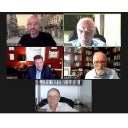
A Virtual Discussion on Cybersecurity: Risks, Opportunities and Areas of Promising Innovation
As the world becomes increasingly connected to the internet, cybersecurity is becoming a critical issue that affects individuals, enterprises, and governments. Private data, intellectual property, cyber infrastructure, military and national security can be compromised by cybersecurity challenges that come in many forms such as ransomware, phishing attacks, malware attacks and more. One May 24, UCLA Anderson, Tel Aviv University (TAU) and its Blavatnik Interdisciplinary Cyber Research Center (ICRC) collaborated for a panel discussion that addressed the broad landscape of cybersecurity challenges that impact the consumer, enterprise and society in today's virtual world and reviewed the most common types of attacks. Moderated by Professor Terry Kramer, experts from Israel and the United States addressed the risks faced in the growing presence of connected devices, remote work, global supply chain, and the utilization of AI. Panelists shared their views on the most promising areas of cybersecurity solutions, corporate responsibility to drive cybersecurity, top technology-based solutions to enhance cybersecurity, as well as the role that entrepreneurial ventures and government play in ensuring cybersecurity. Panelists included: Professor Isaac Ben-Israel, director of the Blavatnik Interdisciplinary Cyber Research Center; Jacob Mendel, senior lecturer and head of cybersecurity studies at TAU’s Coller School of Management; Zvi Feuer ('11), CEO, Siemens Industry Software Ltd, where he leads global teams and initiatives to develop and service customers worldwide; and Yuda Saydun ('82), founder and president, CyVent where he oversees the delivery of cutting-edge, AI-driven cybersecurity solutions that protect some of the world’s most sensitive operations. The discussion was a collaboration between UCLA Anderson’s Alumni Network, Easton Technology Management Center and Center for Global Management and Tel Aviv University (TAU) and its Blavatnik Interdisciplinary Cyber Research Center. VIEW VIDEO

A Virtual Presentation on NFTs and Digital Art and New Opportunities in the Entertainment and Media Business
Non-fungible tokens (NFTs) are unique digital assets, with blockchain-managed ownership. Examples can include collectible figures, game items, digital art, event tickets, domain names, and even ownership records for physical assets. NFTs’ ability to confer uniqueness has led to a boom in digital art’s collectability. During the lunch hour on May 18, Alex Nascimento (’08), managing director of 7CC Blockchain Investments explained to an interested and intrigued audience, comprised of UCLA Anderson students, alumni and members of the broader UCLA community, the basic concepts of the technology behind NFTs and their applications to the entertainment and media business. He also shared case study examples to illustrate how NFTs are revolutionizing digital art. Alex Nascimento ('08) is an author and blockchain faculty member at UCLA where he lectures on blockchain business applications and security tokens. He is managing director of 7CC Blockchain Investments, a company focused on supporting and fostering the blockchain industry and wrote the book, The STO Financial Revolution: How Security Tokens Change Businesses Forever, which uncovers regulated and compliant fundraising via blockchain. Nascimento has developed training, marketing and blockchain strategies for companies in the United States, E.U., Latin America and Asia. In addition to lecturing at UCLA, he is a frequent speaker at global blockchain conferences and corporate events demystifying securities issuance, business applications, and investments in blockchain for corporate leaders, students, and entrepreneurs. Nascimento received his MBA from UCLA Anderson. This discussion was a collaboration between the Easton Technology Management Center, the Center for Global Management and the Center for Management of Enterprise in Media, Entertainment & Sports.

Innovation: Strategies for Success Series: The Role of Technology in Building Public Sector Impact with Amanda Renteria, CEO, Code for America
Wednesday, May 12, 2021 5:00 p.m. PDT
On May 12, the Centers@Anderson hosted the closing discussion of the academic year in the Innovation: Strategies for Success Series with Amanda Renteria, CEO of Code for America. We live in a world that is continuously being transformed by innovative technologies. Like all other sectors, the public sector is going through phases of technological advancements and progress is being made on digital transformation, the use of big data, artificial intelligence, cloud services, and much more. The conversation, moderated by Professor Terry Kramer sought to uncover the critical role that technology can play in improving public sector service provision and narrowing the gap between the private and public sector in terms of the utilization and design of technology. Renteria shared the interesting story of Code for America, a non-partisan, non-profit that uses the principles and practices of the digital age to improve how government serves the American public, and how the public improves government. Professor Kramer summarized some of the key takeaways from the discussion. First, the importance of acknowledging where needs are the greatest against what should be happening in that environment; the importance of timing, for example the pandemic has allowed new things to happen and we should take advantage of the timing and environment; the need to identify where there is a market failure and where a community is not being served and let that guide what to focus on. Another key message was the view about government – we should feel proud of our government and if we are not, then we should look at what actions we are taking so we can feel proud. The conversation also emphasized the importance of working with trusted organizations, which might not always be governmental agencies but could be community-based organizations; and the need for there to be mutual respect between business and government to create better outcomes. Renteria highlighted that this unique moment in time presents an interesting opportunity for change and she has hope and optimism that good things can happen. Renteria’s ability to lay out a mental map for opportunities at the intersection of technology and the public sector, coupled with her own personal inspirations, passion and energy around engaging with others, really stood out. Alumni, faculty and members of the extended UCLA community and general public joined students to hear Renteria, who has enjoyed a unique and diverse career starting out in the financial industry, moving to education as a teacher in her small hometown community, and finally spending the majority of her career in public service. She has served as the chief of operations at the California Department of Justice, where she oversaw 1,000 public servants; national political director for Secretary Hillary Clinton where she managed the political and outreach strategy for the 2016 Presidential Campaign; and as a chief of staff in the United States Senate during one of the most productive periods in our country's history. She was named one of the most influential staffers by Roll Call and received a number of awards as the first Latina chief of staff in the history of the U.S. Senate. In addition to her policy work, Renteria also ran for Congressional office in 2014 and for Governor in 2018 with the belief that empowering others is at the heart of public service. She holds degrees from Stanford University and Harvard Business School and serves on several non-profit boards. This discussion was a collaboration among the Centers@Anderson. UCLA Anderson Dean Tony Bernardo provided opening remarks. VIEW VIDEO
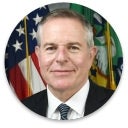
World Today Discussion Series: The International Monetary Fund (IMF): Protecting the Global Economy and Propelling a Sustainable Recovery
Wednesday, May 5, 2021 5:00 p.m. PDT
The COVID-19 pandemic has caused an unprecedented public health, economic, and social crisis, threatening the lives and livelihoods of millions. The economic shock is increasing poverty, worsening inequalities, and reversing development gains. Economic recoveries are diverging across countries and sectors, reflecting variation in pandemic-induced disruptions and the extent of policy support. Emerging market economies and low-income developing countries face rising public debt levels, are more vulnerable to financial stress and expected to suffer more significant medium-term losses. While a vibrant private sector will be essential for countries to recover, create jobs, and embrace economic transformation, strong coordination across bilateral and multilateral organizations such as the International Monetary Fund (IMF) and World Bank will play a crucial role to contain the impacts of the pandemic and build up the foundation of strong international cooperation for a green, smart and inclusive recovery.
On May 5, the Center for Global Management hosted a moderated conversation with UCLA Anderson alumnus, Richard Farber (’88), who recently completed his term as alternate executive director at the IMF. In this position, he represented the United States on the IMF’s executive board, ensuring the stability of the international monetary system and providing financial assistance to members focusing on low-income, fragile, conflict-affected states, and emerging markets. Farber addressed the history, role and purpose of the IMF, the world’s crisis lender, the diverging impact of COVID-19 on member countries and explained how the IMF continues to support countries on the path to recovery by providing policy advice, financial support, capacity development, and debt relief for the poorest. He also explored how the IMF is enhancing its support to member countries as they pursue their Sustainable Development Goals. The global audience of students, alumni, faculty, staff, and members of the extended UCLA community and general public asked many important questions during the audience Q&A that went into a deeper discussion on some of the key topics raised where Farber touched on digital currencies and the role of the IMF in addressing climate change. The discussion, moderated by Sebastian Edwards, distinguished professor and Henry Ford II Chair in International Management, was part of the CGM’s World Today Discussion Series and was co-sponsored by the UCLA Anderson Laurence & Lori Fink Center for Finance and UCLA Burkle Center for International Relations. The World Today Discussion Series engages students in dialogue in an interactive, engaging and enriching discussion format around current global issues that transcend borders. Through the series, the CGM engages globally minded students with issues that matter and ideas that stimulate. Through balanced discourse, the series serves as a neutral forum to educate students on global issues while at the same time encourage debate and examination. UCLA Anderson’s Center for Global Management is committed to providing timely and relevant information about critical global topics and issues that matter to our community and the world. VIEW VIDEO
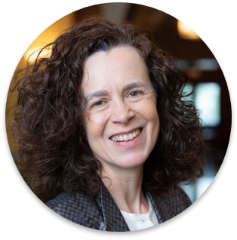
Leadership: Changing Paradigm Series: Reimagining Capitalism in a World on Fire with Rebecca Henderson, Economist and Harvard Business School Professor
Tuesday, April 20, 2021 11:30 a.m. PDT
In March 2020, businesses all over the globe hit a tipping point as they grappled with the impact of a pandemic, racial inequality, social injustices, and natural disasters. We are left to consider the questions: what is the true cost of capitalism as it stands today? Are business leaders thinking of the second and third order consequences of their decisions on the environment and on society at large? And how can we learn effective tools and strategies to integrate mission-driven thinking in the areas of finance, governance and leadership?
On April 20, the Centers@Anderson in collaboration with Impact Week hosted a fascinating conversation with Rebecca Henderson, who has been at the forefront of the shift from shareholder to stakeholder capitalism as a Harvard professor, a board member on several Fortune 500 companies, and the author of Reimagining Capitalism in a World on Fire. In this book, Henderson not only outlines how capitalism needs to change if we are to build a just and sustainable world, but also draws on twenty years of research in organizational change, innovation and disruption, and political theory in combination with a series of in-depth case studies to outline a practical roadmap for how we can get there from here. During the conversation, moderated by Professor Terry Kramer, Henderson discussed how business leaders must adapt and innovate to address the world’s most pressing issues. In the U.S., the problems are immense - growing partisan divide, inequities and the environment. A massive transformation effort and change in education are necessary and innovation is critical. She emphasized the importance of having a position and a sense of what is going on in the world. While it’s a daunting agenda, Henderson suggested that “the way we lead our lives” is important and added that “all of us need to work as hard as we can turn things around.” Rebecca Henderson is one of 25 university professors at Harvard, a research fellow at the National Bureau of Economic Research and a fellow of both the British Academy and of the American Academy of Arts and Sciences. She is an expert on innovation and organizational change, and her research explores the degree to which the private sector can play a major role in building a more sustainable economy, focusing particularly on the relationships between organizational purpose, innovation and productivity in high performance organizations. Henderson sits on the boards of Idexx Laboratories and of CERES and was named one of three “Outstanding Directors of 2019” by the Financial Times. For several years, she taught “Reimagining Capitalism: Business and the Big Problems,” a course that grew from 28 students to over 300 and is the basis for her book Reimagining Capitalism in a World on Fire – that was shortlisted for the FT/McKinsey 2020 Business Book of the Year Award. UCLA Anderson Dean Tony Bernardo provided opening remarks. VIEW VIDEO
About the Leadership: Changing Paradigm Series.
In a global environment of greater opportunities and challenges, with greater demands on leaders, businesses and society, new leadership paradigms must be assessed and acted on to ensure future success. This series will address leadership imperatives for today and learnings for tomorrow with general themes about the growing interdisciplinary nature of leadership, a changing paradigm for decision making and a more expansive view on the role of stakeholders including employees, government and society in addition to shareholders. Attendees of these events should come away with an enhanced understanding of leadership that will serve them longer-term contextualized with today’s issues and opportunities. The series is a collaboration among the Centers of UCLA Anderson.

Africa’s Readiness for Climate Change (ARCC) Virtual Forum 2021
Monday, April 19 – Friday, April 23, 2021
During the week of April 19, the UCLA African Studies Center and the Earth Rights Institute hosted the 2021 Africa’s Readiness for Climate Change (ARCC) forum. This inaugural forum, held virtually during the week of Earth Day, expanded an integrated vision of “Green Development” in Africa that is both ecologically and economically sustainable, emphasizing local solutions to climate change developed by African stakeholders in urban and rural communities. ARCC 2021 assembled interdisciplinary panels of scholars, scientists, industry leaders, climate change innovators, youth activists, and policy-makers to discuss cutting-edge research and the most successful sustainable development projects unfolding on the ground. During the week, a series of keynote lectures, panels and workshops were held. The opening keynote address, delivered by Elizabeth Wathuti, founder of Green Generation Initiative and head of campaigns at the Wangari Mathai Foundation in Kenya, focused on mobilizing African youth for climate action and conservation. The closing keynote looked at emerging economic opportunities for a “Green Africa,” and featured His Excellency Ambassador Sidique Abou-Bakarr Wai, Sierra Leone Ambassador to the United States. Five panel discussions took place with a diverse group of speakers. The first panel, moderated by UCLA Anderson alumna, Nurit Katz (’08, MPP ’08), UCLA chief sustainability officer, centered on youth leadership and highlighted four UCLA students majoring in environmental science, computer science, civil engineering and international development. Other sessions looked at energy, water, climate - regenerative infrastructures and indigenous frameworks; food, health, education—integrative responses; climate refugees and precarious lives and livelihoods; and business, politics and culture—the climate action ecosystem. The ARCC forum brought together around 400 individuals from various disciplines across academia, NGOs, business, and the public sector. Throughout the week, participants identified priorities for research and implementation in efforts to develop a collaborative action plan for the path forward. The forum was co-organized by the UCLA African Studies Center and the Earth Rights Institute. The Center for Global Management was a co-sponsor of ARCC.
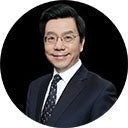
The 2021 Wilbur K. Woo Greater China Business Conference: A Technology-Driven Transformation of Society Enterprises and Consumers, Featuring an Opening Keynote Address with AI Expert, Kai-Fu Lee
Monday, April 12 – Friday, April 16, 2021
A notable technology-driven transformation is occurring in the Greater China region. Leapfrog innovation is evident in many areas including artificial intelligence, payments and high speed, 5G mobile networks. Steady advances in AI, robotics and internet services are disrupting traditional industries and enabling new business models. Technology-based transformations in sectors such as health care, education, and transportation are helping address societal issues too. The ability to understand Greater China’s unique environment and context is an essential element of “contextual leadership” — understanding the uniqueness of Greater China but also understanding innovation practices of interest for the rest of the world. Is the Greater China region eclipsing the U.S. with commercial technology-based innovation? What are the promising areas of innovation and where will the next technology-based value creation occur in the Greater China region? Are Greater China’s “successes” replicable in other countries? Can areas of common challenges in impact-driven sectors such as education and healthcare drive cooperation and shared learning? What are the key enablers and elements required to advance technology commercially and what do leaders need to understand to succeed in this complex, ever-shifting landscape?
The 2021 Wilbur K. Woo Greater China Business Conference, organized by the Center for Global Management was delivered over four days in a fully virtual format and brought together leading executives, innovators, influencers and investors from a variety of impact-driven sectors for a series of conversations to address these questions. The conference attracted hundreds of students, alumni, faculty, and interested members of the global community to hear experts share their thoughts and perspectives on how technology is driving the transformation of society, enterprises, and consumers around the world with a focus on Greater China and the U.S. and the contextual leadership that is imperative in the evolving global economic landscape. Day 1, included an opening keynote address and fascinating discussion with AI expert, Kai-Fu Lee, chairman and CEO of Sinovation Ventures and one of the most prominent figures in the Chinese internet sector who addressed technology-driven transformations and innovation in the region and the role of AI and its impact on society. Lee shared his unique insights on the present and future of technology-based innovations in China, allowing a comparative look with those in the U.S. and highlighting the importance of building bridges between the two countries with such complementary strengths, a key objective of our conference each year. Lee is a world-renowned expert on AI who has worked on artificial intelligence for over three decades and made breakthroughs using machine learning for speech and games in his early career. He was the founding president of Google China and Microsoft Research Asia, and a long-time investor in Chinese startups. Lee founded Sinovation Ventures in 2009 managing over $2.5 billion venture funds and investing in more than 400 startup companies, including 18 unicorns with 7 in AI. He is also the co-chair of the Artificial Intelligence Council for World Economic Forum, was named one of the 100 most influential people in the world by Time magazine, and is the author of New York Times and Wall Street Journal bestselling book AI Superpowers: China, Silicon Valley, and the New World Order. The keynote discussion was a collaboration with the Centers@Anderson’s Innovation: Strategies for Success Series (VIEW VIDEO).
Kai-Fu Lee’s keynote address was followed by a more macro-level discussion on the key enablers and elements of Greater China’s unique environment. In this session, Christine Loh, visiting professor at UCLA Anderson and former deputy minister for the environment in the Hong Kong SAR government, spoke with Jeongmin Seong, Shanghai-based partner at McKinsey Global Institute and Guangdong-based Joe Rocha, governor of AmCham South China about their insights and observations on the region’s unique context and key enablers that have helped contribute to its rapid growth in technology-driven innovations. As well as understanding the role technology has played in the transformation of the South China region (VIEW VIDEO). This session was important to set the stage for daily deeper dive discussions that followed during the week and focused on the most promising areas of tech-based innovation in impact driven sectors and across key verticals, including internet services (day 2) and high-tech-based advanced manufacturing (day 3). The final day of the conference looked at innovations in financial technologies and concluded with a panel discussion on where investment is happening in these sectors and where investors see opportunities more broadly.
On day 2, conversations explored how technology innovation using AI is disrupting education and how the region is driving innovation of internet services globally. These sessions took a closer look at how technology innovation and steady advances in AI, robotics and internet services are disrupting traditional industries and enabling new business models; identified where the greatest concerns and market improvement opportunities are with leapfrog innovation; and helped the audience to understand unique market attributes of consumers in the region and how they differ from consumers in other markets and how this might impact commercial opportunities. In the first session, Derek Li, founder and chief education technology scientist at Squirrel AI Learning, the first AI-powered adaptive learning company in China, took a closer look at how technology innovation is disrupting traditional ways of teaching and learning. He also shared his thoughts on whether these offerings could garner notable adoption in other markets, such as the U.S. and Europe (VIEW VIDEO). The second session focused on how the Greater China region is driving innovation of internet services globally with Hong-Kong-based Elinor Leung, head of Asia Telecom and Internet Research for CLSA, who also shared her views on the most promising areas of innovation and insights on the trends (VIEW VIDEO).
On day 3, the discussions explored the most promising areas of innovations in high-tech-based manufacturing, including Foxconn’s transformation and tech-based innovations in health care. The goals for these sessions were to understand how technology is creating more opportunities in tech-based manufacturing as well as evolution and future direction in areas such as AI, robotics and autonomous vehicles. These sessions also explored the increasing role of data and AI and how this creates new business models and opportunities and took a closer look at how hardware and data are coming together to create new solutions within healthcare and the type of impact these innovations are having on health care itself. In the first session, Jacob Chen, vice chairman, Hon Hai/Foxconn Technology Group and founding president, Foxconn University looked at the promising areas of innovation, including a discussion on Foxconn’s own transformation from the world's largest provider of electronics manufacturing services to its evolution and future direction in areas such as AI, robotics and autonomous vehicles. He also shared how COVID-19 has impacted manufacturing and where the greatest challenges and market improvement opportunities are (VIEW VIDEO). The second session centered around technology-based transformations of health care with two executives, Jason Wang, director of global marketing and David Yin, group vice president of Shenzhen-based Mindray Bio-Medical Electronics, a global medical instrumentation developer, manufacturer and marketer. They addressed the latest areas of technology-based innovations at Mindray, the trends and developments in the medical equipment sector and the uniqueness of the Chinese market as well as the unique origin of Mindray in China (VIEW VIDEO).
The final day of the 2021 conference explored FinTech disruptions and the most promising tech sectors for investment. As FinTech rapidly evolves in the Greater China region, possibly faster than in developed nations, disruptions are occurring across many sectors from lending to wealth management to blockchain to digital banking. In the first session, Renu Bhatia, Anthony Bizos and Florian Speigl, leaders in the FinTech space in Hong Kong addressed the rise of FinTech in the region, the areas of innovation they find most promising and the unique attributes of consumers in the region and how this influences commercial opportunities (VIEW VIDEO). The conference concluded with a review the investment landscape and most promising tech sectors for investment in the region. Following earlier deep-dive discussions into the three key sectors of FinTech, internet services and high-tech manufacturing, three UCLA Anderson alumni, all who are seasoned investors in technology sector in the region, Fritz Demopoulos (’97), Danny Qin (’11), and Sam Sun (’07), discussed where investment is happening and the areas they find most promising in terms of specific innovation, target markets, availability of capital as well as important areas of future growth and future outlook for the venture capital, private equity and M&A in the region (VIEW VIDEO).
Technology is a key focus at UCLA Anderson—almost every industry is impacted by technology and our leaders must understand the role of technology, tap its opportunities, mitigate negative externalities and be prepared to lead in a world that is increasingly technology-based. In “normal times,” the Center for Global Management would have recently returned with a large group of MBA students from Shenzhen and Hong Kong for one of the its Global Immersion courses, taught by Terry Kramer, faculty director of the Easton Technology Management Center. While in-country for this course, students are able to learn and witness firsthand the remarkable innovations and tech transformations happening in the region and hear from many of the remarkable speakers who joined for the conference, and visit many of the same organizations who generously welcome and host students for visits at their companies too. The course was redesigned for the virtual environment and the 2021 conference sessions were mandatory components for the course. While the Center for Global Management looks forward to resuming these on-the-ground experiences for Anderson MBA students, the Center was pleased this year to be able to highlight these same issues for a broader global audience.
Born in China in 1916, the late Wilbur K. Woo (B.A. ’42) received his bachelor’s degree in business administration from UCLA. He went on to become a major figure in LA's business, political, cultural and charitable arenas and was known for his decades of leadership in the Chinese-American community. Global reach starts with global thinking, and two decades ago -- recognizing the rapid expansion and modernization of China’s economy -- Wilbur Woo, the vice chairman of Cathay Bank, and his wife Beth endowed the Wilbur K. Woo Greater China Business Conference at UCLA to show their gratitude for the training Wilbur had received at his alma mater. The Woos' goal was to facilitate dialogue, promote understanding, and strengthen the important ties between the Greater China region and the United States—to identify areas of collective opportunity, foster cooperation, and bring a group of leaders—both aspiring and current -- together to collaborate and learn together. This conference has continued to have a powerful impact on our community—here at UCLA and beyond.
The Wilbur K. Woo Greater China Business Conference, organized by the Center for Global Management is UCLA’s largest conference focused on the Greater China region. Each year, UCLA Anderson’s Greater China Business Association (GCBA) and UCLA’s Chinese Students and Scholars Association (CSSA) are collaborating partners. The 2021 conference was also a collaboration with UCLA Anderson’s Easton Technology Management Center. It was sponsored by Cathay Bank and Landsea Homes at the gold and silver levels, respectively. The China General Chamber of Commerce – Los Angeles, Los Angeles World Affairs Council and Town Hall and the UCLA Asia Pacific Center and UCLA Center for Chinese Studies were supporting organizations.

Through the CGM’s Global Immersion Course, MBA Students Learn from Alumni in Europe About the European Union, Brexit and COVID-19 and Their Impact on Doing Business in Europe and Globally
January through April, 2021
In non-pandemic times, groups of MBA students would travel during Spring break for the in-country week of the Center for Global Management’s Global Immersion courses. For winter/spring 2021, the CGM redesigned its courses to be offered virtually. Guest speakers, virtual experiential and live interactive sessions complemented the faculty teaching sessions to provide students with a unique, learning-orientated experience. Students were able to connect through live virtual sessions with many of the same prominent executives, economists and entrepreneurs that they would have met in-country, including many UCLA and Anderson alumni. Rather than focusing on just one, or two countries, the virtual environment provided the opportunity to take a more regional focus. For the first time, UCLA Anderson associate dean, Gonzalo Freixes taught a very timely and topical course that looked at the European Union (EU), Brexit and COVID-19 and what they mean for doing business in Europe and globally.
To compound the economic and political uncertainty created by Brexit, the COVID-19 pandemic raged across Europe. As the UK and the nations of the EU confronted the effects of the pandemic, there were successes and failures. Against the backdrop of these twin crises in Europe, this course focused on the challenges and opportunities that the European Union structure, Brexit and COVID-19 have created for European and global business. The course analyzed (though not exclusively) their effects on five sectors, including financial services; technology and entrepreneurship; health care; sports and entertainment; and hospitality and tourism. To complement the academic teaching sessions and in lieu of the in-country travel week, during five interactive sessions, students heard from business and political leaders in Europe, including a number of UCLA/Anderson alumni, to gain perspectives of the successes and failures of the European Union as they relate to global business. Speakers also provided students with a first-hand account of how European businesses and governments are dealing with both Brexit and COVID-19 and what the future holds for European and global companies.
Each of the five interactive sessions were primarily focused on the aforementioned sectors. In the first session, Brussels-based UCLA alumnus Pēteris Zilgalvis (BA ’86), head of unit for digital innovation and blockchain and co-chair of the FinTech task force at the European Commission discussed the role of the European Commission, how it develops legislation as well as explained the start-up infrastructure and FinTech trends in the EU. Later, Daan De Vileger, director of global trade advisory at Deloitte in Brussels analyzed the EU’s trade landscape, regulatory developments and the impact of Brexit. Following a virtual tour of the Maria 01 accelerator in Helsinki, students learned about the start-up campus hub, its affiliated companies and the startup ecosystem more generally in Finland. Barcelona-based Ana Maiques, CEO of Neuroelectrics and co-founder of Starlab spoke more broadly about entrepreneurship in Europe which greatly enriched students understanding of starting a business in the region. These discussions were later complemented by a review of the general technology and business startup landscape in France and Europe from Toulouse-based Anderson alumna, Sarah Weldon (’96). Weldon is responsible for business development and strategic partnerships at CEA TECH, the French Alternative Energies and Atomic Energy Commission.
In advance of a virtual tour of the Audi Ingolstadt factory in Germany, Munich-based, PwC partner Felix Kuhnert, the global and German automotive leader provided terrific insights on trends in the automotive industry in Europe and the impact of COVID and Brexit on the sector. Switzerland-based Mark Rodrigues ('08), vice president and general manager, gasoline at Garrett - Advancing Motion and former general manager, Honeywell International later shared his own perspective on the automotive sector, and highlighted how regulation has fueled growth of the business. He also addressed Europe’s position and the “Green Deal.”
The third session centered around health care and reviewed the various health care systems in Europe and the COVID-19 response. Mary LeBlanc, (’82), president of Bridger Val Associates LLC who previously served as global pharma chief information officer in Basel, Switzerland highlighted the major challenges for health care as well as the impact of COVID and Brexit. LeBlanc’s insightful discussion was later complemented by a conversation with Munich-based alumnus, Christian Wiest (’98), chief executive officer of iThera Medical who also addressed the health care landscape across Europe, touching on MedTech and the German response to COVID. Wiest also discussed the country’s entrepreneurial ecosystem and shared his own trajectory before and after graduating from UCLA Anderson.
Banking and finance served as the focus of the fourth session. This particular session opened with an insightful discussion with Emilio Saracho (’80), former executive chairman of Banco Popular and former vice chairman, JP Morgan Chase & Co. Saracho addressed the banking and the financial markets in the EU and UK, the impact of Brexit and the role of the European Central Bank. He also provided his own future outlook and insights on bitcoin too. Saracho’s fascinating session was followed by an applied finance panel discussion that looked at the changing face of finance in the UK and EU. Alumni financial experts, including Paris-based Erinc Agacikoglu (’03) joined London-based classmates Marissa Harris (’05) and Sam Rubandhas (’05) for a moderated conversation on some of the key trends in the sector and shared their own perspectives on what the future holds for the industry in the UK and EU. The discussion was moderated by CGM founding board member, Toby Raymond ('86), managing director of London-based Access Equity Management Ltd.
The final session of the week and course focused on the media, entertainment and sports sectors. Milan-based Nelly Janet Cartagenova (’80), former executive finance director for The Walt Disney Company Italia addressed the media and entertainment landscape in Europe and COVID-19 impact, including the challenges and opportunities. She also shared her own personal journey and experience in Italy working for Disney and Apple and highlighted the importance of understanding the local market and culture. Joshua Levine (’09), director of commercial finance, 2K Games, who recently transitioned from Lausanne as commercial business controller for the International Olympic Committee, reviewed the sports and entertainment landscape in Europe. He discussed how business is conducted in Europe and the impact of Brexit and COVID-19. In a fascinating presentation, he reviewed the business structure of the Olympic Committee and the impact of COVID both on the Olympic Games as well as on the sports industry in general in Europe, particularly across the major football leagues.
On the final day of the course, the CGM hosted a networking session with UCLA Anderson alumni across Europe who joined virtually to meet the students. Welcome remarks were provided by Dean Tony Bernardo who gave a brief school update, including how UCLA Anderson is adapting to COVID-19 and its plans for the future. Alumni from France, Italy, Spain, Switzerland and the UK joined the interactive session which provided an opportunity for students and alumni to meet and network and talk through some interesting questions together, including taking a closer look at certain sectors and how Brexit and COVID have impacted organizations.
To complement the guest speaker sessions, students enjoyed virtual tours of the European Quarter in Brussels, the headquarters of the main buildings of the European Union, including the European Parliament; the Maria 01 accelerator in Helsinki; the Audi Ingolstadt factory in Germany; as well as an interactive 3D winery and cellar tour of Domaine Chateau Cos d’Estournel in the Bordeaux region of France and learned about the wine industry in the country. Throughout the course, students witnessed the influence and wonderful support and engagement of UCLA alumni across Europe. We are tremendously grateful for their continued support and commitment to UCLA Anderson and to the learning experience of current MBA students.
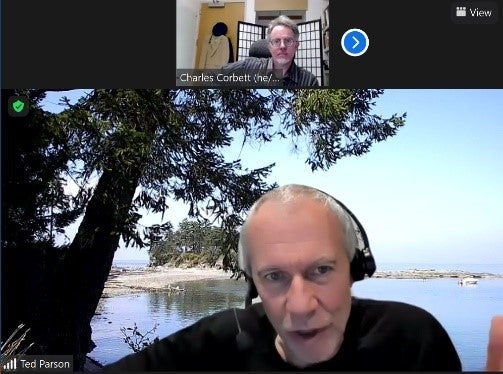
Global Business and Policy Forum: “Climate Change, International Cooperation and Business – What is the Path Forward?”
Thursday, March 4, 2021 5:30 p.m. PST
On his first day in office, President Biden signed an executive order to have the U.S. rejoin the Paris Climate Agreement of 2015. President Biden also announced that he will reconvene the Major Economies Forum on Energy and Climate, and in cooperation with members and other partners, pursue initiatives to advance the clean energy transition and sectoral decarbonization. He has set a goal of achieving carbon neutrality by 2050. This will require steeper emissions cuts than the U.S. has ever achieved. As climate change intensifies, it will become increasingly important to pursue all elements of an integrated climate response. In the U.S. and throughout the world, business leaders will play a crucial role to confront climate change and be required to identify opportunities for cleaner, more sustainable processes as disclosures on carbon emissions and other climate-related practices become increasingly important to customers, investors, regulators and the public at large. Under the general heading of how the U.S. can reassert a leadership role in developing programs to deal effectively with climate change there are a host of questions, including: What type of vehicles are suitable for effective collaborative action for dealing with climate change? Do we need large international agreements or can we achieve more through smaller ad hoc collaborations? Does the history of U.S. ambivalence on climate change, especially given its recent history and current volatile political environment, render it an unreliable partner and unsuitable for a leadership role? The Major Economies Forum has been used by Presidents Barack Obama and George W. Bush and did not achieve lasting results. Will it be different this time? What role can and should businesses play to help achieve these ambitious goals and drive our nation and the world toward a clean energy future?
On March 4, the UCLA Anderson Center for Global Management and UCLA School of Law’s Lowell Milken Institute for Business Law and Policy hosted the winter global business policy, the second forum of the year, in a virtual presentation and interactive discussion format. Edward A. Parson, Dan and Rae Emmett Professor of Environmental Law and faculty co-director of the Emmett Institute on Climate Change and the Environment joined Charles Corbett, IBM Chair in Management, Professor of Operations Management and Sustainability to discuss the challenges ahead for the U.S. and the world in forging solutions to address the central issue of our time - the impact of fossil fuel related emissions on human economic activity and wellbeing, including the role that businesses may take to meet the ambitious goals to stave off this existential threat. Students from Anderson’s full-time, fully employed and executive MBA programs met and networked with JD and LLM students from the UCLA School of Law. In small groups, students discussed two hypotheticals and considered what top-level strategic principles or priorities should guide US climate action in international arenas? Should the U.S. mainly focus its efforts on working through the existing UN process (the Framework Convention on Climate Change, and the Paris Agreement), or should it instead (or in addition) aim to empower some other forum for international action. Students also considered practical and legal challenges associated border carbon adjustments and opined on how they should (not) be designed. Groups then reconvened and shared their thoughts and deliberations on these difficult and complex issues. The Global Business and Policy Forum is a collaborative partnership between UCLA Anderson’s Center for Global Management and the UCLA School of Law's Lowell Milken Institute for Business Law and Policy.
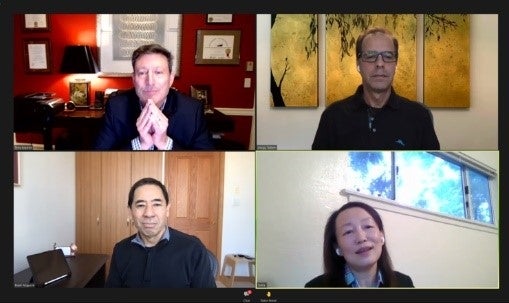
A Virtual Discussion on The Transformative Effect of Biopharma Innovation on the Future of Healthcare
Today's transformational COVID-19 vaccines have highlighted an important trend in healthcare – – the notable innovation occurring in biopharma, globally. These innovations offer the potential for significantly enhanced health outcomes with potentially broader affordability and access. On March 2, the Center for Global Management and Easton Technology Management Center hosted a panel discussion with Mark Noguchi ('81), senior vice president and general manager business development, Chugai Pharmaceuticals; Greg Talbert, global head of digital and personalized health care partnering, Roche; and Stella Xu, managing director of Quan Capital. Panelists discussed the key enablers for this innovation, the role of data, changing business models, public policy and venture capital. The discussion, moderated by Terry Kramer, adjunct professor and faculty director of the Easton Technology Management Center, provided a fascinating look at the key innovators in this space and highlighted the value of innovation and the huge opportunity it has to change outcomes. The idea of personalization and integration of capabilities matters. Entrepreneurship matters too. The market is global and creates opportunities in best practices and development. The conversation also emphasized the importance of partnerships around the world, such as partnerships between tech companies and life sciences companies; governments and business; and also nations. Leadership also matters and as the industry continues to evolve, ethical considerations will be an extremely important part of using technology going forward. This is an exciting time for pharma. It is a very expansive area that is witnessing a convergence of all types of tech innovation that have a huge potential to change healthcare as we know it today. At Roche, Talbert leads a team responsible for the identification and execution of digital healthcare partnerships as part of the implementation of Roche’s personalized health care strategy. Prior to joining Chugai, Noguchi spent 33 years with the Roche Group. Xu is managing director of Quan Capital, a life science venture fund with deep expertise and broad experiences in cross-border value creation and global investments. Prior to Quan, she was site head of Roche R&D Center China and a core member of the global management team of Roche’s Immunology, Inflammation & Infectious Diseases. The discussion was a collaboration between the Center for Global Management and Easton Technology Management Center and drew a broad audience of UCLA students, alumni, faculty, staff and members of the extended UCLA community and general public. VIEW VIDEO
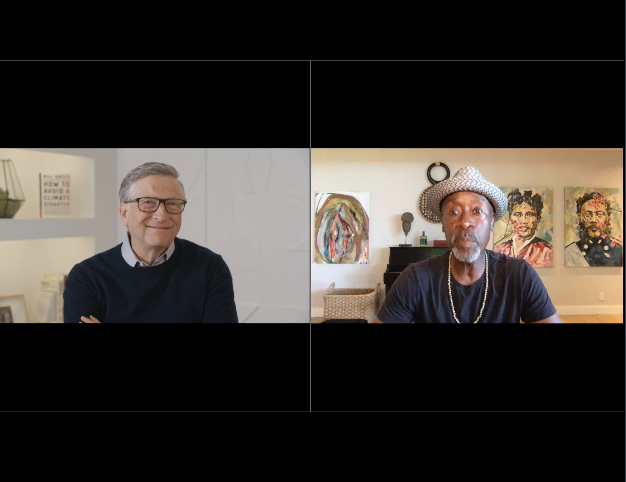
A Livestream Conversation with Bill Gates and Don Cheadle: How to Avoid A Climate Disaster: The Solutions We Have and the Breakthroughs We Need
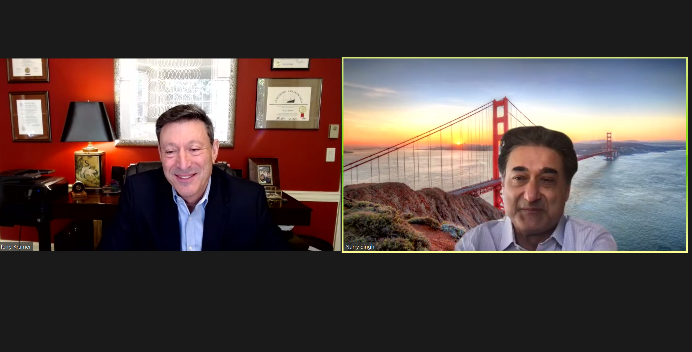
A Virtual Discussion on Strategic Imperatives in Digital Transformation: A Day of Reckoning is Coming with Narry Singh, Global Co-Lead of Digital at AlixPartners and Former Head of Growth and Strategy, Accenture Digital
In an era of COVID-19, the need for strategic agility and heightened scrutiny on continuity and safety has increased substantially. This has created a new sense of urgency for development of digital and remote solutions for both leaders and newcomers in the digital economy. These issues raise a fundamental question about company transformation, digitization, and the future of the technology industry. On February 18, the Center for Global Management and Easton Technology Management Center hosted a conversation with Narry Singh, a seasoned Silicon Valley CEO, advisor and investor. Singh, who has over 25 years of experience in the mobile, digital media, e- commerce, and software industries addressed these issues in a fascinating dialogue, moderated by Terry Kramer, adjunct professor and faculty director of the Easton Technology Management Center. The conversation shed light on the importance of digital transformation and digital IQ. Singh explained that we are now in the second chapter of digital transformation and that digital is no longer an add-on: it should be a core part of any business. Successful strategies in ‘Chapter Two’ will require changes to organizational structures and mind-sets. Singh also touched on the digital divide, digital talent and leadership imperatives, as well as his own career path, transitioning from entrepreneurship to consulting and his role on boards across multiple sectors. Narry Singh is an advisor to CEOs of the world's largest corporations as well as a successful Silicon Valley entrepreneur and investor. He previously served as Global Head, Growth & Strategy for Accenture Digital and was a member of Accenture's Global Leadership Council. His team was responsible for Accenture Digital’s growth strategy, acquisitions, investments, new service offerings and global partnerships. Prior to joining Accenture in 2014 in London, he spent 19 years in Silicon Valley building mobile, eCommerce, and SaaS businesses. Singh has also invested in and/or advised over 30 start-ups and has served on boards of or advised the World Economic Forum (ITC Committee), TigerText, CaseCentral, Architecture for Humanity, among others. The discussion was a collaboration between the Center for Global Management and Easton Technology Management Center and drew a broad audience of UCLA students, alumni, faculty, staff and members of the extended UCLA community and general public. VIEW VIDEO
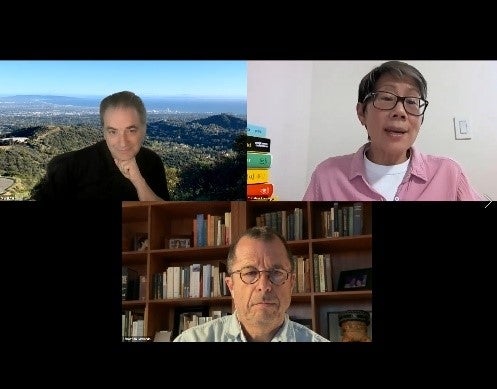
World Today Discussion Series: Environmental Sustainability in Asia and the Role of Green Finance in the World
China’s announcement of its pledge to achieve carbon neutrality by 2060 (and subsequent announcements by Japan and South Korea) could help significantly slow global warming. In recent years, China has emerged as a leader in clean energy technologies, including solar panels and wind turbines. It is also the world’s largest manufacturer of electric cars and buses. Green bonds and other types of sustainable financing could play a major role in driving China’s pledge to be carbon-neutral within the next four decades, as sustainable investing gains more traction in investment portfolios. The U.N.’s Environment team is already working with public and private sector organizations in an attempt to align international financial systems to its sustainable development agenda. At a national level, too, central banks are making noises about prioritizing greener investment. The U.S. incoming administration has made clear that climate change will be one of its priorities. How will different types of economies and political systems East and West cope with a problem so large? If governments fail to properly price the costs of carbon related pollution, what responsibilities do private companies have? How should the conflict between shareholders and other stakeholders be managed?
On Thursday, February 4, the Center for Global Management hosted a moderated conversation to address these important issues. Ivo Welch, distinguished professor and J. Fred Weston Chair in Finance and a highly respected authority on socially responsible investing joined Christine Loh, visiting professor, former deputy minister for the environment in the Hong Kong SAR Government and a subject expert and strategist on the environment, who advises HSBC, BASF and others. The discussion was moderated by Sebastian Edwards, distinguished professor and Henry Ford II Chair in International Management. Loh and Welch analyzed the new definition of sustainability after COVID-19 and how the disruption will likely impact the future sustainability policies in the U.S., Asia and the world. They examined the tradeoffs associated with the future provision of energy necessary to support modern economies and shared their longer-term views on the role of green financing to address the central issue of our time - the impact of fossil fuel related emissions on human economic activity and wellbeing. The global audience of students, alumni, faculty, staff, and members of the extended UCLA community and general public asked many important questions during the audience Q&A that went into a deeper discussion on some of the key topics raised and touched on ESG, cap and trade as well as nuclear energy and rising sea levels. The discussion which was part of the CGM’s World Today Discussion Series was co-sponsored by the UCLA School of Law’s Emmett Institute on Climate Change and the Environment and Lowell Milken Institute for Business Law and Policy, as well as the UCLA Anderson Fink Center for Finance. The World Today Discussion Series engages students in dialogue in an interactive, engaging and enriching discussion format around current global issues that transcend borders. Through the series, the CGM engages globally minded students with issues that matter and ideas that stimulate. Through balanced discourse, the series serves as a neutral forum to educate students on global issues while at the same time encourage debate and examination. UCLA Anderson’s Center for Global Management is committed to providing timely and relevant information about critical global topics and issues that matter to our community and the world. VIEW VIDEO
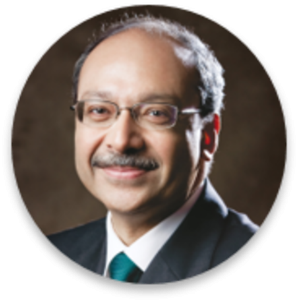
A Virtual Evening Conversation with Arvind Singhal (’82), Chairman, Technopak Advisors and President, UCLA Anderson India Alumni Network
On Thursday, January 21, the Center for Global Management (CGM) and the South Asian Business Association (SABA), hosted a virtual evening discussion with UCLA Anderson alumnus Arvind Singhal (’82), president of the UCLA Anderson Alumni Chapter in India and chairman of Technopak Advisors, a successful Delhi-based management consulting company that is a leader in India in the consumer products and retail sectors. Students from the full-time, fully employed and executive MBA programs, including members of SABA joined the intimate and interactive session to hear from Singhal who, beyond Technopak, is actively involved in the causes of education and healthcare in India as well as mentoring students and professionals. He shared personal stories with students, including what brought him to UCLA, his time on campus and his career trajectory since returning to India in 1982. He also shared some key learnings from his time at the Graduate School of Management (now, UCLA Anderson) and his thoughts on the key strengths and attributes to a successful career and happier personal life. Singhal addressed student questions about India today and in the future. He highlighted some exciting areas of innovation including, for example, Aadhaar, the world’s largest biometric ID system, that assigns a 12-digit unique identity number that is tied to a range of citizen beneficiary services. The program was designed to be a technological solution to both existing and emerging socio-economic challenges and help ensure inclusion in India. It is linked organically to new bank accounts and mobile connections, making them accessible to large sections of India’s ~ 1.4 billion population. In turn, much of the increase in financial access in the country has been spurred by the Aadhaar-based reforms to social programs that enable benefits to be routed through bank accounts. Singhal offered some good advice as students think about their own careers, professional and personal lives. Contextualized within the world today, he discussed the need to be nimble and the concept of VUCA (volatility, uncertainty, complexity and ambiguity) - offering a useful way to think about how we can be prepared and respond to unanticipated situations. Singhal sits on several Boards, including some not-for-profit, as an independent director. He also has served on several committees in the leading chambers of commerce and industry in India, across different sectors including retail, textiles, healthcare, and education, and is considered as one of India’s leading experts in India’s private consumption, consumers, and retail domains. Singhal is an accomplished columnist that focuses on the pulse of the market in India and has been a regular columnist for leading Indian business papers, including Business Standard and Economic Times, and a frequent contributor to major Indian and international business publications that include the Wall Street Journal.
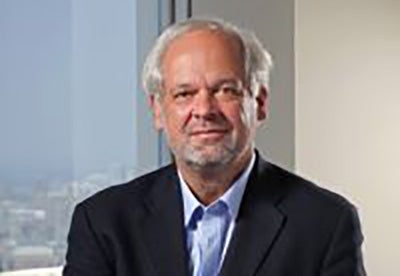
How Technology Transforms Our Ethics – A Virtual Conversation with Futurist, Venture Capitalist and Author, Juan Enriquez
In his new book Right/Wrong: How Technology Transforms Our Ethics, author, academic and futurist Juan Enriquez argues that technology not only shapes people’s ethics but also has drastically improved ethics within societies. This argument challenges many widely held beliefs that technology corrupts societal ethics. Enriquez further posits that today’s most pressing issues — the pandemic, climate change, and political polarization to name a few — are all shaped by the relationship between technology and ethics, and that this holds enormous potential for improving the future. What can we learn from past technological innovations and how can we use this knowledge to build a better future? The conversation with Enriquez that attracted an audience of over 400, included many UCLA Anderson MBA students and alumni, was moderated by UCLA Anderson’s Professor Terry Kramer and traced the historical foundations of the book’s arguments and parsed out how understanding the relationship between technology and ethics can help us solve today’s diverse problems. Questions touched on many fascinating topics including how ethics evolves over time and are not static; how technology has played an important role in raising awareness and greater transparency; misinformation; and the importance of leadership, accountability and focusing on the facts for decision-making. Enriquez possessed a distinct and very impressive ability to take disparate facts about the world around us and make sense of them in a way that is timely and relevant. In closing, Enriquez emphasized the importance of humility and forgiveness in judging each other and judging the past and that ethics is not something to be scared of. Juan Enriquez is a leading authority on the economic impact of life sciences and brain research on business and society as well as an entrepreneur. He was the founding director of the Harvard Business School's Life Sciences Project and is a research affiliate at MIT’s synthetic neurobiology lab. Following HBS, Enriquez became an active angel investor. He then co-founded Excel Venture Management. As a business leader, advisor, and renowned speaker, he works directly with the CEOs of a number of Fortune 50 companies, as well as various heads of state, on how to adapt to a world where the dominant language is shifting from the digital towards the language of life. Enriquez is author and co-author of multiple bestsellers including As the Future Catches You: How Genomics Will Change Your Life, Work, Health, and Wealth (1999), The United States of America: Polarization, Fracturing and Our Future (2005), Evolving Ourselves: Redesigning Humanity One Gene at a Time (2015). He is a TED All-Star with nine TED talks on a variety of subjects, as well as dozens of TEDx talks. Enriquez also serves on multiple for profit boards as well as a variety of non-profits. The event was hosted by and in collaboration with the Los Angeles World Affairs Council & Town Hall, in partnership with the Center for Global Management and Easton Technology Management Center. The Center for Global Management is a member of the LAWAC & Town Hall. VIEW VIDEO

Leadership: Changing Paradigm Series: Healthcare Transformation and the Role of Technology with Dr. David Feinberg, Head of Google Health
Thursday, January 14, 2021 11:30 a.m. – 12:30 p.m. PST
On January 14, the Centers@Anderson hosted its inaugural discussion of the new year with Dr. David Feinberg, head of Google Health and former CEO of UCLA Health. The discussion was a firsthand look at promising areas of innovation – – near term and long term for healthcare and Google Health's fascinating areas of focus. During the discussion, moderated by Professor Terry Kramer, Feinberg shared his unique 360° view of healthcare from the point of view of health providers, payers, researchers, patients and technology providers to understand how and where transformations will occur. He addressed the role of data and technology in improving health outcomes, reducing costs and enhancing access as well as the role of "person-to-person" connections in healthcare and technology adoption. Feinberg’s assessment of the state of healthcare in the U.S. today, views about promising areas of innovation and the model for effective partnering were invaluable for the global audience that included over 600 students, faculty, alumni and board members from UCLA Anderson, UCLA Health/UCLA David Geffen School of Medicine and UCLA Fielding School of Public Health, as well as members of the extended UCLA community and general public. Some of the key takeaways from the discussion were summarized by Professor Kramer. First, to make sure that we are all thinking about the context of health care well - a lot of the problems that are created are not with the interactions with doctors but it’s the downstream piece, i.e. zip codes, lifestyle, the choices we make and the information we have access to. Next, ultimately effective technology-based solutions are going to come from a partnering with healthcare providers. Kramer said that when you think about competition, the problem is so big that we need a lot of people and companies going after these issues. Finally, there is some optimism. Ten to twenty years out, there might be a big improvement in healthcare and we live in times where we need big solutions. Feinberg added, “From a citizen standpoint (and from a national security standpoint), it’s a moral imperative that we get this right.” This discussion was a collaboration among the Centers@ Anderson and UCLA Health and the UCLA David Geffen School of Medicine. UCLA Anderson Dean Tony Bernardo provided opening remarks. VIEW VIDEO
About the Leadership: Changing Paradigm Series.
In a global environment of greater opportunities and challenges, with greater demands on leaders, businesses and society, new leadership paradigms must be assessed and acted on to ensure future success. This series will address leadership imperatives for today and learnings for tomorrow with general themes about the growing interdisciplinary nature of leadership, a changing paradigm for decision making and a more expansive view on the role of stakeholders including employees, government and society in addition to shareholders. Attendees of these events should come away with an enhanced understanding of leadership that will serve them longer-term contextualized with today’s issues and opportunities. The series is a collaboration among the Centers of UCLA Anderson.
Innovation: Strategies for Success Series: Social Innovations Around the World
Tuesday, November 9, 2021 6:00 p.m. PST
The second discussion of the academic year in the Centers@Anderson Innovation: Strategies for Success Series featured a conversation on social innovations around the world. Cheryl Gregory (’10), senior manager, Bill & Melinda Gates Foundation joined Edwin Keh, CEO, Hong Kong Research Institute of Textiles and Apparel (HKRITA) and former chief operating officer, global procurement, Walmart; and Shailendra Tyagi, former head, supply chain and logistics, ITC Limited where he led the e-Choupal rural marketing initiative in India in its agri-business division. Panelists discussed innovation projects they have been engaged with and shared examples of how innovative technology can enable positive change and bring new solutions to improve environmental sustainability and advance social responsibility around the world. The discussion was moderated by Professor Chris Tang, faculty director of the Center for Global Management.
During the session, Shailendra Tyagi discussed how the e-Choupal system has helped to tackle challenges of India’s agricultural sector through innovative technology solutions that empower rural communities and improve the lives of India’s rural farmers. Edwin Keh explained how HKRITA partners with corporations to develop innovative technology solutions to address environmental issues and clean up the fast fashion industry through a review of Looop, a new garment-to-garment recycling system that is achieving real change and transforming the industry for the future. Cheryl Gregory (’10) provided an inside look from a funder’s perspective and shared the types innovations that the Gates Foundation is seeing in socially important sectors, how projects are selected through its grants budget or allocation for program-related investments (PRIs), and how the foundation measures outcomes and success. UCLA Anderson Dean Tony Bernardo provided opening remarks. The discussion was a collaboration among the Centers at Anderson and open to UCLA students, alumni, faculty, staff and members of the extended UCLA community and general public. It was also a featured event as a lead up to UCLA’s international Education Week. VIEW VIDEO
About the Innovation: Strategies for Success Series.
In the global environment and post COVID-19, there will be increased opportunities and challenges, with greater demands on leaders, businesses and society. New innovation strategies must be assessed and utilized to ensure future success. This series will address the innovation imperatives of today and their implications for tomorrow. The series is a collaboration among the Centers of UCLA Anderson.